April 26th New Headingley Club Leeds GER Showcase with Towse & Harry Orme
Sept 22nd The Old Woollen Leeds UK (supporting Martin Simpson)
Oct 13th The Blarney Stone, Osaka, Japan with Brian Cullen
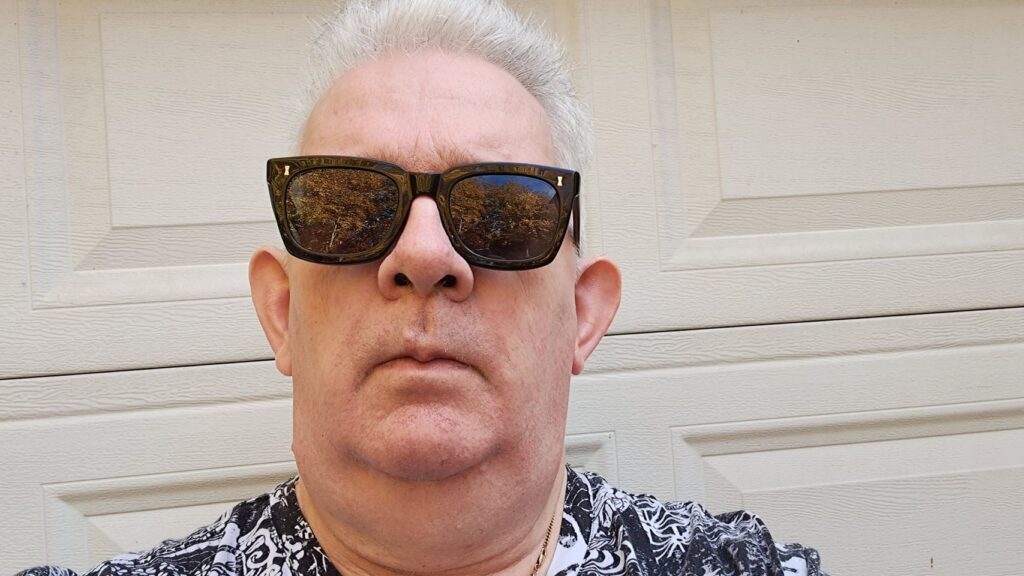
Nick Cody
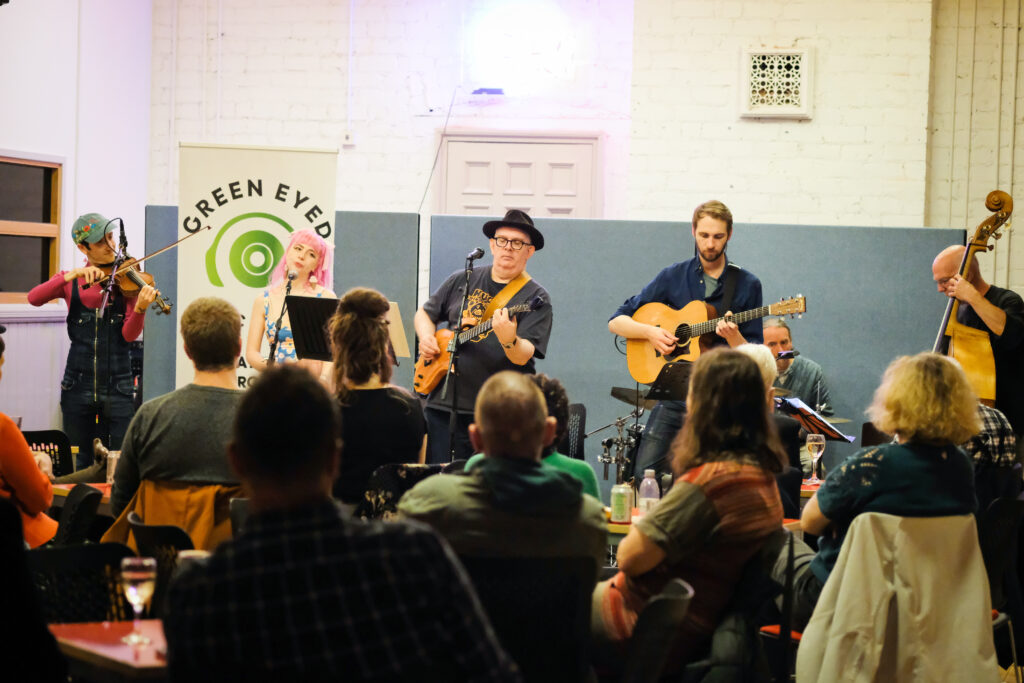

Nick Cody

There’s an old saying “Buy cheap, by twice” and this is especially true for musicians wanting to create and perform music.
Recording music has never been so affordable and its entirely possible to get some really excellent equiptment even when on a strict budget. There are in my view essential items needed for any artist wanting to create and promote music. These include a good recording setup and musical gear that will create a great live sound.
Those people who know me, appreciate my enthusiasm for Reaper as a DAW. Reaper is both super stable and extremely affordable for any artist. In my view its far more flexible than Logic or other software often favoured by artists on a budget. Crucially for a fixed fee, there are numerous updates and the online support is excellent. I found I could set it up in five minutes and its been a joy to use.
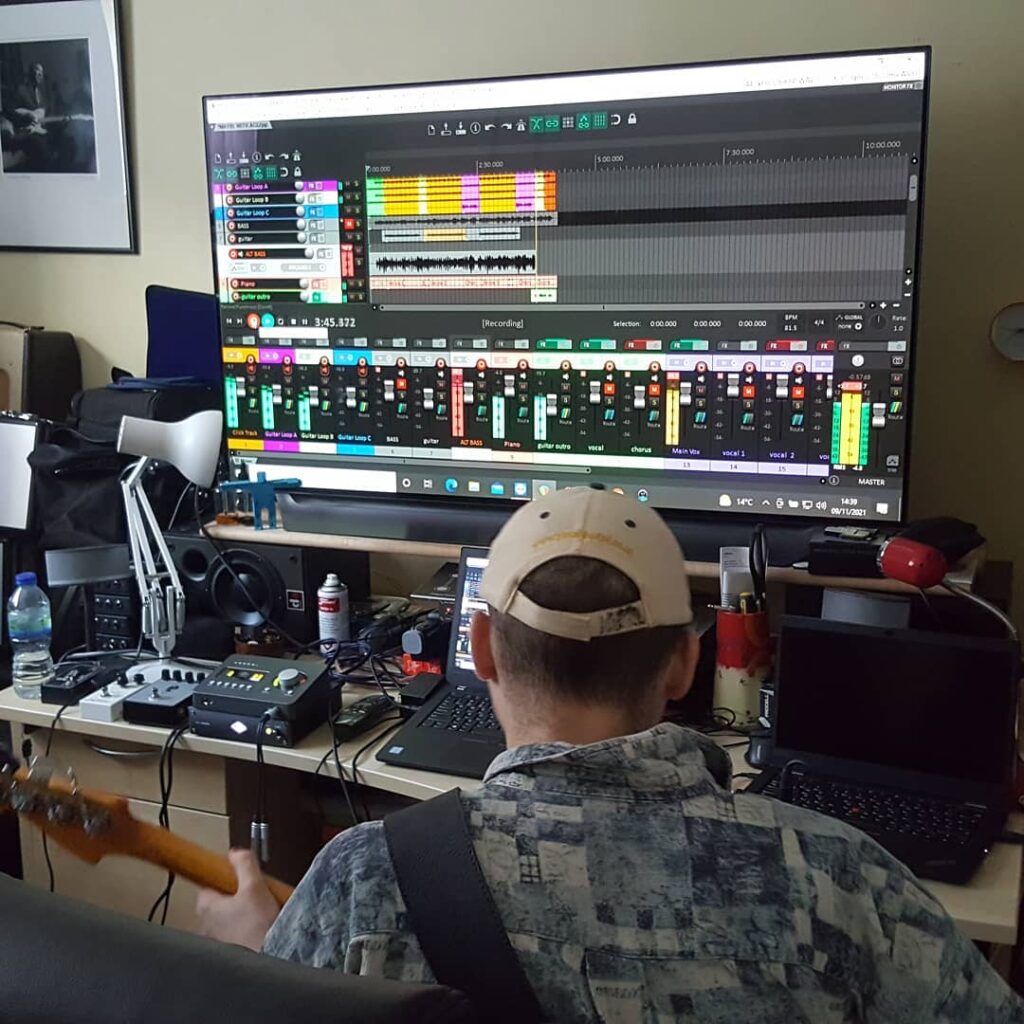
Many artists on a budget will look at saving money with audio interfaces, but in my view the UAD Apollo interfaces blow the competition away and are well worth the investment. I started with a basic Apollo and have now invested in a twin version with a lot more processing power. The plugins are first class and at certain times of the year, there are massive discounts on these. My two favorite plugins are Dreamverb and the LA 3 compressor. My homestudio is set up for a vocal and a line in option and that serves all my needs.
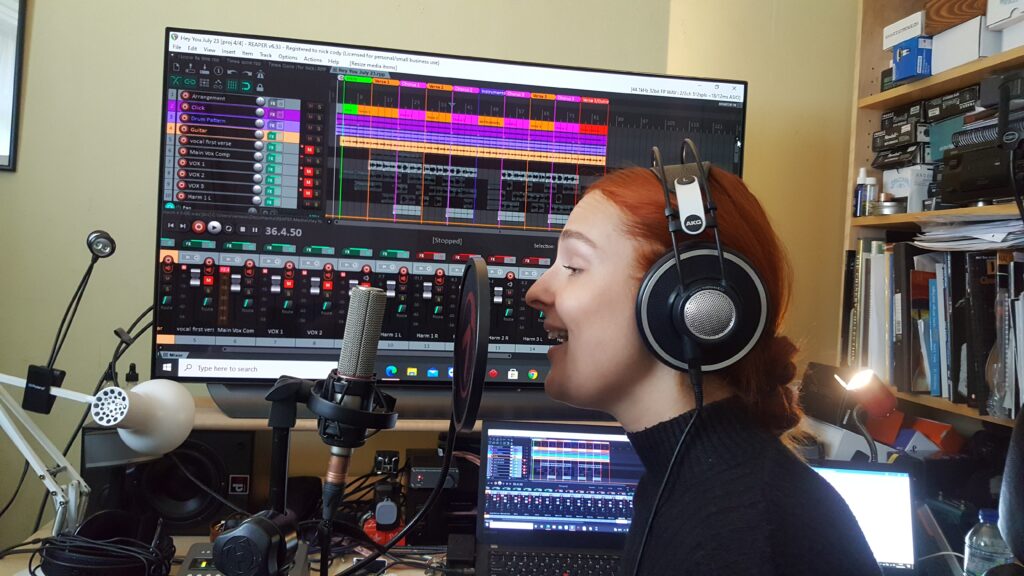
Great mics are essential for studio recording and especially for vocals. I massively favour Austrian Audio mics and especially the OC18 and the OC818. I’m so impressed with these, that I don’t use anything else in my studio. I’ve used all manner of mics over the years at different price points and these are truly exceptional. The OCI8 can be bought for under 700 sterling and its well worth saving up for. Yes, you can buy cheaper mics, but the sound source especially for vocals is really important. The OC818 costs more but its in my view the best of all studio mics regadless of price for vocals.
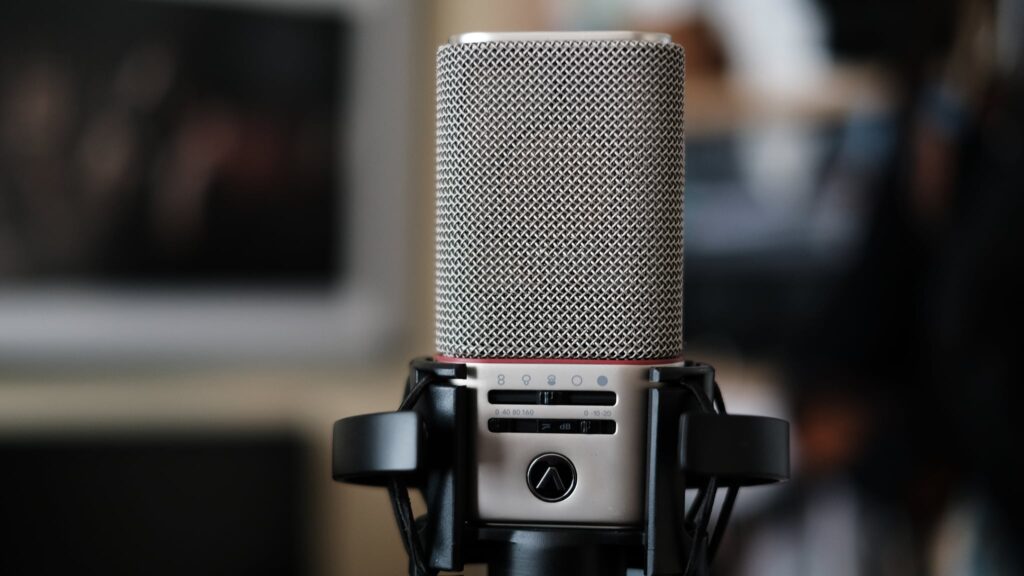
I’ve many different types of headphones with all manner of price points. To my absolute amazement the ones I love the most for working in the studio are also some of the most inexpensive. These are the own brand studio spares M1000 headphones. These were recommended to me by my producer, otherwise I would have dismissed them for being too cheap! I’ve also used a number of AKG headphones at twice the price, but these are my go to units.
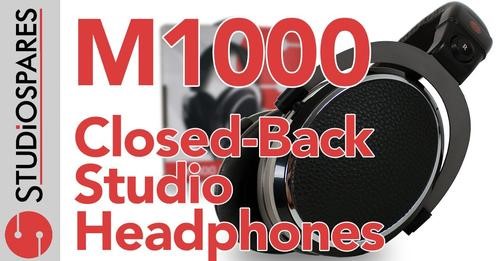
All of the above recommendations are in my view both excellent and quite affordable. Its more important than ever to ensure that all music releases are recorded to the very best sonic standards and these items will really help with making that possible. That said, as my producer always says “Its all about the songs” You can have the best gear in the world but are the songs really well constructed and performed?
I’ve noticed in recent times an increasing number of tantrums and whining online on social media. Of course there will always be people complaining and moaning, but this seems to have reached an all time high. A lot of the clashes online exist where some artists believe they have a god given right for social media and the wider public to support their music, not appreciating that firstly social media platforms are not charities to support artists and secondly people have all manner of tastes in music. Its often a case of
“Don’t confuse me with the facts, my mind is made up!”
There are many recent examples of persecution complexes where aspiring artists insist that anyone who may have a different view, is out to get them. This of course presupposes a level of importance that anyone would spnd the time and energy in such a scenario and in most instances these individuals are unknown as artists.
One of the reasons why they are mostly unknown is that they don’t have the communication and listening skills to realise that outside the echo chamber of a small group of super fans, they may learn something useful from engaging with the wider world and especially with other professionals. I am reminded of this classic Carry On 1960s clip seen below.
I fully appreciate that artists starting out need assistance and money can be tight, but how we frame requests for help can and will make a massive difference in the responses we get. Here is a classic case of how not to seek assistance and then to through a tantrum because others may disagree with you! The same artist has a number of services and products and describes themselves as “music producer, video director, composer, lyricist, multi-faceted musician,visionary artist” offering everything from badges to mediumship services! A cynical person might suggest that anyone with “second sight” may have spotted the car crash they were heading to online with such daft postings…
This aspiring artist posted on a number of social media forums that they wanted a roadie for a day’s work, but this would be unpaid, except perhaps for expenses that the artist may able to pay in a few week’s time. Unsurprisingly many online pointed out that it would be standard to at least pay minimum wage, especially as the artist also added a number of stipulations to the request. The ad was framed as “artist hiring” which would have got a few people’s backs up as “hiring” normally means some form of payment, even at a basic level…
Somebody commented that its not reasonable to expect somebody to work for a full day with no pay whatsoever and the artist threw a tantrum at such a suggestion. The thread was then picked up and posted on Reddit as seen below with a huge amount of replies, none in the artist’s favour!
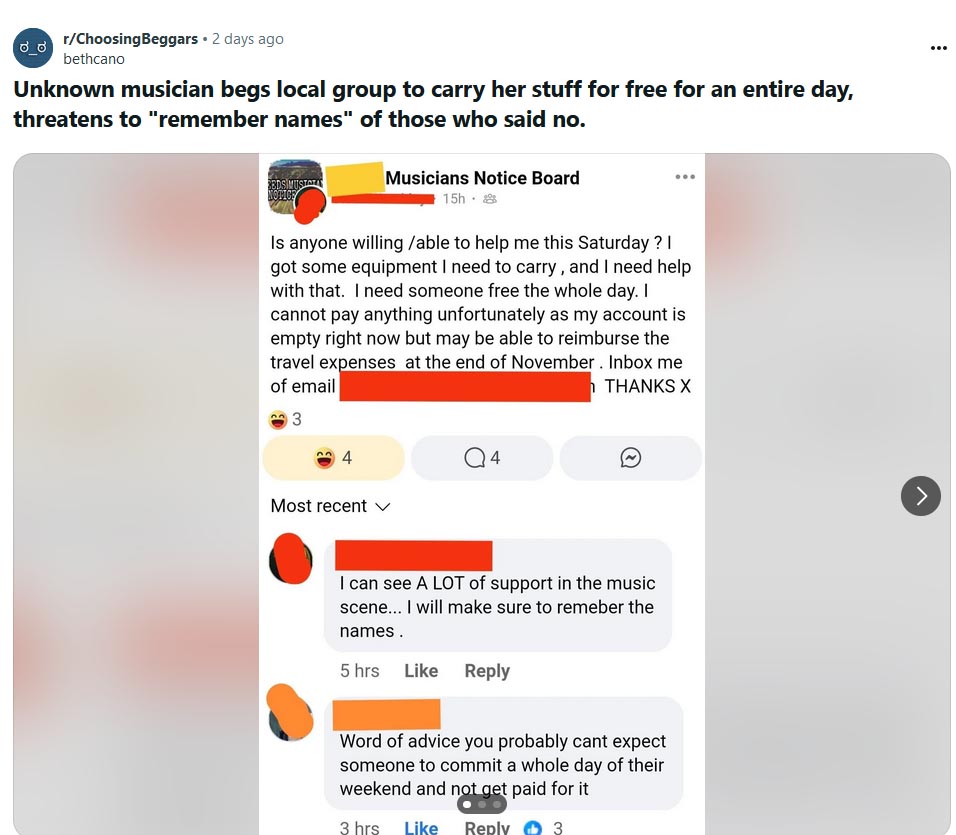
I don’t doubt the good intentions of the person making the request, and appreciate that they are financially struggling to the extent that they are also pleading for contributions for a new speaker to replace one that is broken.
The problem here in my view is that they don’t appreciate that their tone and skills in communications is really dreadful and it creates a terrible (I assume unintentional) image that would not encourage financial or create assistance.
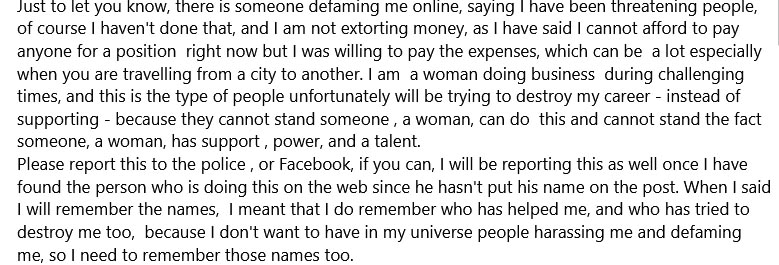
The idea that people have the enthusiasm, motivation and time to “destroy” this person’s career is in my view a bit of a stretch on so many levels. The same person also called challenges to their posts online “hate speech” which should be reported to the police. Of course this is another example of artist tantrums with little or no awareness about what they are actually saying as “hate speech” as defined by the CPS is
“public speech that expresses hate or encourages violence towards a person or group based on something such as race, religion, sex, or sexual orientation (= the fact of being gay, etc.)“
Of course there was no “hate speech” in this instance just a person throwing a tantrum because they didn’t like the feedback they received to a very poorly framed post. One of the big problems with social media is that some artist super fans create an echo chamber that is not helpful to the artist and can create delusional beliefs.
I doubt if there would be a queue of individuals wanting to spend the day carrying musical equiptment for such a person and I would be surprised if the PayPay requests for financial assistance will be streaming in either. The admin person for the FB group where this all kicked off, politely pointed out that nobody had engaged in any harassment and the fact that this artist happened to be a woman had no bearing on what ensued. I am reminded of what an old boss of mind used to say about such characters who are always complaining
“They are well balenced, a chip on both shoulders”
Check here to read about “The Streisand effect” where an individual’s complaining only fans the flames and creates more of an issue. Of course in this instance Streisand is an established artist not somebody on the local pub circuit! In this situation threatening people on Reddit cranked the posts to over 400 in just 48 hours! A classic case of ‘stop digging” in such situations and insisting that you are being attacked or defamed! In the big scheme of things such behaviours always ensure that artists are not going to reach a wider audience as they don’t have the skills to connect with a wider public. There is in such instances always a hugely inflated sense of self importance that is often totally delusional. I fully applaud any artist trying to make a living especially in these tougher economic times, BUT some good manners and less aggressive tone will go a long way towards building supporters above and beyond the fans in the echo chamber.
I set up Green Eyed Records to encourage creativity through collaboration. That’s really how artists can best reach a wider audience, not by throwing tantrums online and insisting they are right on all matters.

Over the years I’ve become a collector of musical instruments, many of which have inspired a great deal of my songwriting. To my total amazement with my first band The Small Change Diaries, the ukulele was the spark that generated writing a host of early songs.
In later ensembles, including “The Caravan of Dreams” and “Nick Cody & The Heartache” my writing and performing was mostly around acoustic and electric guitsrs. I have an ever expanding collection of great instruments I have collected from all over the globe. Below is a video that is a brief snapshot of how many of those instruments have been used in the creative process.
I am a big fan of Takahiro Shimos work and own a number of his acoustic instruments as well as an electric tenor guitar. All of these are fantastic in how they sound and how they look. I’m also a big Collings fan and was lucky enough to meet Bill Collings before he passed. I own a bunch of his guitars and ukuleles, all of which are fantastic.
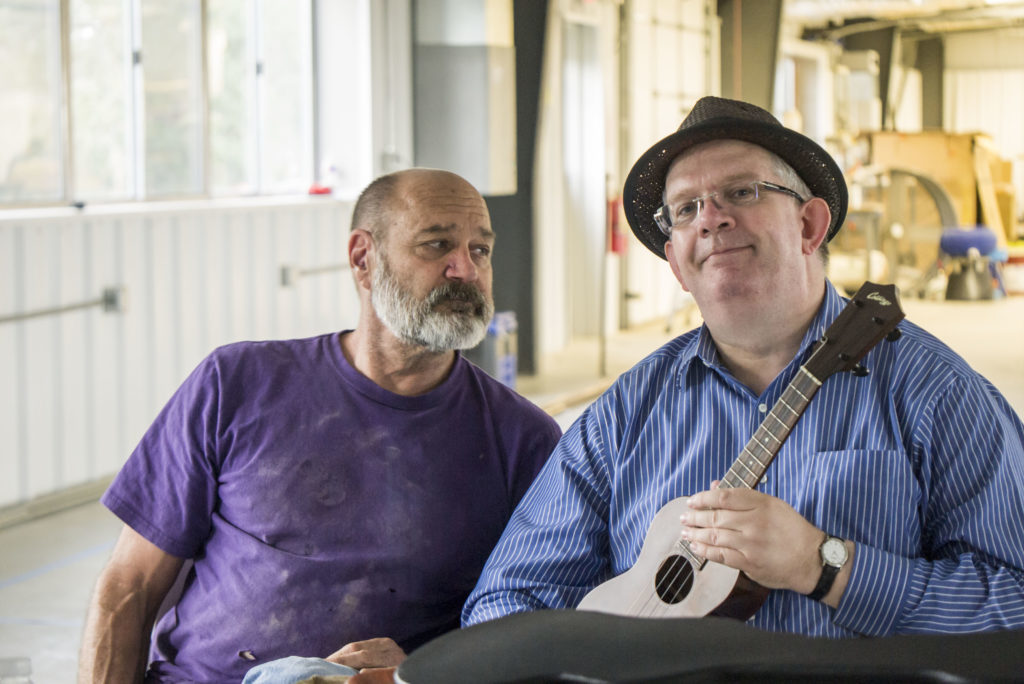
Below are some of my ever expanding instrument family
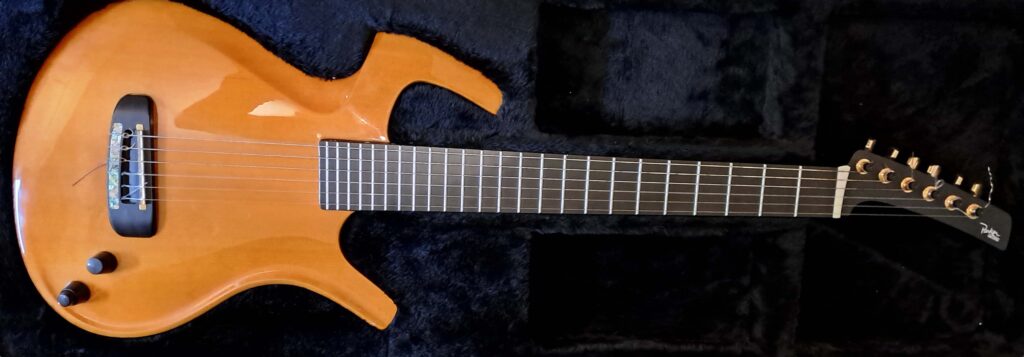
Parker Bronze Fly
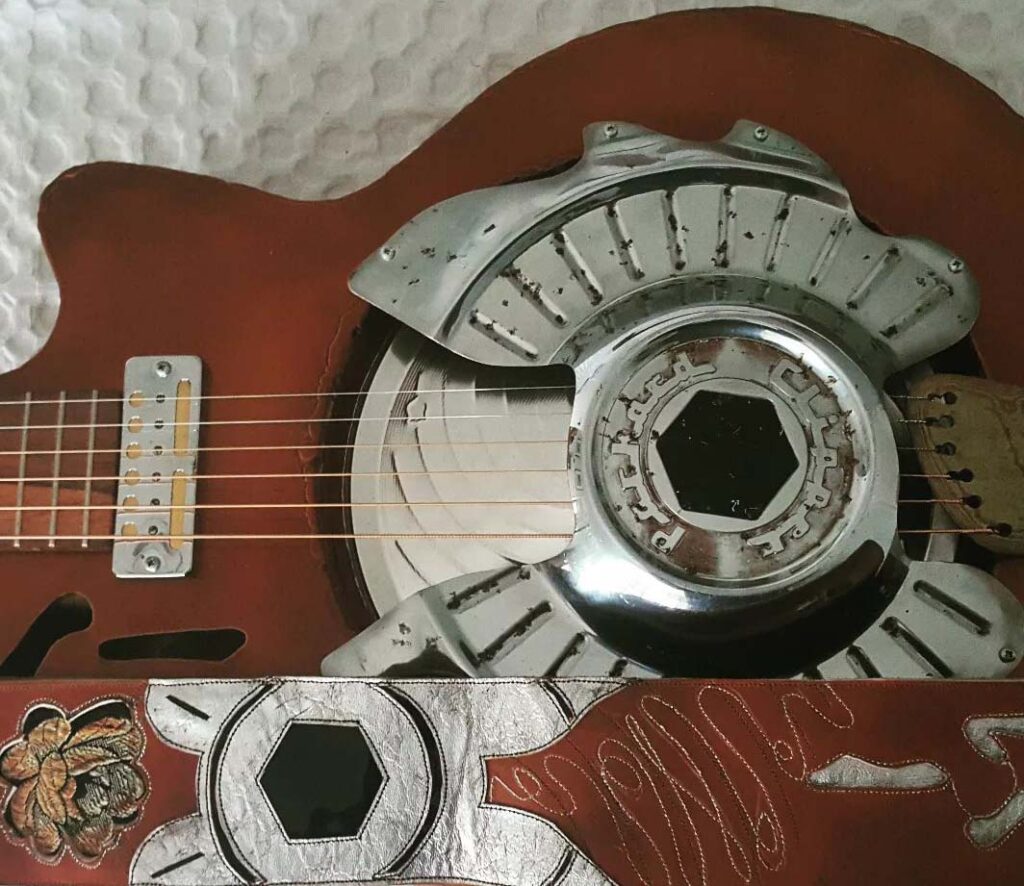
Larry Pogreba Reso guitar
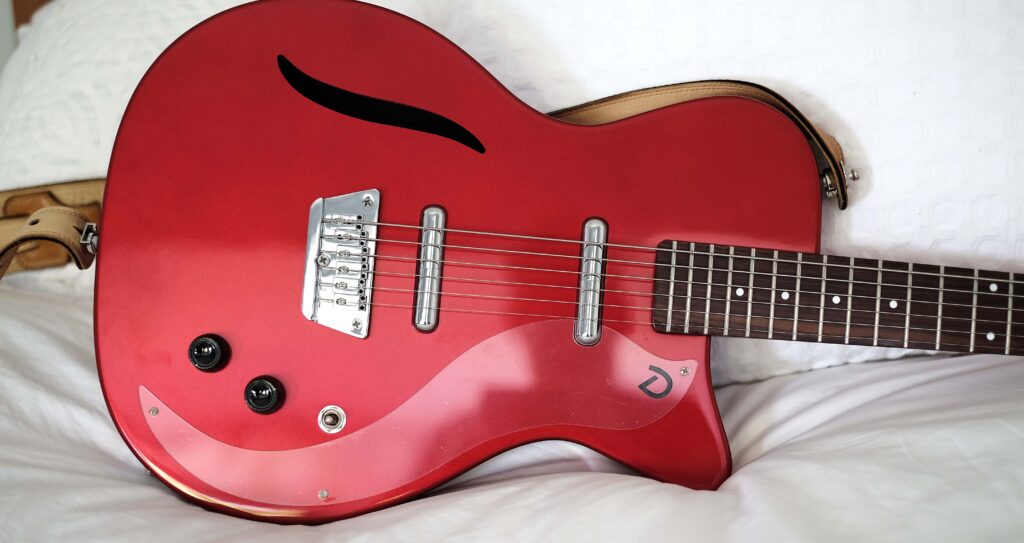
Danelectro tenor guitar
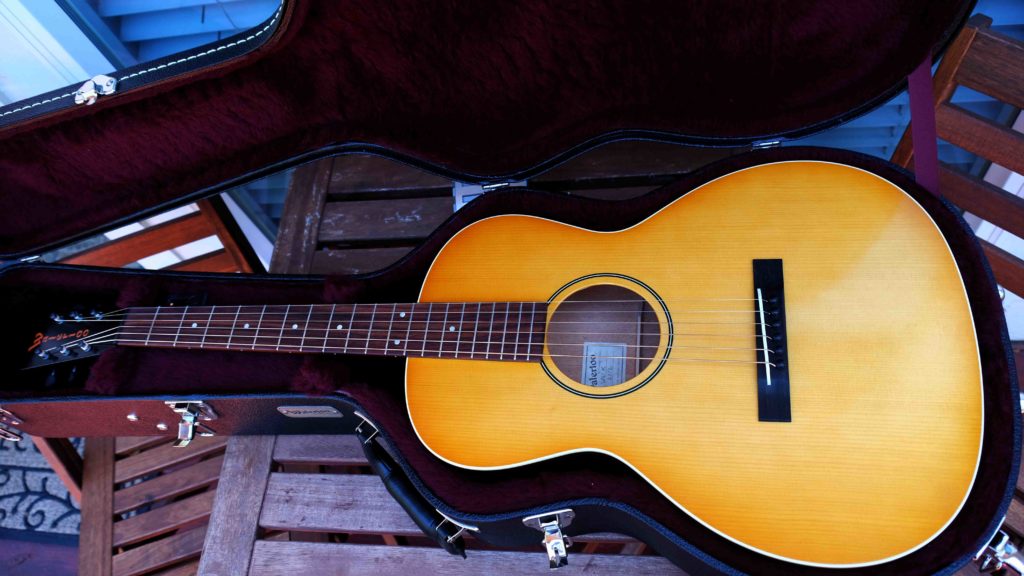
Collings Waterloo guitar
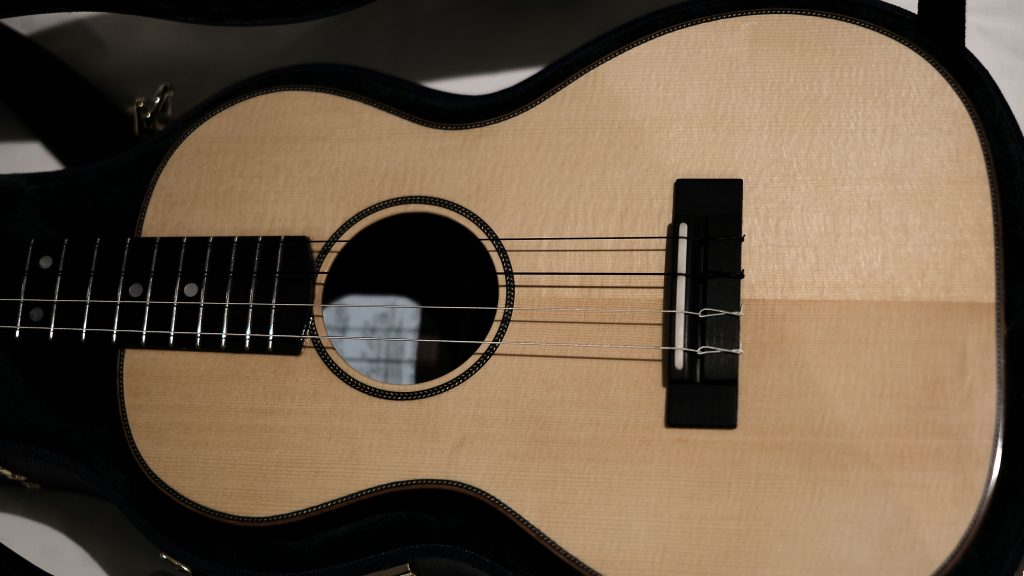
Shimo baritone ukulele
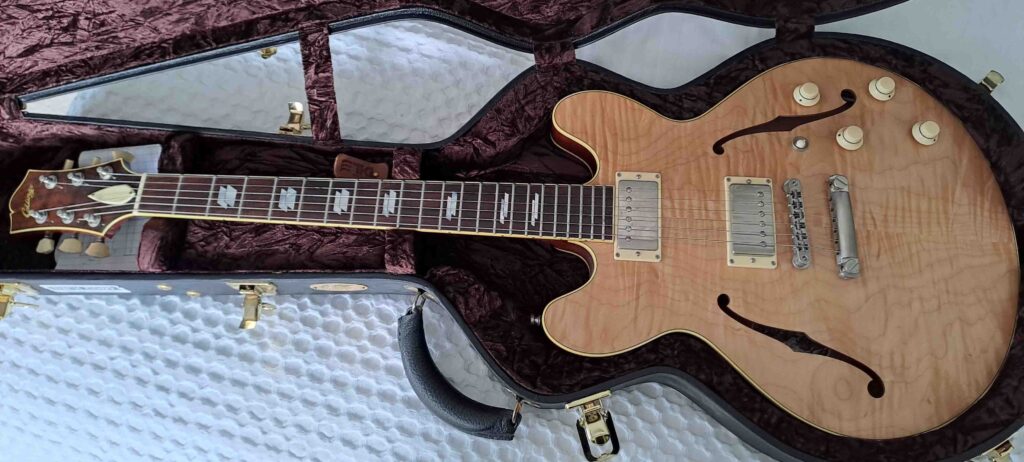
Collings I35 electric
Any artist who plays live will appreciate that venue experiences can vary massively and at times can render an artist speechless and not in a good way either… Here are some real life observations that you really couldn’t make up
Many years ago I was asked as a duo to do a set for a charity in Leeds market. This was in the very early days of playing live when I assumed that any host would have sound gear sorted for any musical event. We turned up to see that there was a PA at the back of the open air market with all market traders going about their business as usual, so not eactly what we anticipated. There were literally three people listening and a dog. Wose still throughout the 45 min acoustic set, there were constant chants of ‘GET YOUR FRESH FISH TODAY, MISS THIS AND YOU’LL MISS YOUR WAY HOME” Its like some mad dream, where you wake up and think ‘WTF was all that about?” except this was no dream…
In the early days of playinmg with the 5 piece Caravan of Dreams ensemble we did a bunch of local gigs to warm up before an album launch. One was in a small tavern that would make for a low key gig and seemed like a good plan. I always like to arrive early ahead of the rest of the band and meet up with my sound guy. Experience has told me to always bring your own sound person for a good performance and personal sanity. When I landed Carl (the sound guy) seemed to be busy taping up some speakers which seemed a bit odd. On asking him about this he commented “They said you didn’t need a PA for the evening, so I’m having to put together a work around so the audience can hear you. They loaned the house PA out for the night!”
I assumed that longstanding venues that had been in existance for decades, would have basic gear in place for bands. I have since learned ‘ASSUME NOTHING!” We again turned up early noting once again it was a tiny stage (but we are used to that) and started to set up the PA. We found the monitors, but no leads to plug them in. Once again nobody in the venue seemed to know where these may be located…
Ok, lets not denegrate all Arts centres, BUT often these are run by volunteers and this can make for some “interesting experiences.” On my first ever duo gig, we had “Pete, the sound guy” My partner for the evening (on seeing him) spouted “Oh no its Pete!” This meant nothing to me at the time until we started playing and I realised her concerns. We had essentially two sound settings for the evening. the first was massive feedback which was highly unpleasant for the two of us on stage as well as the audience. The second option was NO SOUND AT ALL IN THE MONITORS. I was on stage playing to a packed room and I could hear exactly NOTHING! At another recent arts centre experience, the stage lights didn’t work and the volunteer commented “Yeah mate, that board has been broken for ages”
My band “The Small Change Diaries” played “The Grand Northern Ukulele festival twice. There was a strict limit on 20 minutes for any artist set, so we may squeeze in 5 songs at best. In both instances there was a problem with sound either in vocals or in the instruments. Again the problem was mostly not having professional engineers and two little time to ensure the sound was at a good standard. After the second experience I decided that I’m done with such events as it doesn’t make for either a great playing or listening experience!
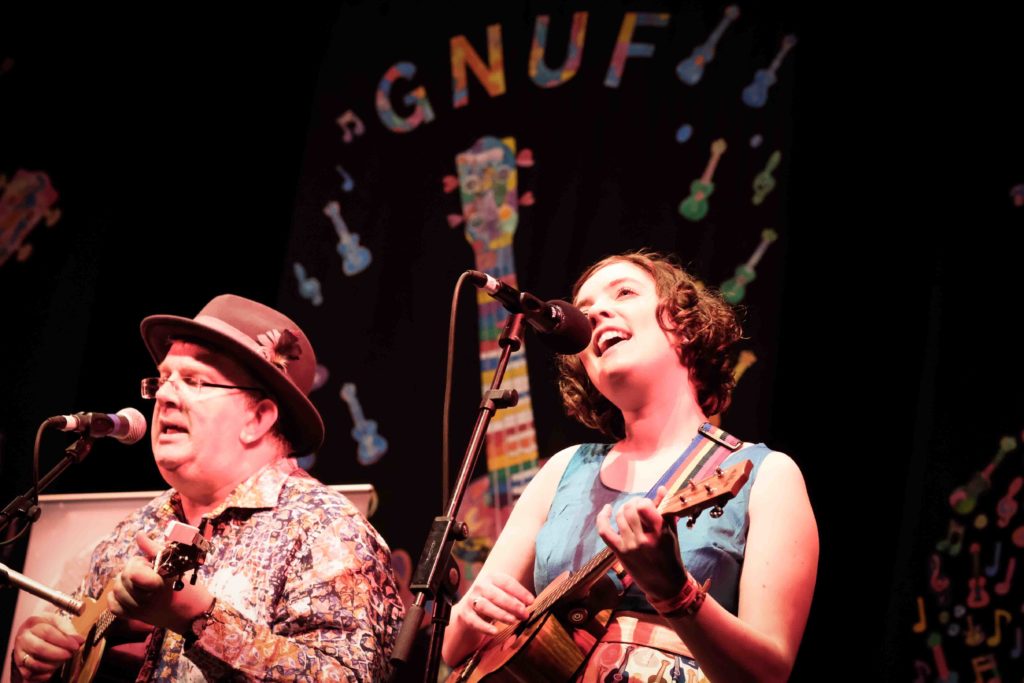
Despite these nightmares, there have been some great experiences. Playing The Lagoa Guitar Festival in Portugal was terrific. The venue had been built for acoustic acts and the sound guy was first rate! In Leeds “The Old Woollen” proved to be a superb venue and I’ve done support acts for Martin Simpson and Jon Gomm, two artists who insist on great sound. I have learned to pick and choose venues and to look at Fri – Sundays for live events. Post covid there is from what I see more of a reluctance to go out mid week. I also now only play at and/or attend events where its a great listening/watching experience.
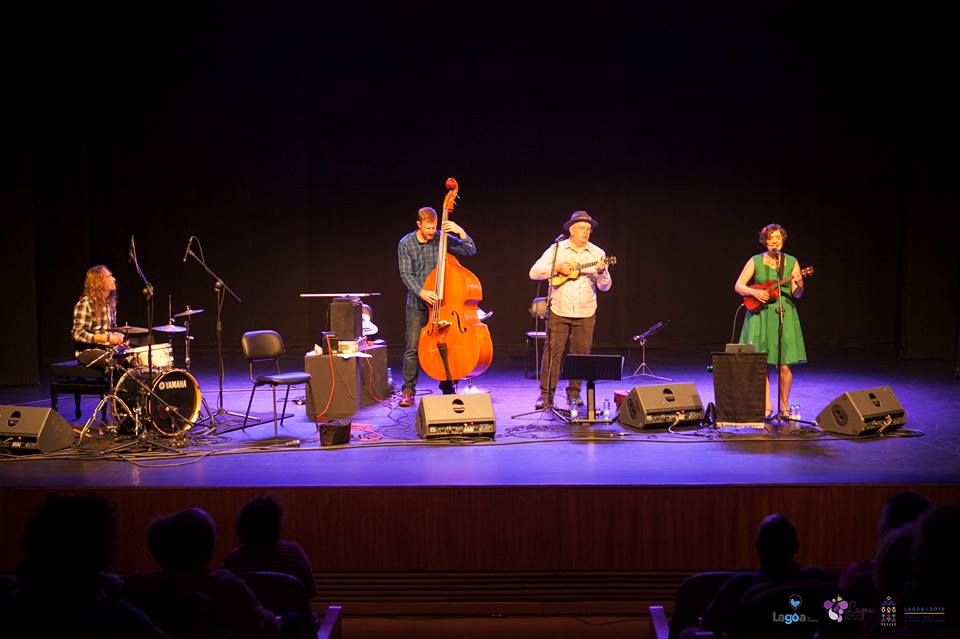
We just finished our first show playing material from the “Covering these tracks” album. This is an exceptional ensemble, “West Yorkshire meets West Coast USA”
This is a different feel and vibe to other ensembles to date and its all acoustic and a 6 piece band. For once I’m only playing on half the set, the rest of the time, I’m up front doing vocals. Its a very different experience, but I’m loving it. Its like finding my own “E Street band” with Harry Orme as MD playing guitar, Dave Bowie on bass, Rich Ferdi on percussion, Towse on vocals and Corwin Zekley on violin.
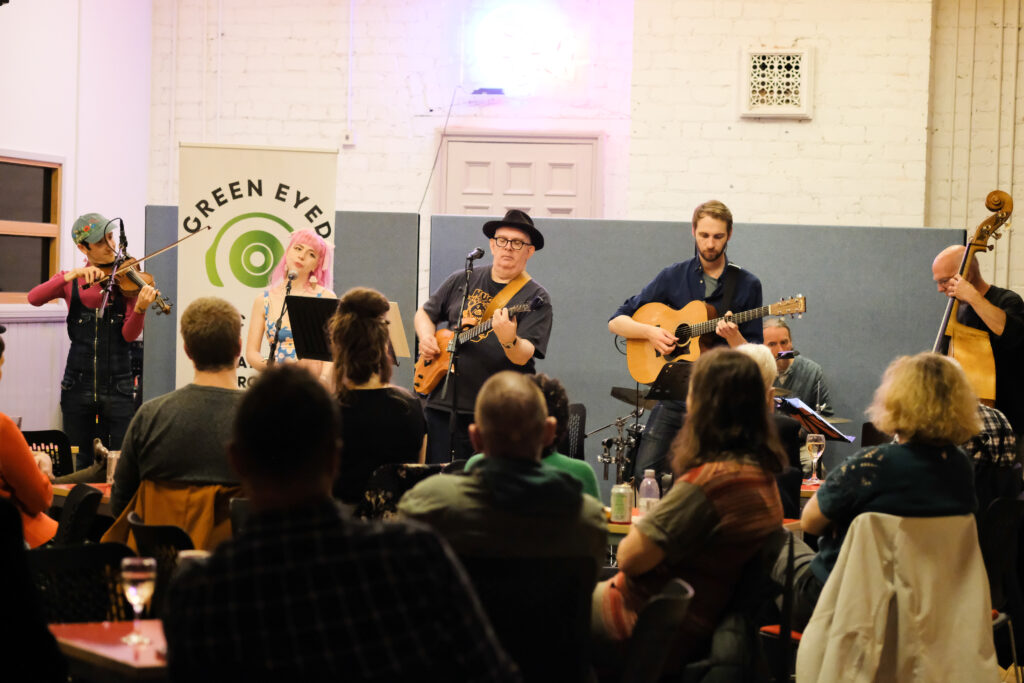
Its a unique experience fronting a 6 piece band and veryof course the interaction between players is crucial. Towse have played together as a duo for years and Harry, Dave and Rich are an extraordinary trio. I’ve never felt that I’ve been in safer hands and of course Grace Fellows aka Towse is an extraordinary singer with a superb musical instinct. We’ve already working on the follow up to Covering these tracks including Steve Earle’s “Fearless Heart” which we played on the night live. This project continues to be really inspirational and allows me to dig into decades of listening to great tracks. Volume 2 of “Covering these tracks” will include songs by Nick Cave and Fred Eagelsmith among other artists. Harry Orme has become a game changer in this project, a brilliant musician and all round nice guy who is a joy to work with.
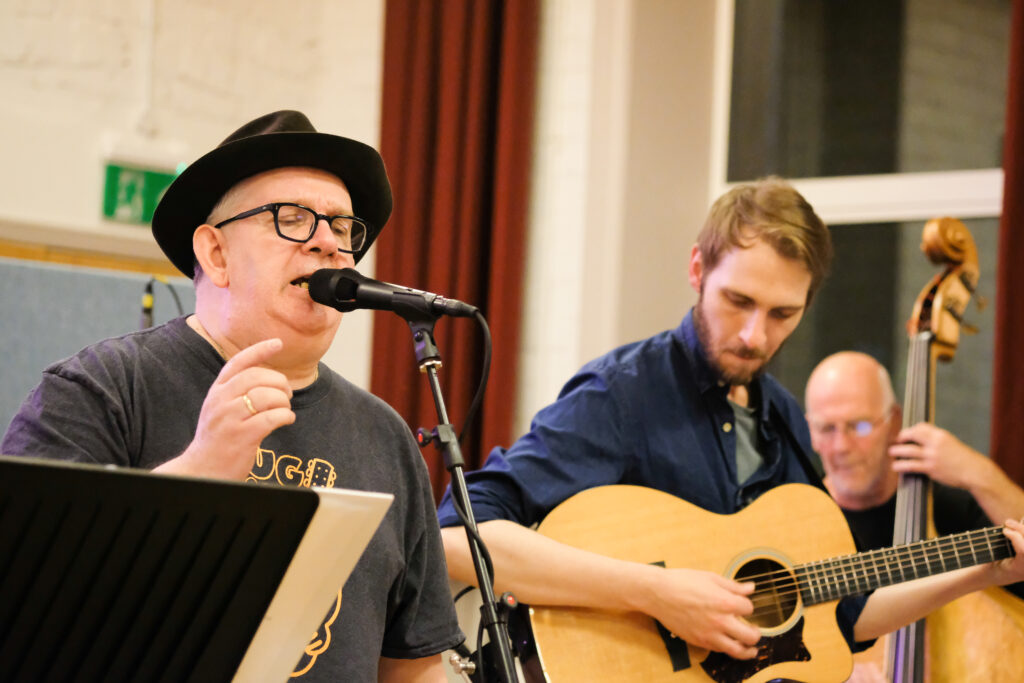
Towse aka Grace Fellows and Corwin Zekley are a fantastic dynamic force and before this live event they had played 40 gigs across the USA. I’m constantly amazed by their performances, they are unpredictable, provocative and technically superb. I was delighted to have them support Jon Gomm last year adn look forward to new live shows in 2024. We are on a roll in terms of recording and they never disappoint in their session work. Playing live with them is a wild experience and they sound amazing as part of the full band. I’m sure we will record a lot more tracks together.
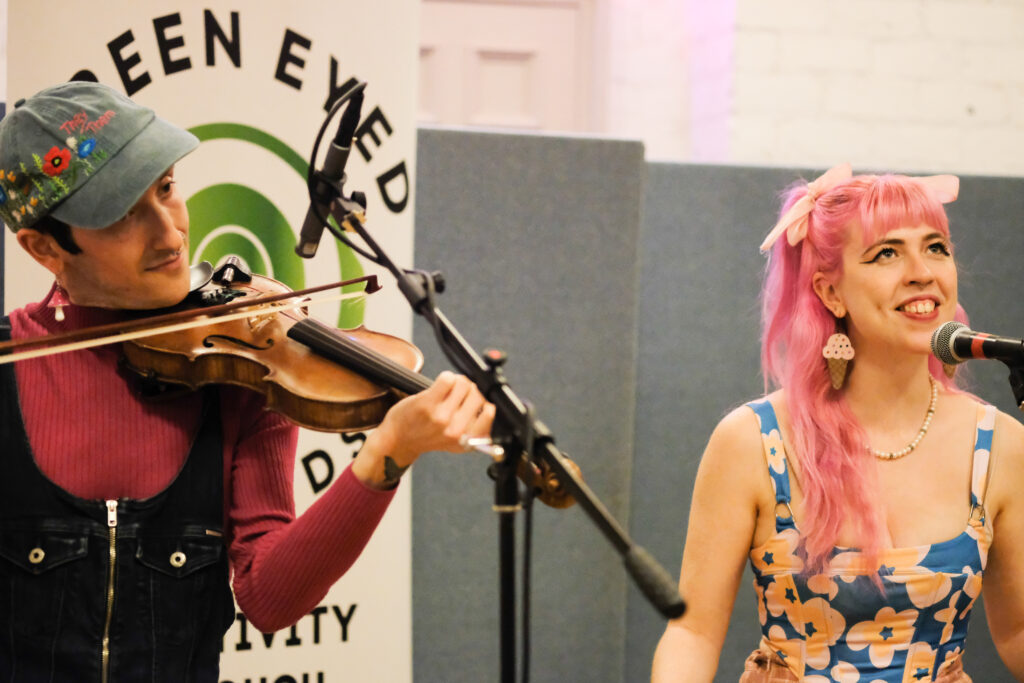
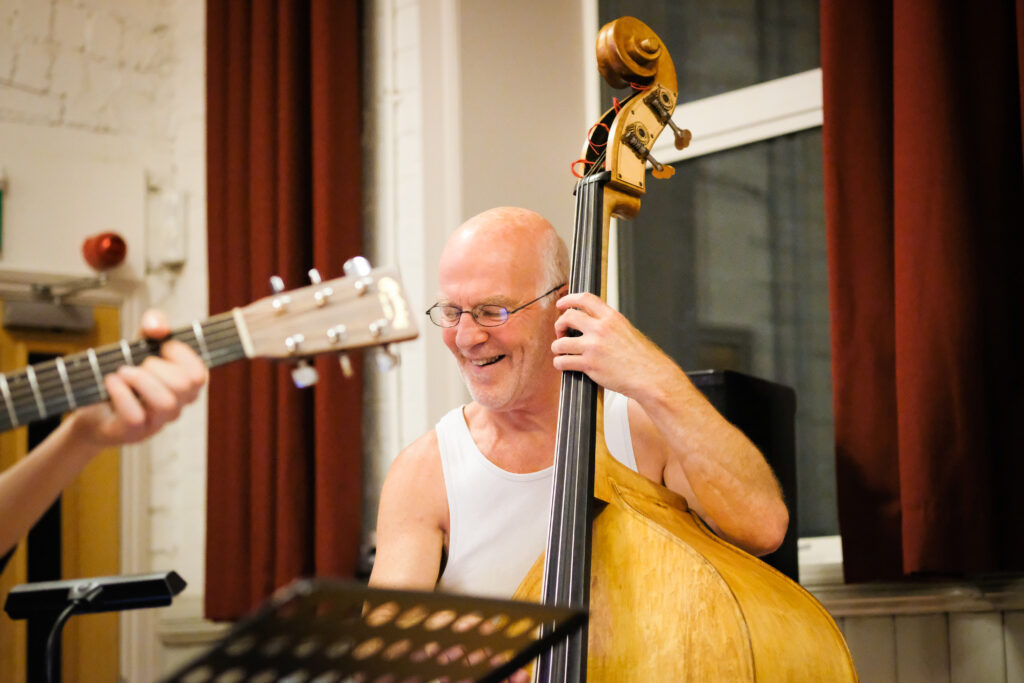
The audience reaction to the set was fantastic and I had scores of e-mails and private messages the following day. This is the first time I have ever played material by any artists other than myself and performed only doing vocals. Fronting a band of this quality is quite an experience and its an absolute joy to be play with them both live and recording in the studio. We’ll be doing more shows in 2024 and releasing more material.
A grassroots venue is described as “a venue with less than 350 capacity.”
Such venues are traditionally for entry level musicians, some limited activity in established acts. Many such acts develop their craft in such places, before moving onto playing to larger audiences. Some of my most memorable and most loved music evenings have been at grassroots venues. These include seeing Joss Stone early in her career in Manchester and The Notting Hillbillies at The Astoria in Leeds which had a capacity of just 150 attendees.
“The UK is set to lose 10 per cent of its grassroots music venues in 2023 – with calls growing for the “major leagues” of the music industry and larger venues to do more to pay into the ecosystem and save them.
The Music Venue Trust have revealed to NME that 67 venues have closed so far this year, with 90 currently working with MVT’s Emergency Response. Roughly half of those are likely to close in 2023 – giving a total of around 100 grassroots music being lost from the UK in 2023; that’s 10 per cent of the number of independent gig spaces in the country.”
My own observations are that in this post covid and tougher economic era, its harder than ever for grassroots venues to get capacity audiences. I noticed that one local arts centre that used to have regular events, had huge gaps in the diary. This is a well located venue and has a tradition of regular acoustic nights, currently all under threat. Many major artists from the Leeds area started out in local grassroots venues and the ongoing decline of such venues will in my view massively affect the future of bringing great music to the public. These kinds of venues are the life blood for new music and their loss will create a big gap for audiences wanting new creative content, as opposed to tribute bands and open mics. Both of those are welcome, but without the emmergence of new music, we may all be left with a world with far less creativity and joy.
I’m also noticing that in these tougher economic times, there is a trend towards nostalgia and the major acts from 70s, 80s and 90s are in many instances doing really well. Other more recent mainstream artists like Taylor Swift and Ed Sheeran are attracting massive crowds. Of course its personal choice but when I watched the most recent Glastonbury, I was really underwhelmed by what I saw and heard. To my ears it was all pretty predictable and dull. When I see a performed on a main stage at that festival performing to backing tapes in my 100% biased opinion I think its not a great sign of new creativity. Of course many may and are welcome to disagree.
I set up Green Eyed Records to encourage discussion about bring music to a wider audience and to support creative artist development. This continues to be a fascinating project and has given me a new insight into “the music business” and how a lot of what happens in this industry is in my opinion pretty crazy. Artists find it harded and harder to make any kind of living out of music, especially with the advent of streaming that’s killed a lot of income from products.
Joni Mitchell once commented “Don’t it always seem to go, you don’t know what you’ve got til its gone…” Ultimately if people don’t go out to see live music, such music will increasingly disappear. Of course its up to the promoters and artists to work together to keep live music viable. I have massive respect for any music promoter as its a ton of work, often with not a great deal of thanks and not the best financial reward. The phrases any promoter hates to hear include – “Will it be on video to watch later?” and “I can’t make this one, but can you keep me posted about future events?” Of course sometimes the second question is genuine, but often the suggested intention never translates into any actual action.
My observations are that post covid, people are less motivated to go out to local events. Some of this is for health concerns and a lot of this behaviour is due to economic considerations. As one seasoned tour promoter commented recently – “People are skint Nick, they literally have no money for such outings”
I’ve been watching great artists for five decades, from the original Pink Floyd Dark side of the moon tour to much smaller gigs. The size of the venue and audience numbers are a big factor in determining the audience experience. Pricing is also a filter for attracting audiences. Some of the best music I have ever seen has been at the NYC Village Vanguard with 125 capacity and $35 a ticket. Doors are at 7.30 pm, arrive 7pm and you can be assured to be in the first two rows! Another great venue is The Beacon theatre also in New York with a 2600 capacity. For many years I saw The Allman Brothers play there. Over the years they played there 230 times with terrific guests. Tickets were massively in demand and I’d expect to pay around $160 for a ticket for an amazing 3 hour show and it was worth every dollar. It was a great seated venue and the sound was always excellent. I saw them play with Eric Clapton for $97 in the middle range seats.
Of course in the UK prices will massively vary from local venues to arenas and its all down to personal preferences. If I am hosting artists, the range is usually 12 – 20 pounds for a ticket. Often the pricing can make no difference to audience turnout for known artists, but my philosophy is to always make music affordable for music lovers. This is why I will always agree fees with artists and band members ahead of live events and everyone is assured of being paid regardless of audience numbers. I have massive respect for any artistic promoters as you need nerves of steel when it can be tough to get past that break even point.
Sometimes the actual venue where the music takes place is not really on the ball. I’ve many instances of thinking “WTF are they doing?” in terms of making really basic business mistakes. These include having broken links for people trying to book tickets, not replying to e-mails and phone calls and generally presenting a “the customer is bothering me” attitude. In recent times after an event I contacted a venue to book another evening, only to be told “Person X is too busy to talk to you!” I mentioned that I only wanted 5 minutes of this person’s time but was told that the admin person wasn’t taking any calls all day long! This was the third time I had booked space with them and most of the events had sold out previously. When a business ignores core customers, its not going to last long.
This specific venue is mostly run by volunteers and already has massively fewer live events than in years gone by. No surprises why…
I’m currently exploring a new way of running live events that rewards those who take the time to support live artists.In my view those who vote with their feet should get the best access and the best value from artists. I’m genuinely concerned that in this streaming era, artists have less earning opportunities which translates into less ability to fund creative creation. When this is coupled with a downturn in grassroot venues and the effect of brexit on reducing artist earning opportunities, its looking like a pretty bleak future for music.
The new model will roll out for Music for the head and heart/GER events in 2024. Those who have attended and supported events to date will find that they are going to get the best opportunities for future events. I think our world is a better place for music and if we all invest just a small amount of time and energy in support grassroots venues and emerging artists, life will be a lot rosier.
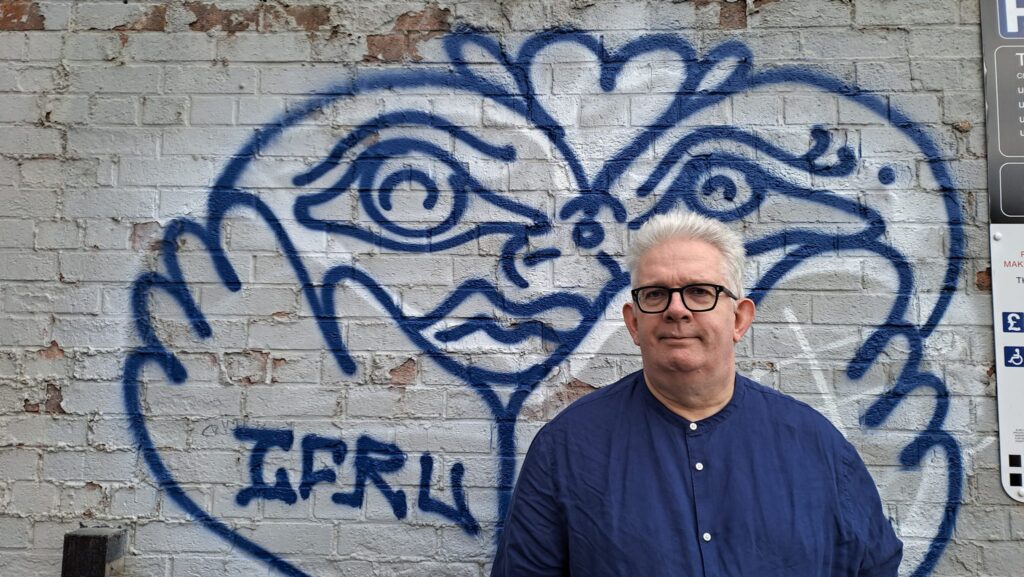
In just under two weeks time I’m running and playing at the Music for the Head and Heart showcase in Leeds, with my band “The Heartache” along with Towse and Harry Orme.
This evening will showcase the Covering these tracks album released at the event. The material is all acoustic, so I have to make some decisions on which gear to use in the live situation. I’ve learned over the years to think really carefully about what works best in a live situation. When I played Lagoa Guitar Festival main stage, I use a Red Eye pre amp straight into the PA with my two ukuleles and with a great sound engineer, I had great sound. This is the most stripped down set up of all set ups, that still delivers sonically.
I’ve learned to keep live gear choices simple, or there can be all manner of problems. I few years ago I ran support for an artist who insisted on a large number of acoutsic instruments all very different and with respect not of the best quality. The sound engineer was tearing his hair out at the soundcheck that wend on for almost two hours and even after this there were major sound issues including an ongoing loud hum that made for a really poor listening experience. My ensemble were left with just ten minutes to do a sound check, but we had perfect sound as we had much more reliable gear and kept everything simple.
I had just two guitars and used a Supro Comet amp with just one pedal used on one song. Good quality reliable leads are also essential in these situations. Too many variable factors is a recipie for disaster. If I am using a few pedals a “Quartermaster” isolation unit is essential. This keeps each pedal isolated from the other pedals, so its total peace of mind for any sonic issues.
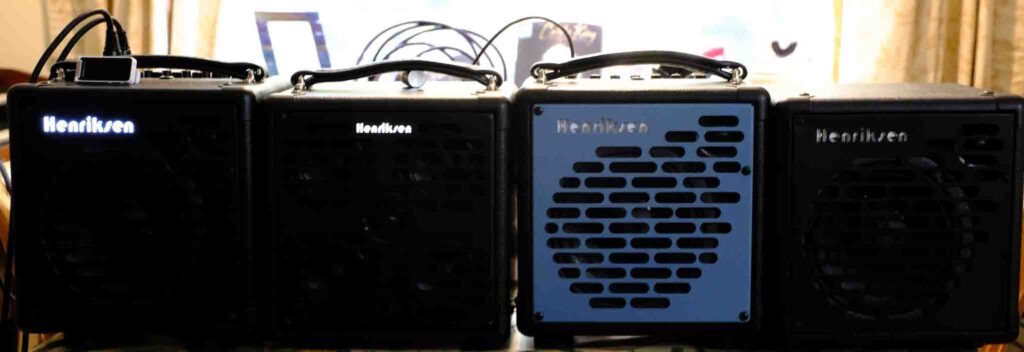
For any acoustic gigs, including the upcoming Leeds showcase, the Henriksen amps are the only choice. I came across these years ago and have never looked back. Previously I’d used Schertler amps that sounded good, but nothing like the Henriksens. Not only are the Henriksens a fraction of the size, they are also a fraction of the weight. I have a couple of two channel bud amps and a one channel blu unit as well as a bunch of extension cabs. There’s nothing that comes close sonically and they offer a huge range of sonic options and crucially are 100% reliable.
For the Music for Head and Heart showcase, I’m gonna use my Parker Bronze guitar. This is a rare and ususual guitar, favoured by Joni Mitchell, but vert rare these days as they are no longer made. They are super light and the Parker Bronze has a great bespoke Fishman pickup that creates a terrific acoustic sound that is tough to get in a live situation.
Unusually for me, this will be my only instrument on the night, following my own advice to keep it simple!
Next week we’ll be signing off on the audio and artwork for the first part of the “Covering these tracks” project. This is a new departure for me as previously I’ve only recorded and released original music, five albums to date, through three different ensembles and a remix project.
This project has surprised me in many ways. Previously I’ve been an avid “no covers” individual, not because I don’t like or appreciate covers, but because I want something new. One of the big surprises is how much I have enjoyed recording these tracks and its given me the opportunity to explore many songs that inspired me over the decades. The first single will be released on September 1st, a classic Fleetwood Mac track “Dreams” written by Stevie Nicks. I’m mindful that I want to create new versions of these tracks and avoid “Nick does karoke!”, and I’m pleased to say we have achieved that goal.
Here’s the running order for the first release
Covering these tracks.
by Nick Cody, featuring Towse, Corwin Zekley & Harry Orme
Dreams (Stevie Nicks) 4.14
Willin (Lowell George) 2.58
Speed trap town (Jason Isbell) 4.04
That old time feeling (Guy Clarke) 4.22
Heart like a wheel Anna McGarrigle) 2.56
Come up to the house/I don’t wanna grow up (Tom Waits) 7.18
I’m delighted to once again be working with Towse aka Grace Fellows and Corwin Zekley. These are extraordinary professional musicians who continue to inspire great creativity. Even when engaged in an extensive tour across the USA they still find time to submit their parts to many tracks on this project. They are joined by the terrific Harry Orme, which was recommended to me by Fergus Quill. Harry is a superb musician and will be contributing almost all the guitar parts on this project. I say “almost all” as on “Dreams” I recorded the guitar part with the Larry Pogreba reso guitar. We also have great artwork for this project from Silka Guy.
The second release of songs will appear in March/April 2024 and we are already working on some of the material that will include covers of Steve Earle and Nick Cave. This project has given me a fascinating insight into how other songwriters write and perform material. We’ll be showcasing some of this material in 2023 at the Music for Head & Heart showcase in the UK. There will be more live events in 2024 to showcase the “Covering these tracks” material.
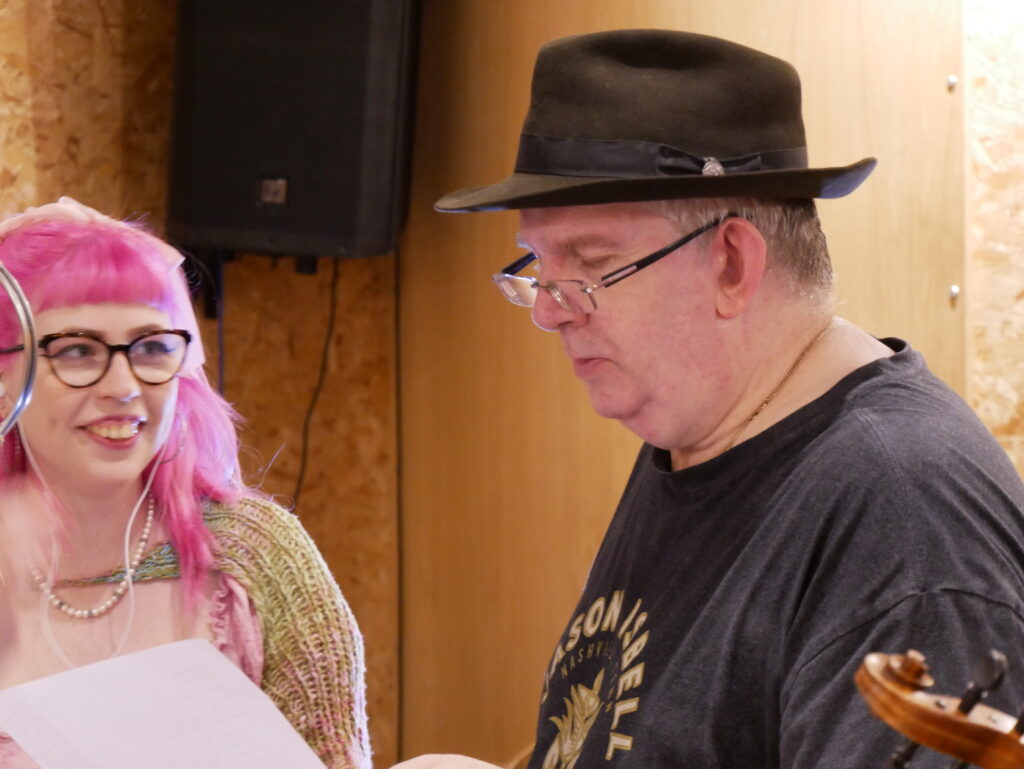
Towse with Nick Cody
During covid I realised how much I missed live music both as a player and also as an audience member. I also realised as a band leader that there is a huge variation in the quality of live venues. My good friend and fellow artist in my first band Jessica Bowie once wonderfully commented “Nick, there atr lots of shitty little gig opportunities out there…” Only later did I come to truly appreciate the wisdom of these words and that lead me to running my own events. This means a lot more investment in time and money, BUT it means that I can create an experience which is for music lovers, with great sound and facilities and where artists receive fair payment for their work.
I live in Leeds which has a music college, so there must surely be a ton of great music venues for artists? Well, not really in my opinion… I’ve asked to help out with filming and photos for some album launches which have been beyond terrible in terms of a listening experience. Two memorable ones were where the lighting was so bad it was impossible to get any decent video and another time where the sound was terrible as the venue wasn’t right for any kind of musical entertainment. In my Small Change Diaries and Caravan of Dreams ensembles, we’ve played many of the local venues and now have a great idea of what makes for a good night out.
I’ve seen many excellent artists play such local venues (often for free or a minimal fee) to have to battle against an unattentive audience, who are not really there for the music. Its in my view pretty soul destroying and these days I’m super picky about where I go to for live music. I’ve seen endless examples of artists playing half empty venues with no actual stage or proper PA or capable sound technician, so the whole experience is pretty poor.
A few years ago I started to host Music for The Head and Heart showcases where we would feature evenings of music from 2 – 4 artists. These were different to standard gigs and many attendees only knew one of the artists. To date they have all sold out and we’ve had great feedback. This means really thinking about the whole experience for an audience and making sure the audience and the artists get the best value for money. It also means being really selective about who is involved in any events, so that we are on the same page. I’m pleased to say that to date nearly all those involved have been brilliant and of course this means building long term relationships where everyone benefits.
I’ve always capped numbers for these live events at around 200, which in my view is a great sized audience. To date I’ve mostly used two venues, one which holds 80 people and another which holds around 200 seated. The above video shows some of the artists to date that have provided great entertainment.
In the last year I have decided to expand the MHH/Green Eyed Records showcases and bring in more established artists like Jon Gomm and Martin Simpson. I need to plan 12 – 15 months ahead if I want the best venues on a weekend rather than mid week which is less attractive for audiences. Special thanks to all those who have embraced the spirit of Green Eyed Records and who have made this live showcases so special.
These are true professionals and the increased investment in securing such entertainers has been more than worthwhile. Both have been very generous in assiting with promoting events and I’ll certainly be working with both in the future. In 2024 I’ll be running more GER/MHH showcases, and of course next month we still have a terrific 2023 event with Towse from USA, Harry Orme from the UK, and my ensemble “The Heartache” appearing on Sept 23rd and HEART in Leeds. Tickets available HERE
I’m an instrument collector and always on the look out for great gear. In recent times I came across the most amazing guitar straps from One off leather that are quite unlike anything else I have seen on my travels across the globe in many of the finest music stores. Charlotte Wainwright who creates the designs is well known in the high end shoe industry and her work is quite extraordinary.
She offers custom designs for artists and the creative work and quality of straps is really superb. Here are some examples of the items already in my collection.

Larry Pogreba reso guitar with custom strap
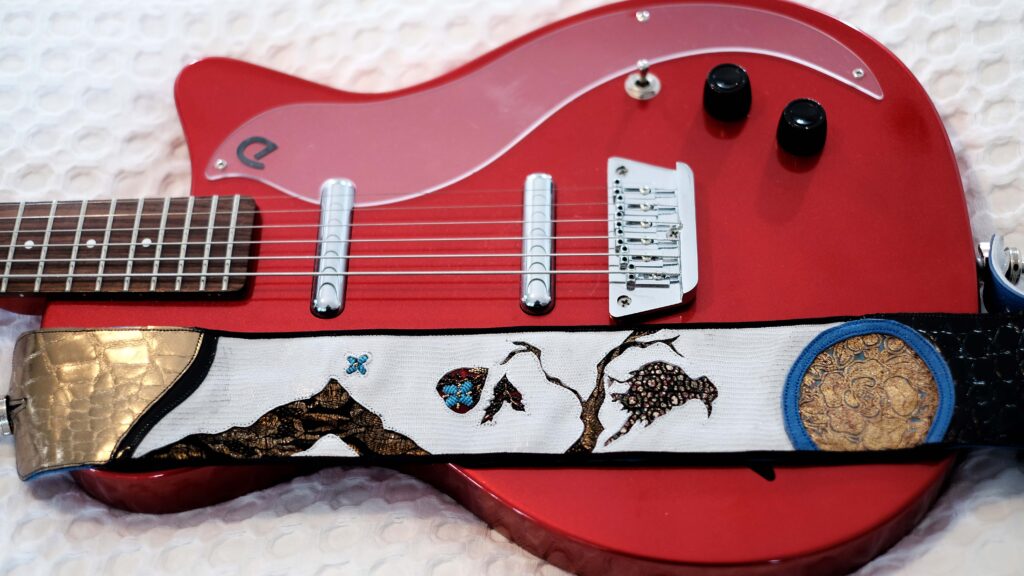
Danelectro baritone with bird strap
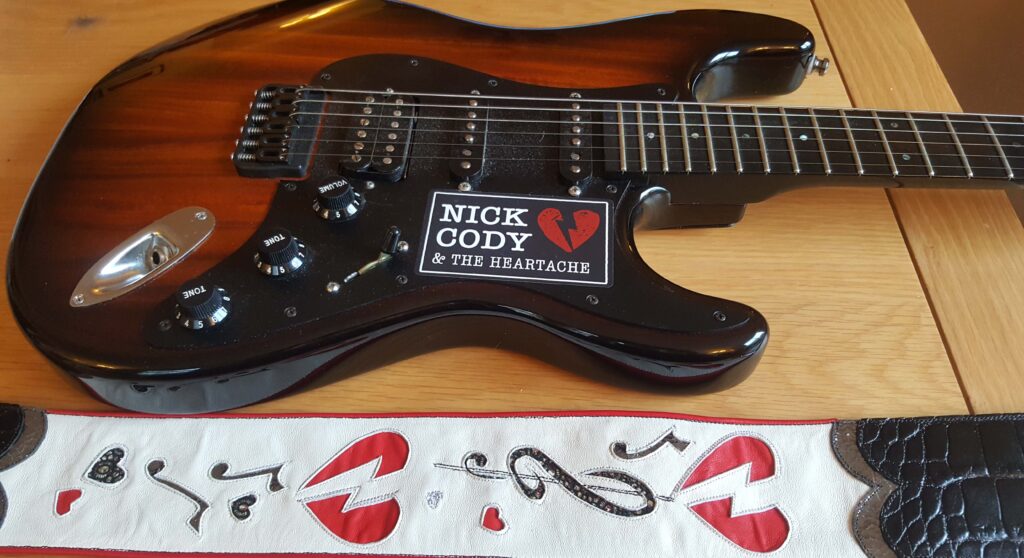
Moses hardtail strat with custom Heartbreak strap
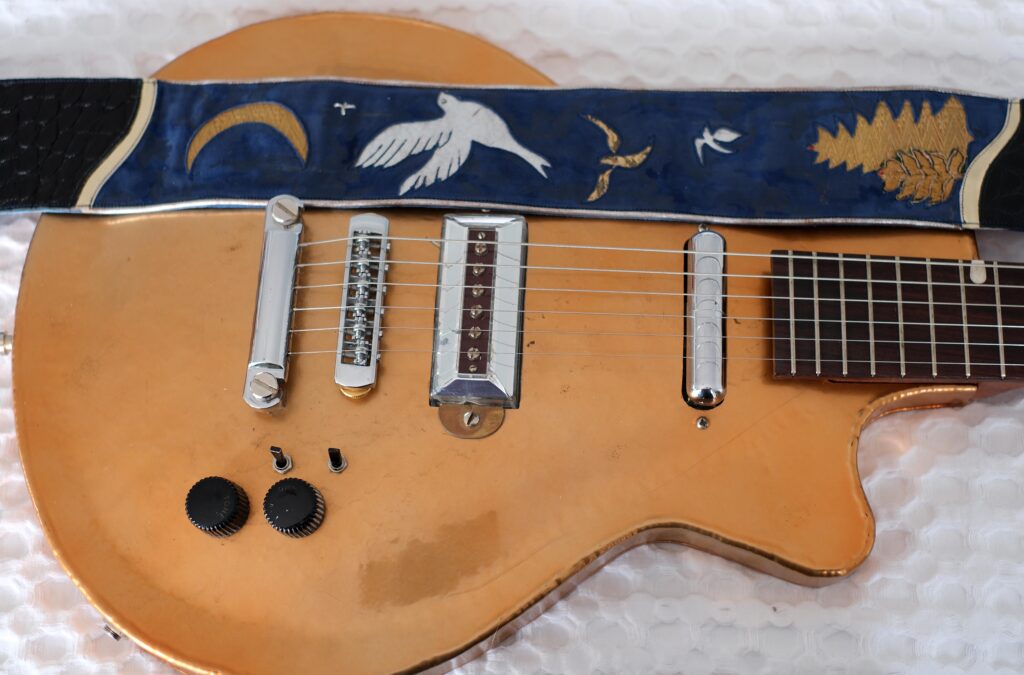
Larry pogreba guitar with one off leather strap
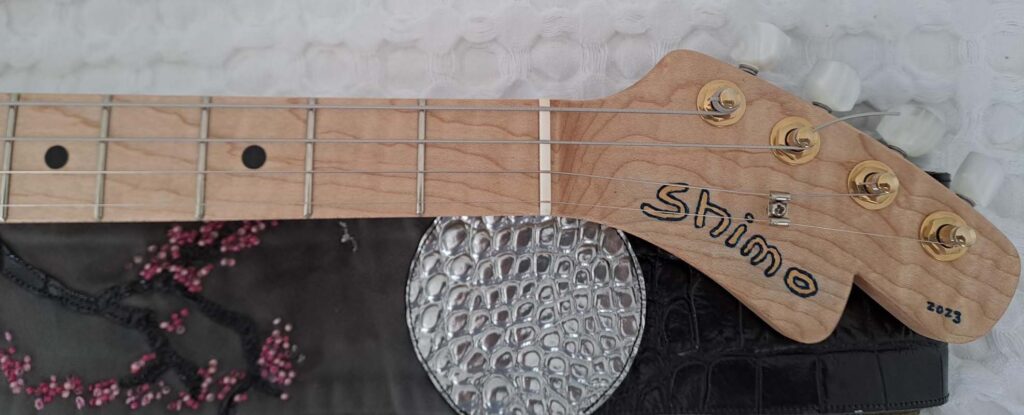
Shimo electric tenor with custom strap
I’m currently working on two very different projects, “Covering these tracks” which is the first time I have ever recorded material written by other artists and the second Heartache album. This means a huge amount of planning, organisation and time management to create the final products. Carl Rosamond remains my go to producer and I have a terrific ensemble of artists contributing to these projects.
In recent years I’ve increasingly appreciated the benefits of having a really great home studio setup and this has become central for all the recent and the forthcoming albums. I’ve invested in buying the best equiptment, including a number of excellent Austrian Audio mics, UAD Apollo interfaces, Synergy preamps and a stack of great tube amps from Supro, Fender, Marshall, Two Rock, Anderson, Egnater, Henriksen, Groove Tubes, Soldano and Mesa Boogie.

All the vocals are done using the Austrian Audio OC 818, which is in my view the best possible vocal mic. I have a permanent set up for recording with a giant 55 inch 4k monitor that is terrific for recording. I’m recording on an almost daily basis and during covid I devoted a great deal of time to using Reaper as a DAW which is perfect for recording.
Once I have locked down the vocals, I send the multi tracks over to Carl Rosamond at RRS Studios. He then sends the stems to other artists from all over the globe inlcuding Michael Ross from Nashville. Laurent Zeller from France and Towse from California. We’ve also recorded percussion and backing vocals live in the studio. Its a brilliant process that is proving highly effective in creating really excellent work.


The recording, mixing and mastering is of course only part of the creative process. Next comes the challenge of planning distribution and marketing. This means radio promotion, social media promotion, hard copy magazine advertising, video creation and other mediums. I have a number of excellent professionals on retainers to assist with ensuring that there’s the very best quality for all released material on video and audio. This all requires a serious amount of financial and time investment. To date I’ve avoided crowdfunding and 100% funded everything myself with 100% ownership and control over the creative process.
I come from a business background and these skills have been invaluable in figuring out the best ways to get my music to a wider audience. Despite what is taught in music schools and suggested on social media, the music “business” is like any other business and :music marketing” is like any other marketing. I find it hilarious that some aspiring artists complain that social media platforms won’t market their material for no charge and seem to forget that all such entities are business concerns and exist like any other business to make a profit!
I set up Green Eyed Records as a resource to share information about how to reach a wider public and in some instances to directly help fund other artists. Those who understand the concept of “creativity through collaboration” appreciate that in these tougher economic times, this is a better strategy for success. Green Eyed Records also sponsors live events and to date we have hosted Jon Gomm and Martin Simpson, two superb artists. This has allowed me to help showcase great support acts like Towse and my own ensembles to reach new audiences that would not previously been possible.
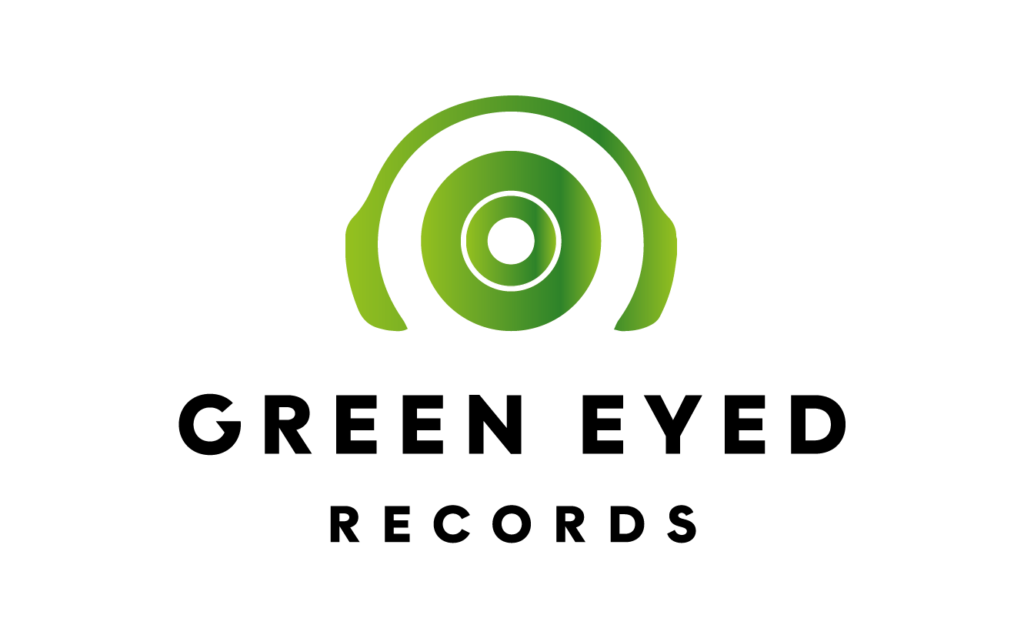
We just finished a session in the studio working up a new track for the 2nd Heartache album due for a 2024 release with Agi, a terrific UK singer. I have known Agi for almost five years and worked with her on the last three albums, for “The Caravan of Dreams, “Code E1” and “Nick Cody & The Heartache”, released via Green Eyed Records.
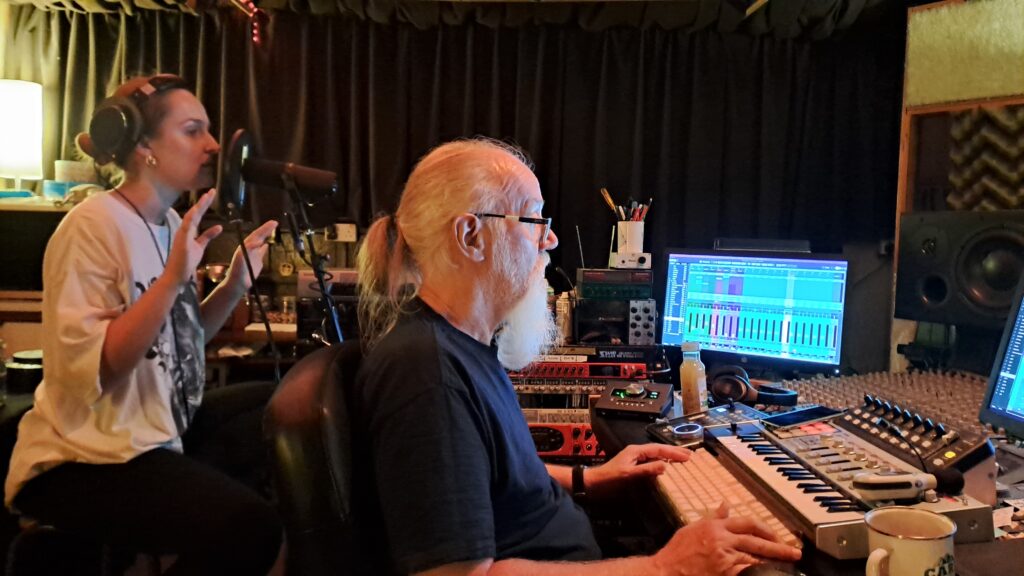
She was also a key member of “The Caravan of Dreams” and is a terrific pop artist in her own right, having released a number of singles over the years.
We spent today layering harmonies for a new track originally recorded by Towse, another exceptional artist. I can with total confidence that Agi has been a total gamechanger for improving my own vocal skills. I’ve had 1 – 1 sessions with her on a weekly basis for close to five years and its been quite a journey. The initial lessons were like a baptism of fire and I coined the “This is proper work!” slogan as I began to appreciate just how much work was needed to develop great singing skills.
Not only is she a brilliant teacher, but she also has great technical insights and all of these were unleashed today in the studio.
Below is one of the first tracks we recorded on the Caravan of Dreams album “Tales of Dark & Light” which really shows her superb vocal range.
Over the last five years, Agi’s encouragement has been a total inspiration in becomeing more ambitious in my own writing. Our weekly meetings are now mostly recording sessions for new projects. During covid we started and continued to do a lot of work over zoom, which has worked amazingly well. I recorded 42 tracks in an 18 month period and I could not have done this without her input.
There are many highlights over the years including when she encouraged me to create the multi harmony title track for the Caravan of Dreams album which at the time was a massive creative leap. Both my producer Carl Rosamond are blown away watching her work in the studio, superb musical instincts in action and an absolute joy to work with.
I am truly grateful for all the vocal assistance and encouragement over the years. I can honestly saw that that she has transformed my thinking on many levels. I’ve recommended her to a number of my students in my other life and they all sing her praises. Its rare to find such warm hearted talented individuals. Our live Caravan of Dreams appearances were fantastic fun and this was truly a super group with Fergus Quil, Jed Bevington and Rich Ferdi all part of the live ensemble. At present we are working on two new albums, the first is an album of covers which is highly unusual fro me out this Sept. Following that in 2024 I’ll be releasing the sencond Heartache album with Agi on many tracks inlcuding “Slowtime” and “Can’t Stop”
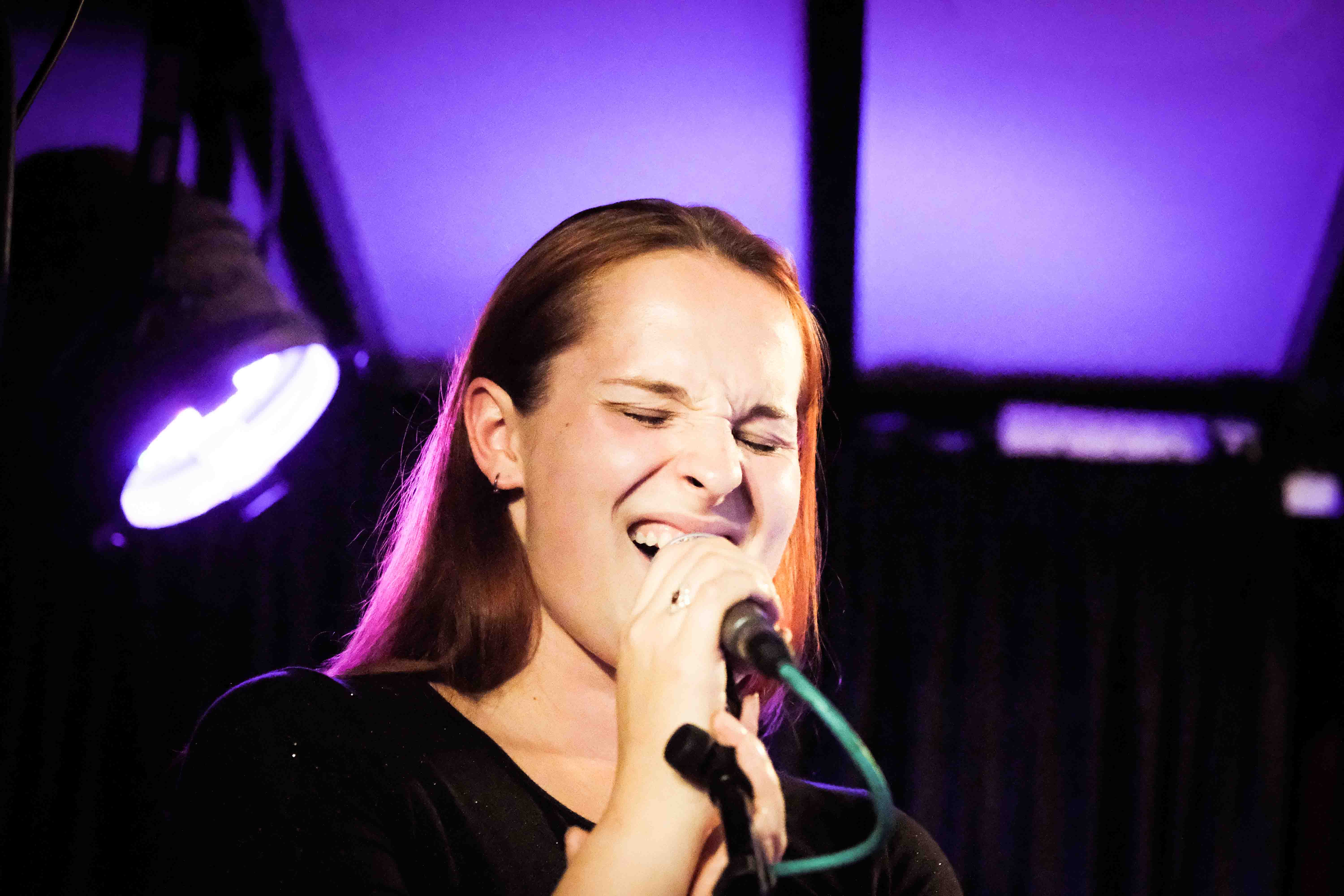
My hope is that she achieves all her musical aspirations and I suspect one day she’ll be quite famous and I’ll be able to say –
“I knew her in the early days!”
I just got back from Eiger studios in Leeds where we spent the day shooting video and rehearsing for the Sept 23rd Green Eyed Records/Music for the Head and Heart showcase.
I chose Eiger as it had by a mile the best facilities for this work and also was really central in Leeds. Mal Williamson came over from Hull to do the video work and Towse came up from London before their two month USA tour starting next week.
I’ve long learned that the best video shoots require proper planning. The right equiptment, right space and right people all contribute to making such an event a success. I’ve seen some disasterous video shoots where there was lack of attention to using the best gear and properly organising time. A big mistake is to focus only on the visual aspect and not pay attention to sound capture and I’ve seen many examples of album launches where hours of video are rendered non productive because there wasn’t proper audio capture! Fortunately Mal Williamson is a seasoned film maker and has superb attention to detail and attention to detail is essential to make a success of any video shoot. I picked Mal up at 10.24 from Leeds station and we has a good 90 minutes before the other artists landed at Eiger studios.
I booked the main studio space at Eiger as this was by a mile the best location for any filming. There were three separate rooms, the main space for playing, the studio and a separate booth that we used for green screen work. This gave us a variety of excellent options and crucially there was no sound leakage from other rehearsal rooms. Unlike some other spaces in Leeds, Eiger is manned by actual human beings who were really helpful with all our needs. Food and drink were supplied by my wife Sue who has become the designated catering manager for such events! She provided a great spread for all involved. Such details are often missed and when people have proper nutrition, concentration is always improved!
Its an absolute pleasure to work with Harry Orme and Towse on a new project which will be revealed at the showcase on September 23rd in Leeds at Heart. These are exceptional professional artists with great creative skills and are easy to work with. I’ve learned to only work with professionals in such projects and we’ve already recorded a number of really superb tracks which are very different to anything I have done to date. Of course Towse was featured on the “All is fine ’til the world goes pop” album described by Jim Glennie founder member of James as
“NIck Cody continues to write great songs that span genres and sound fresh, vital and relevant.’
‘Nick and Towse’s new album is a must have for your next long car journey.
Taking you from the Yorkshire Dales to the US prairies and back again.“
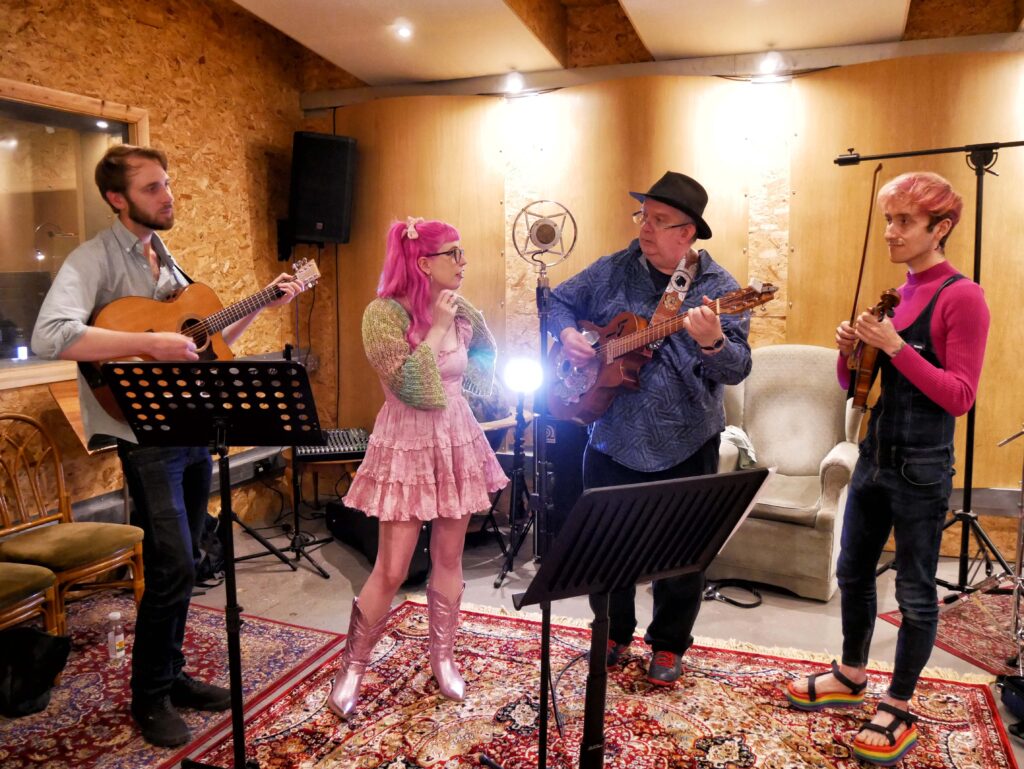
Harry Orme has been a game changer in terms of working up new material, a superb guitarist with a great musical brain. It was great to see him playing with Corwin Zekley from Towse and I am in awe of their musical skills! This is a great example of creativity through collaboration, the central theme for the Green Eyed Records platform. I recorded two great inteviews with both artists which will be released in the near future.
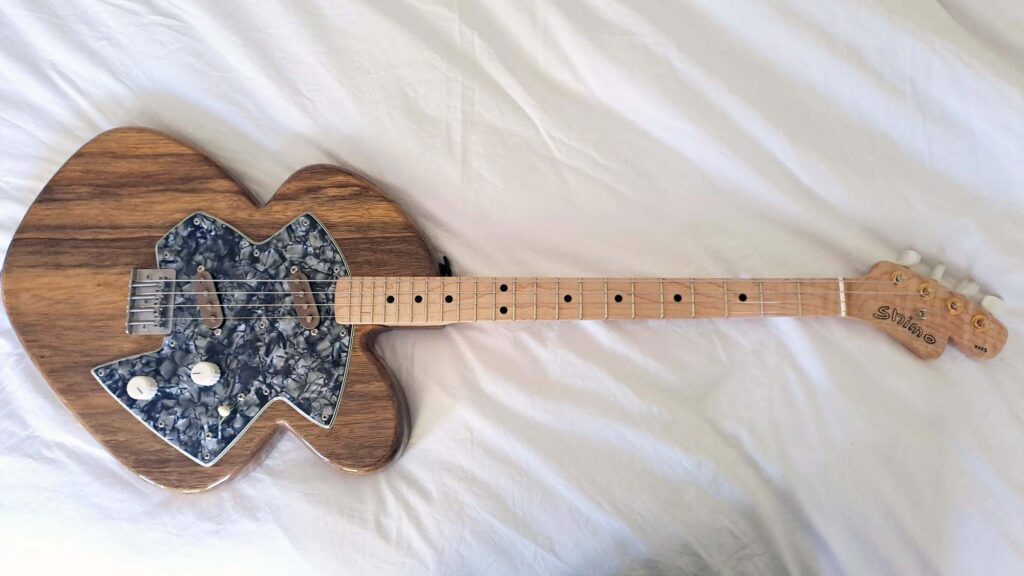
This is the Shimo electric tenor guitar build for me by Takahiro Shimo from Tokyo.
Here is the spec
Body : White Limba, Neck : One Piece Hard Maple / Bolt On Pickups : Fender Style Hand Winding Single Coil x 2 / Alnico 5 Magnet, AWG 42 Wire Made in U.S.A. in 1959 Bridge : Hand Made by Steel Base with Brass Saddle Control : Volume x 1, Tone x 1 Pick Guard : Gray Tortoiseshell 5 ply Tuner : Schaller M6mini Body Shape : Shimo Original Peghead Shape : Shimo Original Body Color : Doghair Neck Finish : Matte Case : Original Hardshell
There are four pickup options, each giving a very different sound, so there are a lot of superb options. Previously I’ve bought Shimo’s acoustic instruments, this is my first electric one and I’m blown away. It both sounds and plays brilliantly. I’ll be using this both in the studio and for live work with my Supro amps.
Here’s Martin Simpson looking at it for the first time and putting it through its paces
A few years ago I came across Edwards guitars, made by ESP for the Japanese home market.
The pickups are made by Seymour Duncan and the hardware is by Gotoh. The wood choices are really good and the Japanese quality control is excellent. I finally managed to get my hands on an Edwards 335 in Tokyo and was not surprised to hear that this was one of the last instruments that is filled with the such top notch hardware and in the future, the prices will crank, the pickups will no longer be Seymour Duncans.
The black Edwards 335 seen below is made in Japan from carved maple, with the great hardware choices and a superb hardcase. The quality is better than most Gibson 335s and the playability is excellent. A Gibson 335 would start at an absolute minimum or 2300 and there’s nothing else that would remotely match the Edwards price point for such an instrument. On reverb second hand versions retail for 1400+. Price for the one below is sub 800 sterling, including the hard case. There are many “335| shaped objects, but nothing that comes close to this build quality, so this one is a great deal for any player
In recent times the subject of people losing confidence in attending live events has come up in many conversations. A well established local artist commented that since covid, many people are wary about events being cancelled and so wait until the last minute to book, which creates a nightmare for promoters. I also notice a number of festivals struggling and pleas going out for people to book tickets early as they had failed Arts funding bids. I’m a longterm lover of music and in recent years started to explore “the music business” and how best to promote my own work and other superb artists. No one person has the answers, but here are my latest thoughts and observations.
Covid is just one of the factors that have created a hesitation in booking on live events. With many gigs and festivals being cancelled, many people are wary about buying tickets in these tougher economic times. One friend and colleague was not best pleased in hearing that a niche music festival had indicated that one of the main international headliners announced last October, now would not not be playing. She can’t get a refund and the festival still has not announced the artist line up for an event that is just a month away. Such actions don’t inspire confidence in future bookings and in my view its not smart business. Yes, there can be situations where a change of artist has to take place, but the same event approached another international artist and wouldn’t confirm the booking, so they kept their options open, which is in my view pretty disrespectful for the artists as the festival approached them in the first instance…
In recent years I’ve noticed that a number of niche festivals have had a heavy reliance on obtaining arts funding. The key word here is “reliance” The challenge for any promoter is surely to market the event in a manner where they can cover all costs. Idealisma classic risk/reward situation in business. Lets remember that “the music business” is like any other business in that its a case of supply and demand. Promoters take the risk on funding and event, but also have the chance to financially benefit from the event being a success. I’ve run numerous music events and always taken the view that the buck stops with me personally in terms of the funding. All artists will be paid as promised regardless of how many tickets are sold. At times this can be a reasonable financial outlay, but that’s what’s needed to maintain confidence from both artists and attendees. I have massive respect for any promoter, it takes real nerves of steel to engage in such activity.
I come from a business background and this is invaluable in figuring out how to run events. As previously mentioned its a case of risk v reward. In the theatre business its generally accepted that you need to sell 80% of tickets to make a profit. When running music evenings and signing contracts for known artists, I’m aware of exactly how many tickets we need to sell to break even and always ensure that the marketing is on target to make any event successful. I don’t claim to know everything about promotions, but all events to date on the Music for Head and Heart and Green Eyed Records have sold out.
Not everyone appreciates the benefits of sustained momentum in marketing. I agreed a few years ago to run support for a local artist and to fund half the cost of the venue and let him have 100% of the door, even though I was paying my band out of my personal finances. I also ran a good online marketing campaign again at my cost. I started to notice that with 6 weeks out from the event, the headliner wasn’t really pushing the event and although all his superfans had booked, we could still generate another 50% in attendance and reach a wider audience which he’d always complained about not having. When I voiced my opinion on this and pointed out it would also be a big financial bump for him as well as bringing in new interest, I met with massive resistance. Some people just don’t understand the basics of promotion and are so stuck in their own idealism that they will never reach a wider public. The tragedy is that they will endlessly complain about the lack of public interest in their work, even though their own limited thinking is the cause of the problem!
When I set up Green Eyed Records, I realised that the best results come from collaboration. I’m massively grateful to established artists like Martin Simpson and Jon Gomm to be hosted at the Music for Head & Heart showcases. I’m also grateful to music heavyweights like Tim Booth and Jim Glennie as well as world class journalist Sylvie Simmons for discussions and advice. To quote a classic Japanese proverb – “No one of us is smarter than all of us”
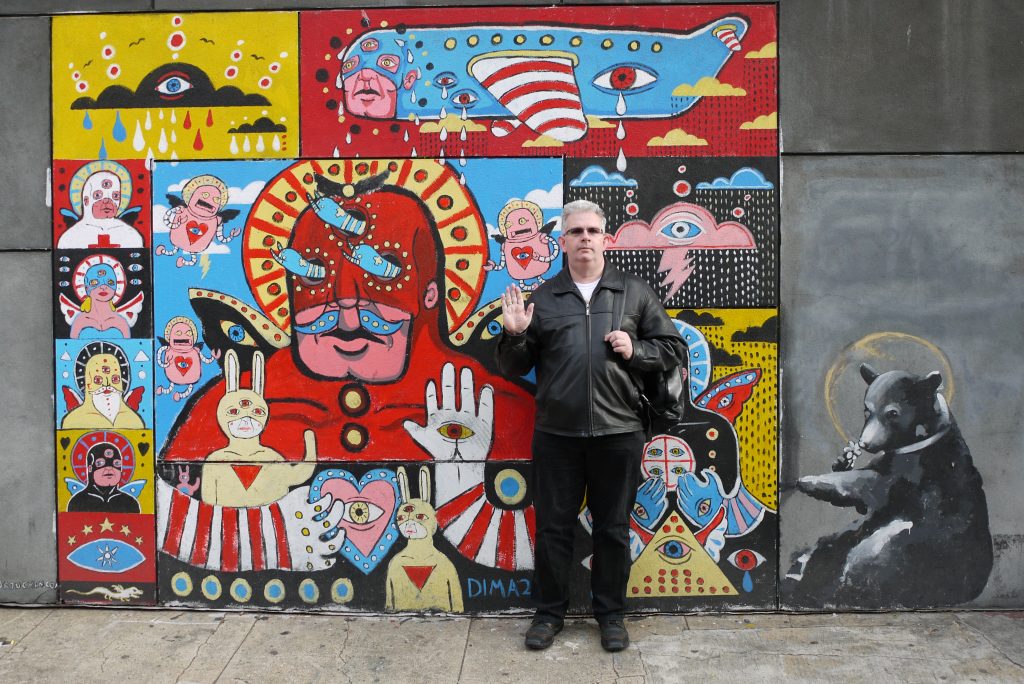
During covid I decided that I was no longer going to play local events mid week and instead host and run events myself. The reason for this is that I’d rather not play at all than to an audience that is not really there to listen to music. Don’t get me wrong, past years of playing the local circuit has been fantastic for building up playing skills and becoming at ease in such situations. My producer always said “one live gig is worth ten rehearsals” and he’s 100% correct!
These days I organise live music events on either a Friday or Saturday night and make sure we have a great venue and excellent sound. There’s nothing worse than attending an event where the sound is terrible. Even some well known venues can have horrible acoustics and/or sound systems. I’m done with fighting against the playing environment and so “less is more” in such matters – better quality events. The other consideration is that I am finding that people are more picky about what they attend, which is no surprise in these tougher economic times.
I set up Green Eyed Records and Music for the Head and Heart to promote and share great music. There’s a lot of great music out that that in my view deserves to reach a wider audience and these platforms assist with making this happen. At times it can be a serious financial undertaking, but I’d rather work with professional artists who can bring a great live show to an audience. Pre covid I hosted two Music for Head and Heart events with local artists before deciding to crank things up by working with more substantial artists who have established audiences. The first event was last year with the brilliant Jon Gomm which sold out. I was also pleased to invite Towse to be a support act along with my own Heartache ensemble. This was a fantastic evening and everybody brought their “A game”
This May I am hosting Martin Simpson at The Old Woollen with my band The Small Change Diaries running support. I’ve been doing substantial promotion for the event and Martin was good enough to agree to shooting a video promo and interview which is helping to drive interest. Tickets available here
As soon as you start to run live music events for hundreds of people, quality control over who you host and pricing become crucial. I hosted artists in the past who are nice folks, but totally lack the skills to work to create a great evening for a more diverses audience beyond their own limited fanbase. Some artists are terrific to work with and I’m delighted to share all my promotional contacts, marketing skills and other benefits. In contrast some are a nightmare to work with and have the unique ability to “snatch failure form the jaws of success!” You can always spot such folks as they are endlessley complaining about their lot and how unapreciated they are by the wider public!
Pricing events is also a real art and its really important to pay attention to the figures. Its important to me that everyone is financially rewarded and the audience get best value for money. Added value like free parking can really help attract an audience and I have learned that pricing will simply filter who attends the event. To date all the events I have run have sold out, but that’s no reason to take one’s eye off the ball in such matters.
This year I am running a second music showcase with the brilliant Towse and Harry Orme, where we’ll showcase a great new project. More details soon and tickets available here
Prior to tipping my toe into the music world and running events, in my other life I come from a business background which meant dealing with some really big business contacts up to million pounds. To quote an old saying when signing any contract, “the devil is in the detail!”
I remain amazed that in “the music business” many record contracts are a terrible deal for the artists. This of course is not news, but it surprises me that in this internet age where information is more readily available and music colleges are there to educate students. There’s also often a real lack of awareness about the implications of such transactions! Many artists and super fans are unaware of the implications of signing a contract and imagine that any such signing means the artist “has made it!”
Of course this is a very naive view and all contracts should be properly scrutinised to explore just how good or bad the deal is, The “record business” is like any other business, an entity that seeks above all to make financial profit. The “product: here just happens to be music, but otherwise any contractual arrangements are like any other business transactions, except in this instance often pretty poor for the artists! Here is an overview of some of the different types of contracts.
In recent times where streaming has largely replaced traditional product income streams for artists, record companies are looking for other ways to generate income from artists. A “360” as it’s called in the industry, is an exclusive contract between a label and an artist. In a 360 deal, a recording label not only takes a share of the artist’s music sales, but crucially also percentages of revenue from other ventures. These include concerts, merchandise, television appearances, or publishing.
The challenge for many artists starting out is to find a way of funding their music creation and many such artists don’t have the business awareness to know what they could be signing and possible implications. Any record company is going to want a return on their investment in an artist, its of course ‘a business transcation” and its naive to think otherwise.
A non exclusive record deal can appear attractive, but of course this usually means that the record company is less invested in the artist and once again the devil is in the details. The real question is “who gives what and who gets what?” There’s minimal risk for both artist and label and often minimal reward.
Many artists and fans have the romantic idea that “being signed = musical success” BUT of course any investor will want a return on their investment and record contracts are no different to any other business contract. There’s no right or wrong with deciding how to proceed, and many artists are terrible when it comes to business awareness as well as ignoring professional advice, insisting they know best in such matters.
Distribution deals rarely have any money upfront, and the artist is typically responsible for any recording and production, but crucially the artist retains the rights to their own recordings. The artist will approach the label with a finished product and the focus is on how to take the music to a wider audience. This can be a good option for many artists, but as always read the small print.
With major record deals, the label pays for everything, touring, promotion, videos, music production. This is a big committment and these days many labels are nervous about taking such a financial risk in the current economic climate, and many will play it safe. Often the label is looking to see an artist’s established fanbase before even considering signing an artist. The record company of course expects a return on any financial investment and owns the artist’s master recordings even after recovering expenses. A typical deal for a new artist is 11 – 15% of music sales and any ‘advance” is a loan against future sales.
I talked to Jim Glennie from James about this whose band was signed to Universal and was quite shocked at the deal that was in place. In conversations with other established artists I was amazed at how low the advances could be for recording. The myth of “being signed” and the actual reality are poles apart. Many artists are only signed for a very short period of time. Jim confirmed that the band made money from live shows, but never from music product sales. He’s not the only artist to point this out
I’ve never made a dime from a record sale in the history of my record deal.
I’ve been very happy with my sales, and certainly my audience has been very supportive.
I make a living going out and playing shows.
Lyle Lovett
These are essentially partnerships between artists and labels and don’t usually mean a big financial advance for the artist. Its useful to remember that it any contractual arrangement, the bigger the financial investment from the company, the more the company will want a financial return from the artist. All “record deals” are trades and each artist would be best advised to consider on whether the deal in place works for them both financially and creatively
In the era of social media, many artist fans imagine that “being signed” is the end of an artist’s problems, but the reality is that all contracts should be looked at in detail. On one extreme a record company can offer massive financial and promotional investment, but they are goind to want some security to take such a risk. The other extreme with non exclusive agreements can sometimes mean very little actual real committment in terms of financial and time elements, so it may sound wonderful “to be signed” but in the real world of paying bills and having artistic freedom, its not really going to make any real difference to the signed party. Of course there are always exceptions, so the watchword is “caveat emptor’ in all instances!
The average UK salary in 2023 is £33,280 p.a and many artists will earn far less than that, even with regular live appearances. Many who do well are not only playing live on a regular basis but also teaching. Those who drop off the radar from live performances and/or don’t expand their audiences inevitably will find it almost impossible to maintain a living. Some rely on a dedicated small fanbase and constantly appeal for funding, but that’s not a longterm solution, especially for those with families to support. Hats off to anyone trying to earn a living from music these days.
I set up Green Eyed Records as a different way of working, where artists retain 100% ownership of material, but work in a collaborative fashion. I talked to world renowned journalist Sylvie Simmons about this and in my view this is the best hope for retaining creative ownership and reaching a wider audience. The Music for Head and Heart/GER showcases are a great example of creativity through collaboration. It can e a big personal investment, but in my view this is the best way forward.
I’ve seen some real car crash thinking from some artists who spectacularly snatch failure from the jaws of success as they don’t see the bigger picture and are often complaining about their lot in life as an artist! Its 100% their right of course, but the most successful performers have always embraced a wider vision and sought to build connections with others.

We just finished a great video shoot for a new musical project. Such events require a huge amount of preparation and planning, especially when all parties are travelling from different parts of the UK. The environment for the shoot is crucial and of course you have to think about light and sound considerations when filming, especially if you are working outside.
We chose a space in an old mill for this shoot. The good news was that the industrial vibe looked terrific and the ear trumpet Myrtle mic and the Pogreba reso guitar fitten in perfectly with the industrial theme. We also used the terrific Henriksen Bud amp for amplification as these remain the best acoustic amps on the planet!
Towse are from the USA and were featured on the last Heartache album “All is fine ’til the world goes pop” which has received many excellent reviews and we’ll be doing a live show with some of this material Sept 23rd at Heart in the UK. Its an absolute pleasure to work with Towse and they always deliver in the studio and in live performances.
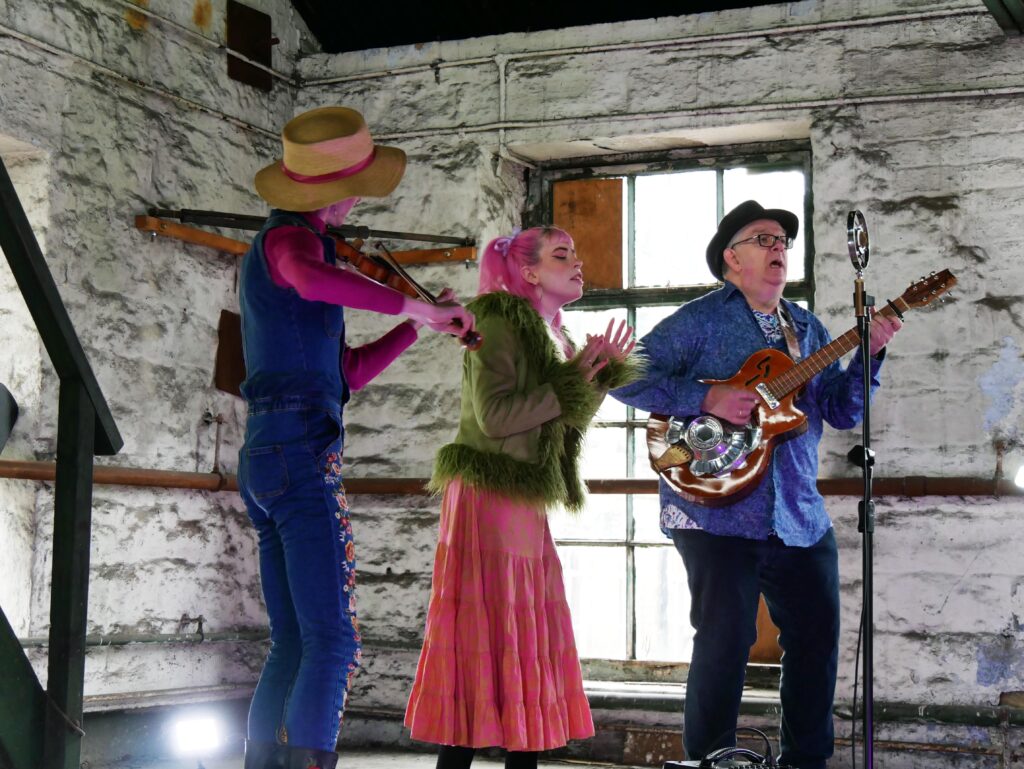
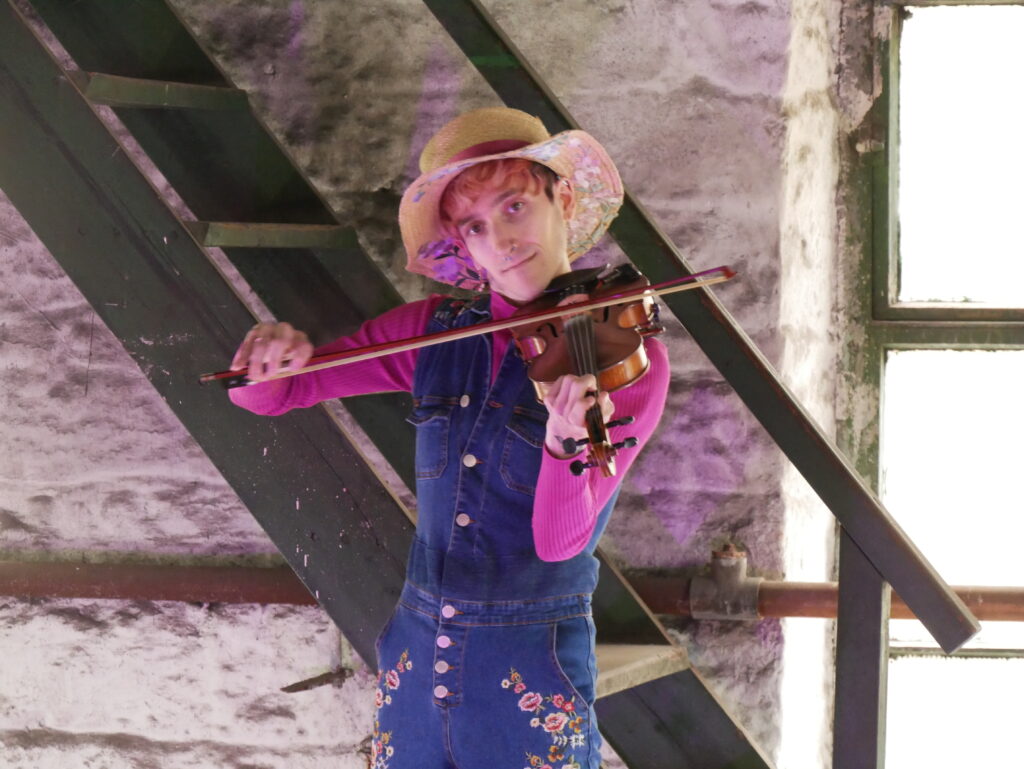
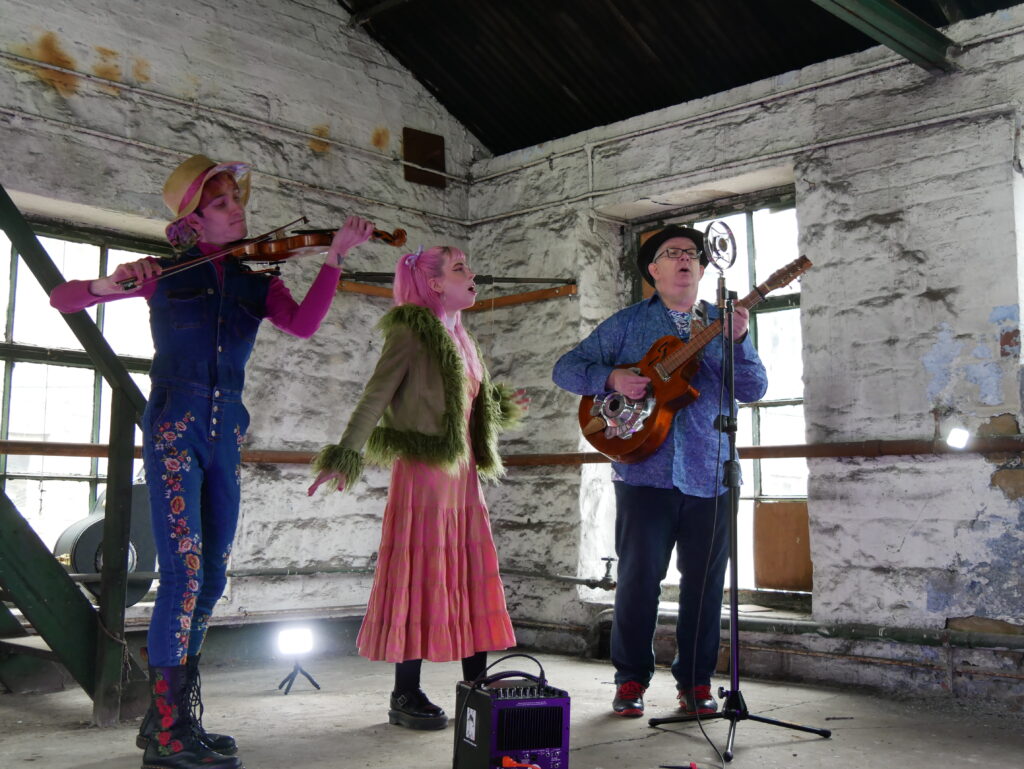
I’ve always been a massive fan of great design and in recent times I’ve come across some terrific artists who produce work that is truly inspiring. The guitar strap below was made by a super talented pattern cutter/designer for John Lobb shoes which are as good as it gets in terms of quality.
Her guitar straps are all bespoke and out of this world in detail. I’ve ordered two more bespoke straps
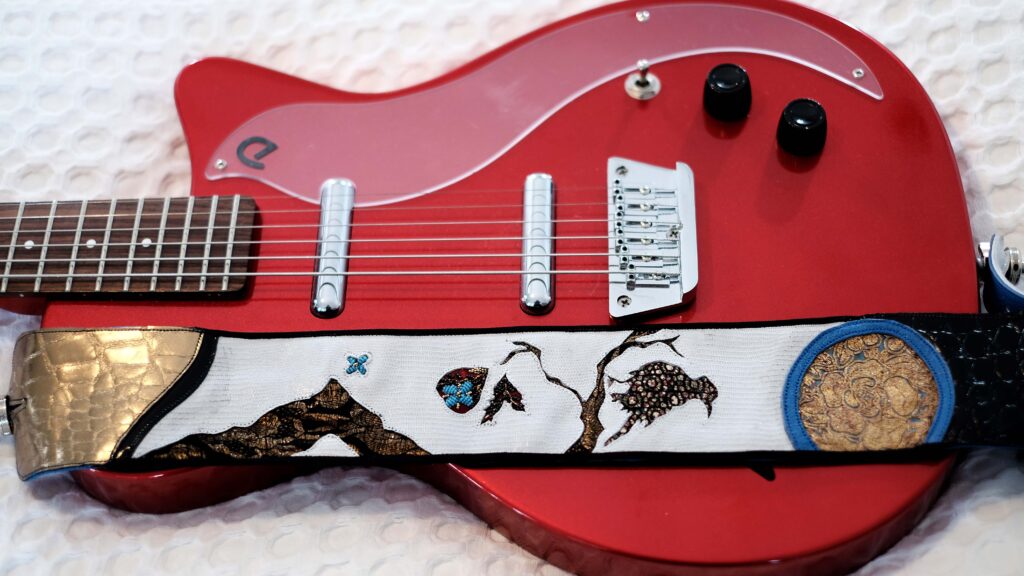
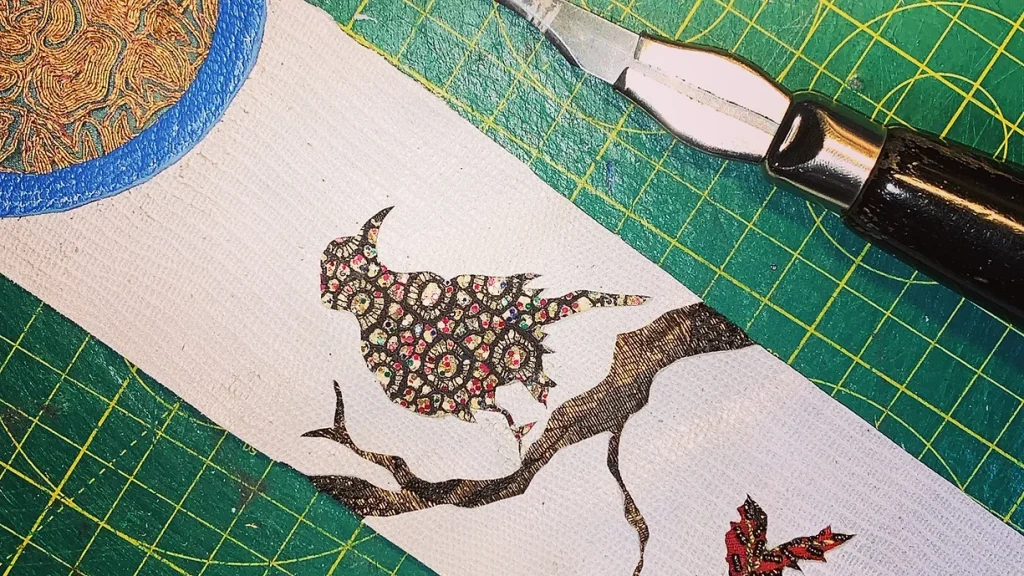
I first started creating music and playing live in 2015 and I am forever grateful for all those people who have offered support and encouragement. My first ever ukulele tutor Jessica Bowie got me into singing when she came to give me a music lesson and having never done any singing before it was (‘m being polite here) a very new experience. Her encouragement kicked off my musical journey and to my surprise and delight she agreed to be in my first band “The Small Change Diaries” named after Tom Wait’s album ‘Small Change. Next year I am reforming the band to play part of a support slot with Martin Simpson as part of the Music for Head and Heart 4th showcase. How mad is that?
I’d only played two small local support gigs with “The Small Change Diaries” in 2016, when we were invited to play at Lagoa Guitar Festival main stage. We got the invite because I had created a great online presence for the band, which suggested we’d been around for a very long time. This was the first baptism of fire and set the scene for a pretty wild foray into “the music business”
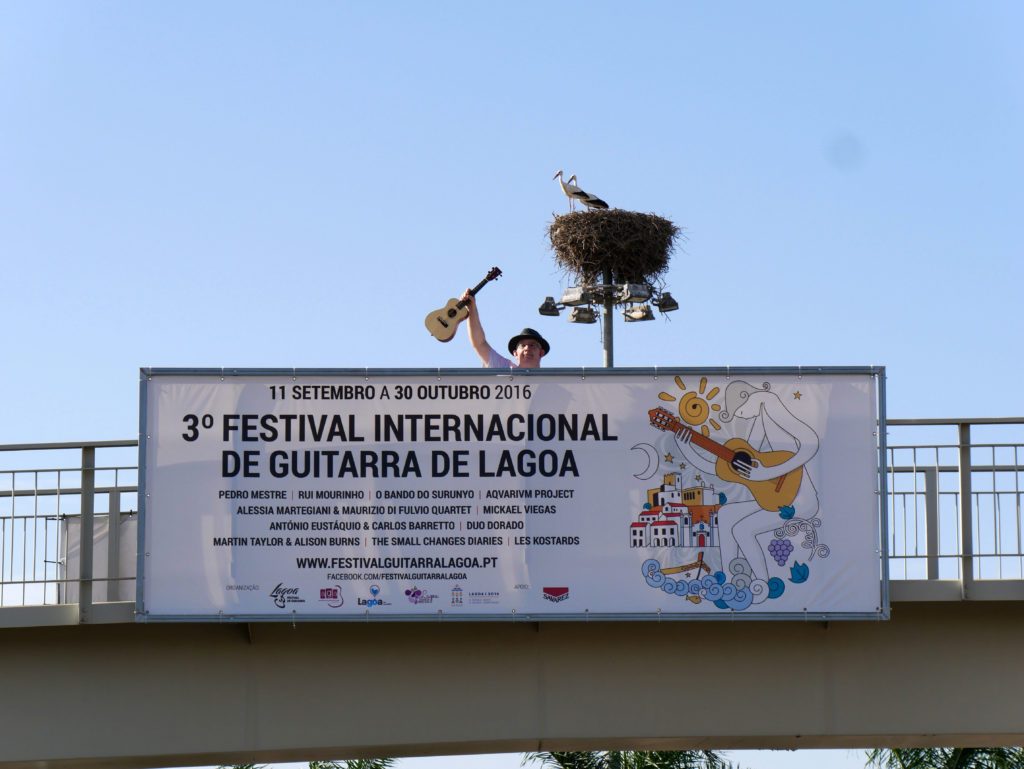
It took me three albums, numerous airplays and some professional artist feedback to finally begin to believe in my own work! I remember playing the first Small Change Diaries album to a famous professional musician and praying he didn’t start shaking his head of say something like “interesting” which of course is a polite non comment. Instead, he gave me some great practical feedback and encouragement. Another massive support was my producer Carl who has been a constant support and key catalyst for musical creation. In 2015 when I was first in the studio all I could do was to focus enough to play in time and get close to being in tune! With each album this got a lot easier and these days I’m pretty relaxed about the whole process and much more ambitious. Self-doubt is a two-edged sword; it can propel you to create better work, but if you don’t keep it in check, it’s easy for it to end up in a downward spiral!
I first met Agi almost exactly four years ago and her vocal support and musical encouragement has been invaluable. I decided to get vocal lessons and she looked like a great option. I remember in the early lessons thinking “Fucking hell, this singing requires a lot of paying attention!” For the first two years all I could hear from her in my head was “MORE EXPRESSION!” She was of course 100% on the money and has become a dear friend, a brilliant tutor as well as contributing to over 50 tracks to date. We played live together with “The Caravan of Dreams” and during covid we used lesson time to put down vocals on dozens of tracks. She has a unique skill in creating harmonies and is a genuinely wonderful human being.

I parachuted into playing with a number of seasoned musicians in later life and these folks have been a constant source of inspiration and encouragement. many have played on my albums, and I am flattered that they would do so. The list includes Laurent Zeller from France who I first met in Lagoa, Michael Ross from Nashville and Towse from California. the latest album “All is fine ’til the world goes pop” brings together many of these great artists and I’m super proud of the result.
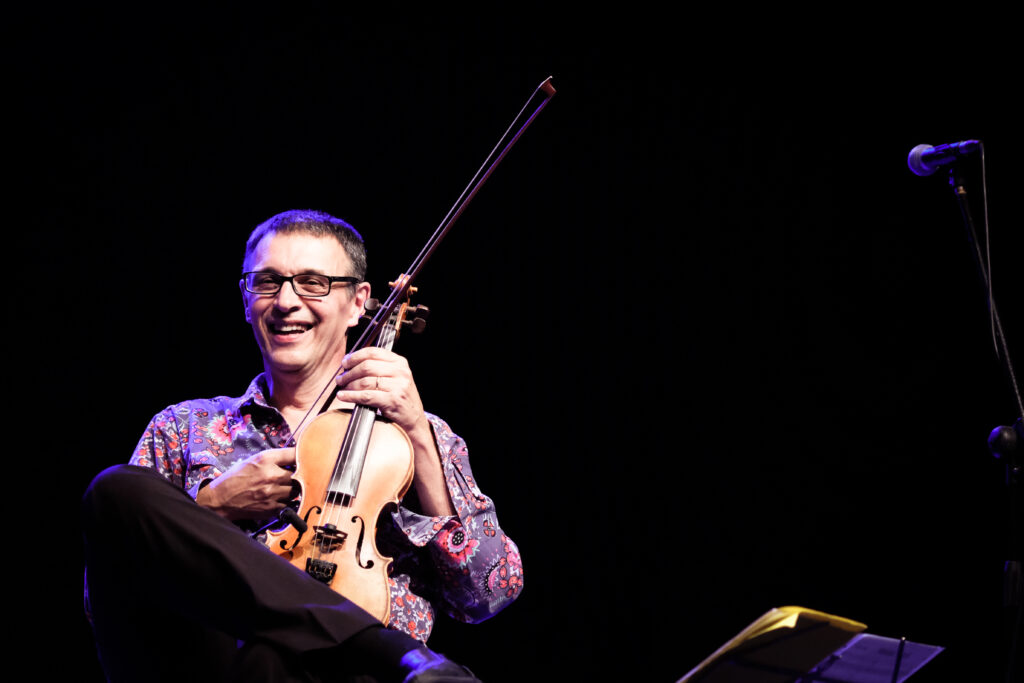
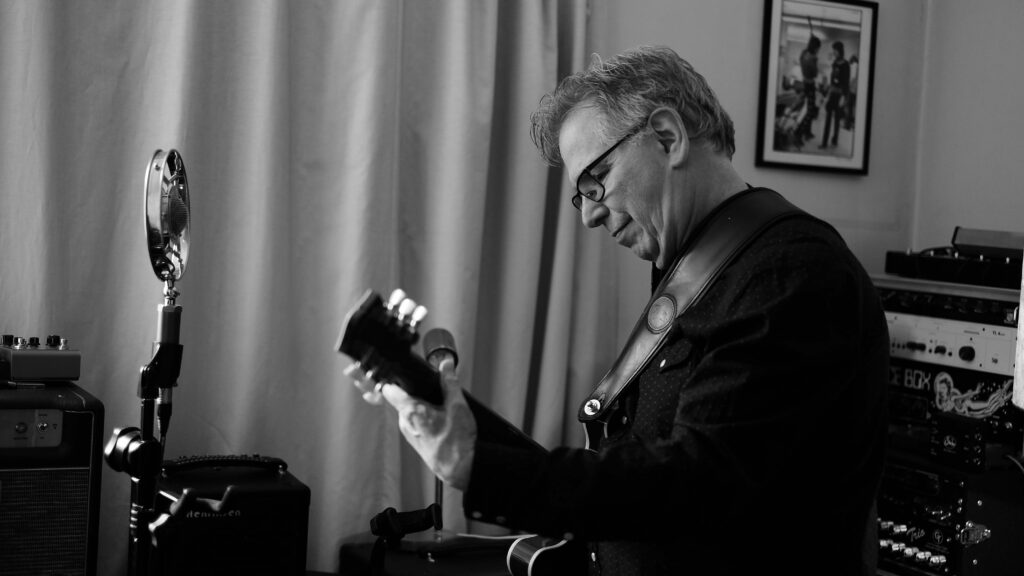
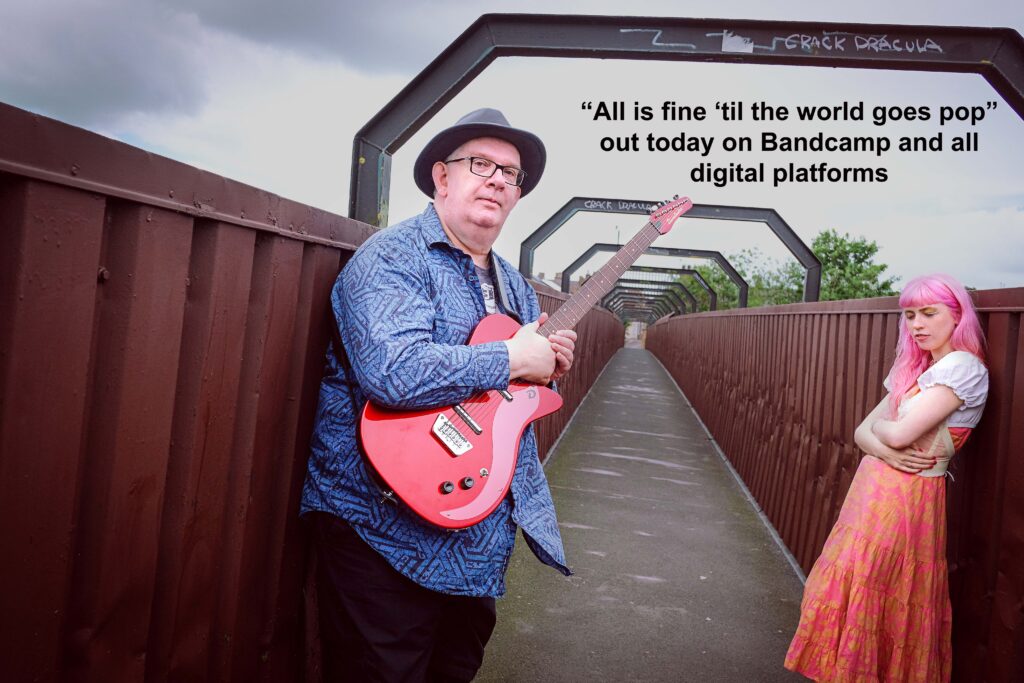
In contrast to all of the above there are of course others who are definitely don’t really embrace the idea of support and enthusiasm unless it’s for their own personal agenda. I remember one artist comment “Never collaborate with anyone unless they are higher up the musical ladder than yourself” Another similar mindset took the time to post a dismissive comment online regarding the new album, calling it ‘a vanity project” I pointed out how disrespectful that was to all those across the globe involved in making this music.
Worse still, the exact same person was more than happy to use a quote I provided for him for his one-man business! The fact that somebody would go out of their way and to take the time to post such stuff really tells me all I need to know about them.
I mentioned that I’d now personally take the time to pass on his comments to all those artists who played on the album, and all these professional artists can decide for themselves what kind of motivation is at play here with such behavior. The first one responded saying ‘This bitter character has way too much time on his hands” Of course, this is just one example…
Fortunately, I have few such folks in my orbit and instead focus on working with those people who can agree to disagree without such immature behavior which makes for very poor business and personal relationships.

I set up Green Eyed Records to help support artists and encourage “creativity through collaboration” There’s really no downside for any artist involved but amazingly I still heard on artist superfan comment ‘I don’t think GER is really right for artist X” I was astonished as the exact same artist was endlessly bemoaning his lack of reach to a wider audience and financial status and GER would have manifestly helped address this longstanding problem.
The association was good enough for the likes of world class journalist Sylvie Simmons to be involved as well as hugely successful artists like Jim Glennie, Jon Gomm and Martin Simpson all of whom demonstrate the exact ethos of GER and are happy to help others. In my view that’s one of the reasons why they are so successful and continue to expand their audience. It’s a joy to host both Martin and Jon with musical showcases through GER and Music for The Head and Heart. Both Jon and Chris Catalyst from the Sisters of Mercy were also kind enough to give really well considered testimonials on some of my work.
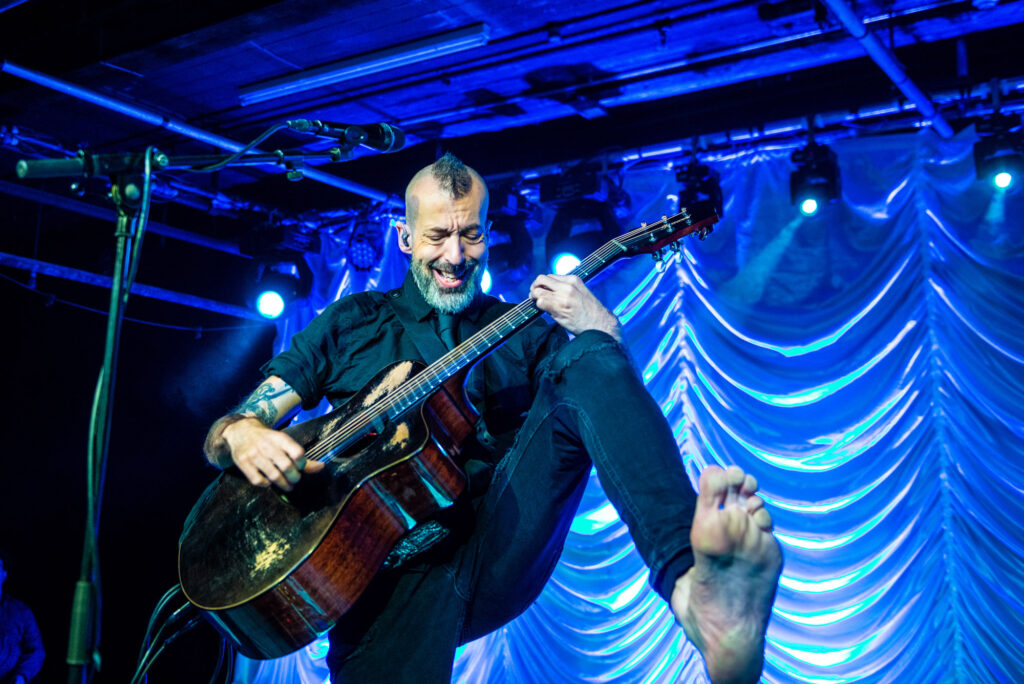
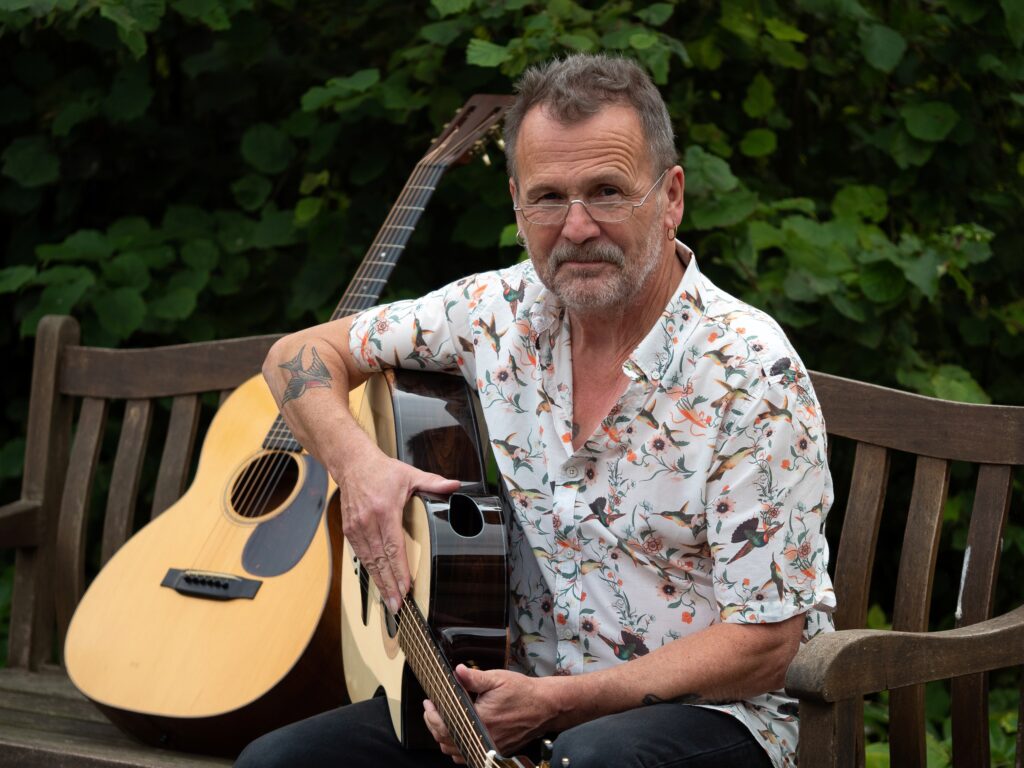
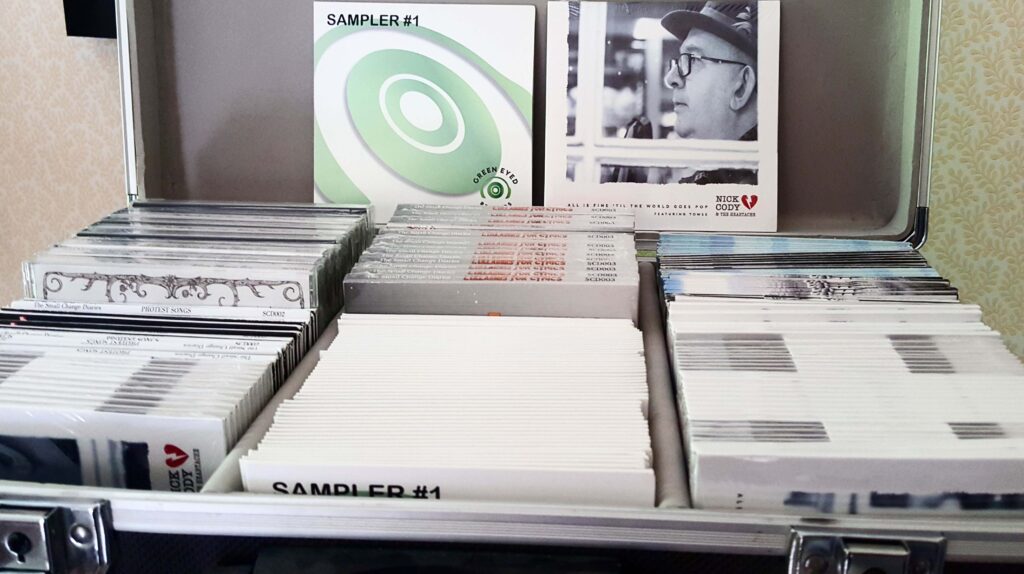
I just received the latest album “All is fine ’til the world goes pop” and the first Green Eyed Records sampler.
It seems like only yesterday when we recorded the first Small Change Diaries album “Adam Blames Eve” and the follow up “Lullabies for Cynics” In between we released the protest songs EP. After The Small Change Diaries, I formed a new band “The Caravan of Dreams” which expanded the sound of SCD and included Agi on vocals as well as Laurent Zeller on violin, as well as David Bowie Jnr on bass as well as Fergus Quill on bass and Jed Bevington also on violin.
During covid 19 I started writing for “The Heartache” and moved to playing electric guitar for the first time. I also met Towse and was so impressed by her that I asked her to contribute to what turned out to be a fourth album, “All is fine ’til the world goes pop” released on September 30th with a follow up album planned for 2023. As well as these projects, in conjunction with Black Star Liner, I’m releasing an electric album under the name Code – E1 in 2023. Two tracks from this appear on the Green Eyed Records sampler.
To quote Jerry Garcia “What a long, strange trip it’s been!” with 56 tracks released to date and another 25 tracks planned for 2023. Special thanks to everyone who have played on these albums and/or come to see us play live.
In recent years I’ve been increasingly interested in mental health in the arts and music industry. In my professional non music capacity, I’ve worked with many creative types over the last two decades and have noticed some common themes in behaviour.
In my musical capacity I’ve interviewed many artists at all levels about the reality of being a professional artist as opposed to a hobbyist where you don’t rely solely on creative work to earn a living. I have massive respect for anyone wanting to learn a living from the arts, but I’m noticing an increasing trend where many individuals feel an unhealthy sense of entitlement in being an artist and that kind of thinking leads to all manner of mental health issues. Before you read on, note I say “unhealthy sense of entitlement” The reason for this is that I 100% agree that all professional artists are entitled to be properly paid for their work, but this is about expectations and being fairly rewarded.
I set up Green Eyed Records to discuss and hopefully address some what I consider to be major injustices in the music industry.
The problem with encouraging an “unhealthy sense of entitlement”
Let’s start with a definition of “entitlement”
“The belief that one is inherently deserving of privileges or special treatment”
By “unhealthy sense of entitlement” I mean that in many cases artists have unrealistic expectations. These can be self-created or created by other parties.
Often these misconceptions can occur because artists have not taken the time to really educate themselves about the reality of what it means to be a professional artist. By “professional artist” I mean somebody who earns their money solely from their artistic efforts. Its not enough to have creative skills, other skills are equally important, if an artist wants to depend upon their craft to primarily support themselves financially.
When there is mismatch between expectations of what’s is possible and the reality of what is realistic, creates the perfect environment for problematic mental health issues.
The term “mental health” is increasingly bandied all over social media and there’s even an outbreak of people setting themselves up as coaches for others, sometimes with good intentions, but few actual skills.
A generally accepted definition of mental health is
“Mental health refers to cognitive, behavioral, and emotional well-being. It is all about how people think, feel, and behave.”
One of the biggest challenges for many artists is to maintain a predictable income source and a work/life balance in increasingly tougher economic times. The changing music business means that many traditional reliable incomes no longer exist and of course record contacts often are leveraged in favour of the record company, as opposed to the artist. This is of course not exactly news, but during covid 19, it became more obvious that the absence of live opportunities removed one of the last good sources of income for musicians. Many artists have to travel great distances at very unsocial hours for not a great deal of income. The unpredictability of work and cancellation of many festivals/events can massively add to stress levels.
Mental health issues usually occur when a person finds that their expectations of what they can do mismatch with the reality of their actual life situation. Many artists become disillusioned when the penny drops and they realise that their sense of entitlement as an artist is not going to happen in real life. There can be many reasons for this, including lack of talent, but its not just talent that will produce a successful life in the arts. There are many other factors that need to be in place and of course many painters and other types of artists could only find success through specific patronage from wealthy individuals who would fund the time needed for the creative process.
Jim Glennie is the founder of James, and I recently interviewed him for Green Eyed Records on the music industry and mental health considerations in the music business. I’ve known Jim for 40 years and he makes some excellent observations about the state of the music industry.
Here’s some of what he said –
“The industry as a whole has a terrible attitude towards mental health. There isn’t mental health problems in the music business. You’re available 24 hours a day, everybody is. Not just people in bands or musicians, but everybody in the industry. That’s just the way it is. And they talk about mental health now, as we’ve been doing for the last few years, but I don’t see anything massively changing in the way that is actually practically done to help people. I mean, the obvious issues of being in a band, at some point, you’re going to have problems with alcohol. At some point you’re going to problem with probably abuse, or the people around you do. Because those things are just considered the norm, they’re considered acceptable. I turn up to work and there’s a table full of free alcohol there, there is. That’s just every time I go to a gig from three o’clock in the afternoon, there’s a table full of free alcohol.”
Many artists have little awareness or quite optimistic ideas of how they will earn a living and spectacularly fail to appreciate “the elusive obvious” in terms of what are the basics needed to earn a living from their craft. My experience is that many music colleges and TV talent shows encourage an unhealthy sense of entitlement for artists. That said, I totally respect anyone who has spent tens of thousands on education in the arts, expecting to get some good future work opportunities. Unfortunately, from what I hear many colleges and universities are complicit in creating totally unrealistic expectations, that of course lead to this sense of entitlement.
I have massive respect for anyone who decides to work in the arts as a profession as opposed to a hobby and have several friends who work in the music industry. They are all very grounded in reality and have spent years developing their craft. They also know the value of collaboration and working with people who have similar values.
Social media platforms can be invaluable for reaching a wider audience. They also can encourage an unhealthy sense of entitlement for artists. Often fiends of an artist shower them will all manner of superlatives online that are well meant but are not always that useful. Terms like “genius” “awesome” “groundbreaking” are all trotted out on a daily basis online. Don’t get me wrong, I’m all for encouragement, but critical feedback often gets bypassed in favour of such superlatives. The same kind of behaviour exists in the coaching and therapy world, and this can create massive problems for people who sometimes begin to become quite delusional in their thinking. That then is a fast track to mental health issues.
My advice to anyone wanting to be successful in any profession, whether this is the arts, or any other field is to take the time to develop those skills that will allow you to earn a living. This means learning about the details of how the business works rather than how you feel it should work. I’ve seen some artists endlessly moan about “the music business” and how “they should be treated” I’m more impressed by artists who seek out and act on offered opportunities. Over the years I’ve been amazed at how some individuals “grab failure from the jaws of success”
I had one artist who I’d given session work to and offered support slots on some music showcases, throw a tantrum, and even refuse to pick up the phone after he was unhappy about an online comment on social media. I suggested we talk on the phone and then if needs be agree to disagree and maybe part ways! A simple conversation would have given him the option for a big earning opportunity, and I suggested that its at least hearing what the opportunity was before dismissing it! The same character continues online to lament the lack of earning for independent musicians and how at times he struggles to MOT his car!
Here are some other typical scenarios and behaviors which mean missing potentially great opportunities.
This blog points out “an unhealthy sense of entitlement.” I believe that artists are entitled to fair recompense for their work and the world is a better place for great music. The whole creation and consumption of music is itself in my view great for mental wellbeing. The issue here is the unrealistic sense of entitlement and those factors that allow for this. One of the reasons for creating Green Eyed Records is to promote proper discussion and education, that’s how we all benefit. I’ve worked with enough talented artists with mental health problems to know that many could be avoided with some better education and better decision making.
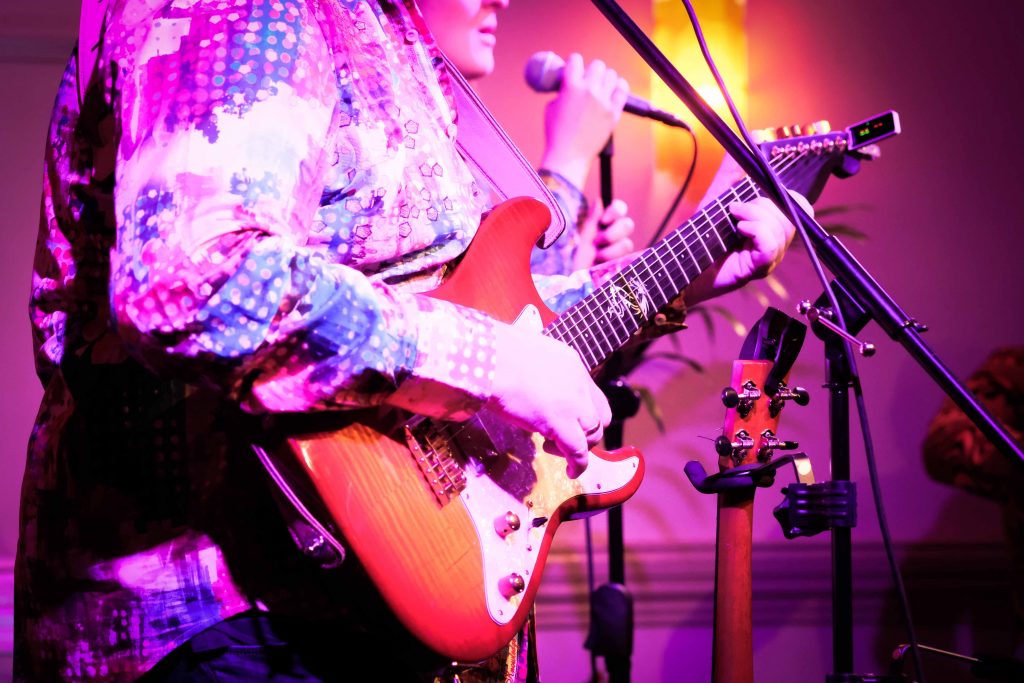
The last major music festival I attended was many moons ago and was the Pink Pop festival in Holland. It was a great line up and my favorite band was Morphine who opened the festival. I also got to see Crowded House and Bjork who were both superb. A few decades on, I’m less enthusiastic for a variety of reasons both as an attendee and/or a performer.
One of the advantages of attending music festivals is that you get to see a whole host of acts all in one place. That can also be a minus, when the set lengths are usually pretty limited. As a music fan I like to see a full artist set and usually festival sets are massively reduced in terms of length and there’s not a great opportunity for proper sound checks. As a performer a very short set length can be challenging, which it itself is not a bad thing, but the set is under 30 minutes, these days I’m not really a fan. This is because everything tends to be a bit hyperactive in terms of artist changeovers and my own research suggests that the public also are not fans of really short sets.
A good example of this was playing one of the ukulele festivals in 2016 and 2017. It was a good experience for the band as an early outing, but on both occasions there was an issue with sound on stage. As an artist its extremely frustrating to be squeezed into doing a 20 minute set and find you can’t hear your own instrument and/or vocal!
This way of working in booking loads of artists for real short set lengths may be great for promoters who can show a big range of acts on a poster, but its in my view not the best experience for artist and attendee. Yes, you can argue that festivals remain very popular, but I would respectfully suggest that often the primary focus is not musical enjoyment, but rather a social gathering. That’s 100% a valid reason to attend, but not my personal preference!
Another reason why I’m mostly not a fan is the cost of attending such events. Even the small niche music events can be 50 – 60 sterling for to get in, but then there’s often also additional costs in, accommodation and food costs. Some of these events charge extra for workshops (which can be just 60 minutes which is not ideal for any actual learning) and so costs start to crank. Quite quickly this can become a three figure cost, which is tougher in these economic times. Of course this is 100% a personal view and clearly many will be happy to pay what I would consider huge amounts of money to stand in a field where the sound of the artists is not great. The alternative is an indoor events can also be not ideal in this covid era. I may have had a different view twenty years ago, but these days I’m far more picky!
In relation to UK festivals, research suggests 28% of festival goers are festival super fans, attending an average of four festivals a year. To define the true festival super fan, its useful to look at several factors including their average festival ticket spend, how many festivals they attend, how influential they are in getting friends to go, how often they go back to the same festivals. The following stats are interesting to say the least –
Although covid 19 is not highlighted so much in the news, covid remains a real problem for many artists. Here are just some of the artists in 2022 who have cancelled festival appearances – https://www.billboard.com/business/touring/2022-concerts-canceled-festivals-covid-19-1235017924/
In recent discussions with Jim Glennie from James, Jim confirmed how covid remains a real problem for major artists. As Eric Clapton discovered, regardless of your vaccination ideas, the virus really doesn’t really care and you can find your entire schedule cancelled often at short notice.
Of course these are totally personal views and I’d rather be say in The Village Vanguard with 125 capacity, all seated and excellent acoustics! On leaving the event I can hail a cab in 5 minutes and not be queuing for hours to exit the festival location! My interest is always for the love of music and seeking out the best environments for this. I’m not ruling out attending any such events or playing at such events in the future, but I’ll be pretty selective in my choices.

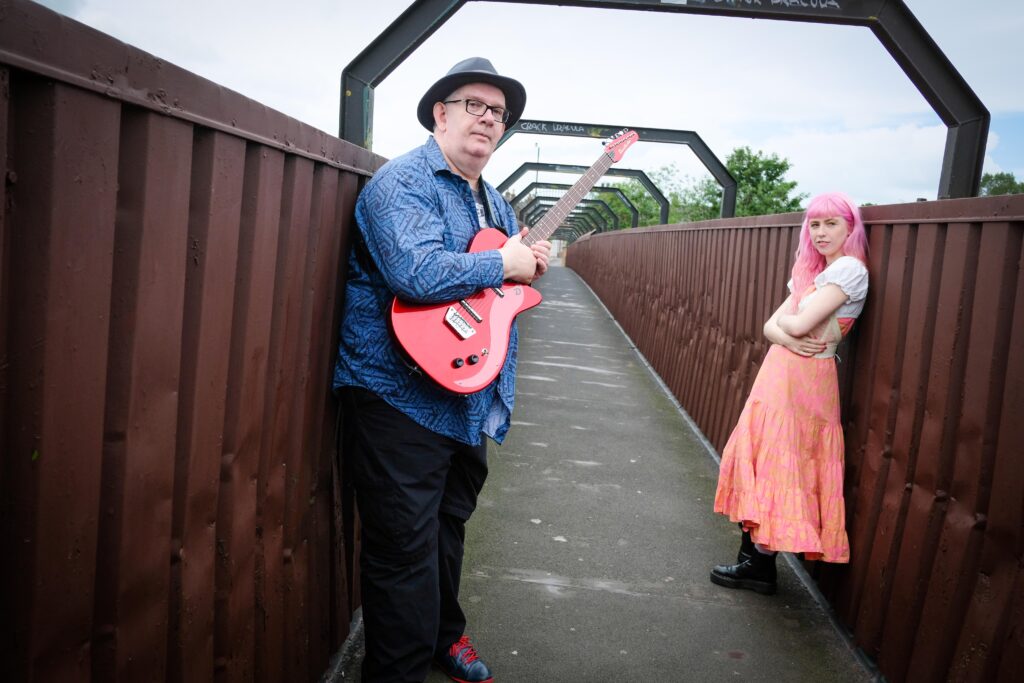
We are close to completing “All is fine til the world goes pop”, the first of four very different albums and I am blown away by the contributions of amazing musicians from all over the globe.
Here are the musicians who made this album possible. This album is different to anything I have done before. One of the biggest gamechangers are the vocal contributions from Towse, who is an extraordinary artist giving this material a new edge that is a genuine surprise and complete inspiration in developing this project. We both worked on this material during covid and didn’t actually meet in real life for two years. This made for some fascinating tracks and I’m delighted with the results.
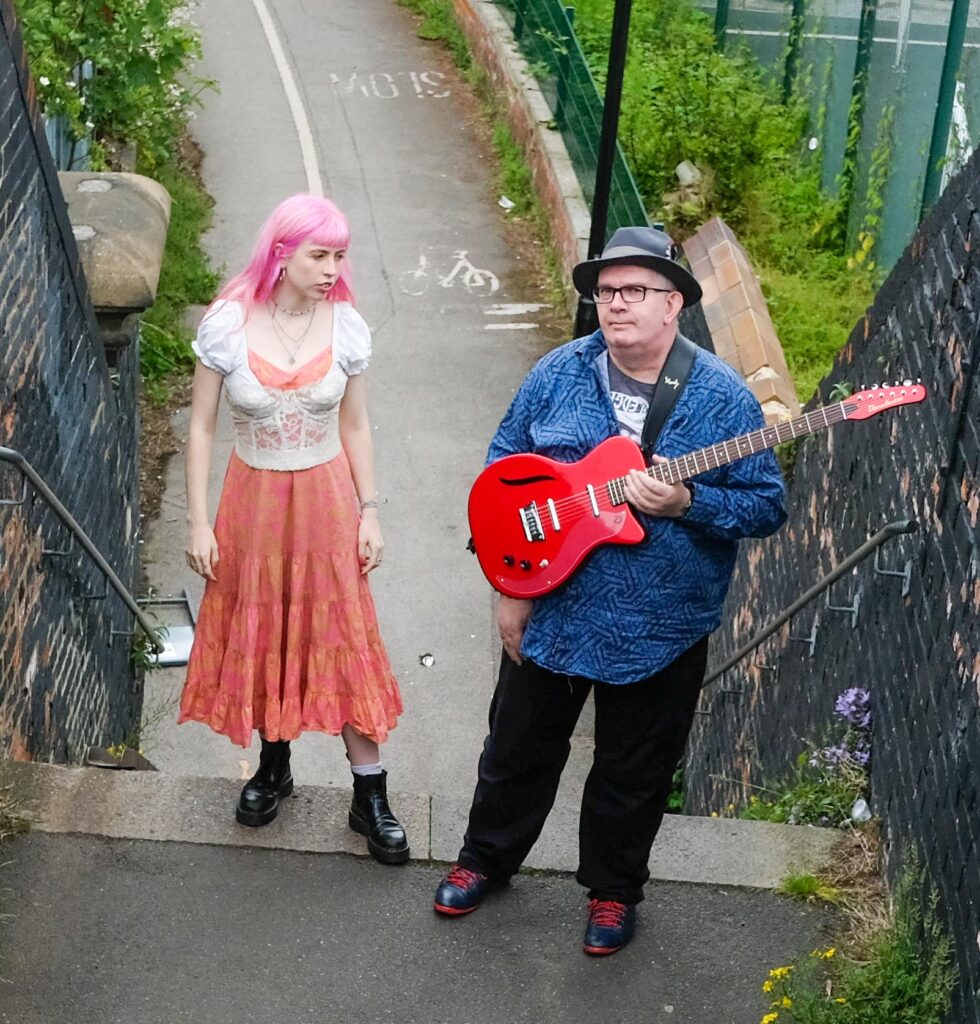
Originally I planned a single album, but the material became so wonderfully diverse, it was clear that we needed a second album which was more pop in nature and reminded me of the classic Talking Heads “Remain in Light” period. The second album ‘Take Heart” will be released in 2023 and 40% of that album is already completed.
I thank all of you listed below from the bottom of my heart for helping making this such a terrific album.
Towse CA USA – vocals
Michael Ross Nashville USA – guitar
Laurent Zeller France – violin
Manitoba Hal Canada – slide guitar/vocals
Corwin Zekley USA – fiddle
Fergus Quill UK – bass
David Bowie Jnr UK – bass
Howard Taylor UK – bass
Agi from UK – backing vocals
Emily Mercer UK – keys and backing vocals
Rich Ferdi UK – percussion
Josh Burnell UK – keys
Sharon Cannings UK – backing vocals


The album will be released via Green Eyed Records this Sept, will live appearance Oct 7th

I’ve been aware of Danelectro for some time but never really investigated their guitars. These are straightforward no frills guitars, but very well made with a specific sound. The baritone 56 Danelectro guitar is very different to standard guitars. Firstly its tuned B – B rather than E – E and has 24 frets. This makes for a very different sound and of course if you capo at the 5th fret you are back in standard tuning. One of the minor frustrations in owning one of these instruments is finding a case to fit it. Danelectro don’t make even a soft case, which in my view is an epic fail as owners will mostly find a bass case is the only case that works. Even the excellent Mon M80 soft case which has a lot of headroom will take the instrument, but the case is stretched to its limit, which is not good.
I started using the baritone 56 with a Supro Comet amp and it sounds terrific. This combination produces a great electric roots sound and its a super simple old school set up. This set up is for my electric ensemble “The Heartache” and the combination will be great for live gigs. I also am rehearsing my acoustic ensemble “The Small Change Diaries” and thought I’d test out the guitar with a Henriksen Bud amp with an extension 10 inch cab. I’m delighted to report that the Danelectro 56 sounds fantastic with this amplification combination. The Henriksen Bud amps have also been my go to amps for acoustic instruments, but they work brilliantly with all manner of electric instruments as well. This combination really showcases how great the lipstick pickups can sound and I’ll be using this in live situations.
The Danelectro baritone 56 is an unusual guitar, but as well as looking really cool, it also allows for some very different sonic possibilities which would not be possible with conventional guitars. They are also well priced and this 56 is the most inexpensive guitar I have bought in many years.
In recent times I’ve become increasingly aware of individuals setting themselves up as “festival and music promoters” who in my opnion (I’m being polite here) lack skills in making such events viable. Of course this is I suspect a minority, as there are many great, experienced professional promoters, but as the old saying goes “You couldn’t make it up”
What follows is a cautionary tale…
A friend of mine was asked to find acts for a festival and started to leverage his contacts to ensure that the event had the best available artists. Anyone in the music business will appreciate that professional artists will usually be booked up during most weekends, so its important to book well in advance. In this instance he only had two months to help out this promoter, who had left it to the last monment to secure musical entertainment. Organising musicians is a bit like herding cats at the best of times, but those of us who love music mostly enter into such activities out of love for music promotion rather than financial interest.
My friend’s alarm bells began to ring when the promoter started ducking answering basic questions that any booker and/or artist would ask in such a venture. Lets be clear, we are not talking about forensic detail here, but rather common sense considerations for appearing at a festival. I know from running Music for the Head and Heart showcases how important it is to define expectations which of course is standard business practice in any industry including the music business.
The main website for the festival looked great on the surface but had no actual detail about what was being offered at the event. The homepage suggested “75 classes and activities” as well as “music” would be available, but I still can’t find any actual details of who or what will be appearing on the weekend! There are also no previous festivals of this name, so no momentum from days gone by to ensure good audience attendance. Of course its possible that people will flock to this first time event simply through word of mouth, but in my opinion that would be highly unusual…
In this internet era its easy to check the credibility of any business online and for musicians its essential to check how and what you will be paid for your own peace of mind. The first alarm bell rang when the promoter was shifty about confirming in writing to artists rates of pay. He’d confirmed verbally to my friend, but ducked putting anything in writing to artists who were interested in playing. This does not inspire confidence and now the real danger is that my friend the booker could be left having to deal with the financial aspect of paying the artists, especially as artists were asked to invoice after the event had completed!
The second alarm bell was when I looked into the financials for the company which claimed to have been trading for 7 years and had run a series of events. The reality is that the company had only been incorporated in March this year and had zero trading history. The head of the company also was misrepresnting himself on business social media in this respect stating he’d been owner of this company for 7 years.
The third alarm bell rang when I looked at social media for this guts promotion business and found very little activity and/or engagement.
As the old saying goes “If it looks like a duck, has a beak and quacks like a duck, its probably a duck”
The lesson here is to scan for what I term “the elusive obvious” Its possible that a weekend festival could be really successful and attract a lot of exhibitors and artists without any contracts, marketing and promotion, but in my experience that would be a first. The reality is that any event, even if its an evening, never mind a full weekend, needs a great deal of work and attention to make it happen. In this instance neither is in place. As the saying goes “fail to plan, plan to fail”
These days many people are still apprehensive about attending any events even outdoors, so its crucial to make such opportunities attractive and that means giving detailed content on what you can expect
I come from a background in business and appreciate that we can all have different opinions, but good manners are always useful for good outcomes. When a promoter asks for help and then adopts a “don’t bother me I’m too busy to talk to the likes of you” approach, then that;s not good manners or good business.
In this instance the promoter has lost the goodwill of my friend the booker as well as all the artists who were willing to support the event. Its a perfect example of self sabotage and I note that one of his previous business concerns was dissolved in days gone by. Its a shame and a missed opportunity as this character managed to wonderfully snatch failure from the jaws of success. He would have had (note past tense) a host of different well connected artists promoting his event for FREE, but is too unaware to grasp the opportunity.
The lesson in all this is to define expectations and although we may agree to disagree, its always those pesky details that are important to ensure the success of any venture…

STOP PRESS – The terms and conditions for this festival have this clause
“If X festival is cancelled in its entirety due to any unforeseen circumstances for example covid related lockdown, Ink Events Ltd has the sole right to reschedule the event or issue partial total refund or NOT ISSUE ANY REFUNDS“
Note “any unforeseen circumstances” is pretty vague and most people will not dig into the detail here. To not issue any refund is highly unusual. Two words spring to mind-
The Terms and conditions have now been amended. The event has now been flagged as “sold out” but still there is zero mention of any actual workshops or musical artists. The promoter when questioned becomes extremely defensive. Make of that what you will…
Unsurprisingly the event is now cancelled, according to a post on FB, BUT the event is still live on the promoters site and shows as “sold out” They now promise a return for 2023. Its a masterclass in ineptitude and a perfect example of how not to promote events. Here even basic elements were never in place for this to be remotely viable. CAVEAT EMPTOR!
I have massive respect from anyone working in the arts and I set up Green Eyed Records as a music resource for artists who value the concept of “creativity though collaboration” as in my view there is an increasing problem for many artists to reach a wider audience. I come from a background in business and have set up and run multi million pound concerns and in my non music capacity work as a communication traininer in the UK, Europe, USA and Asia. I’m fascinated by “the music industry” and especially many of the myths of success. GER has allowed me to connect with many terrific musicians and its be a great insight into what its like for working musicians.
GER offers support for artists in many forms including marketing advice, technical advice, business sponsorship, live playing opportunities and other support. I talked about this to music journalist Sylvie Simmons when she interviewed me about GER. I’m pleased to have been able to offer tangible help to a number of artists to help them reach a wider audience for their work. This help has been in offering equiptment, business advice, recommendations for professional services and financial assistance.
In recent years I’ve had a number of artists lament the lack of income from working as music professionals. Being a “music professional” means that your primary income comes from music as opposed to being a hobbyist where you have a major source of income that funds musical activity. Nothing wrong with being a hobbyist of course and there are many advantages to having a separate income to fund creative interests.
Some artists really lean heavily on their fans goodwill to provide all manner of free assistance which of course is well meant but can in some instances not be the best long term strategy for a variety of reasons, including an over reliance on one source of income. In these tougher economic times many people have less disposable income and have to think far more carefully about what they spend their money on. Streaming has also hugely affected artist income and two artists in recent years have commented that their entire earnings per year are less that 20k, which doesn’t go far if you have a family to support. Yes, its great to create music for the love of it, but those with families need to be realistic about paying the bills as well.
The problem for many artists is that although they may have some creative ability, they lack essential basic business and organizational skills. As my wife would often comment “They don’t know what they don’t know” and most months are spent on social media bemoaning the perceived opportunities for musicians and how disadvantaged they are. In short its always somebody else’s fault for their financial situation! Everyone is of course welcome to their own opinions but there’s a huge amount of optimistic thinking and in my recent interview with Jim Glennie founder of James, he pointed out that many people are more interested in perceived fame than actually creating music. From what I hear music colleges do little to create realistic expectations for students and of course its a bit of a shock for many when they leave the world of academia into the real world.
One of the central problems for many independent artists is reaching a wider audience beyond their core fans. Music distribution requires funding and these days unless you have external financial support, this can be a limiting factor for many artists. I’m increasingly seeing requests for fans to underwrite artist activities. Yes, funding for the creation of music products is well established but now this seems to have expanded to assisting with all manner of other expenses which are traditionally funded by the artist themselves. This is an observation rather than a criticism and of course its always been a tough call to work professionally in the arts.
Covid 19 and the current tough economic situation in the UK has affected attendance at gigs and festivals, and its been reported that even the most successful bands like The Rolling Stones have a downturn in ticket sales. In 2022 many are wondering if they can afford to invest 95 quid to stand in a field to watch a band. Niche festivals also are not selling out as easily as in days gone by and one major niche music artist has only sold 10% of tickets in a relatively small venue for a few hundred people and the public can still get front row seats, a few weeks before the gig. This is for a sub 30 quid ticket as well…
In recent years I’m increasingly hearing all manner of interesting insights into how talent shows operate. Of course since the days of “Opportunity Knocks” talent shows on TV exist primarily to boost TV ratings as opposed to being a facility to assist with making artists famous! Yes, in a very few instances some individuals can launch a career from such exposure, but this is pretty rare. In recent times I read an interesting article that many didn’t pick up on about how scouts work for such shows. Often the car crash auditions and performances are what create the most impact in such shows, but what is now coming to light is that the talent show scouts will seek out really oddball acts that they know won’t progress in the competition, but will make for what they consider “good entertainment” for the audiences. These acts are encouraged simply to appear on the shows rather than go though the formal audition process where they are screening for musical talent. Anyone who imagines they can appear on such a show and not have to sign a contract is delusional in the extreme of course, but this is commonplace in discussions on social media.
Another issue is that many artists are well known on the “talent show circuit” and are not exactly unknown quantities. As I have often commented “The music business” is like any other business, where there are trades and agreements. The Sun has reported that, of the 60 acts who have had auditions aired during the 2022 series of the reality show, 25% of them already have some kind of professional profile! I’m personally not a fan of these shows which are in my view not really about creating great music and the whole backstory formula is now pretty well worn.
This article is not to promote doom and gloom but rather to note the changing trends in the public’s buying habits and the need to adjust expectations as artists, to avoid being disadvantaged. That said its increasingly tough for anyone wanting to earn a living purely from artistic work.
I have total admiration for anyone wanting to earn a living as an artist. Personally I hate the idea as it would totally compromise what I want to do and I’d far prefer to fund all my music projects from other work, so I continue to have total creative freedom. I’m seeing a number of artists really struggle to make a living and that’s often because they miss basic marketing opportunities and actually continue to insist that their music alone will win the day. Its a great romantic idea, but everyone I have ever spoken to who has some degree of professional success, appreciates that music alone is not enough. I wish that were not the case, but ultimately just like film producers and authors, very few make a reasonable living from such work. My conversation with Jim Glennie confirmed many of my suspicions and we both hold the view that a new model will emerge for artists and my thoughts are that this will be based more on collaboration than in previous times.
I’ve known Tim Booth and Jim Glennie from James for a very long time and watched them over the years become a band that has sold over 25 million albums, including releasing no less than eight albums on Universal Music. Jim was recently kind enough to let me do an interview with him and I sketched out the following questions
We filmed the interview and will be releasing the footage via Green Eyed Records in the near future.
We just started rewiring the big rig in the studio which is a monster task as there are three main power amps, the Mesa Boogie 290, VHT amp and the new super rare Groove Tubes Dual 75 that covers all the Fender tones. I’ve only ever seen one other Groove Tubes 75 and that was 20 years ago in Amsterdam. Its a monster power amp designed to fit with the Groove Tubes Trio, which I bought 20 years ago. The combination is extraordinary and when played through two Mesa Boogie 1 x 12 cabs, it covers all the classic Fender tones in spades.
I’m using the Soldano Space box as a 100% analogue reverb and again this is super rare. I’ve never seen another one and the combination is terrific.
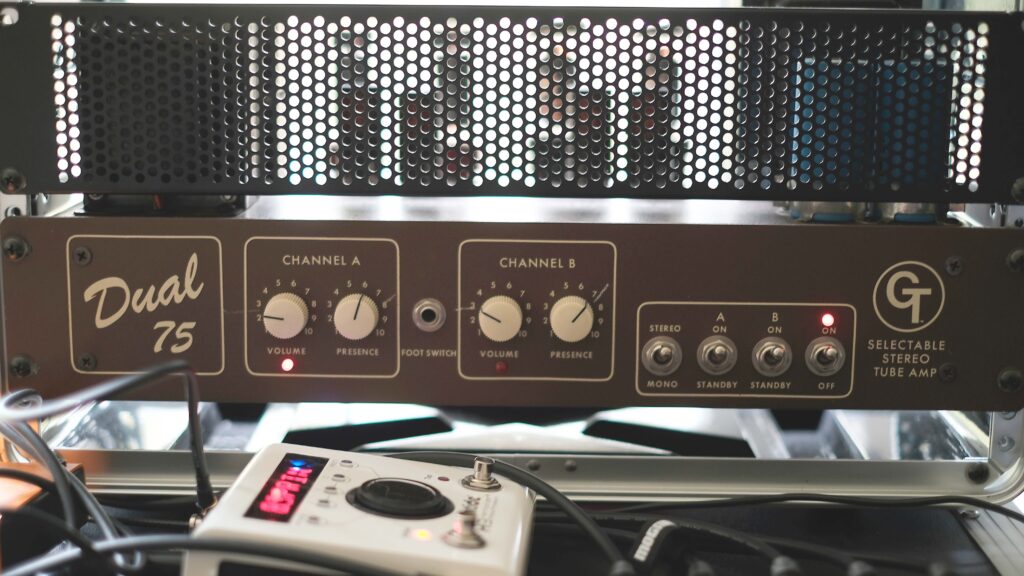
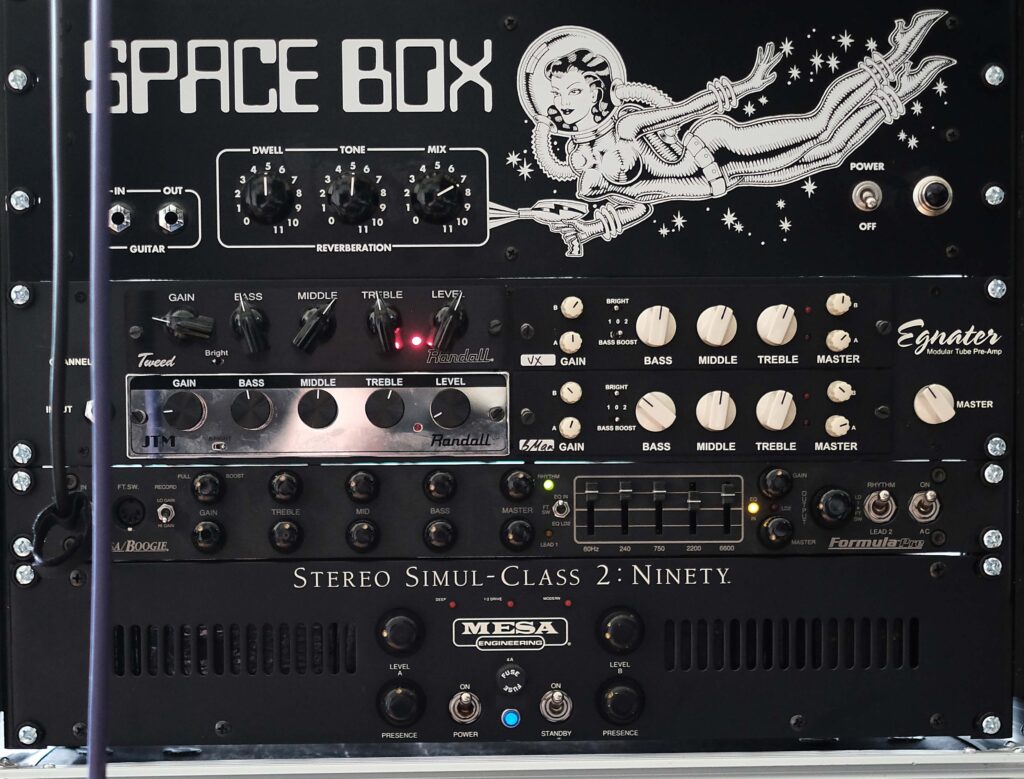
The big rig contains a number of Egnater and Randall modules which are run via two Egnater M4 units. These are also super rare and I bought both of these many years ago directly from Egnater in the USA. I remember having to wait for the second M4 in line after Steve Vai who swears by these units. The MTS modules are faithful reproductions of classic preamps by Bruce Egnater, including the Fender Bassman, Vox and other amps. Randall also made some of these but never found a way to properly market them.
Years ago I heard about the Soldano X99 and asked Manson Guitars to look out for one of them for me. On the phone the Manson guy busst out laughing commenting “Nick, do you know how rare these are?” I later found out that only 200 were made and only 3 with UK voltage. Manson’s rang me 6 months later with one brought in from Martin Barre from Jethro Tull and I grabbed it.
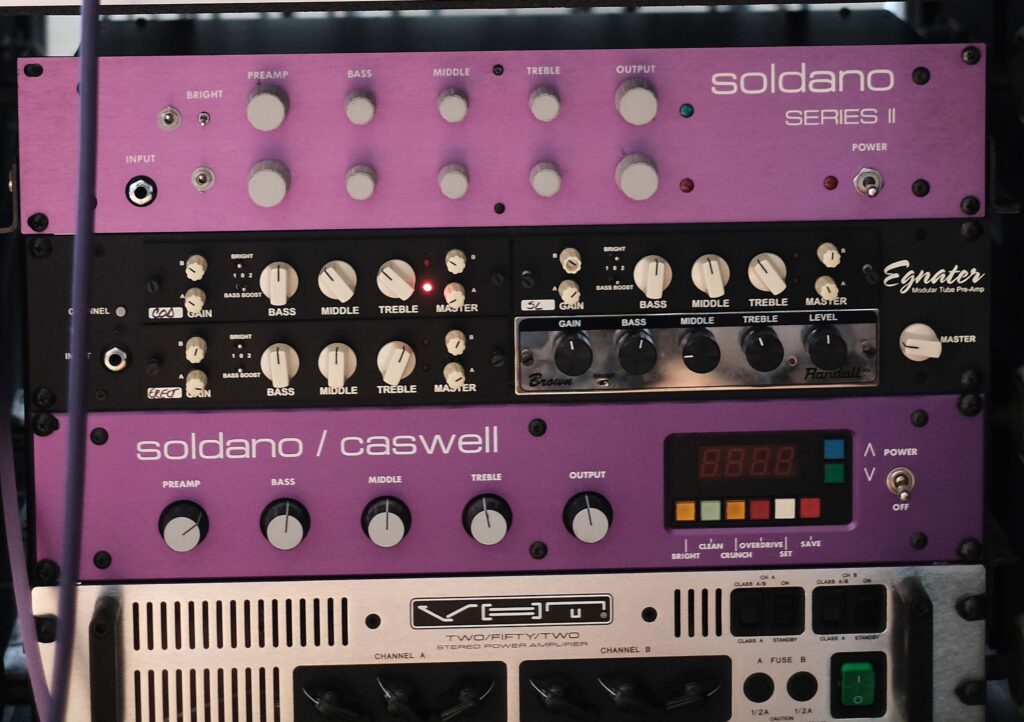
I also have a Soldano SP77 which is the sister preamp to the Soldano X99 and is also rare, but not as rare as the X99. The VHS power amp is the perfect companion for these units, giving a classic rock tone.
Bruce Egnater and other builders combined to create the Synergy company to market the classic pre amp modules. The Synergy SYN 1 is a single unit module that is perfect either as a DI recording device or to play live. I have two of these in the studio and they work brilliantly as well as being really well made.
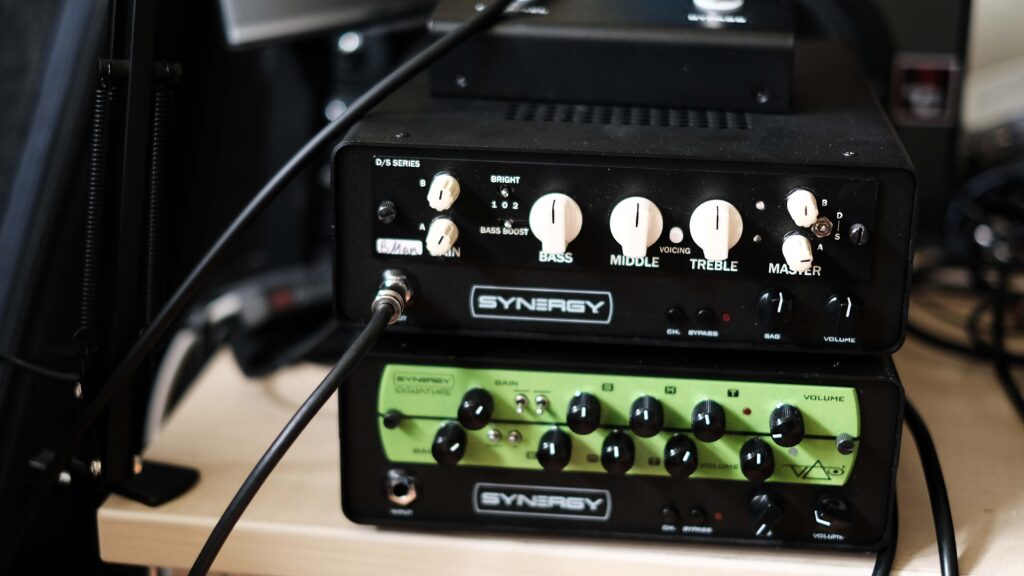
The rig requires a lot of cables and a Quartermaster unit for switching some of the preamps. I’m running these units out though two Mesa Boogie cabs, two two rock cabs and a Bognor 2 x 12 cab. This creates literally all sonic options. Its 100% a studio rig and not for playing out, as it would take a team of people to transport all this gear!
The last two years have meant covid musical adjustments with the advent of covid 19. For almost two years I only played one live gig which was the debut with the Heartache. It was a slightly surreal affair to suddently be playing to a full room of 120+ individuals. It was a great set and an absolute joy to be back playing, especially with the new electric material
I started rehearsing The Small Change Diaries ahead of a major future support slot and we’ve all been super careful to do lateral flow tests ahead of each and every rehearsal. In the UK currently more than one in 15 people have covid and although if you’ve been vaccinated it probably won’t kill you, it can still mean 10 days of being out of action and personally I can’t afford to roll the dice on that happening. This has meant cancelling a bunch of live activities I was looking forward to attending, but next week I’m in the studio on Monday working on the Towse collaboration, interviewing Sylvie Simmons on Wednesday, doing a band rehearsal on Thursday, so I can’t take the chance of missing any of these engagements.
I’m also hearing of many events being cancelled and I’m amazed at some close quarters indoor events still happening. With the Ukraine situation it seems many folks imagine covid has disappeared which of course is pure nonsense. This means making covid musical adjustments and taking as few risks as possible. I’m already seeing some festivals being cancelled due to covid and have great sympathy for all those artists who are touring and need to play out to maintain some income streams.
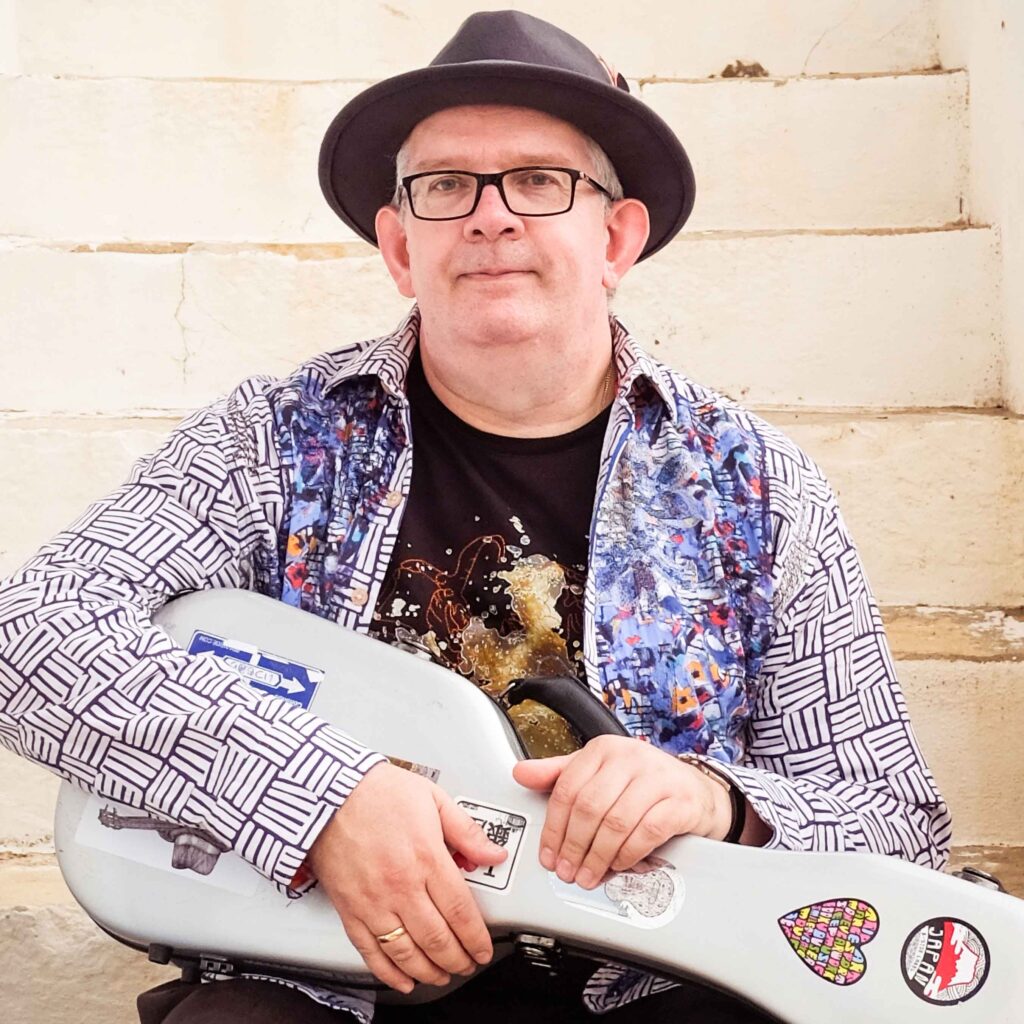
Yesterday was a hugely productive day in the studio working on the album “All is fine till the world goes pop” album featuring Towse. We mastered and signed off on “In these times” “They don’t mind” and Wait until the pain has gone” I’m delighted to have so many superb musicians on this project including Towse from California, Michael Ross from Nashville, Laurent Zeller from France, Agi on backing vocals, Emily Mercer and Josh Burnell on keys, Fergus Quill, David Bowie Jnr and Howard Taylor on bass, Rich Ferdi on percussion. This is proving to be the dream team of artists and of course Carl Rosamond as usual does an amazing job on production.
“All is fine till the world goes pop” is due for a release in September ahead of the live appearance in Oct supporting Jon Gomm.
There are at least four more tracks yet to finish – “Come on Down” “Nothing here sounds good” “Take Heart” and “Maybe” We’ll be back in the studio every two weeks to work up these additional tracks and I’m super excited to see/hear this whole project emerge. As well this album, there with be a “Nick Cody & The Heartache” EP “You gotta move” released ahead of October on Green Eyed Records. In 2023 I’ll be releasing the first Code-E1 remix album and we already have “34 tracks in the vault” for that release.
I’ve always been a massive fan of guitar amps, preamps and combos that are driven by tubes or as we say in the UK, ‘valves” To my ears there is something about the sound that has never been replicated by digital and solid state units. I recently took ownership of an extremely rare Groove Tubes 75 stereo amp, which I found on “Gumtree” of all places. Over 25 years ago I bought the Groove Tubes Trio preamp that fits with this, which replicates all the great Fender guitar tones. I’ve only ever seen one of these Groove Tubes 75 amps and that was in Amsterdam. Its a big unit that takes up four rack spaces and is pretty heavy. It uses three different types of guitar tube, 12 AX7, 6L6 and EL34s.
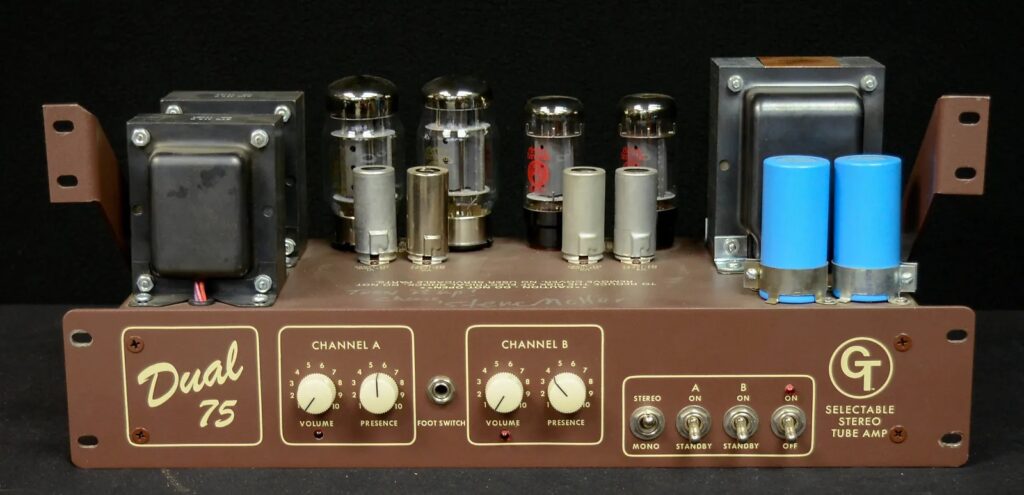
Many years ago I came across a modular preamp system created by Bruce Egnater. Bruce created a series of modular units that could be slotted in and out of a preamp chassis, and these all analogue hand built units perfectly replicated the sound of classic amps. This meant you could have a simple unit and quickly switch from a Fender to a Marshall to a Vox or any other kind of sound you wanted. The M4 units would house up to four different modules, each of which had two channels. This makes for a massive range of sonic choices for any guitarist and all these units were powered by a pair of 12 AX7 tubes. There was no UK distribution for these preamps and there were only 3 places in the USA you could buy from. I bought my first M4 from the wonderfully named Cowtown Guitars in Las Vegas and later persuaded Egnater to deal with me directly. When I bought the second M4 case these were clearly in demand for high end studios and I was third in line to Steve Vai and Def Leppard who had the first two units!
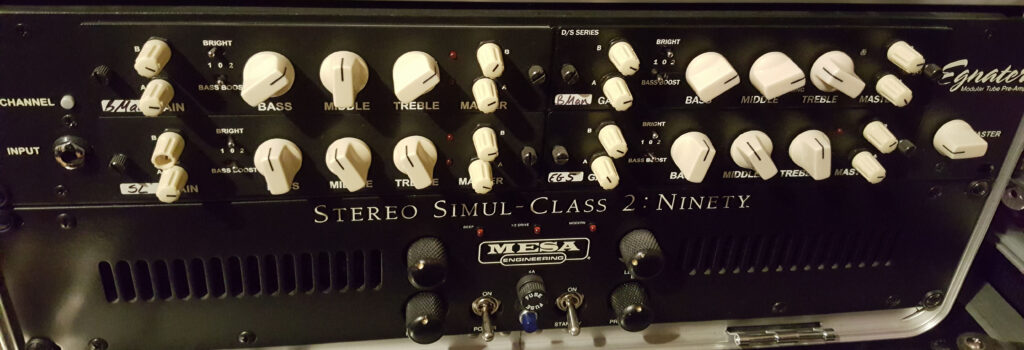
I heard about the Soldano X99 preamp over 20 years ago and checked out the two major guitar specialist stores to see if a purchase was possible. When I rang one store owner, I was greeted with hysterical laughter as he commented “Nick, do you know how rare these units are?” To my great surprise, 9 months later he rang me to say ‘Martin Barre from Jethro Tull just brought in his X99 and you are first on a long list of people wanting this, so if you want it, I need to know NOW!
In recent years, I’ve become a massive fan of Supro amps and especially the Comet 1 x 10 combo that was recommended by my great Nashville guitar friend Michael Ross. He runs Guitar Moderne which is a great site for all guitarists. The Supro has a bite to its sound and I first used this live with “The Heartache” last year live. Its a one channel amp with a ten inch speaker and like all classic class A amps weighs a fair bit. That said its a terrific sound unlike anything else I have heard. I later bought the Royal Reverb pictured below which is seriously heavy, but much LOUDER! Both these amps use classic 6L6 tubes
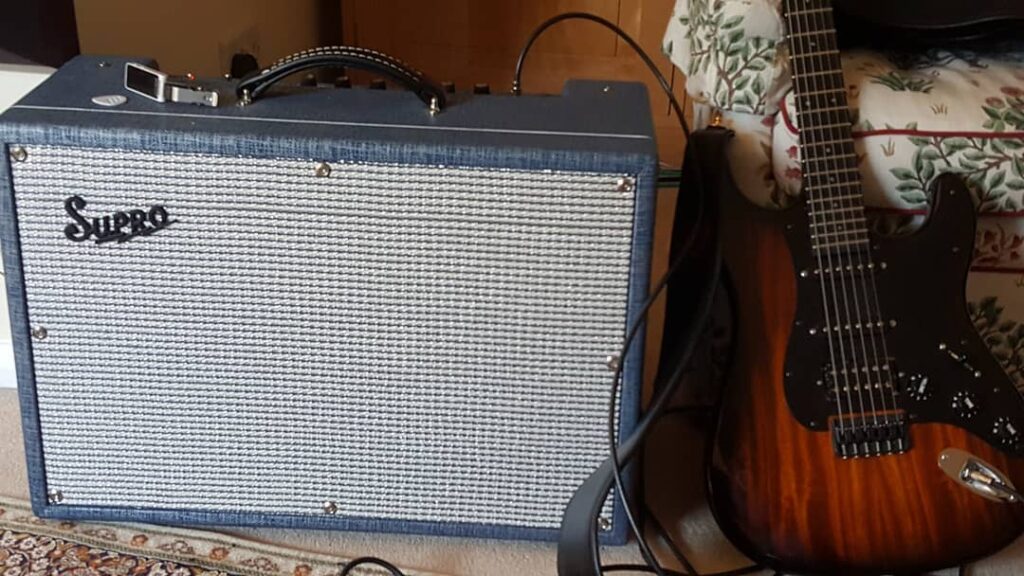
Supro Royal Reverb
With the current global situation there are only a few places left that make guitar tubes and one of the main ones is in Russia. Tubes are therefore getting rarer and a lot pricier. Many years ago I knew one of the reps for Mesa Boogie amps and he arranged for me to have a tour of their USA factory. I’d also heard that Mesa still had some of the classic Phillips 6L6 tubes and at the end of the tour asked about this. “How did you know about these the owner remarked? These are mostly reserved for Dave Gilmour!” I persuaded them to let me have some of these items which I put in my Mesa Boogie 290 power amp in my studio. Twenty five years on, I’m running the same tubes and of course Dave Gilmour didn’t grab a stack of these without good reason!
Covid 19 put the world on pause and for the last few years. After many years of playing local gigs, UK festivals and overseas festivals and gigs, I’m now rethinking opportunities for playing live. There’s a real joy to bringing music to a live audience and to date we’ve had many superb live opportunities with different ensembles, including playing at The Lagoa Guitar Festival in Portugal, a number of sold out album launches and some solo appearances in New York and Nagoya.
My producer Carl Rosamond always chanted the mantra “One live appearance is better than 8 rehearsals” I never really understood this until we started to play out in live venues. Its been a fascinating journey from the initial baptism of fire, when after a few local gigs, I found myself on the main stage at an international music festival. On that occasion, I learned more in 45 minutes than in the first year of rehearsals. When I look back at the footage, aside from playing everything at speed, the performance even in these early days was pretty solid.
In the last two years, I’ve only to date so far arranged one live outing, this time with the new Heartache ensemble. This was an opportunity to try out some of the new material. I’m pleased to report that the set was well received and the material stood up really well in a live setting. One of the benefits of playing live is that you discover very quickly how well material is received by the general public, especially if its not your typical fan base.
To date its been fun playing local venues, but it can be a lot of work and crank up some costs, especially if you have a policy of paying the band regardless of income from any venue. The benefit is mostly a massive education in what its like to front a band to entertain an audience. I’m lucky to be playing with many superb musicians, which has meant that I’ve really had to up my game musically, especially as I am fronting all these ensembles and we are playing original material.
After a number of years playing the local circuit, I now far prefer to organize much bigger live opportunities, through the Music for the Head and Heart and Green Eyed Records platforms. This means starting to host more established artists and providing evenings of entertainment, rather than simply doing gigs. This doesn’t preclude doing future gigs, but now I’m adopting a policy of “less is more” and being more selective about where and when we play. This means a great deal of planning as great venues are in short supply and established artists will plan ahead for live appearances. Also this means a lot more personal investment in signing contracts with artist’s managers who understandably want the assurance that events of properly marketed.
Previously I ran two Music for the Head and Heart events pre covid and am now planning a series of much bigger musical evenings starting with a showcase event October 7th with Jon Gomm.
In keeping with the Green Eyed Records “creativity through collaboration” I am delighted to be offering Towse from California as well as my own Heartache ensemble. In April I already have signed another major international to play in Leeds as part of the forth Music for The Head and Heart showcases, with one of my ensembles supplying support.
We’ll be looking at “The Old Woollen” in Leeds again, as it is covid friendly, has free parking, full bar, fully seated and crucially a superb sound system. Crucially we have a great sound engineer for these events and none of the constraints in terms of curfew and audience limits which in my opinion hamper playing at some other venues in Leeds.
I’ve been thinking recently about “the power of creativity through collaboration” and how there are wildly different artistic visions among artists and every different behaviours. I set up Original Ukulele Songs to provide a platform for ukulele artists who are interested in creating original music. The resource was and remains 100% totally free for anyone interested and some artists have the ability to have their own bespoke pages on the site to promote their music. Its essentially a totally free advert for performers and to date over 150 artists from all over the globe have taken advantage of this opportunity. I then started to look at running live events for some of these artists and in 2017 sponsored a stage at a known ukulele festival. We showcased 7 acts, videoed the event and this also helped promote artist awareness. The feedback was terrific and it was a packed audience that stayed to listen to all the performers, even though most attending only knew a few of the artists. This was a great example of collaboration and artists working together, rather than in isolation.
After a few years, I realised that the ukulele world was too small and there were too many politics. It made more sense to create 2 bigger music platforms, Music for The Head & Heart and Green Eyed Records. I’m grateful for some great assistance from a number of people who have supported this concept and in particular Sylvie Simmons and Frank Wilkes from Kycker who freely gave me a lot of time in thinking through the core concepts. The central theme for the OUS platform, MHH and GER are to promote the love of great music and the core ethos is doing this through collaboration and sharing. I’ve also realised the value to seeking out like minds and above all working with professionals. Its early days as the GER platform is less than a year old, but the FB page and the main site are getting great attention and feedback. More than ever this is IMO a time for creativity though collaboration to promote great music.
I’ve been happy to financially fund these resources and its interesting to have a huge range of reactions. On one extreme I have had some great article contributions and advice from seasoned professionals and at the other extreme I’ve had some quite bizarre reactions in promoting GER. On one FB I was promoting a live event cross posting and running ads for all the artists attending and one person hilariously accused me of incessant posting on a particular FB page. I immediately posted an apology for any offence created and politely reminded them that the the purpose to posting about a forthcoming live event was for her chosen artist to reach a wider audience.
Not only was I not taking any fee from the forthcoming event as a support act, but also was personally help fund the event to promote great music. All of this help fell on deaf ears and I realised that some folks don’t real get the value of working with others and prefer to work in isolation. That’s IMO always the death knell for most artists, both financially and creatively. Of course everyone has the perfect right to follow their own beliefs, but its hilarious when those who choose a path of isolation then complain about how isolated they are from reaching a wider audience essential for basic living expenses as well as being able to complete creative work to a good standard! Its a shame, but I have realised that there’s little point in explaining “the elusive obvious” in such situations!
I’m more interested in great music rather than being part of any artist fan club and I have become increasingly more selective about who I work with. In my non musical capacity I have a successful history of promoting events across the globe and running many productive marketing initiatives. The key ingredient in two decades of success is working with those who value collaboration and appreciate that
“No one of us is smarter than all of us”
Later this year the next Music for Head and Heart Platform in association with Green Eyed Records will feature Jon Gomm as the headliner and Towse along with The Heartache as a support act. These evenings are all about great music and its an absolute joy to work with such professionals. Jon had already agreed to be interviewed for Music for The Head and Heart and its a real privilege to host him in a live capacity at a great venue in Leeds. The headline act for 2023 has also been signed and similar to Jon that performer has a very busy international schedule, so we have to plan ahead to secure the booking.
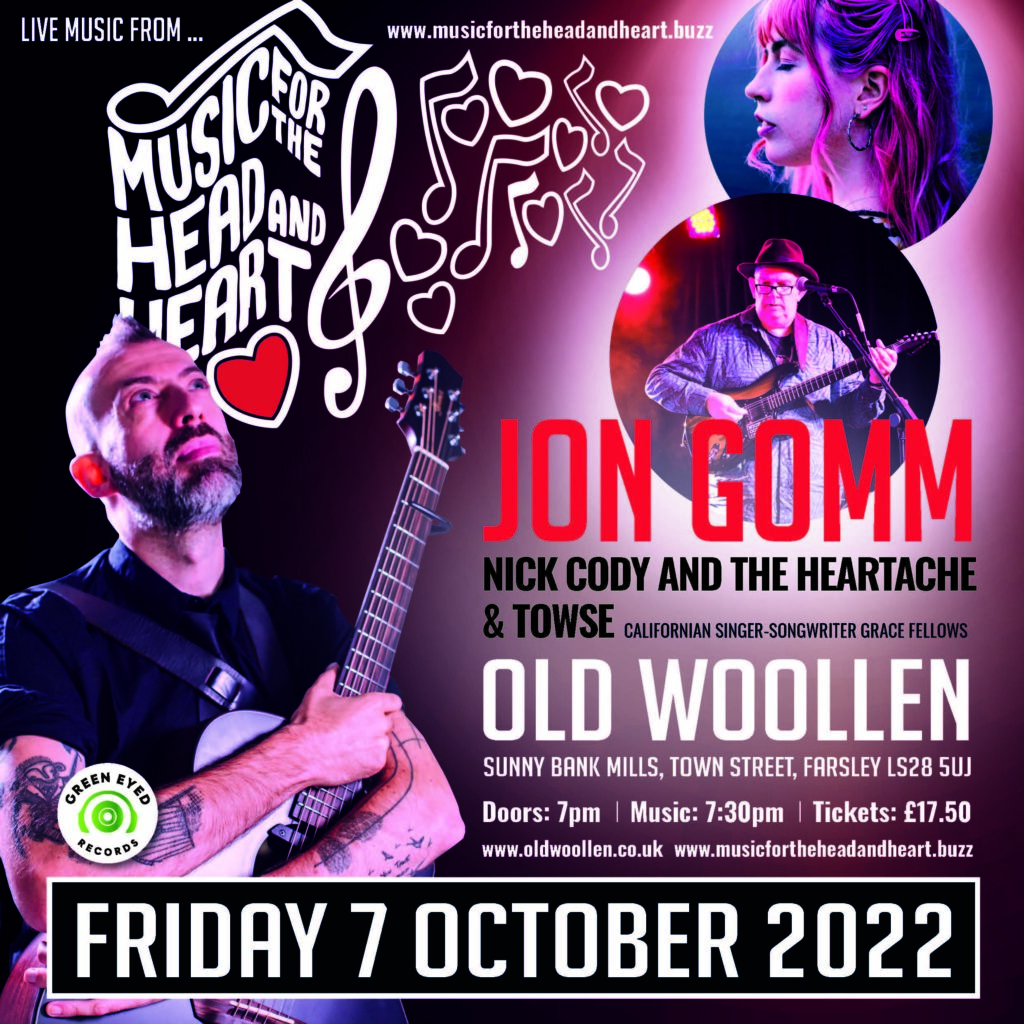
Green Eyed Records encourages artists to work together for the promotion of great music. I’m happy to put my money literally where my mouth is and to sponsor events, marketing and equipment with no strings attached. Many artists regardless of how talented they are, don’t have the individual reach to attract a wider audience. The old argument “We’re not interested in being big” is usually a cop out as many such artists often struggle to maintain paying weekly bills, never mind being able to invest in bringing their creative voice to the wider world.
April last year I decided to set up Green Eyed Records as a platform for music lovers to share thoughts and resources. I’ve blogged previously about some of the challenges for artists in creating and promoting music and I always return to the same conclusion, that a whole new way of thinking is long overdue.
The central idea for Green Eyed Records is “Creativity through collaboration” as in my opinion the old record label model doesn’t really serve the artist’s interests these days. Sylvie Simmons interviewed me here on the GER concept and did a great job of asking smart questions about the validity and viability of the whole concept.
Last April I set up GER on FB and Instagram to create awareness for the platform. Social media has become a key factor these days in promoting music awareness and this has been a great opportunity to gauge how people respond on these mediums. Of course some artists and FB enthusiasts don’t really understand how social media works and confuse “users” with “customers” on these platforms, sometimes with hilarious posts. Over the years I have literally been happy to “put my money where my mouth is” and support the promotion of great musicians, previously through the Music for the Head and Heart platform and now Green Eyed Records.
I fully respect that we all have different ideas on how to promote music, but I’m increasingly aware of artists snatching failure from the jaws in this respect. Of course covid has reduced a great deal of the live playing income stream and streaming has killed a lot of product revenue. This calls for a new way of thinking and in 2022 I’ll be running a series of new initiatives through Green Eyed Records that will help artists reach a wider audience beyond their existing core fans.
The GER FB numbers have grown at a surprising rate and at the time of writing are already
2,043 people like the page and 2,247 people following the page
In one of my great conversations with Sylvie Simmons, she pointed out that the FB music enthusiasts were mostly the boomers. “Baby boomers” or “boomers” are described as “The demographic cohort following the Silent Generation and preceding Generation X. The generation is generally defined as people born from 1946 to 1964, during the post–World War II baby boom”
We started to notice that posts about classic artists like Carol King, David Bowie and Freddie Mercury attracted a huge number of likes and shares, way beyond my expectations. One photo of Freddie and Dave Gilmour generated 8.2k likes and 234 shares. Another graphic about bass players to my total surprise generated 7.6k likes and a staggering 1.7k shares!
In 2022 in conjunction with Music for The Head and Heart, we’ll starting running some live showcase events which are part of the next phase of GER. I remain convinced that the best hope for music promotion is through collaboration and discussion. In these tougher economic and covid times, I’m convinced more than ever of the need for better ways to promote and discuss great music. GER is one small but growing group that will help promote “creativity through collaboration”
Over the years I have come to realise the value of investing in really good musical gear. This has proved to be true for amps, as well as acoustic and electric instruments. I remember talking about this subject to my good friend and international violinist Laurent Zeller who commented that 15k would buy you “an ok< but not great violin!” Of course everyone will have a limit to what they can afford, but my experience is that a well made instrument will often inspire better playing. The challenge with mass produced instruments is that often the quality is at the best of times variable. I remember talking to one international artists in NYC who commented that for one well known brand you’d need to play ten to find one good one!
Online reviews of musical gear can be useful, but there’s no substitute to having an instrument in your hand so you know how it responds and how it sounds. Also its a good tip to have somebody else play, so you can hear the result as a listener as well as a player which of course is very different. The challenge these days is to find any store that holds sufficient stock so that you can reference how things sound in the same acoustic space. Increasingly stores are closing and some of the ones I used to go to like Chandler Guitars in the UK, Hill Country Guitars in Austin Texas and Matt Umanov in NYC, no longer exist. Online reviews can also be very biased and partisan, so I mostly take these with a pinch of salt!
Luthier built instruments can often be great investments as well as great playing instruments. When I first looked into buying and playing ukuleles, I was lucky enough to pick up a Collings pre production concert uke which had been at NAAM. As with all Collings instruments (both electric and acoustic) it sounded amazing and that was the start of my ukulele collection. I later bought my first Shimo from Japan and I now have eight of his instruments which have been used extensively in the studio. These still remain my favorite ukes, unlike anything else I have come across and I’ve played a lot of ukuleles from all over the world. There are a lot of “uke shaped objects”, some “ok” ones, some good ones, but few really great ones. In the UK the only place I shop at is Matt Stead’s store, where by far you get the best quality and prices. For acoustic instruments I love Sobells, Collings and Gregor Nowak’s instruments. I also have an excellent Pete Howlett uke that is quite unique.
Here are some of the growing family
2021 has been quite a year and a record year for writing new material. I currently have 48 tracks “in the vault” and 34 tracks already to go for a very different project. The main focus has been on the Heartache material as well as releasing the first track with Towse. I also set up Green Eyed Records which is an expansion of the Music for The Head and Heart idea which promotes “creativity through collaboration.
Special thanks to Sylvie Simmons for a great interview on GER and a series of terrific conversations about the music industry and to all those who have posted on the GER FB page, which is growing at an amazing rate. 2022 will see the emergence of a Music for The Head and Heart live showcase on a much bigger scale with some fantastic artists. There will also be a major MHH showcase in 2023 as we have already agreed to host a major performer to head up a great showcase. Thanks also to Jen Geering for great behind the scenes work to keep GER on track, Carl Rosamond for amazing sound production, Neil at KimWaves for radio promotion, Rob at Fans for Bands, Frank at Kycker for great advice and everyone who has been involved in creating such great music.
Special thanks also to all the radio plays from Andy Coote, Nick Field, Shelly Morgan, Mike Evans, Daz and many others
Wishing everyone a very cool yule

I was recently looking for an artist online I know as a possible act for a future live music showcase. In doing a Google search her main site was offline as well as her SoundCloud account! This is of course not unusual and I can only imagine how many opportunities are missed by such a lack of attention to detail. Another misconception is to only use social media as a platform for online communication and not have a central website which you then have control over. Its not just artists that miss “the elusive obvious” of course.
Earlier this year I had an extensive conversation with a music promotor who also did “mentoring” for artists. I offered to pay for her time and booked two hours with a series of questions I had in mind. It was an enjoyable conversation but when I looked at her main site for her company, over 40% of the links for artists simply didn’t work, not the best advert for somebody working as a promotor. I come from a business background and have been teaching communication skills to business and groups across USA, UK, Asia and Europe for the last two decades. I’m amazed that in “the music business” many artists and promoters make a lot of basic mistakes. Yes, we are all learning, but these are basic errors that will directly limit the ability to communicate to a wider audience and/or artists.
Both artists and the public often don’t appreciate that with platforms like Facebook, the “customers” are those who pay for advertising, the rest of us are users of the service. Being on Facebook and complaining how the platform doesn’t meet your personal needs is a bit rich considering that its a free service for users. The benefits of this and other social media platforms is that they can potentially drive traffic to your main site (which of course you can frame in whatever way you want), rather than become subject to the latest algorithm from big tech. Some artists adopt the “I’m not commercial” stance, but then literally endlessly plead to a small fanbase to underwrite and support their creative plans. Nothing wrong with that, but this can be a pretty myopic way of working,
In April this year I set up Green Eyed Records platform to promote discussion and debate. The central idea is “creativity through collaboration” and I talked about this at length with Sylvie Simmons here. As well as running the main site, a small team of us have being exploring using various social media platforms to reach a wider audience and generate more interest for the platform. I’ve been massively surprised by some of the findings. Having never been a fan of graphics with quotes and artist one liners, I have to admit that some of these can generate an extraordinary amount of interest. One of these posts created 6.6k likes, 497 comments and 1.5k shares. This added a huge number of followers and likes for the page, far beyond my wildest expectations.
Its early days for GER, but its become clear that with social media there’s a tipping point that is needed to generate interest and that means an investment of time and money on an ongoing basis. This also means paying attention on a daily basis to how many people are engaging online and what generates attention. I am working with a few artists who value the “creativity through collaboration” ethos and sharing everything I am finding useful in reaching a larger audience. In 2022 GER will also start assisting selective artists with promotional music campaigns to help them develop greater audience reach. We will also start running some live showcases in conjunction with the Music for The Head and Heart platform on a substantially bigger scale than in days gone by!
Another common mistake in developing a good presence online is to lose focus in maintaining a consistent message. Sometimes artists veer off into making all manner of posts that in my view really don’t help promote their image in a positive manner. Two examples of this are Eric Clapton and Van Morrison with their anti vax proclamations. I have no issue with whatever they want to believe in putting their own opinions about health specialists, but having once greatly admired this artists I now think of them as total dicks. Its a real shame as both in days gone by have produced some exceptional music.
Of course there is no right or wrong way to creative a presence online and people can have radically different ideas about this. One thing is certain in recent times which is that more and more people are looking for music via the internet and that social media is increasingly a major factor in reaching a wider audience.
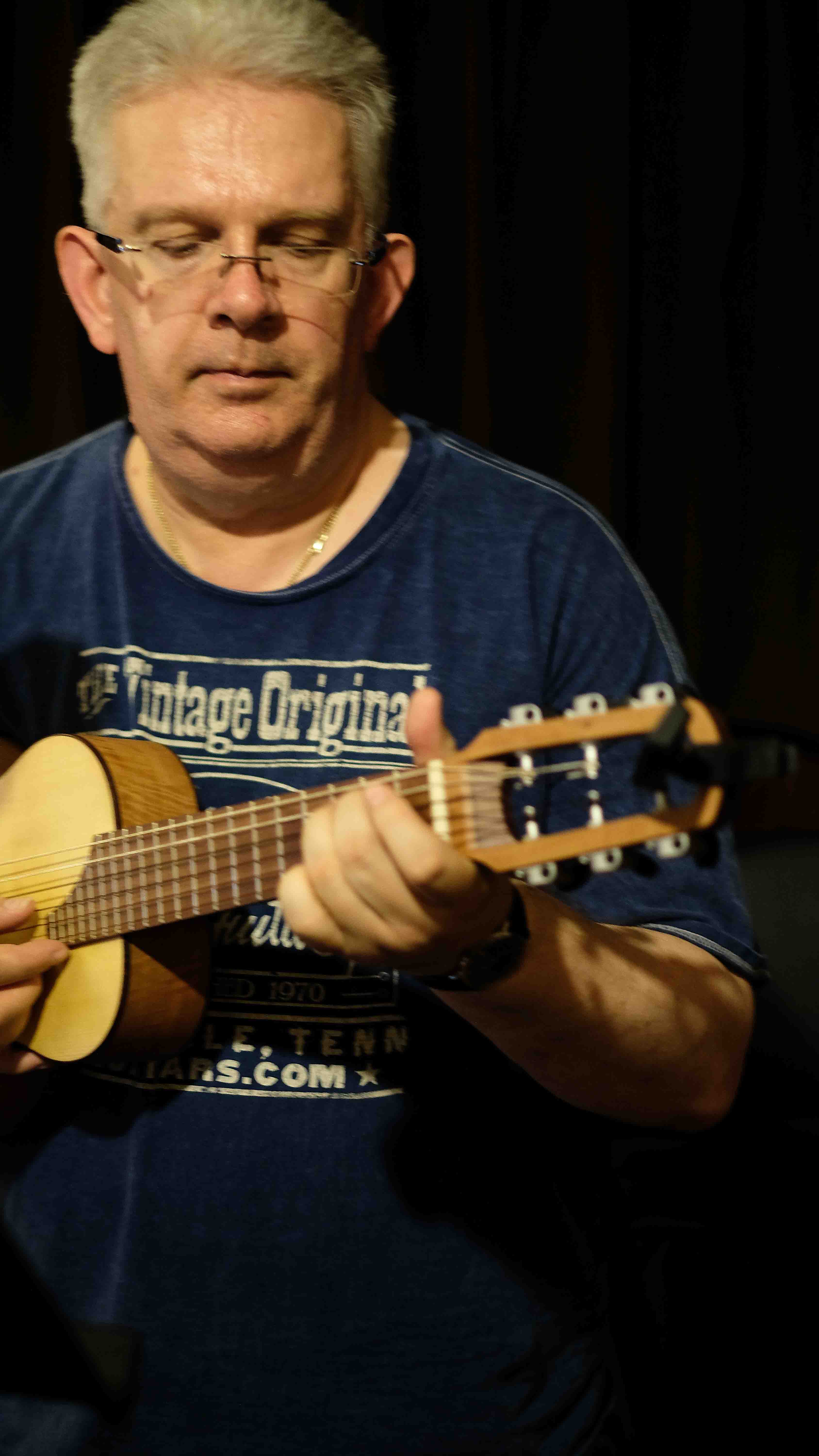
During covid 19, I’ve spent a lot of time upgrading the studio, so its now exactly as I want it. I have a lot of gear and many items that are just brilliant for recording. Today Fergus Quill dropped by to lay down bass for five different tracks which are in various stages of production. Fergus is an exceptional musician and has been central to both “The Caravan of Dreams” and “The Heartache” Not only is he technically a brilliant musician, but he also have a great feel for what works musically. We used the Acme DI for all the bass lines and the results were terrific. Fergus first told me about this unit, so I hunted one down and the Acme certainly didn’t disappoint.
We always record alternate takes of each track so we have options when mixing. Its fascinating to see such an artist at work where he can play a variety of different styles which gives us a huge range of choices. I’m super pleased with the results and these tracks will appear in 2022 and 2023.

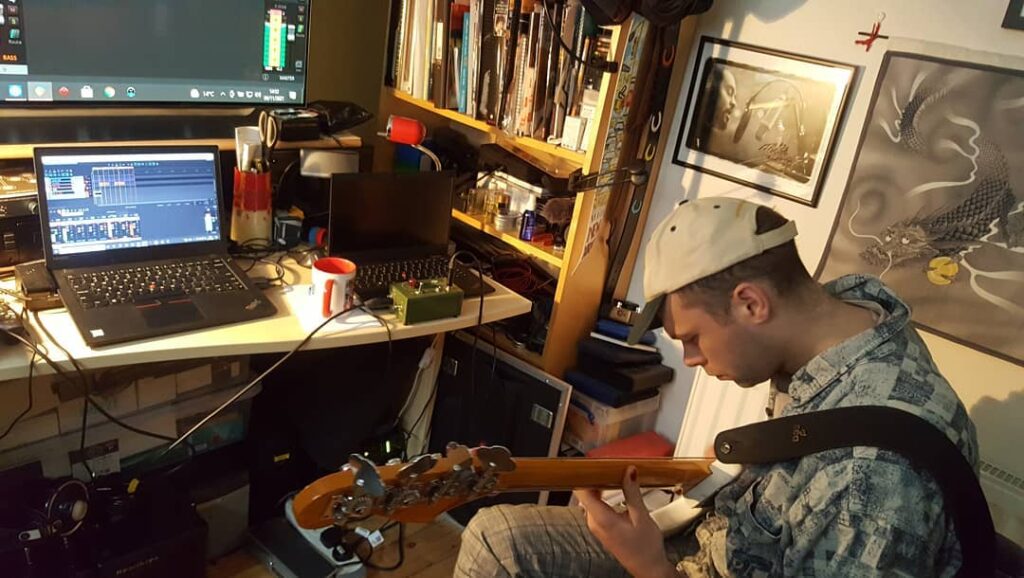
In recent times I’ve semi jokingly posted that “I swear people are getting crazier” and one sign of this is the increasing emergence of the angry emoji nit jobs on social media platforms. These are almost always guys who have FB and other pages with very few friends who don’t seem to understand the social media medium and how it works. For the purpose of this blog I’ll refer to the angry emoji nut jobs as the “AENJs”
Many of the AENJs don’t get that if a person sponsors a post on a social media platform, then the platform decides where it appears, NOT the person paying for the advert. Of course many people don’t appreciate than many using platforms like FB are “users” as opposed to “customers” The social media platforms, like any business are there to make money and are not a free charitable concern for the wider public. Despite this simple fact many users on these platforms endlessly moan about the very platform they are using for free!
At Green Eyed Records FB platform we regularly run sponsored ads to bring the FB page and the main site to a wider public. Of course we can denote to a degree where adverts appear according to the audience we can to reach. As with any advert some with enjoy it, some will be indifferent and some with not like it. Recently we ran a promotion for a great article from a world renowned music journalist Sylvie Simmons on the whole GER philosophy. Over 100 people “liked” the post, but I noticed a few angry emojis appear, which to me seemed a bit odd. Even stranger was one character complaining that we were spamming his FB page.
I politely pointed out that FB decides where adverts appear and not ourselves. FB also gives any platform user the option not to see any specific advert if for some reason they don’t like it. Its a simple two second click of a button and the ad disappears from the user’s FB page. It takes far longer to work up a graphic and write up a long post complaining about the very platform that they are using for free! What seems odd to me is that the ad was to a great article, there was no sales pitch for any product or service or attempt for data capture. Perhaps unusually GER exists simply to help artists to reach a wider audience and there’s no charge for this help. One of the AENJs describes himself as “Professor at Department of Conspiracy”, make of that what you will! Another is a massive fan of Joan of Arc…
A closer look into this AENJ behaviour reveals that all these characters are from a certain part of the USA, nearly all guys, and in every case they have a very small number of “friends” on their pages. I’m a fan of discussion and debate as that’s how we all learn and of course if anyone actually points out a few simple truths about social media mediums and how they work, there’s never any interest or ability to engage in any discussion. Fortunately these characters are a tiny minority in the scheme of things and I’m really pleased at the positive response to GER showing the latest stats on engagement –
1,114 people like this page 1,234 people follow this page
The central philosophy of Green Eyed Records is “creativity through collaboration. This is of course explained in the Simmons article here for all those interested in such matters. In my non musical life I teach about human behaviour and problem solving. When I first started out in music I was mystified as to how any artist could could earn a living from music, when there were so many potential hurdles to any form of success. I’m lucky to know a number of artists personally at local level all the way to those playing international stadiums headlining major festivals. I’m convinced that with the reduction of live opportunities due to covid 19 and streaming services which have killed past earnings potential from product sales, a new way of thinking and a new model is greatly needed. We lean and evolve through discussion and debate. We can agree to disagree on matters, but simply posting an angry emoji is IMO pure lazy behaviour that seems to me to be not the best use of time and energy, but each to their own and such actions do make for great stories about human behaviour!
Here is a list of all the songs I have recorded to date across all my ensembles
Only half of these have been released so far and there are releases planned throughout 2022 and 2023
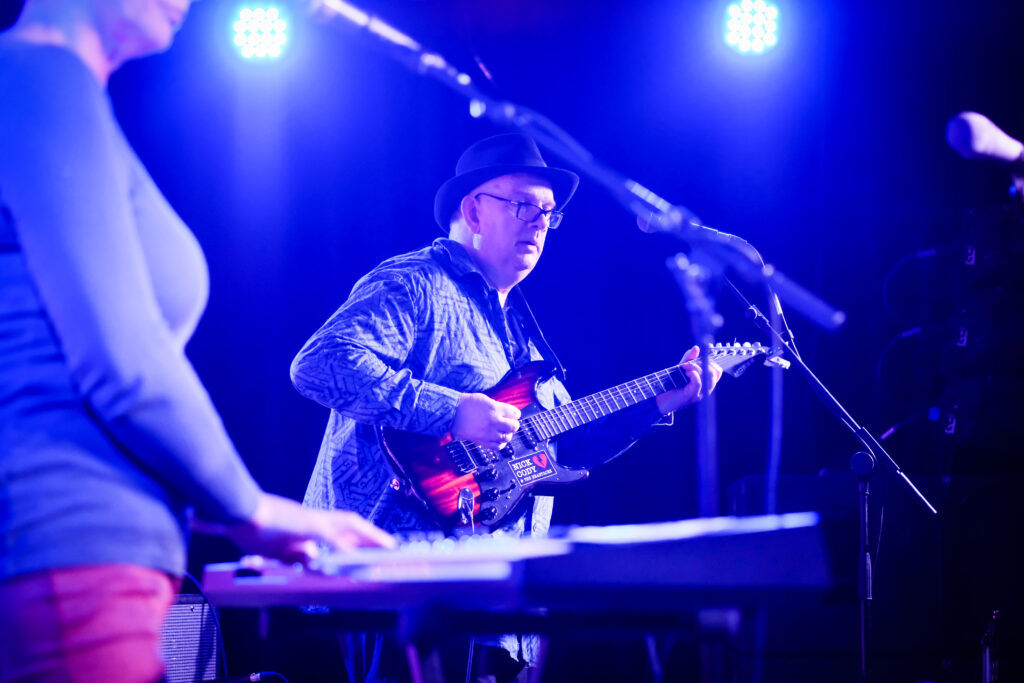
If 2020 and 2021 was the period for writing and recording music, 2022 is going to be a bumper year for music releases. I’ll be working across four main projects, which are the duet material with Towse, the resurrections of The Small Change Diaries acoustic ensemble, the Code E1 remix electronic work and the all electric Nick Cody and the Heartache band.
This means a lot of rehearsal time and a great deal of time working with a creative team for music, video production as well as social media. All music will be distributed through Green Eyed Records and we’ll be looking at digital and physical products.
Running one band is time consuming, but working with two ensembles as well as other projects requires a great deal of organisation and planning. The heart of all these projects is having an excellent producer and sound engineer, Carl Rosamond. This was never more evident than soundchecking the Heartache under very tight time constraints at a recent live performance. The whole sound check with five members took just 15 minutes and many people commented on how great the sound was. I’ve used Carl for all music releases to date and he remains an essential ingredient to all four projects. Similarly Karen Turner has been the photographer for all ensembles to date and has captured many great photos including those from overseas festivals.
I’d love to think that great music alone would be enough to reach a wider audience, but that’s simply not true. Any music distribution and promotion requires time and money. The recent downtime with Facebook and Instagram highlights the importance of having your own web presence online and not relying on third party social media platforms. I recently decided to use Kycker for all music distribution as the company is far more user friendly and personable that those I have used before. I’ve also started to hire external radio promoters and digital media specialists to increase audience reach and this is working really well. One of the keys to success is to only work with professionals and skilled individuals. Its also crucial to work with people with good communication skills as recording and promoting music requires a lot of coordination. I’m lucky to have a longstanding core team that get the job done and are a pleasure to work with,
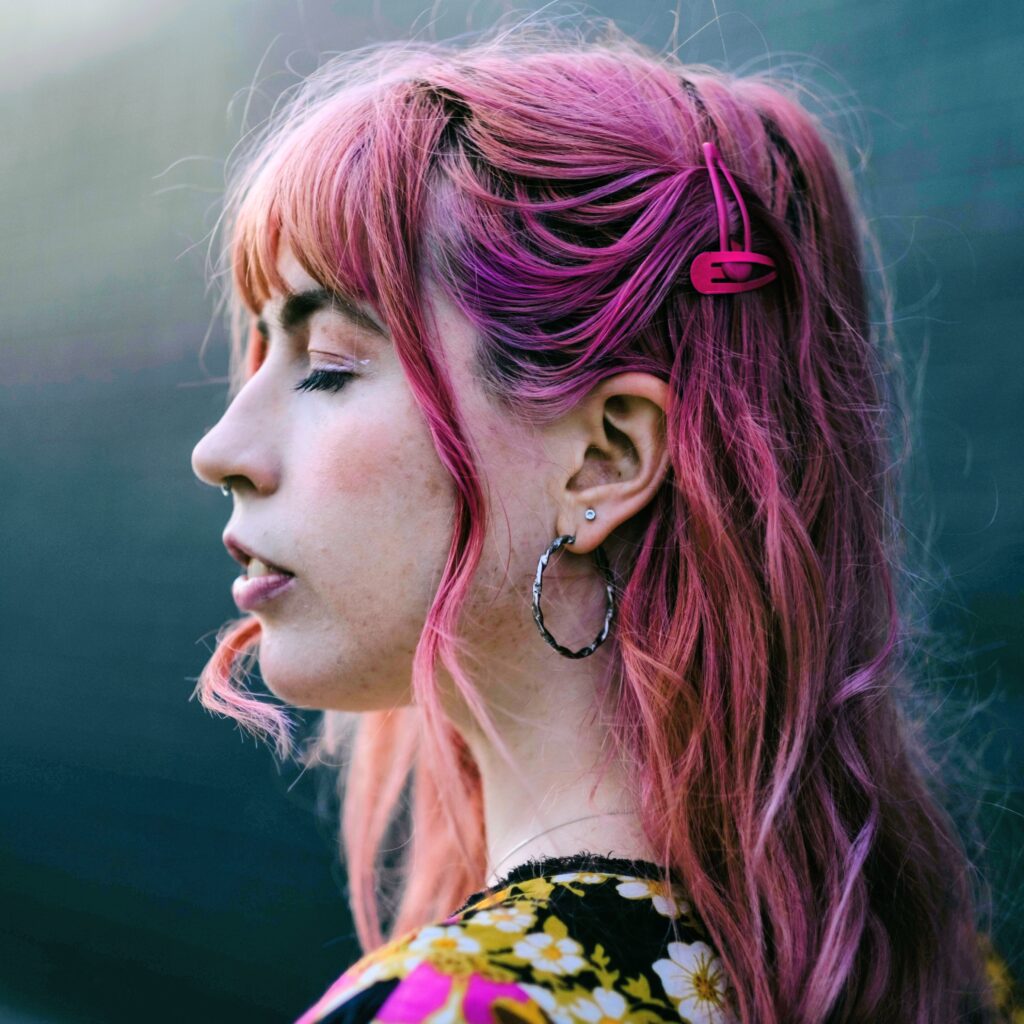
Towse
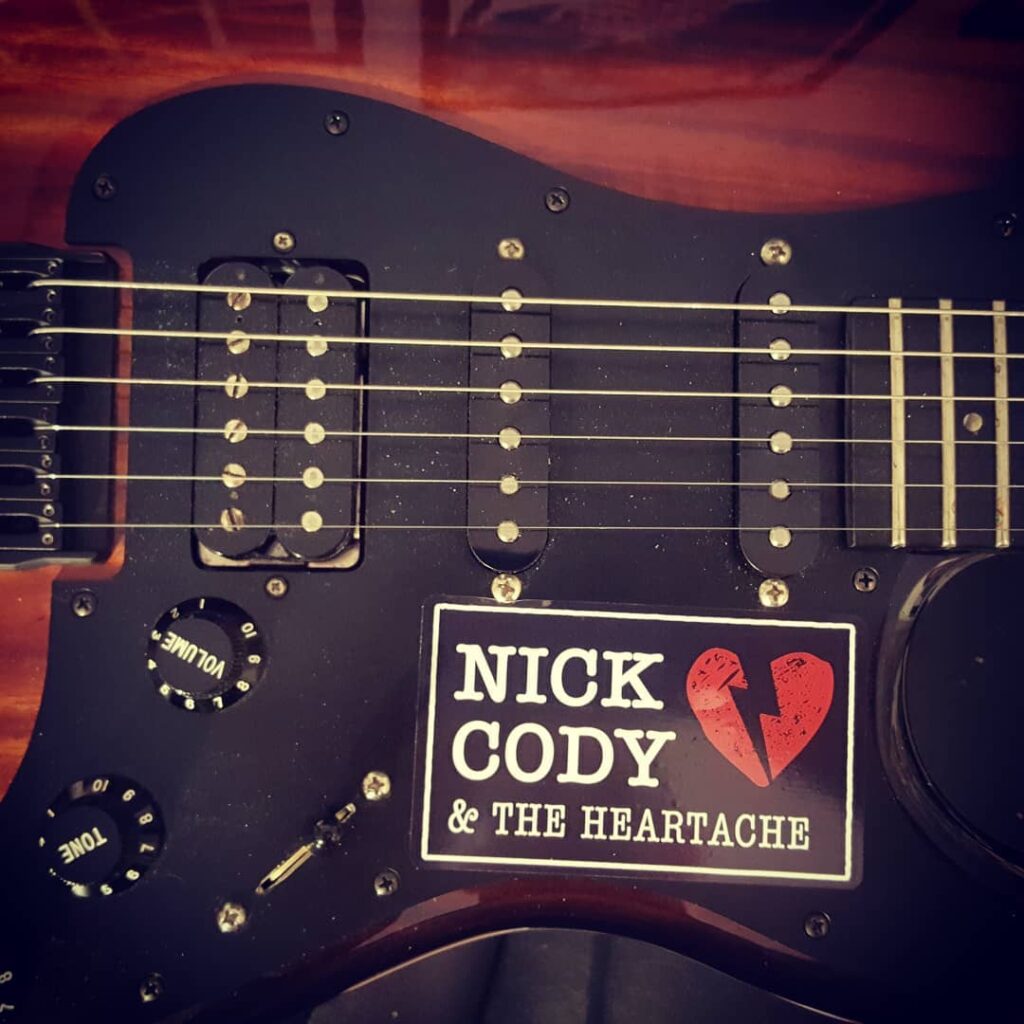
We just completed a short 30 min support slot in Leeds to try out some of the new Heartache material for the first time. Below is the first outing for “That gal’s as cool as fuck”
This was the first time I have played electric guitar live as opposed to playing acoustic instruments. The Supro comet did not disappoint and I used two hardtail Stratocasters with graphite necks that sounded terrific. Its also the first time I’ve ever played with a second electric guitarist, although with the above track I stick to simply doing vocals. This was a “toe in the water, 30 minute support slot” and we deliberately chose 6 varied songs to test out the new material. A live setting is always the best way to measure how well material translates with a live audience and I was pleased with the results.
In 2022 subject to covid, we’ll be looking at more live options for Nick Cody and The Heartache and working up a much longer set, especially as we have a lot of potential material to showcase! Thanks to everyone who came to the show and who has shared our posts on social media, we appreciate it
In recent years, I’ve been thinking a lot about music distribution and music deals. I’ve always been a massive music lover and set up Music for The Head and Heart and now Green Eyed Records as platforms to support musicians and help promote great music. With Music for the Head and Heart I approached the great rock journalist Sylvie Simmons to perform one of her songs. I’ve followed her writing for literally decades and now find she is a great performer and lover of ukuleles.
I was delighted when she agreed to interview me for Green Eyed Records on the concept of this platform. The central concept is “creativity through collaboration” and I talked about this in the Sylvie interview
“What’s the idea for Green Eyed Records?
The idea for Green Eyed Records was a little bit influenced by Robert Fripp’s original idea in ’92 when he talked about is to reduce the distance between the people who are creating the music and the people who are consuming it. That was already starting to happen with things like Patreon and Kickstarter. Fripp wonderfully described it as “a model of ethical business in an industry founded on exploitation, oiled by deceit, riven with theft and fuelled by greed.” Don’t hold back, Fripp, just say what you mean!
So my thinking is: In the old days one of the main limitations on things was the ability to get to the wider public. The internet helps with that – YouTube and Social Media – so there are mechanisms to get to more people. The last information I had is that every day 60,000 tracks are uploaded to Spotify and the renumeration for that per play is absolutely miniscule, which is great for the tech companies and other people, but not for the people actually creating the product. It has to be funded in some way. And the only way I can think of this actually working is if people work together in some collaborative way so that we can, remove as many of the intermediary people as possible between the audience and the providers of the entertainment. That throws up a whole bunch of challenges of course, but I don’t see another way of doing it. Because unless you’re extremely established and you’ve been around for a very long time and you’re riding the momentum of what you’ve done before, the current model’s not going to work.
“Creativity through Collaboration” is Green Eyed Records’ motto. It’s a great line, but what came to my cynical British mind was, is this some kind of hippie dream? Like those kibbutzes in the 60s where you’ve got a guy who knows how to saw the wood and a girl who knows how to make curtains, and when evening falls they all sit around the campfire singing Kumbaya. Is this what you have in mind?
Hopefully there’ll be no Kumbaya singing! But herein lies the challenge.”
Since 2014, in heading different acoustic and electric ensembles, I’ve realised the importance of being organized and working with like minds. I’m lucky to have a brilliant producer in Carl Rosamond and he’s been invaluable in creating over 70 tracks to date including 45 during this covid era. I’ve also been amazed at the amount of time it spends to organize events , band rehearsals and live gigs. One of the earliest examples of the need for organization was when the first band “The Small Change Diaries” in playing at the Lagoa Guitar Festival. I’d only played a few gigs before this outing, and this was a true baptism of fire. I was also lucky enough to meet my great friend Laurent Zeller, who has played on subsequent tracks with both “The Small Change Diaries” and “The Caravan of Dreams.”
I’m currently working on a number of very different musical projects, including “Nick Cody & The Heartache” which is an all electric roots outfit, Code – E1 which is all electronic music, a pop album and an album of duets. I’ll also be looking at GER and Music for The Head and Heart in 2022. One of the keys to success is to find like minds. I’m forever told about how things “can’t work” while I demonstrate the exact opposite. I have also realised that “the music business” is like any other business, its a series of trades and the question is for all those involved “Is it a good trade?”
Some artists can have superb creative skills, but can be quite delusional when it comes to marketing an basic business. I’ve thrown out great no strings attached financial opportunities to some people and some just don’t understand basic business strategy. Its not about “working for the man” or other such daft statements, but rather thinking about the steps best needed to reach your chosen audience. I’m reassured that there are some great resources online that echo my exact thoughts and highly recommend Rick Beato and Glenn Fricker both very outspoken but in my view very smart. Crucially they have the experience to offer useful advice and this confirms that “the music business is like any other business”
Of course there’s no right or wrong, just different ways of working. One thing is certain, music remains central to my life and I have had a blast meeting so many fantastic people, including Sylvie Simmons, Martin Simpson, Jon Gomm, and too many others to mention from all over the globe. I recently spent the weekend with a friend who has sold over 25 million albums and once again we agreed that “The music business is like any other business”
As part of setting up the Green Eyed Records platform, I’ve been looking in live music events promotions and I’m constantly amazed at what I have found to date. I recently searched for an artist I knew was playing as a support act in a major city venue. Even with the date and the venue name, it took a fair while to find the support info. Aside from the actual name of the artist there was ZERO INFORMATION, that’s right, absolutely NOTHING! There was no bio info, links to social media, artist photo no video, just NOTHING!
I don’t claim to be the world’s greater music promoter, but this is really basic stuff. Ok, I thought, there’s nothing on the two support acts, lets look for the main act information. Yes, in this instance there is a photo and a link to one track of audio, BUT no social media, website or any other links. On searching on this headline artist, I finally found their YouTube channel which had 16 subscribers.
Post covid 19, I would have thought that promoters would be doing their very best to attract audiences and support artists. Even though this evening of three acts has a knockdown ticket price of just 6 quid, this basic lack of attention is not going to help attract an audience. The promo video for the venue on YouTube from the owner released in August 2020 has just 126 views, no likes and no comments! No wonder live music is struggling to attract audiences, when music venue owners don’t pay attention to basic marketing. To be fair the FB page is significantly better, but this is still IMO an epic music promotion fail as they are missing a whole load of opportunities here…
Too harsh? You decide…
In the last few weeks, I’ve been working in my studio with Agi laying down vocals and BVs for new material. We have been using the superb Austrian Audio OC 18 mic and its proving to be an absolute gamechanger. We are also now using a 55 inch 4k monitor which is fantastic for editing tracks as we can see everything up close and it makes editing super easy. I’ve been working with Agi for two and a half years now on a weekly basis and now and she has totally transformed by vocal abilities and I have already recommended her to a number of colleagues. Not only is she a brilliant teacher, but she is also the best harmony singer I have ever met.
Both my producer and I were also amazed at how quickly she has grasped how to use Reaper as opposed to Logic. These studio sessions have been amazingly productive and I’m astonished at the quality and speed at which we are now working. In the last 18 months we’ve got 47 tracks “in the vault” and I’m really happy with the studio set up. My plan is to continue to write and record material across the four different projects currently in play. These are truly inspiring times and Agi’s input has been invaluable in working up these tracks. She of course was also key to my last band album with “The Caravan of Dreams” “Tales of Dark and light”

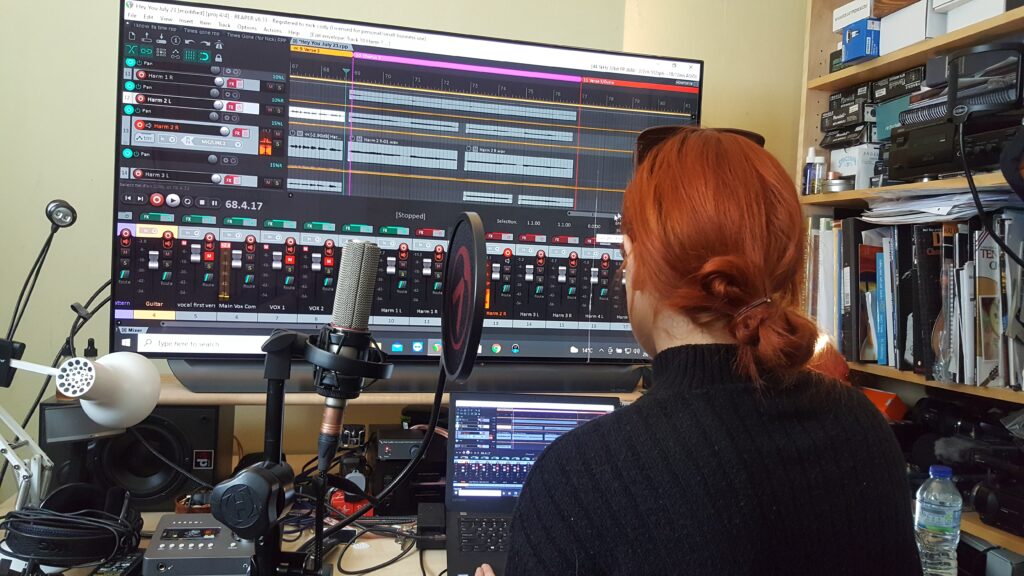
The Nick Cody and The Heartache follow up single to “Can’t Stop” is “You gotta move” and is released on August 6th on all digital platforms.
Special thanks to everyone who has made this track possible and especially Carl Rosamond for continued great sound production, Rich Ferdi for percussion, Howard Taylor for bass, Agi for backing vocals, Joshua Burnell for keys.
The pre save link for this single is here
This second single is one of five tracks already recorded for the debut Heartache album. We are currently also working up the live band for gigs, the first being on October 2nd at The Old Woolen in Leeds The live ensemble is Nick Cody, Fergus Quill and Rich Ferdi with additional guest musicians. This is a full electric ensemble and the initial “Can’t Stop” single has already received excellent radio play in the UK and overseas.
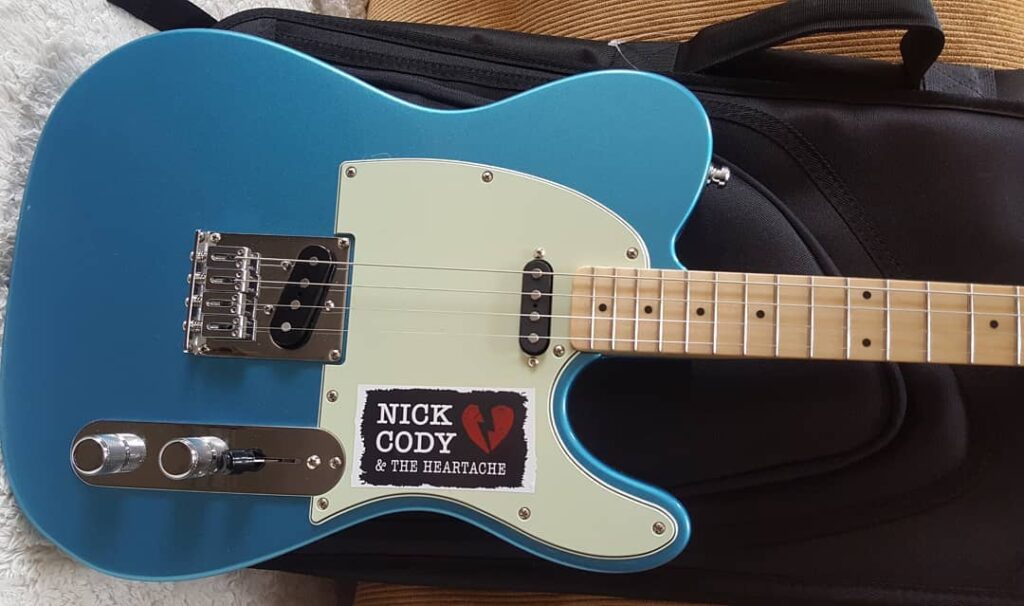
I had never heard about the Alternate Reality Fender Tenor Telecaster until my bass player Fergus Quill brought his tenor to one of the rehearsals. I thought “Yes it looks cute, but I can’t imagine that its going to sound that great” and how wrong I was. To my great surprise, the pickups sounded great and it played really well. I immediately started looking for one online and found the above placid blue version left in the UK. Aside from somebody asking a truly bonkers price for all three colours on Reverb, these simply don’t exist. Fender did one run and I suspect some players bought them out of curiosity and at a retail price of 429 its not a big financial risk. These are made in Mexico and once I changed the strings for a better gauge and got my tech guy to set it up properly, its a really great guitar.
I have a great acoustic Collings tenor, so I have some familiarity with playing tenors, but the Fender is a very different beast. My years of hanging out with Martin Simpson have alerted me to the terrific possibilities of using non standard tunings and of course the tenor’s standard tuning is essentially two thirds of a standard guitar tuning without the low E and A. With this Fender tenor guitar I am finding that open C is working really well and two songs have already emerged in the first two weeks of playing it.
I also learned from Martin Simpson to experiment with different amps and currently I am a big Supro fan and have been playing through the Supro Comet and the bigger Royal Reverb which has two ten inch speakers. Most of my other amps have twelve inch speakers, so this has been a new exploration for me and I’m pleased to report that the Alternate Reality Fender Tenor Tele sounds superb through the Supro amps and I already have one track recorded, ready for BVs and mixing.
I’m looking at using the tenor live with the all electric Heartache ensemble and we are rehearsing every two weeks up until our first gig on Oct 2nd supporting Captain of the lost waves. I like the idea of a short 30 minute set to test out the new material and new gear. So when you see me pulling out what looks like a tiny telecaster, you’ll know its one of these rare Alternate Reality Fender Tenor Telecasters!
“Can’t Stop” now has the most radio plays of all tracks to date. Special thanks to Neil Atkinson for radio publicity and for Nick Bloomfield in creating such a terrific video for this track.
These stations have all played this track so far, with more to follow
Can’t Stop is available HERE
This has been a very strange 14 months with no live gigs and no travel. I have taken the opportunity to review and upgrade my home studio as I realised that I was going to be spending a lot more time at home.
One of the biggest changes has been to add in a 55 inch monitor instead of my old Samsung monitors, which served me well for many years. This makes a massive difference when editing tracks and I wonder how I ever managed to work with my old digital tape medium in days gone by which was almost always problematic. Monitor technology has massively changed and its really helpful to see the entire session of multi tracks with one glance.
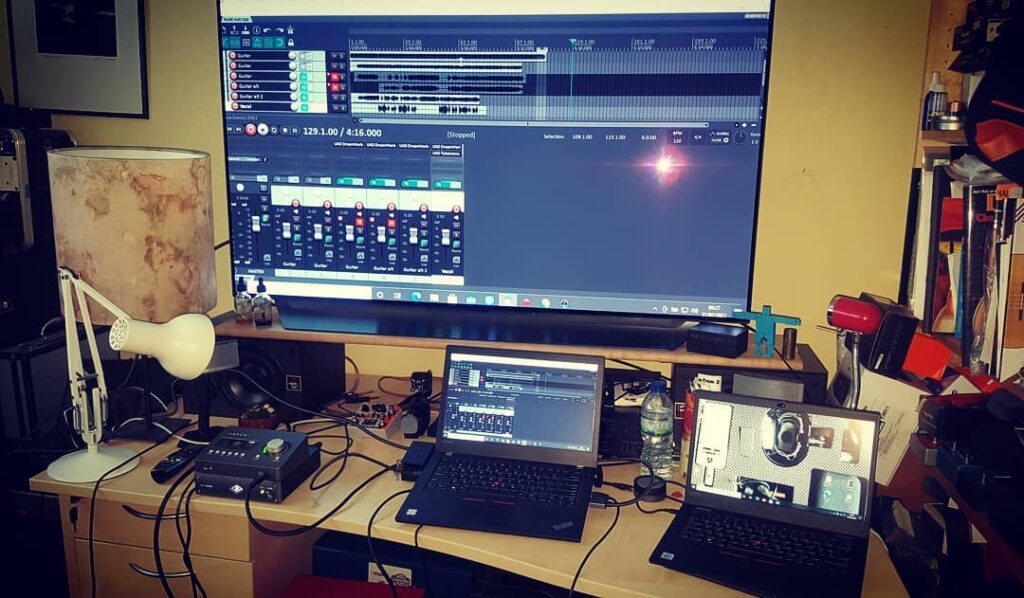
I have already blogged on the excellent Austrian Audio mic. This was recommended by my producer and I have to confirm that its a total game changer in terms of sonic quality. Not only is it the best vocal mic I have used, but it also works brilliantly for instruments, either acoustic or electric. Its not until you use a really great high end mic that you realize what a difference this makes. I’ve previously used Ear Trumpet mics and these were excellent, but the Austrian Audio is another step up. I’m especially aware of the difference with doing vocal work as its super responsive to every single expression vocally, and I can appreciate why so many studio engineers are raving about this new unit

I’ve been using Reaper as a DAW for the last 18 months and I’m 100% convinced by this recording software. Not only is it super stable, but its also the most cost effective solution to really great high end recording. Increasingly studio engineers are moving over to Reaper as it provides everything you might need for audio recording and its really easy to use.
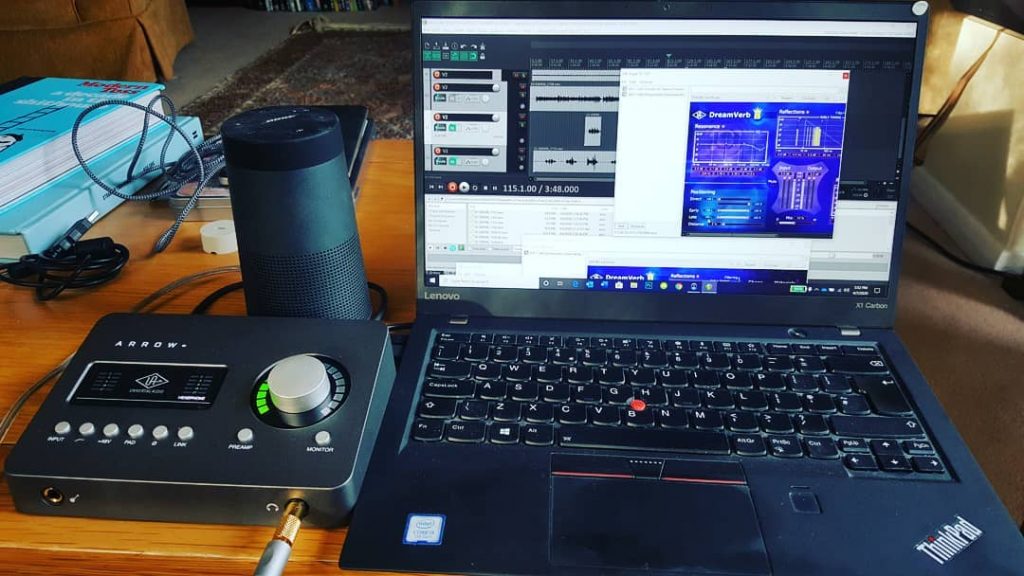
The UAD interface has also transformed the way I record in the studio. The Arrow interface provides the best audio and the UAD plugins blow away everything else I have used to date. There are endless options, but I tend to use a number of core plugins and the Arrow is really easy to use, one line in for the Austrian Audio mic and one input for instruments.
The simplicity of this set up really cranks creativity. In the last 14 months I have recorded 45 new tracks across 4 musical projects. This is a dream scenario when it comes to recording. Covid 19 has meant having to work differently, and the upgraded studio has been a gamechanger when it comes to creating new music.
In running Original Ukulele Songs and Music for Thr Head and Heart I get a lot of artists post on the social media pages and its rare to come across material that stops me in my tracks and thinks WTF! However when I first saw the video below, I could not believe how good it was and as well as promoting it, I invited Towse to be on one of the MHH Songs of Hope videos
Towse aka Grace Fellows massively reminds me of one of my favorite artists Mary Margaret O Hara, but with a twist and genuinely unique. I started to explore and see what other material was out there and bought the last album that featured a really superb track “This is love”
Towse
This is another really well contructed and delivered song with a great video.
During covid 19 I have been immersed in creating a wealth of material and decided to see if Towse would be interested in some collaborations. The first track I sent over was “Wait until the pain has gone’ a slow Amy Winehouse type song and Grace did a brilliant job of adding a verse and harmonies.
Since then we’ve worked on a number of songs that are quite diverses in nature and both myself and my producer are blown away by the results. This material will begin to be released later in 2021 and 2022 through Green Eyed Records.
I also highly recommend subscribing to the Towse video channel HERE
I recently came across Supro amps and have been really impressed by how great they sound. To date I’ve been a big tube amp fan for playing electric guitars, but in previous years have mostly played live and recorded with acoustic instruments and am a big fan of Henriksens. The Supro amps remind me a bit of classic Fender amps, but with a twist. The first one I bought was a Comet which is a combo with a ten inch speaker. The Supro Comet can operate at 14 watts or 6 watts. This produces a really unique sound, especially with the classic Supro tremelo and all analogue reverb. This is the first time I’ve played a combo with a ten inch speaker and I’m really loving the sound. I also like the simplicity of the amp, very old school.
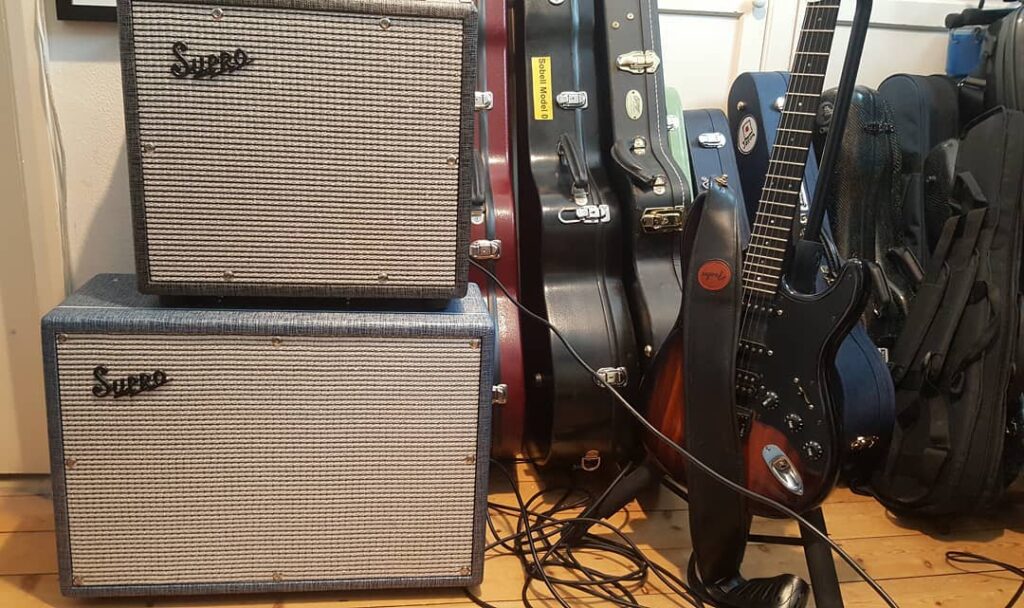
The second Supro I bought is the Royal Reverb. This is a real beast of an amp weighing in at 56 pounds. It has two ten inch speakers and the ability to play at 25 – 60 watts, so no problem with sonic headroom. In the age of digital amps and modelling, I still love analogue gear. The royal reverb will be great when Nick Cody & The Heartache start to play live gigs. There’s something really great about these classic units and the simplicity of plugging a guitar straight into a one channel amp with the brilliant Rocket Dude pedal to add that Larry Carlton sound
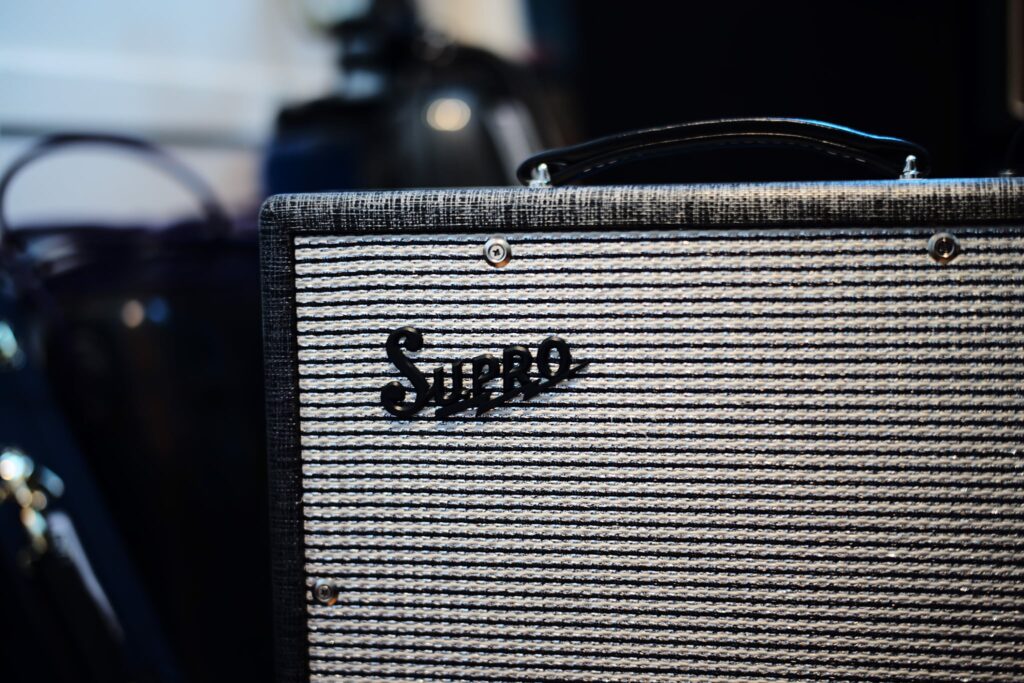
I recently had to figure out a new name for a music project and it occurred to me that there are several music branding considerations always worth checking before you decide to action any project.
What is “Branding” and how is it useful?
Effective branding sending a message about your music, making it memorable for the public.
It communicates to the wider public about who you are as an artist.
It maintains consistent message about your own creative voice.
It helps develop and maintain a connection with your chosen audience.
It helps audience members connect with each other and celebrate your music.
Key Considerations
What image/impression do you want to create? Does the name of the band or musical project reflect the intention you have in mind? A golden rule of marketing is if you must explain the term you have chosen, then its probably not the best fit for what you want to do.
Is somebody already using the same term? With bands and musical projects, its easy to come up with what you think is a great name, start building the musical image and then find somebody got there first. I used to know the original bass player for the UK band “Embrace” who were going to call themselves “Curious Orange” until The Fall used it in a title for an album.
Is the domain name available?
I am amazed that some artists go to the trouble of selecting a musical identity without checking that they can obtain the domain name. I always check I can get the .com and well as the.co.uk for brand protection. Amazingly some artists just grab the.co.uk or worse still don’t check at all. There is nothing worse than going to all the trouble to choose a musical identity to then find it’s a domain for a strip joint in Vegas or another venture that is not helpful to your own efforts. I’m surprised that many artists don’t both to create their own websites and instead reply totally on social media. All social media platforms are 3rd party businesses, and most people are users and not customers. These platforms exist to generate income for their shareholders not to give free marketing for artists. As the old saying goes “You get what you pay for”. Yes, social media can be useful, but its smart to have a web presence you control 100% that is your interface to the wider world.
Is the artist/project term you use memorable for the public? In one of my consultancy sessions for business I could not (despite being told many times) remember the company name. One of my recommendations was to change and simplify the brand name and once they did their marketing went from strength to strength.
Invest in a good visual image and/or logo and use professional photographs. There is an old saying – “You never get a second chance to make a first impression.” I continue to be amazed that many artists do not invest in good visual images.
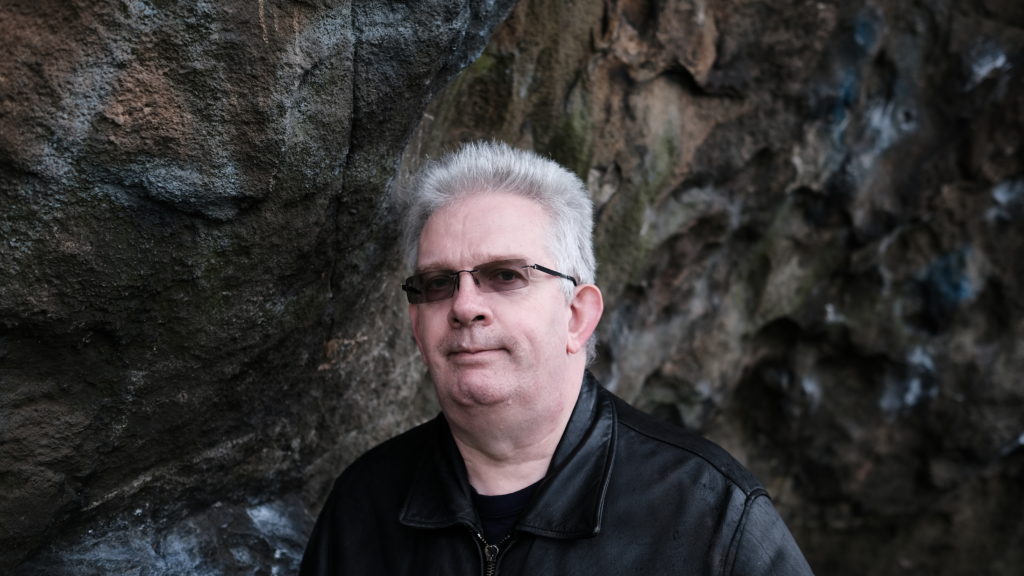
One of the challenges in being an independent artist is to get your music to a wider audience beyond colleagues and friends and many music PR companies advertise services to help make this possible.
I come from a business background and in 1980s and 1990s set up and ran a number of successful companies, which meant having to pay attention to marketing and advertising. Of course, there was no internet during this period, and most of the promotional work was done through newspapers. Back then I would spend at least 40,000 pounds on old school newspaper advertising alone, (that would be 80K plus now) so I am well versed in the whole concept of “risk v reward” when it comes to advertising and marketing. I do not however regard myself as a “Professional marketing expert” In 2000 – 2006 I wrote and recorded a series of spoken word and ambient CDs. I did all the marketing myself, but did have a distributer. This was pre streaming and I was earning between 600% and 160% net margin per CD, so tens of thousands of pounds. I also had one clip use on a film short played on national TV. In exploring music PR in 2021 I was interested to see how I could get my music to a wider audience and if any of these previous strategies would still work.
Since 2015 I have written and recorded 70 songs, released three albums and an EP and currently have three albums of very different material “in the vault” for future release. I’m very happy with the creative content to date, and especially happy with the three new projects. The challenge has always been to reach a wider audience. This article is about my experiences to date of music PR companies, including using paid services, as well as numerous discussions with industry professionals. My instinct is that the music industry is changing at some rate, and the old model of music promotion will need a radical update, but that’s just my gut instinct for now, I’m still trying to figure it out!
I have previously blogged about the excessive use of superlatives in ad copy, and how in my view this is lazy writing. One of the first companies I used for music PR back in 2015 with The Small Change Diaries offered a 50% discount on their services, so the usual campaign fee of £750 was significantly less. For this they promised at least two online/magazine reviews and to write and send a press release to “music insiders”
The ad copy was
“Ready to take your music career to the next level?
Our ultimate promo package has been specifically designed to help grow your fanbase worldwide. Our industry experts will work with you to optimise your online presence, land essential press coverage and make sure your music reaches new fans.”
I am realistic to know that in business you get what you pay for and with new artists with very little actual track record, there is not a great deal to market as they are just starting out. This means “convincers” (what people say about you) are essential and one of the aims of music PR companies is to get the artist more convincers in the form of blogs and articles that will then create more perceived credibility to a wider audience. The first campaign resulted in a couple of respectable online reviews but didn’t really make a noticeable difference to our popularity. With the following album I used the same company again who continued to offer half price options and this time the service was significantly worse. It became clear to me very early on that the contact I had for the PR was clueless about writing even a basic press release.
I gave her two great music industry quotes which she didn’t even include in the first press release. Ultimately I rewrote the release myself and vowed to not use them in the future. Yes it’s great to be referenced in online articles and blogs, but to date none of this publicity has brought any direct creative or financial benefits. That said, all publicity is welcome and its a case of figuring out if its cost effective.
One of the promises from PR music companies is to give artists “published articles” online. This sounds great of course and when most people think in terms of “articles” they usually think of this in the context of magazines. On the two instances I used a PR service I wrote what was extensively a press release on the band, with photos, and this was essentially packaged as “an article” Nothing wrong with that of course, but in every instance the copy is favourable and I’ve personally never previously come across any of these extensive blog sites for such online copy. Some of those who mentioned the band included Indie Buddie and Essentially pop magazine. Online research suggests that many Music PR companies deliver these “articles” which are always positive and rarely probing in terms of any actual interview. This seems to be one of the main promises from some PR companies to get artists to sign up for packages. That said with some digging any artist can directly get such articles published without paying the PR company. You may ask yourself “Do the music PR companies have a budget to essentially pay for such appearances?” That’s not to say these are not useful in creating a positive image, but rather to look at the true value of investing in this medium. One way to measure the success is to track if there is a direct increase in social media subscribers once these articles appear. As a Nashville producer once commented to me a few years back
“Its all about reach and engagement”
Here are a list of online publications where from $125 I can get “an article” published without buying a “music PR package”
Article Spotlight On 99.9 Jamz Tampa (www.99JAMZFM.com)
Spotlight On HOT 98.7 Detroit (www.HOT987FM.com)
Article Spotlight On WiLD 103.5 (WiLD103FM.com)
Article Spotlight On HOT 99.3 WQIS (www.HOT99FM.com)
Article Spotlight On POWER 103.1 (POWER103ATL.com)
Article Spotlight On 107.5 The Beat (107TheBeat.com)
Article Spotlight On HITS 102.5 Phoenix (HITS1025FM.com)
Article Spotlight On Awkward (www.AwkwardMagazine.com)
Article Spotlight On Vault (www.VaultWeekly.com)
Article Spotlight On Authentic (www.KnowAuthentic.com)
Article Spotlight On POWER 107.9 LA (POWER1079.com)
Article Spotlight On Revolver (www.Revolver-Mag.com)
Article Spotlight On GRIND Magazine (GRINDWEEKLY.com)
You may notice that all these music/lifestyle/fashion sites look very similar.
There is an argument to say that “all publicity is good” but I’ve never had anybody reference any of these online magazine/blog pages other than Music PR companies looking to sell publicity packages. It’s flattering to see the band copy and photos online, but the best press and radio plays have to date always come from my own efforts. I also recently found a company that for a fee (as suggested above) will let you choose which magazine you feature in. All you need to do is to write 600 words of copy, add photos and they will get the magazine to publish it.
Essentially you are paying for your own advert. I’d be interested in any feedback on this issue from anyone who has found such positioning useful in generating any new kinds of music opportunities.
The strangest reply I had in recent times was having a video refused “on faith grounds” by a music promotion company. Here is the video brilliantly put together by Nick Bloomfield and the reply refusing to action any promotion.
“Hey,
Thanks for sending your song in. We appreciate you choosing us for your promotion needs; however, we would not be able to promote this song/video due to our faith-based views.
We would still love to promote a different song from you in order to fulfill the promotion credit if you’d like.
Please respond with your song link to this email and we will review promptly.”
I was surprised by the reply, but appreciate that at least they have some filtering process for accepting clients!
In recent times I’ve started to look at this issue of promotion again and adopted a two-fold strategy. One is to contact established PR companies and quiz them on what they offer and the second is to pay established industry professionals for their time and ask targeted questions. More than ever it’s essential for artists to do your research in such matters and appreciate that its useful to have realistic expectations of what any company can do.
I contacted a UK company and we scheduled a call. Before taking the exploratory call, I checked out their record with companies house online and also did a full online search to see what others were saying about them. The companies house info showed a very low turnover figure, and I couldn’t help but notice that despite a very glossy website over a period of months online and on social media, they always had the following positions available;
I come from a recruitment background, so I know all about what is required to fill positions and this seemed like a lot of open positions which never seemed to be filled.
I checked out my initial contact with the company on LinkedIn and found she had only been with the company for 6 month, which in itself is not an issue, but in our discussion, she constantly tried to impress me by stating that they were soon to have an office in New York. Of course “an office in New York” can mean just about anything and I thought it strange that they would be expanding to the USA when they couldn’t fill the UK positions.
My key question for any music PR promotion company is
“What can you do, that I can’t?
So far, from my own experience I have been unconvinced that any low cost PR music company can do anything that I can’t do myself, but I am open to persuasion, hence the current research in talking to such concerns. I have a background in business which helps a great deal as well as a number of good friends who are longstanding professional artists. These are usually the best source of down to earth useful information and such advice is a very long way from what is presented in a great deal of Music PR ad copy. I’m also 100% happy to invest in good advice, but many such companies, in my view, hugely hype what they are promising and I’ve yet to find a single artist who wholly endorses any company.
In the introductory call with one advertising agent from a UK PR company, I asked her what her company’s strategy would be in promoting my forthcoming album. To my amazement she responded that they only focus on promoting via Spotify and by contacting “magazines” which brings us back to the whole “articles” sell, which I’ve already mentioned in this article.
I passed on this company as there were too many alarm bells ringing and I was wholly unconvinced that they could offer me any useful assistance. Their starting package was around a thousand pounds for a campaign. Interestingly I recently saw an artist place a 2 star review on Google, complaining that they received very minimal results and the communication was not great as she had to deal with many different people.
Two days later the review had vanished and 6 other glowing five-star reviews appeared in its place. Make of that what you will… I fully appreciate that marketers and record companies are looking at “packaging artists” to get fans and developing an image is a big part of that. However, in my view the emphasis on image is so great that often the music is a secondary factor. A lot of artist promotions increasingly look like fashion shoot as point reinforced by a friend of mine in the USA who tours stadiums internationally signing off one e-mail with the wonderful comment
“Nick I’ve got to go now to the dreaded photo shoot”
In one of my conversations recently with an experienced music industry head she mentioned
“We need to talk about the elephant in the room” I said “Ok, what does that mean?” She replied “Its more than a bit odd for a sixty year old guy to be playing with musicians in their 20s” (Rich Ferdi, I’m sure you will feel flattered to be classed as a 20 year old)
I replied
“Yes great isn’t it?’
There was a subsequent silence as we both concluded that we’d not be a great fit when it came to any music promotion, especially as I didn’t have the enthusiasm to play 100 gigs a year to “pay my dues”. As someone who runs eight websites, including two music platforms, I respectfully think there is a far better way in 2021 to reach an audience without driving up and down the M1 in the UK, with or without COVID lockdown restrictions.
The general exchange was very frank and I thanked her for some useful observations.
My next meeting with a PR specialist is this week. Here is part of the recent communication before the phone meeting
“Everybody’s situation IS different… but you’re still smart enough and ambitious enough to put new ideas into practice and jump into things you’re not 100% sure about.
That’s the REAL secret to progress – listening to the experts and implementing their advice, even if it’s something different or scary.
You got this – so let’s make beautiful music together. [Insert fist bump here]
We look forward to speaking with you soon!”
So far the style of the communications have been framed in a stereotypical USA motivation speak which sets my alarm bells ringing.
Following the previous e-mail, the day came for my break through session.
I’m not a fan of the term “break through” as it’s massively overused in my other non music profession and my usual experience is that those using this term tend to work in a very generalized manner. In the 7 days before the call I received five reminders of the appointment and I politely pointed out that I didn’t need 5 reminders. I also wondered why they didn’t use Skype or Zoom as with these mediums you have the chance to see a person’s responses rather than talking on the phone. I started with my question “What can you do for me, that I can’t do myself?” Immediately the caller started talking about saving money by teaching me to do my own production. I pointed out that I had already confirmed that that was not what I was interested in. After 27 minutes he admitted there was nothing he could do to help me and was perfectly polite and respectful.
What this reconfirms to me is that many such companies are working to a very strict template that may work for some people, but in my opinion they are not problem solvers and the general level of communication skills are pretty poor. They don’t ask targetted questions, so they fail to really determine what possible opportunities might be worth exploring. I’m surprised at how basic a lot of the advice is. I’ll continue to explore and keep an open mind but I am reminded by a comment from one of my producers who said
“Nick, they have no idea what they are doing especially since covid 19”
I would love to prove him wrong, by so far he’s bang on the money.
I’m increasingly finding that many Music PR companies and promotional music services have major problems with their sites and online payment systems. I alerted one company that half their website links to their artist pages didn’t work at all. Yes, they fixed it, but it took almost 3 days to sort out what should be done in an hour by any reputable business. Another promotional service that was recommended looked like a good bet, so I decided to buy one of their services and test their claims. I press the “add funds” button and I get the following error message
Got Http response code 401 when accessing https://api.paypal.com/v1/oauth2/token.
Yes, when I raised a support message, they did offer to process payment manually, but 5 days on I have no replies on how to make this happen. It’s not a great advert for a business that claims to be in the world of communication/marketing is it?
The more I look into such concerns, I am finding a pattern of a lack of attention to basic business practice. Of course there will be exceptions to the rule, but this is my experience to date… Of course there must be many PR companies that do an excellent job for artists, but as I say “caveat emptor” – let the buyer beware.
If you are still reading and not descended into total despair by reading this, then there is some good news…
There has never been a better time to use existing mediums to get your work to a wider audience (when I say “wider” I mean beyond friends, family and colleagues. The caveat is that you need to be prepared to put in the time and also you will need to invest money into marketing. Below are some tips that have worked well for creating musical opportunities for my bands to date. They may not work for everybody of course as there is no magic wand despite what companies promise online. I always remind myself of the old saying in marketing
“You never get a second chance to make a first impression”
Any marketing strategy means careful consideration of what you present to the wider public and crucially the timing of how you present it. Effective marketing campaigns are all about well paced promotions and ensuring that the message fits with the product or service. An effective campaign, means paying absolute attention to how the message is delivered to create maximum impact. If there is a target date for a release, everything needs to come into play on that target date, or the message gets diluted. Also another big mistake is for an artist to release promo material before their material is actually finished, This often happens when there is a lack of realistic planning.
“The music industry” is no exception and of course many record companies like to style artists, to reach a very specific audience. I confess to not being a massive fan of this style of cookie cutter packaging because the packaging often becomes more important than the actual music. As with all business, its about finding the right partnership for success. This is exactly the same with music production. There are scores of people selling solutions, its finding the right person for you.
1. Have your own website that you own and can shape to communicate your own creative voice. There has never been an easier time to do this and companies like Bandzoogle where you can set up a bespoke site really easily. Developing a professional site landed my first band an opportunity to play at an international music festival in Europe.
2. Set up and more importantly maintain your own social media platforms, including FB, YouTube and Instagram, remembering that these are all companies in their own right and exist to generate income for shareholders, hence the need to drive traffic to a site you own, YouTube is especially crucial as it really helps with search engines finding you online. It’s also very helpful to get good viewing stats. Ideally it shouldn’t make any difference what the stats are, BUT if people see 30 views, it creates a very different impression than 1000+ views. It shouldn’t matter, but perception is everything.
3. Remember to use the power of the word of mouth to spread the news about your work. Often this gets forgotten as people search for “the magic wand solution”
4. Pay attention to making your presence to the wider world as professional as possible, using good photos and paying attention to online copy. Many artists don’t invest in good photos and forget the internet is a visual medium. Well constructed video is also essential. Enthusiastic hand held footage can be off putting. You don’t need to be the next James Cameraon, but I’ve seen footage where the sound is so bad the footage is unlistenable
5. Identify and work with like minds. I’m a big fan of collaborations and that’s one of the reasons I set up Music for the Head and Heart.
This is a platform from music lovers, for music lovers and to date all the live events have been sold out.
6. Do your research – talk to others about music promotion including companies that offer services, but ask the question “What can you do for me and who can I talk to who you have worked with to date?” Some companies will send written testimonials, but its far better to talk to artists to form a view of what to do next. Books like “Don’t make me think” by Steve Krug offer great advice on how to present online. YouTube channels like Rick Beato can be a great source of information from people who have experience in the music business. Yes Rick is opinionated, but I’ve learned a lot from listening to his experiences in the industry and he seems very grounded.
7. Be prepared to put in the time and keep all online presences up to date. I’ve lost track of the number of artists who start off in a blaze of enthusiasm and then abandon updating their social media. Any form of marketing requires constant attention and focus and the music industry is no exception to this rule.
8. Beware people wanting “to manage you” who may have more enthusiasm than much needed skills to properly do the work needed. I’ve known artists who have well meaning colleagues with no actual business/marketing experience essential to professionally manage artists. Just because you may be a fan of the music, doesn’t mean you have the objectivity and business skills to help promote the artist in an effective manner. I don’t consider myself as a marketing professional, but I’ve advised many artists on what I consider to be basic marketing elements. A key question for any promotion and or ad copy is to ask the question “What’s its purpose?” If you are not clear on that, then its best to think again. Also get feedback from others who fit your audience demographic. This is why smart companies use focus groups, before running full campaigns.
9. Make good connections with radio stations and all other music delivery mediums that resonate with your creative work. This is more of part of a long term strategy in my experience. Years ago I was delighted when BBC Introducing played 7 of The Small Change Diaries tracks, but it made zero difference to our public standing and I later realised few listen to that show. Far better is to get plays on radio stations where you are in a mix of similar music or even better fully established artists which are known to the public. That is in my view much better positioning
10. Enjoy the ride. I would never want to rely on an income from music and certainly never sign a record contract and be beholden to a record company. That said I’m keen to reach a wider audience regardless of what then follows. In my view this is all about “playing the long game” and not hoping for instant results.
Firstly I have a massive respect for any artist creating their own music and wanting to share it to a wider audience.
My observations to date are that it’s possible to spend a huge amount of time and money with music promotion companies with no real benefits, hence the term caveat emptor. That said, of course it would be foolish to dismiss all music promotion and music promotion companies, but rather do your own proper research. All forms of promotion requires good strategic thinking and focus. Many “music promotion companies” from what I see talk about “magic wand solutions” which don’t translate into any real benefits for artists.
I appreciate not every artist has the inclination, time or skills to do this marketing work themselves as it’s a lot of work. As someone who teaches communication skills globally and advises on branding, I have yet to figure an effective strategy for all the music I have “in the vault” at present, hence this exploration. Ultimately it’s about seeing the actual results that ensue and these can be measured in many ways including increased social media interest online, music sales and of course bookings for gigs. As an artist its a real buzz to see yourself in print online and to see social media applause, BUT what next? Once the whooping has died down, the question is how does all this attention translate into any real verifiable benefits? That’s the million dollar question and to date I have yet to be convinced by any such promotional platforms. I’d love to be proved wrong and welcome any evidence showing this to be true.
My instinct is that the best way forward is with artist collaboration and building a new artist led platform rather than rely totally on many historical delivery mechanisms. What is clear to me is that all such promotions take time, planning and this all reminds me of the classic music business saying
“It takes ten years to become an overnight success”
“These are my thoughts and opinions, if you don’t like them, I have others” (apologies to Groucho)
I just had a 90 min conversation with the head of a distribution company that made total sense, so rare these days. I will report findings…
This is a short rant about one of my pet hates which I started to notice during the invasion of music talent shows, is where music and artists are described as “awesome” “amazing” and in other superlative terms. I appreciate that many promoters, PR agencies and artists want to write copy to get attention, but the overuse of superlatives in my view is self defeating as it ultimately kills any sensible critical evaluation. Terms like “awesome” “genius” brilliant” “ground breaking” should in my view be reserved for the very best of the best and not trotted out without any real consideration.
One of the main culprits are “talent shows” Talent show judges often would feedback to aspiring artists after a 90 second performance comments like “you are a real star” and “that was awesome” Yes, its probably well meaning and encouraging, but I would respectfully suggest that these are well meaning optimistic statements at best. Such shows are mostly about packaging an artist to a specific image and sonic template and unfortunately in my opinion this makes for never endling bland production line music that all sounds very similar to my ears.
I should at this point declare that in my non musical persona I teach communication skills internationally in Asia, USA and Europe so that background will make me far more aware of these patterns than the average person. One of the problems I have with the excessive overuse of superlatives is that they make everything very black and white or as we say in the communication world create “digital thinking” where we are left with adjectives that only express thinking in extreme terms.
Social media is full of superlatives where posters get carried away in their praise and lose any kind of objectivity in how they are describing what they hear and see. Lazy advertising copy also tends to default to the overuse of superlatives and ultimately this is in my view not a great strategy if you want to engage and maintain customer interest.
At this point you may respond “Don’t be so negative, you miserable git!’ but my central point is that the over use of superlatives means that all descriptions become essentially meaningless and lazy writing when everything is “awesome” and “brilliant”
Its like describing all food as Michelin star level cuisine, and makes any critical evaluation totally meaningless.
I totally admit that this is a personal view and the trend is likely to continue and probably get much worse in future times as more people scrabble to become stars, especially with the absence of live opportunities in the last 12 months.
I have been aware for a while that the music industry is in decline, but even I was surprised by this recent news
This week’s No1 album is set to be one of the lowest-selling ever, with Mogwai’s As The Love Continues expected to top the chart with sales of just 7,379.
Two decades ago, sales would often top 100,000.
Meanwhile last week’s No1, Slow-Thai’s Tyron, has tumbled to No22, behind greatest hits records from Sir Elton John and Fleetwood Mac.
Chart figures are based on sales from physical formats including vinyl and CD, plus downloads and streams.
This week’s Top 40 albums combined have sold just 11 per cent of what Adele’s last album, 25, managed during just its first week in 2015.
Even new artists like Celeste — winner of the Rising Star award at last year’s Brits, who had millions put behind her debut album Not Your Muse — have achieved underwhelming sales.
Full article here
In my view this trend is part of the reason for more hyped ad copy which inevitably means the increased use of superlatives in marketing. Another set of culprit are many music colleagues also are complicit in selling “the musical dream” where artists don’t get the best advice and are given quite delusional expectations about what is possible in “the music business” Yes, its useful to encourage artists, but the over use of superlatives actually kills creative aspirations as once you start to believe you are “brilliant” or “a genius” there really is nowhere else to go.
I would decribe the following artists and albums as “awesome” but then what do I know, I’m a ranting old blogger and music lover that laments the lack of great songrwiting where songs were usually written by one or two people, not a team of writers seeking to fulfill the record company’s sonic brief for Spotify positioning
Albums that I would describe as “brilliant”
Tapestry by Carol King – a superb pop album brilliantly written
Sign of the times by Prince – hugely diverse album bursting with creativity
Remain in Light by The Talking Heads – great work by the band with Eno, terrific african grooves
Hoodoo man blues by Junior Wells – 60s album brilliantly played and recorded, stripped down superb songs
Miss America by Mary Margaret O Hara – great album of unpredictable provocative songs, one album and she disappeared
Blood on the tracks by Bob Dylan – superb well written songs after a break up
Of course these are just my opinion, everyone will have their own preferences
Many people will think ‘So what, its all subjective anyway!” but when we engage in the excessive use of superlatives, we run the risk of dumbing down how we evaluate music. I’ve know promoters who endlessly use the term “awesome” and “genius” in almost every conversational exchange. In my world few artists, songs or experiences “fill me with awe” and I think that’s only a good thing. Many will of course disagree and I leave it up to you as to whether you find this article “awesome” “life changing” or just plain “old guy ranting” All such views are fine by me as we all collectively learn and develop skills through critical evaluation and discussion.

“These are my thoughts, if you don’t like them, I have others” (apologies to Groucho)
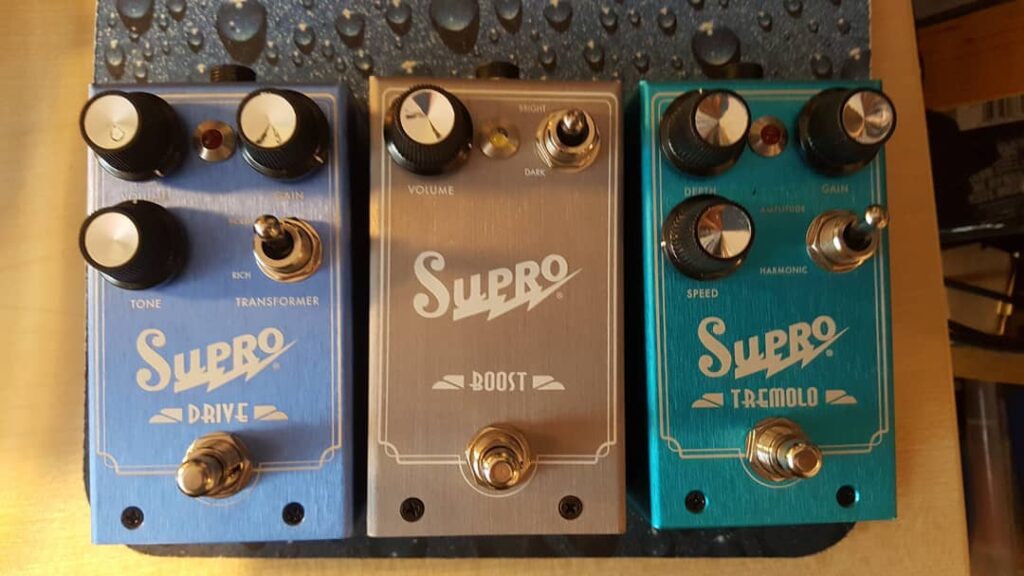
I have been doing a ton of recording over the last 10 months, for three different projects, the code-e1 electronic project with Black Star Liner, material for “Nick Cody and the Heartache” which is all electric guitar based music and a collaborations/duet album with some amazing musicians from all over the globe. I’m working with my long time producer Carl Rosamond and Black Star Liner for remixes on the Code E1 project.
The recording process has been very different from what I have previously been used to in laying down tracks from my first three albums. Firstly I am doing all the recording in my home studio in the UK and unusually using DI’s into the excellent UAD Arrow and then into the Reaper DAW. Seeing as I have a stack of terrific amps and preamps from Soldano, Two Rock, Fender and Mashall, this may seem to be a strange way to go, but its working brilliantly. The UAD is superb sonically and crucially allows me to use their unique unison preamp options.
The other difference with the recording process is that I’m using all electric guitars, the Collings I25 Deluxe, Moses necked/ Warmoth strat and the Ranson Tom Holmes equipped Telecaster. This allows for a terrific range of guitar tones. I’m also using a number of different pedals including the Zen Drive 2 as favoured by Eric Johnson and in recent times a number of Supro pedals.
Once I get basic guitar parts down, Carl will lock these into a template and then I can start on doing vocal takes with my good friend Agi, who also does BVs on tracks. Agi and I have worked on over 34 tracks to date including most of the new songs across these three projects. She is an outstanding singer and the best harmony singer I have ever come across. Carl will send the projects we record in Reaper to her as Logic files and she will add BVs. The versions that come back then go to Black Star Liner for the Code E1 project as well as being kept for the other two projects.
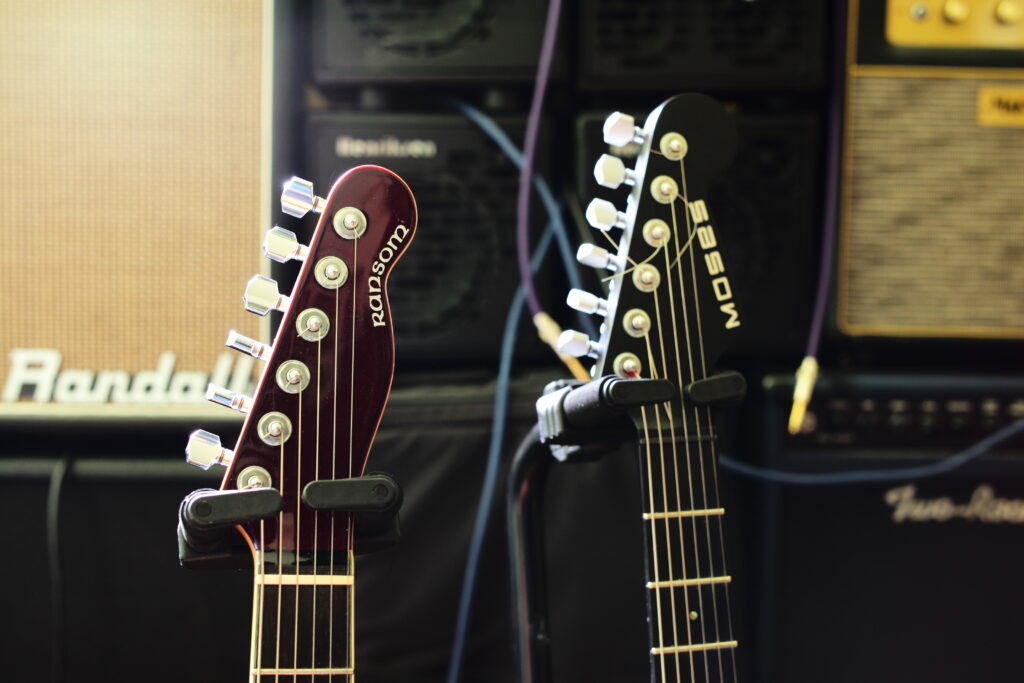
I’m super pleased with the results to date and its become clear to me that one of the keys to creating great music is to have a really good team of people involved in the project, who all bring something special to the table. We are fast approaching 30 finished tracks for Code E1 and a similar number for the other two projects. This material will be released throughout 2021 and 2022
Finally special thanks to Andy Coote for radio plays at Source FM, Daz in the Hat for plays on his show and Darren Poyzer for radio plays.
I am increasingly convinced that the best hope for the future of great music is through artist collaboration. With setting up Music for the Head and Heart I have been fortunate to meet and interview many extraordinary artists from all over the globe. I’ve previously blobbed about how streaming has essentially killed online earning opportunities for many artists and of course covid 19 has also killed live gigs.
On a brighter note its given me the opportunity to focus on music creation at a whole new level and 2021 and 2022 will see the release of at least three new albums, very different in style, with some crossover material. One of the albums will centre around collaborations with some really extraordinary artists from USA and Europe as well as the UK. These will be revealed in due course and I am honoured and flattered with their enthusiasm for being involved in what will be titled the “All kinds of crazy” album.
Since March 2020, I have written 30 new songs and 27 of these have already been recorded for one of the three projects. There will be alternative versions of some of these songs and I have approached a number of artists to take vocal parts and/or to add new musical contributions. To date the best results have come from simply giving the artists total free reign in their contributions instead of micro managing them. I’m blown away by the material we have received that is going to make for some excellent album releases. Special thanks to all those who have made contributions to date and the two producers who have done a brilliant job in mastering and remixing the material.

I’m a big fan of physical products and long ago abandoned ITunes when Apple started telling me which devices I could listen to purchased tunes on and it became clear that their position was that you are essentially ‘borrowing the music” like a lending library and you don’t own it. The Bruce Willis case highlighted this difference. I’ve been aware of Spotify for some time and recently see a lot of social media buzz about Spotify for artists, with artists complaining about the lack of financial return from the platform. Tunecore describes Spotify in this way
“Spotify has over 40 million users worldwide with 10 million of those users paying a monthly subscription fee. Over 3 million of those paying subscribers are in the U.S. alone. Spotify launched in Sweden and Norway in October of 2008, but didn’t launch in the U.S. in July 2011. The population in Sweden is about 10 million people, Norway is 5.1 million, and in the U.S. about 319 million people! Just imagine the amount of money Spotify and other streaming services will generate for artists and labels once streaming becomes the norm in the U.S. and other highly populated countries around the world. We are talking billions of dollars folks! And Spotify is still a relatively small service when compared to YouTube who have 1B users and iTunes who now have about 800 million accounts. As Spotify and other streaming services continue to grow so will its artist payouts.”
Call me naive, but Spotify can only function and prosper with artist support, without content, nobody is going to visit the platform. Artists who sign up for the platform and then complain about the poor financial return, remind me of those people complaining that Facebook ‘should support their music” not appreciating that FB is a business and most artists are “users” and not customers as they are not paying for the service in the first place. Both platforms give the artist “reach” in terms of a potentially bigger audience, but from what I see no real direct financial benefit.
There are a number of very sucessful artists who refuse to be on Spotify. In 2014, Taylor Swift pulled all of her music off Spotify. “Music is art, and art is important and rare. Important, rare things are valuable. Valuable things should be paid for,” In 2015 Prince removed all his music from Spotify and Neil Young pulled his music off Spotify and other streaming services because he found the sound quality to be sub-standard.
“I don’t need my music to be devalued by the worst quality in the history of broadcasting or any other form of distribution,”
I don’t feel right allowing this to be sold to my fans. It’s bad for my music.”
Neil has championed high resolution audio and is steadily releasing his back catalogue in this way. Personally I’m a fan of high resolution audio that is superior to the quality found on CDs and vastly better than mp3 quality.
Pete Townshend didn’t hold back on his thoughts regarding Spotify for artists
In a 2015 interview with Rolling Stone magazine, Pete Townshend said, “I’m a user of Spotify, so I feel like a complete hypocrite when I say: I think the guy that runs it is probably a f*cking crook.“
In a Guardian article David Byrne commented
“In future, if artists have to rely almost exclusively on the income from these services, they’ll be out of work within a year. Some of us have other sources of income, such as live concerts, and some of us have reached the point where we can play to decent numbers of people because a record label believed in us at some point in the past. I can’t deny that label-support gave me a leg up – though not every successful artist needs it. So, yes, I could conceivably survive, as I don’t rely on the pittance that comes my way from music streaming, as could Yorke and some of the others. But up-and-coming artists don’t have that advantage – some haven’t got to the point where they can make a living on live performances and licensing, so what do they think of these services?“
In researching this article I’m increasingly discovering that many of my favourate artists are not fans of Spotify including Jason Isbell
who in 2014 commented that “streaming services don’t add to my income in any way.”
STOP PRESS
Since writing this, it seems that Taylor Swift , Pete Townesend and Prince are now on Spotify! I’m note sure why they changed their minds but its 1 for big tech 0 for creative artists, in my humble opinion of course
I recently read an interesting article in Wired magazine about this very subject, citing Tom Gray
“During lockdown Tom Gray started tweeting with the hashtag #BrokenRecord. A lot. As a working musician (and 1998 Mercury Prize winner with his band, Gomez) and a director at music royalties collection society PRS, he found himself uniquely placed to advocate for change.
The subject of Gray’s ire was the apparent discrepancy between major labels banking upwards of $1 million every hour from streaming, and middle-tier or smaller artists who receive tiny amounts in comparison for their millions of streams. Concert violinist Tasmin Little was paid £12.34 for millions of streams over six months, for example, and anonymous tipsters report similarly meagre payouts. Now, Gray is part of a growing number in the industry advocating for a change to the way payouts from streaming platforms are handled.“
The Wired article points out
T”he biggest beneficiaries of the pro rata model are the major labels, who own the vast majority of recorded music in existence via deals favourable to them. Currently, if you sign with a major label, taking home 30 per cent of the streaming royalties earned by your music is considered about as good as it gets. And streaming, by narrowing how music is consumed, essentially exaggerates and exacerbates the age-old imbalance between the majors and the rest of the industry. For these reasons, Gray’s campaign is ultimately aimed at root-and-branch reform of how the music industry serves musicians – streaming is simply the most visible way into the issue.“
Full article HERE
The argument for non financial benefits for appearing on Spotify remind me of the “pay to play” argument and “playing for exposure” arguments presented to artists. It reminds me of some niche music festivals that promote the idea of ” Remuneration for playing” rather than a fee for playing. This in my view can be the slippery slope where the artist is always disadvantaged in favour of the business owner. Yes, there is a case for artists starting out to seek new opportunities and seek out new opportunities, but the danger is that there is an increasing perception that music/entertainment has not value and/or should be free.
My own thoughts are that the platform works well for the company, but devalues the artist’s creative content. One artist did have one solution which rather amused me (see below)
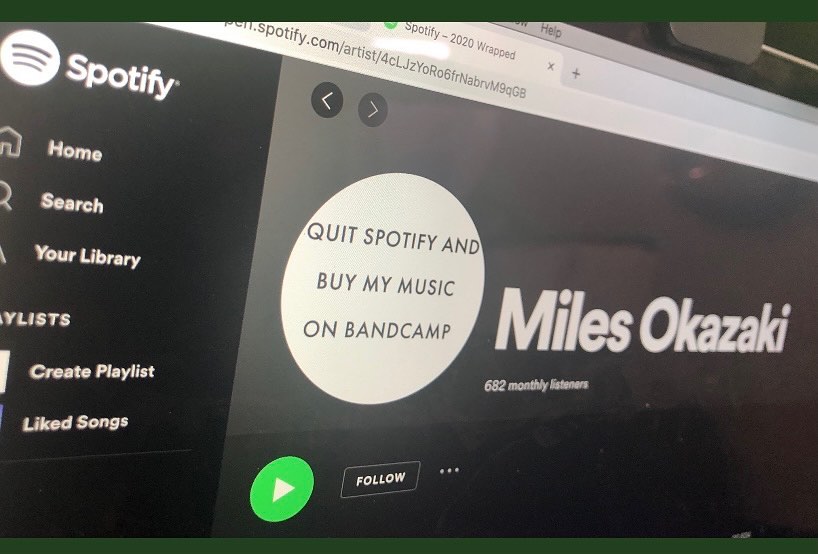
Here is another view from a professional artist. He also makes some very valid observations about how tough it is for musicians to make music professionally. Two take aways from this excellent clip are that the artist needed to stream 7 miliion streams to make $25,000 and that Spotify is a tech business.
Take a look at this essential video
During Covid 19, I’ve been writing and recording at a furious rate across four projects. I started out with working on material for ‘The Caravan of Dreams” and then handed of some tracks which started the Code-E1 remix project. I also began to experiment in the studio with material that didn’t really fit either of these projects. One writing “wait until the pain is gone” I had the idea to ask Emily Mercer to add some vocals. I’ve known Emily for a while and invited her to be part of Music for the Head and Heart after she agreed to do some support slots for The Caravan of Dreams. I’ve always been impressed by her musicality and songwriting, but had no idea if a collaboration would pan out.
After we received the first track, it became obvious that there was some real potential here to create some great material and I’ve now had 4 tracks back, all of which sound terrific. This is a departure from what I have done to date and most tracks are really stripped back mostly to just piano and vocals. What I really like about Emily Mercer’s work is that she has a great musical instinct. I also forget that as well as being a superb vocalist, she is one excellent keyboard player. I’m going to continue to sent over tracks as what we have already recorded sounds fantastic to my ears.
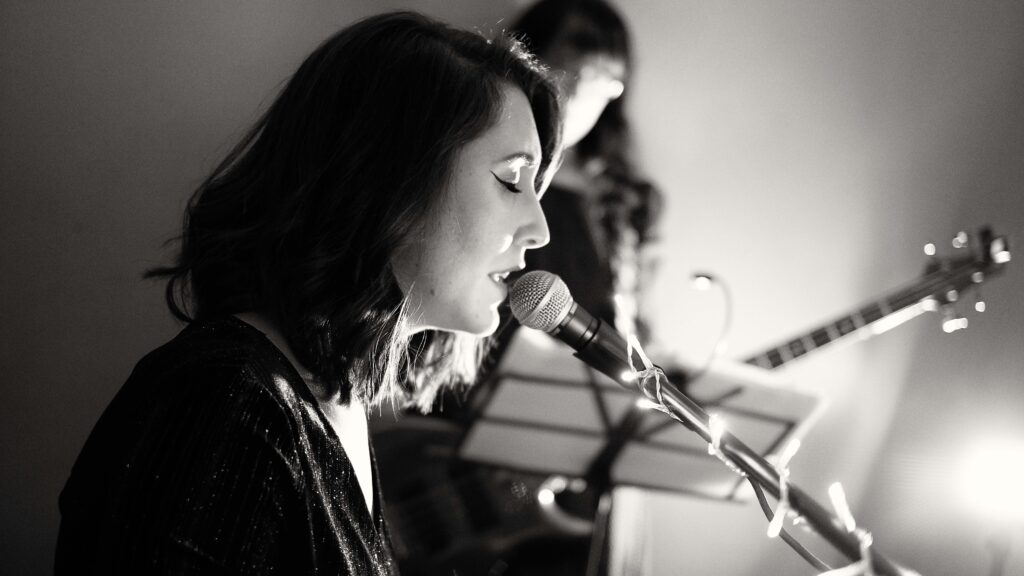
Also check https://emilymercermusic.co.uk/
My producer and I spent 2 hours yesterday on creating a spread sheet to track progress of the work on 25 different songs currently in play in addition to 19 songs that have already been mixed. We currently have 13 different musicians involved in this work which will result in three very different sounding albums. This project requires a great deal of organisation and coordination as there are many moving parts. We are delighted to have a number of great vocalists and musicians involved in creating some really unique material. Some songs are going to appear in very different styles. “All is fine, until the world goes pop” has already been recorded and mastered in three very different styles.
During covid 19 I see little point in releasing entire albums, but we will put out a few tracks for radio play and on my sites. Special thanks to Andy Coote at Source FM for the latest in a series of radio plays here
All work starts in my home studio in the UK. Unusually for me, I’m doing everything on electric guitar with my Henriksen amps, Motown Acme DI box, Zen Drive 2 and other pedals, with all vocals through the superb Ear Trumpet Myrtle mic. All tracks are recorded via a UAD Arrow into the Reaper DAW. Its a very stripped down setup that works brilliantly. Once I have worked up basic ideas, they can go out to other musicians and producers working with the material. Its a fascinating process to bring together so much excellent talent and I’m grateful to all those who are involved.
Full albums are planned for mid 2021, depending on the covid 19 situation. In the meantime Nick Bloomfield is doing a great job creating video for existing and future releases.
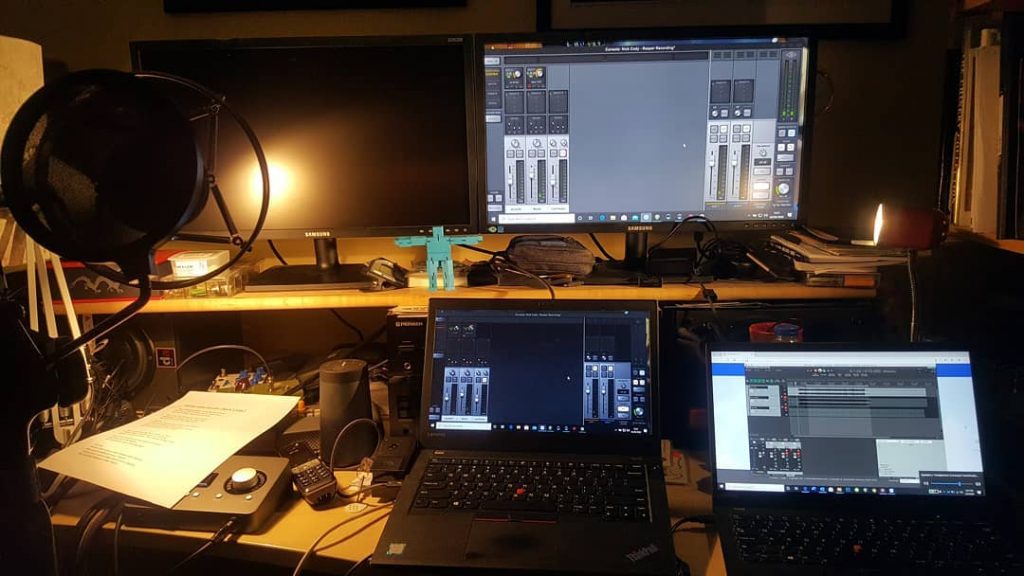
I’m currently working on 40 tracks across two very different projects. There are 2 totally different arrangements of songs written since covid lockdown, so they can legitimately be classed as totally different in all respects.
One of these projects is under a total different identity and a brand new genre of music for me with a world class producer. The second one is either solo or with my usual band with a whole bunch of amazing guests, many of whom I will be recording with for the very first time. Unusually the remixes appear first and the original tracks will come later. I can get some parts done remotely, but covid 19 has slowed down what I can do with the band. This means I’m working solo mostly on vocals and guitar parts and creating core ingredients for what follows. This stripped down way of working has been surprisingly productive and I am super pleased with the results to date
Its a massive amount of work and I am grateful to all those who have been involved to date. The ones with timings have already been recorded and the remixes have already had numerous radio plays
Here is the list of all the tracks to date
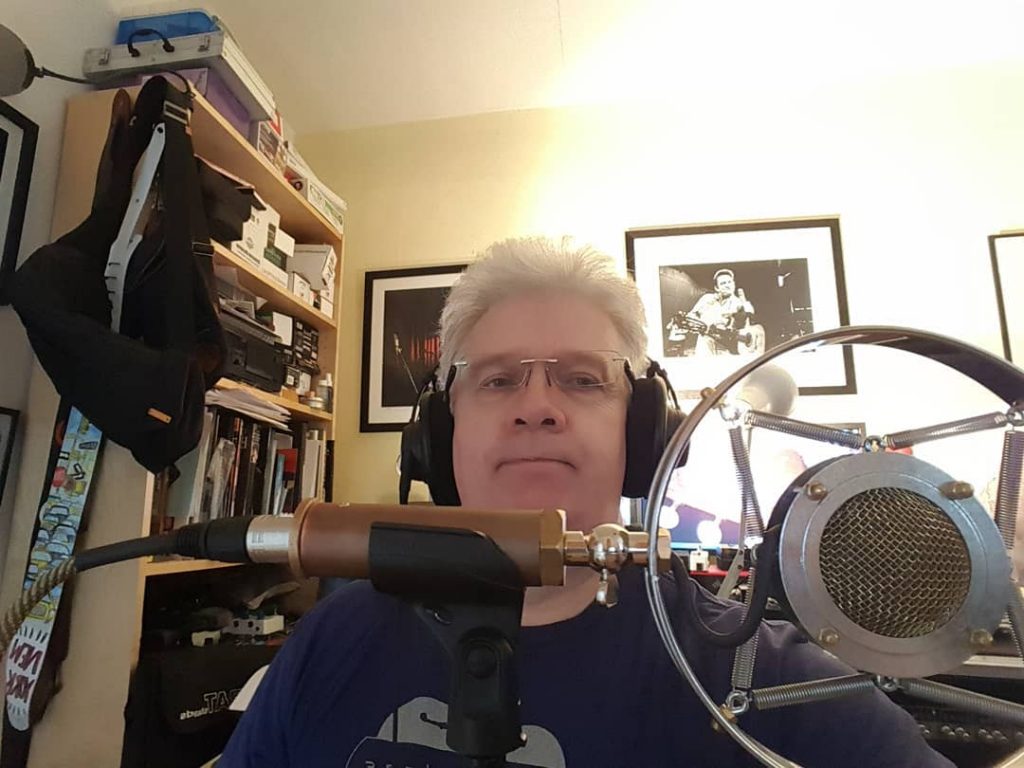

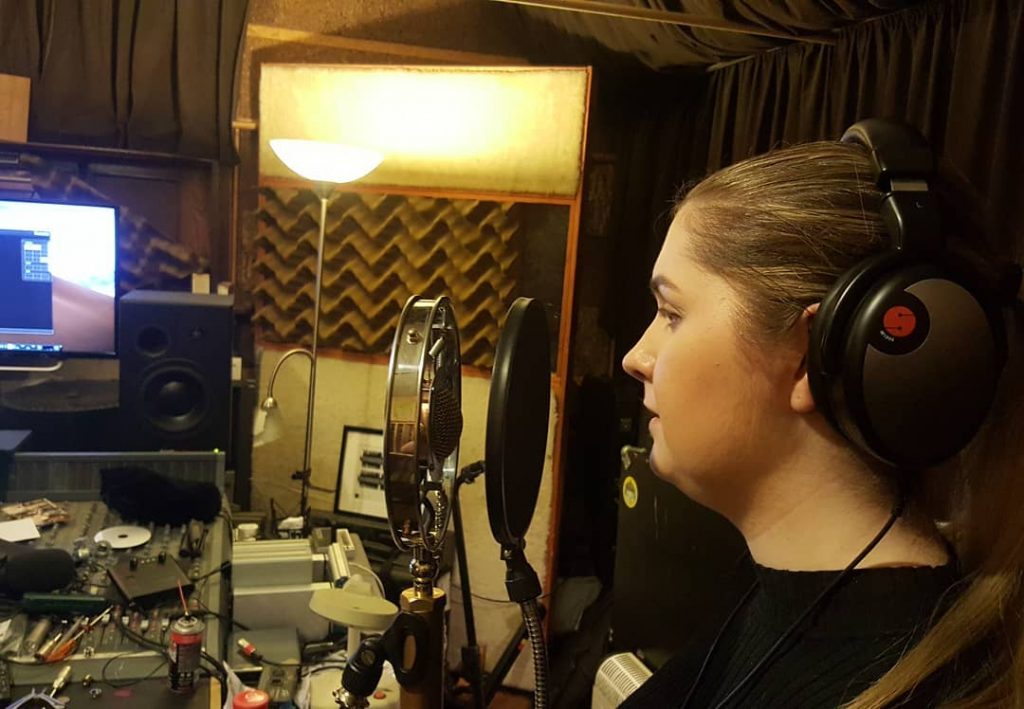
This has been a very surreal five months, during covid 19. Like all musicians I had to cancel all live gigs for myself and for music events I host with Music for The Head and Heart. With the lockdown, the whole world was suddently on pause and we have and continue to be in uncharted territory. I’ve driven 45 miles in 5 months, so am totally doing my bit for the carbon footprint as I also cancelled 8 overseas trips for my non musical work.
To my great surprise this has been an amazing period for writing and recording new material. Just as lockdown appeared I grabbed a number of new items for my home studio that have been used to great effect. I’ve already blogged on the Acme DI and the Ear Trumpet Myrtle mic and I’ve also been using Fulltone trem units and my Henriksen Buds for recording via the excellent UAD Arrow unit. I’m actually working on two totally different music projects at the same time with two different producers.
For the first time everything is on electric guitar, which is a first. Usually I’ll put down some sketch ideas, then work them up into a demo before starting to adlib and figure lyrics. I’ve been using my weekly meetings with Agi to do live takes of vocal tracks and I now have 14 tracks mixed and “in the vault” for one of the albums, and there will be very different versions of these tracks for a second album.
One of the few benefits of covid 19 is that there are many artists sitting at home neding work. I suspect that live work won’t appear until 2022 and in the meantime streaming will only increase, but that’s a very different experience. Social media has been great for locating session musicians to add to a core group that are generally my ‘go too folks” for any projects. I’m lucky to be working with two brilliant producers who have never been so busy. Its clear to me that that the role of any producer is essential in creating the very best music. Often music may be mixed but not actually mastered
These tracks are already mixed and in the vault, with four more tracks in the pipeline
All is fine till the world goes pop 4.19
Gather round 6.57
Nothing here sounds good 3.21
All Kinds of Crazy 5.24
Your chosen one is coming 4.12
Please take this time 4.24
321 Lockdown 3.41
Hold that thought 3.30
Sticks and stones 3.40
The world is burning 3.39
That gals as cool as fuck 3.25
All about her lies 3.29
Maybe 5.04
Come on down 3.51
Special thanks to everyone who has helped with creating these tracks to date
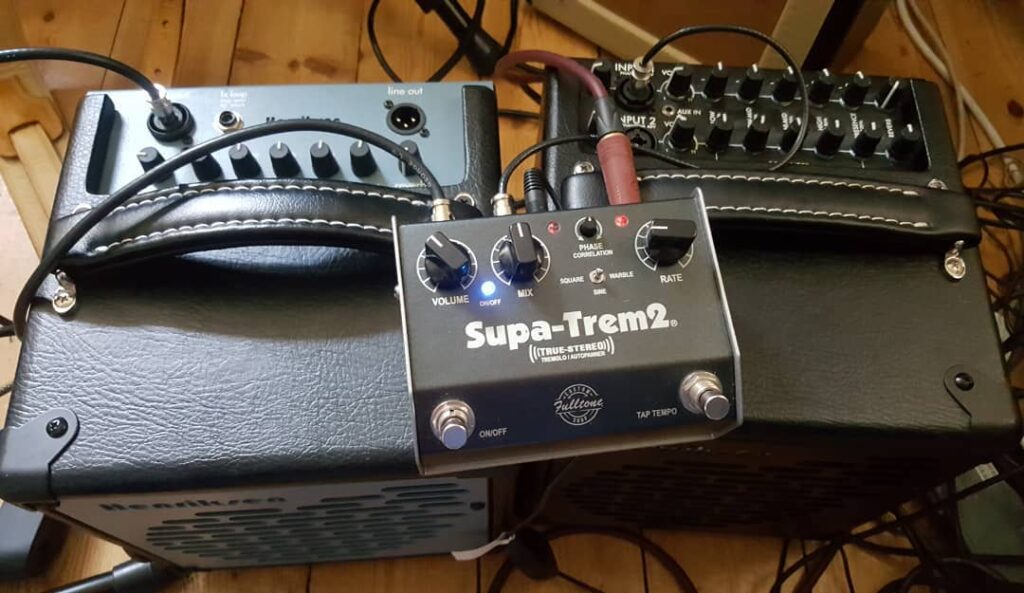
Today sees the welcome funding for the arts finally from the government, but covid 19 has created a major problem for both theatres and music venues. I’m hearing that one of the key issues is that most venues need 80% capacity to maintain predictable viable income, but with even a reduce 1m social distancing rule, that will be more than halved.
Mark Davyd of the music venue trust commented
“When we eventually emerge from lockdown, Grassroots Music Venues, the absolute bedrock, the foundations, the cornerstone on which our world beating £5.2 billion per year industry has been built, are going to be essential to live music bouncing back. It is therefore economically short sighted and frankly ridiculous to put a £5 billion a year industry at long term risk for lack of a short term £50 million investment.
The generosity shown towards our #saveourvenues campaign since we launched it in April has been staggering. The £2m we have raised to date has saved literally hundreds of venues in the short term, but the situation is still dire and relying on donations simply isn’t sustainable as we move into a recovery phase. With that in mind let’s act now and protect what we have, because what we have is incredible and it is ridiculous to put ourselves in the position where we might permanently lose it for less than 1% of the income it generates for us every single year. £50 million in financial support and a temporary tax cut, that’s all we are asking.
Who loses if this doesn’t happen? Not just the venues, not just the artists, not just the audiences, not just our communities. The government is the biggest loser of all here; billions of pounds of future tax revenues is on the line. Every other serious cultural country in the world is acting to protect its future talent pipeline…. and they don’t even have the incredible talent and the vibrant pipeline we have in the UK. We need our government to step up we need them to do it now.”
I’m not sure how much, if any of the government package will reach grassroots venues, but my own observations are that many were already struggling pre covid 19. I’m fairly sure that the big venues will survive, but my concern is for all those 100 – 250 capacity venues which IMO offer the best environment for seeing artists.
My heart goes out to all those artists who reply upon such venues in maintaining an income as its a hammer blow to maintaining any kind of regular income. I also feel sorry for all those music students graduating from university, who suddenly discover that the world will be very different from now on.
Some venues like The Vanguard in NYC have moved to streaming concerts and this maintains an audience connection. It is of course a very different experience, but one that we may have to accept as a substitute for attending live events. The irony is that for years I have lamented the apathy of people attending live events and the classic Joni Mitchell line comes to mind
“Don’t it always seem to go, you don’t know what you’ve got till its gone”
The challenge with streaming as I have previously blogged is to maintain good quality sound. For this reason when we run the Music for the Head and Heart shows with artists from all around the globe, we pre record the material. Social media is currently flooded with online performances and I’m not convinced that there is an audience for this volume of material. The danger is that people literally start to switch off from watching and listening.
I know of a number of artists who planned to release music in 2020 and who now are having to rethink how to promote their music. Traditional PR companies are IMO similarly stumped as the whole world has changed. One PR company’s strategy was to only focus on promoting artists via Spotify and personally I am unsure that such a narrow approach is commercially viable.
Live music has traditionally been a key ingredient in music promotion and of course this is how artists develop musically. I was reflecting on all the gigs I did with The Caravan of Dreams and treasure those moments and who knows when such opportunities will return? Last year I was lucky enough to see the last Martin Simpson gig of 2019 at Firth Hall in Sheffield that was one of those magical evenings of entertainment, which is never the same when watched on video.
Even if a vaccine appears in the near future (the best guess is around 12 months) I suspect the world of entertainment has fundamentally changed. Major concerts like Glastonbury have indicated that they will not be viable if they cancel in 2021.
Personally I’d like to see a return to smaller venues where people come to watch and listen to artists, but who knows when that may be possible? One thing is for sure, I massively value all those great gigs I have both attended and played at in days gone by.
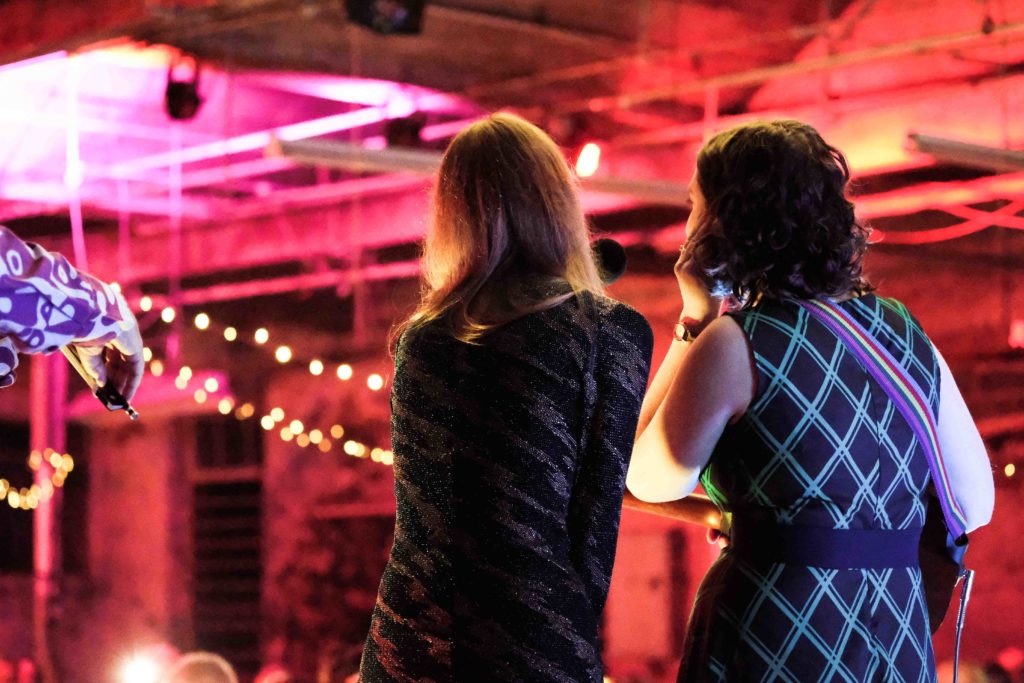
After many years of playing mostly acoustic music I now find myself immersed in writing a whole bunch of material on electric guitar. I have amassed a great collection over the years so there’s a lot of choice but I’m defaulting to my Warmoth hardtail strat and Ransom telecaster both equipped with terrific Tom Holmes paf pickups.
An even greater surprise to me is that I am recording totally by DI instead of by miking up amps. I’m using the excellent Acme Motown DI unit and a Zen Drive 2 pedal into the Arrow UAD interface. I’m using a Tom Holmes bridge pickup on all tracks and these of course sound great. I’m also exclusively using the Ear Trumpet Myrtle mic for all vocals.
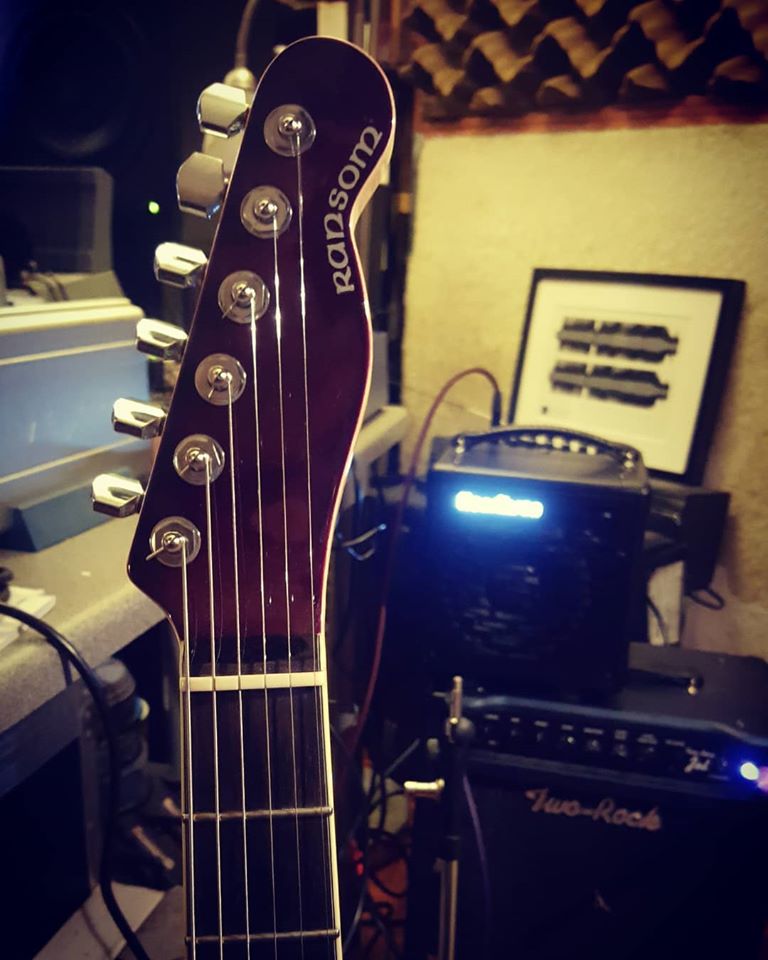
After recording three albums of acoustic instruments, its a real surprise to be in a new sonic territory of overdriven guitar sounds. The Zen Drive 2 has been a game changer and I am about to receive a rare Black Magic Zen Drive unit, so I have a back up. The combination of the Zen Drive and the Acme is extraordinary and wonderfully simple to use.
There’s a good reason why many classic pop and rock songs are written to a formula, verse, chorus. middle eight. I’m rediscovering the joys of working simply with strong melody lines and sharp lyrics. Of course I’ve always been a fan of these two ingredients but usually I have a full band of up to another five members to work with. Now I’m doing everything myself so I’m working faster in my home studio and during the covid 19 lockdown I have more time than usual.
Many of the new songs start with a riff and develop from there. I learned some great songwriting tips from my good friend Tim Booth from James and am putting his advice to good use. This approach is certainly working and I already have a bunch of new material in the vault.

I’m working on two simultaneous projects during the lockdown. One of the projects is not directly linked to “Nick Cody” and is totally different to anything else I have done before. The second project is working with stripped back electric tracks with additional input from some of my trusted musical colleagues who always deliver in spades.
The covid pandamic has sparked a great deal of creativity and everything is geared around electric guitar. Last night I played a uke live on zoom for the first time and it was strange after three solid months of distorted electric guitar. I of course love both styles of instrument, but I am having a blast with this electric work.
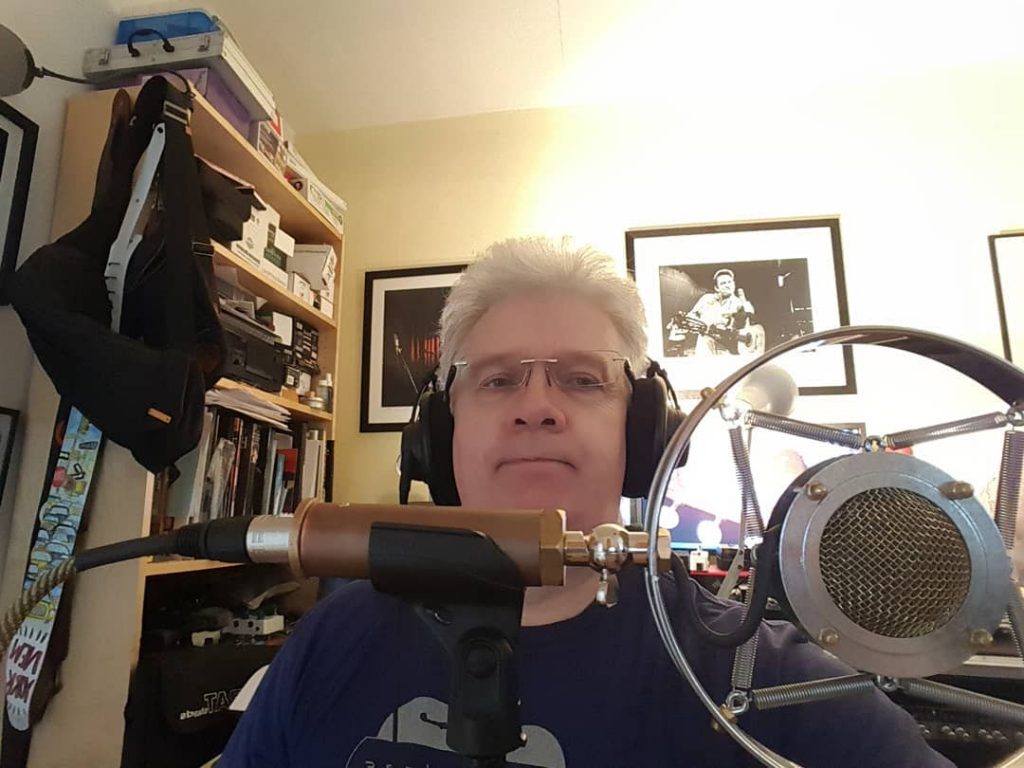
I am fortunate to know many excellent professional musicians from around the world and all of them have been by Covid 19. This is requiring a massive rethink and live appearances have all been wiped out. Its an extraordinary situation and it is not going to change anytime soon
Many local musicians were already struggling pre pandemic and I recall one niche musician saying he was struggling to make ends meet and wondered if he could MOT his car.
With the advent of covid 19 he is one of the many that may have to rethink whether its viable to continue to reply on music as a predictable source of income. I’ve long thought that many artists live literally from one gig to another and of course there is nothing new in that, but covid 19 creates all manner of additional problems
There is a current argument raging about the acceptable distance people for people to socially distance during covid 19. At 2 metres most indoor venues are not viable. Theatres generally need 80% capacity to be viable and the 2 metre rule means they can only accommodate 20%, which is not economically viable. Regardless of whether this changes, many smaller clubs and venues will close. As one producer said
“Many artists are gonna have to drop a division when playing live”
The second issue is whether people will even return to attending live events in the same numbers. Most people are creatures of habit and a three month total change of habits is going to have a lasting effect. My guess is that it will be a long time before audiences return to live events in the same numbers.
As soon as the world went into lockdown many artists immediately and understandably shifted to running online events. There are many challenges with these format including the technical challenges in maintaining good sound and visuals.
My own experience is that the quality is massively variable. Some online efforts have been like watching a car crash, while others have been really excellent.
Jack and the Vox from USA have been putting out pairs of songs on a daily basis and have been terrific entertainment. What both these examples have in common is the attention to detail and really superb performances. They remind me of Daryl’s House, always engaging and unpredictable.
Martin Simpson‘s first live show was exceptional, really terrific sound, a great set and of course a superb performance. Martin is shooting a lot of video from home and as always he is truly engaging and fascinating to watch
The online medium is a different environment, like a TV show but without the high production values. This is totally different to a live experience. I’m personally not a fan of calling pre recorded material “festivals” or “mini festivals” as they are nothing like a festival experience.
Captain of the Lost Waves has done a series of terrific shows that have delighted his growing fanbase as well as connecting to a new audeince
All these artists have a strong work ethic and crucially smart strategic thinking.
Many people I know feel that social media is swamped by online events and many unfortunately are not that great. I suspect the ones that are more creative and themed will survive whereas the others will disappear.
Artists with strong fan bases will in my opinion do well and as always artists will need to find new ways to capture public attention. This is perhaps not a bad thing as it means there will be more focus on quality as audiences will have less spending power. Smart artists are always moving forward and exploring how to connect to new audeinces. This means focussing on differentiation and avoiding just doing exactly the same thing as everyone else.
Unfortunately having great talent is not in itself enough to generate predictable income for artists, you have to also have some business skills. I’ve known some very good musicians who spectacularly “snatch failure from the jaws of success”
Usually they are too polarised in their ways of thinking and can’t seperate social and business interactions. I set up Music for the Head and Heart and Songs of Hope as a free resource for artists to connect to new audiences. This is one of many initiatives that I fund personally to help musicians.
Smart musicians appreciate that in order to earn a good living rather than just scraping by, you need to embrace a wider audience and that means building new connections all the time. I learned from my non musical persona teaching business skills, that often you have to expand thinking and work with a wide range of people rather than a narrow niche of people who agree 100% with everything you already think!
I predict new and more innovative ways of connecting with audiences will emerge. Many artists that were just scraping by will I suspect disappear if they don’t adapt to the new dynamic. I can’t imagine a world without great music and hopefully the “new normal” will result in some real great new entertainment. Of course its 100% up to the artists what they want to do and whether that want an audience of thousands, millions or just themselves, BUT for most people time needs to be funded in some way and these thoughts are on strategies that help make that happen.

To my great surprise, I am currently playing and recording a lot of electric guitar. This is a far cry from the last four years of acoustic work that revolved around guitars, ukuleles and other instruments. This is a great chance to revisit many pedals I have including the excellent Zen Drive 2 pedal.
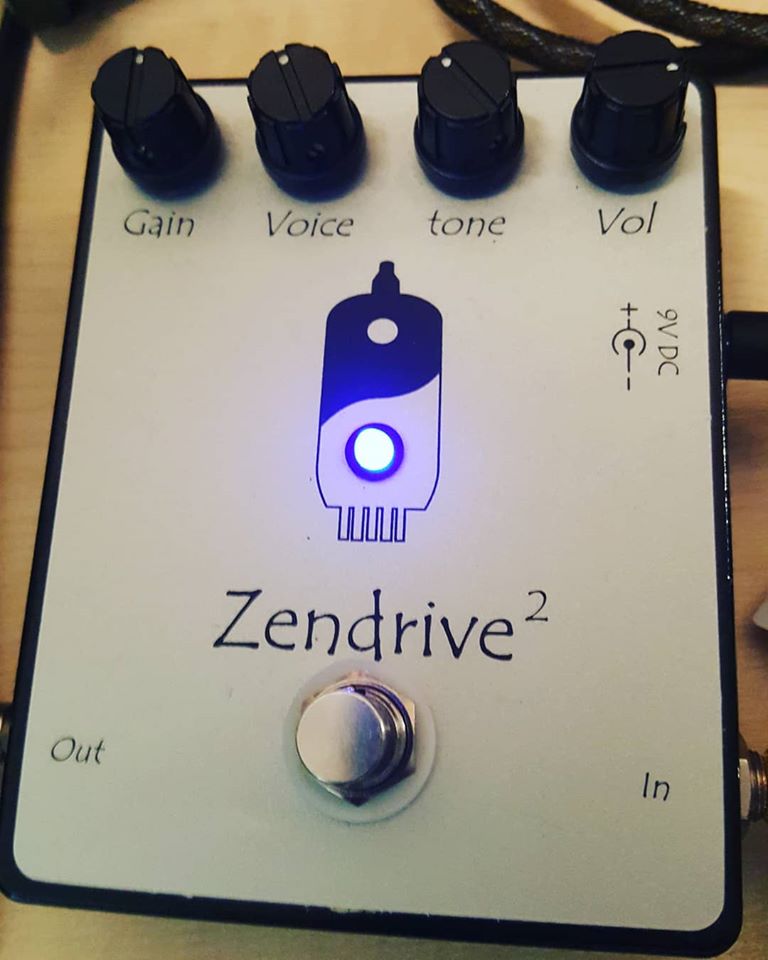
I have always liked this pedak that to my ears has a very Robben Ford tone. I’ve been using it with the Acme DI straight in a DAW, and it sounds fantastic. The sound is in similar territory to the Dude pedal which I have also used on the latest set of recordings. The Zen Drive 2 is great for rhythm as well as lead work I’ve used all manner of pedals over the years and settled on a few which give the very best tones and keep the character of the instrument.
Here’s a video of the Zen Drive 2 in action
Recording in a DI manner is also very ususual for me. I’m really surprised at how good the overall sound is and of course having an excellent producer and using UAD plugins is an absolute game changer. I’m loving this very stripped down way of working and the material is rockier than anything I have recorded previously.
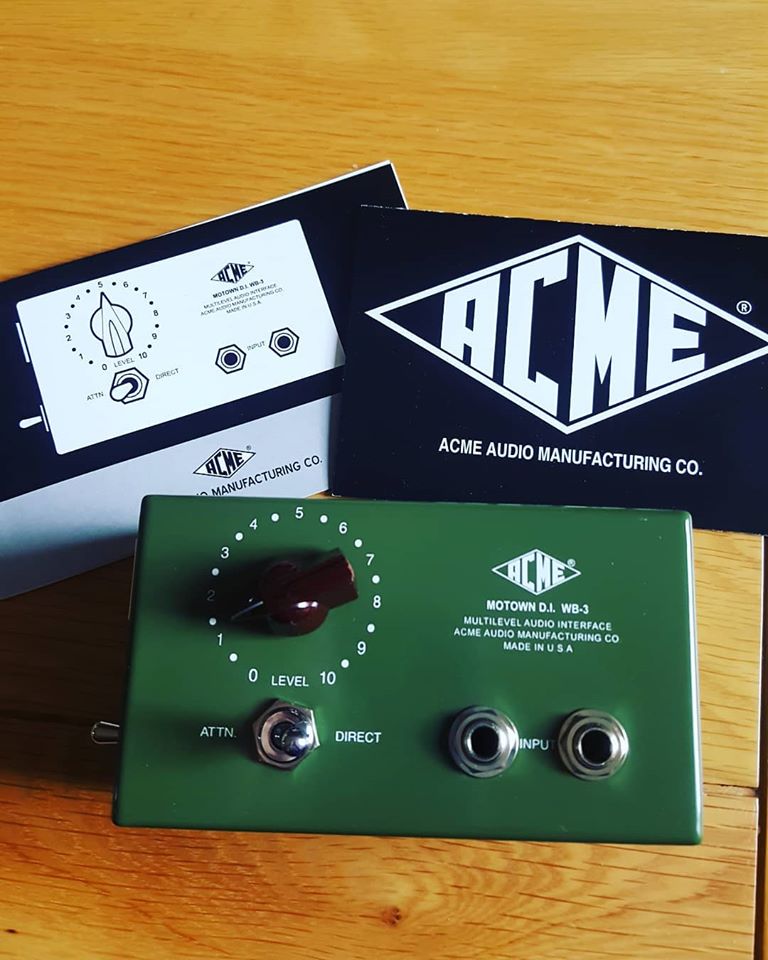
The Covid 19 pandemic has brought massive change on the planet and of course the music industry is hugely affected. These are very uncertain times and I suspect the musical landscape post covid will never be the same again. As soon as ‘South by South West” was cancelled I realised that we had a massive problem.
All my professional artist friends had every single live performance cancelled and that meant zero income. Nobody really knows how the musical landscape will appear lost covid 19. My hope is that live music will return as such events are one of my true loves in life.An “egg in one basket” and the use technology? I have of course blogged in the past about the myth and reality in the music business and covid 19 will in my view create a massive reset for the music industry.
Many artists earn a living with income from one gig to another and suddenly that income stream vanished. I have previously blogged about how tough it is for artists to generate a working wage from music and the pandemic has highlighted as one friend said “My egg was in one basket, and now that basket is no more!”
Many performers have started to use technology to stream live appearances with varying results. There are all manner of challenges with the technology and of course the number of people online is at an all time high. This affects bandwidth globally and that affects the quality of what is streamed. With the Music for the Head and Heart platform, we opted for recording artist material for this reason. That way we can ensure the picture and sound quality are at a high level.
A number of friends have commented that social media and especially Facebook are now full of artists streaming music. The term “festivals” is now being applied to such events. The quality of what appears is variable to say the least and it will be interesting to see if this trend continues over a longer period of time as this is of course a few different form of interaction without mass human gathering. I was surprised to see one niche group of music promote a ticketed event as a “festival” when it was lot a live stream, but a series of artists having recorded in their homes! Personally I think this is a bit of a stretch in calling this “a festival” but that’s just a personal view and I appreciate that many people have to try and scratch a living in whatever way they can.
The biggest challenge for many artists in terms of generating income from online video is that the public to a large extent, expect video to be free. Youtube has a huge amount of free content, including full gigs often in high resolution with great sound. The experience of watching online is of course very different to attending an event, but with all the current uncertainty nobody knows what the future holds in terms of live events.
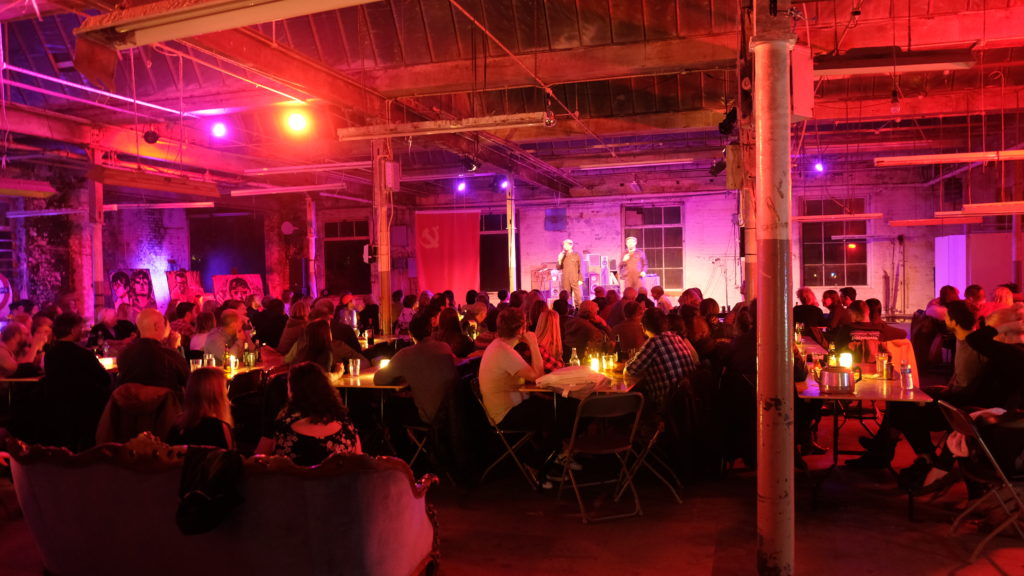
There’s an even bigger challenge for ukulele and many other niche music events is that in many (but not all cases) the audience are not there primarily to listen to artists but rather to play. As a longstanding ukulele player and teacher commented
“Nick, they don’t want to listen to music, they just want to jam with each other”
My experience is that this is true for some ukulele circles, but there are artists like Victoria Vox who are reaching a much wider audience. Similarly the Ukulele Orchestra of Great Britain also attract a mainstream audience and are great entertainers. As the uke festival audience enthusiasts are generally older, this poses additional problems for future festivals as covid 19 is more problematic for that age group.
Studio recording in the traditional sense has of course been massively affected. During lockdown artists can’t go to studios to do recording so remote and home recording methods are going to be on the increase. I’ve been blogging on using Steinberg VST Connect Performer. This is probably the most advanced technology for remote recording and we’ve had good results to date. However this is not an easy option for many artists and even a seasoned producer may find that this is a very new way of working and Steinberg would do well to update their instruction videos as many aspects of working this way are not as clear as they could be.
I’ve also been using a UAD Arrow with an Acme DI into Reaper DAW to great effect. This is a simple set up which is producing some great results. I’ll send over files to my producer and we’ll then use VST Connect Performer to add additional tracks. I’m also using the Ear Trumpet Myrtle mic for all vocals and loving the results. I’m lucky to have amassed all this gear just before the pandemic and this allows me to work up new material at an accelerated rate. Its a bit of a baptism of fire, but I suspect that the future of artist recording will involve a lot more home recording than in days gone by.

This is a great time for learning about recording as there are many great low cost resources out there. One superb example is the Reaper DAW which can be used for free during the covid period. Check out Reaper HERE I use this DAW for all recording and it took just five minutes to set up.
People are mostly creatures of habit and the pandemic has meant that live events have all disappeared. Some festivals and clubs may disappear of course through financial difficulties. One scenario may be that people value music more and flock more to live events. Another scenario is that people become more cautious about group gatherings and stay away.
My instinct is that the musical landscape will be very different and there will be a substantial reduction in live opportunities as even before the pandemic many festivals and clubs were already struggling. I’m a massive fan of live music, although I favour smaller venues these days and the idea of a huge festival is not that attractive. The major festivals in 2020 were all cancelled and I suspect many will be cancelled for 2021 until there is some kind of cure for covid 19. These are very strange times and I feel like I’m in some strange alter universe.
Nobody knows what will happen post covid 19, but in my opinion the musical landscape will be very different. Adaptability will be crucial and this means thinking in very different ways. One thing is certain, artists will continue to entertain and in my view the world needs as much of that as it can find right now.

We just finished mastering a full band track called “That gal’s as cool as fuck” The song is about Scarlet Rivera who was the violinist on Bob Dylan’s 1975 Rolling Thunder Tour. My good friend Kit Bailey on seeing the movie wonderfully commented on social media
“That gal’s as cool as fuck!” and I thought “What a great title for a song!”
I loved Dylan’s work from that period and especially the album “Desire” Scarlet’s violin work really made that album and I wrote this track about her meeting with Dylan. Here are the lyrics
There’s a rolling thunder, sweeping through this town,
Marty’ s got his camera, to get the whole thing down
A hard rain is falling, to wash this sad away,
Music from the heavens playing night and day
Chorus
When Bobby sings with scarlet strings, the audience’s in luck
Sweetest sounds are ringing from the gal – that’s cool as fuck
She’s dancing with the twins respectful for the space,
Wild, withdrawn and silent behind this painted face,
Heading down to Brooklyn, for a taste of blue,
This simple twist of fate reveals all that’s true.
Chorus
A desire is forming down he Bitter End,
Isis in the headlights, messages to send
One more cup of coffee, sets aside the shy
A crossing of the stars, no time to wonder why
Chorus
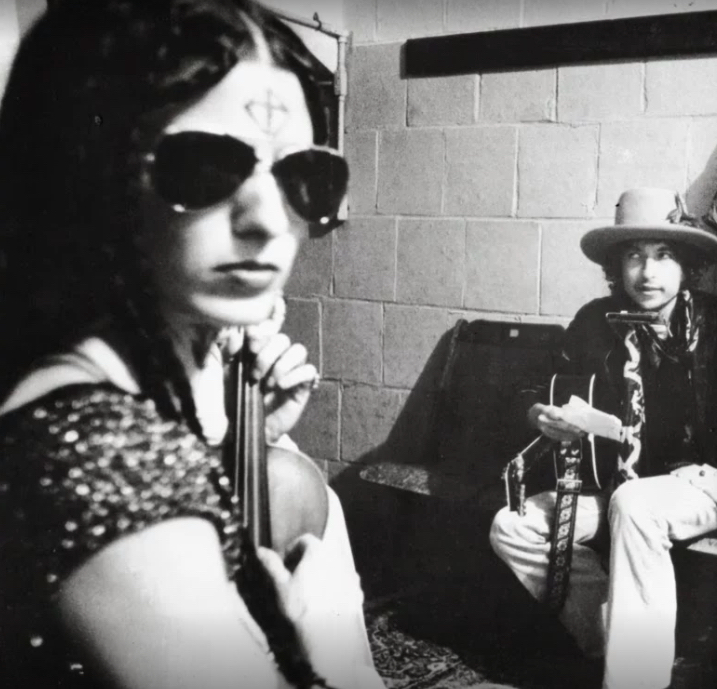
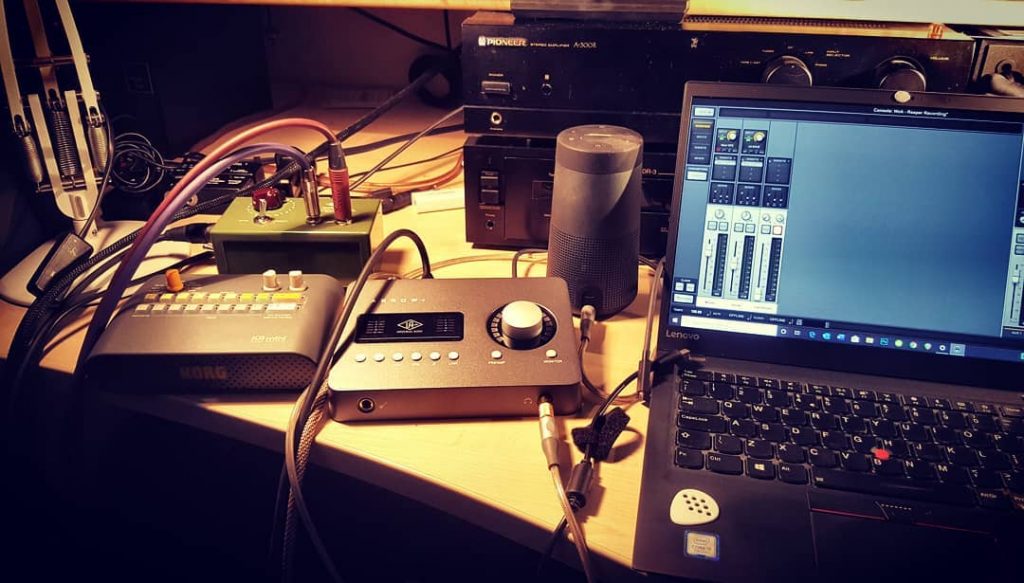
Today is all about putting down guitar tracks for my first ever cover version. After recording 44 tracks to date, this is new territory. I’m also loving working with the Acme DI box, the Ear Trumpet Myrtle mic and the Arrow UAD unit.
I have blogged a lot about the Acme which was used extensively on Motown albums and it has a very distinctive 60s sound to my ears. I keep thinking about the third Velvet Underground album in terms of sound and that’s in my view no bad thing. This is a total departure from all my acoustic guitar and ukulele work and requires some very different thinking.
I’ve also found myself using the same guitar a Warmoth custom hardtail strat with a graphite Moses neck and a Tom Holmes bridge pickup which is giving a great great sound. I’m using Reaper DAW to put down the central tracks and tomorrow I’ll be hooking up with Agi and adding vocals before connecting with Carl Rosamond in the afternoon to explore mixing.
These as we know are very strange times globally and these recording sessions are totally different to my normal way of working. To start with I’m playing all the parts and doing all the vocals. We are also working really quickly on material and there is something to be said for such concise time effective ways of working.
One big lesson has been in investing in really excellent studio gear and not cutting any corners. This ia all the more important as there’s a run on studio gear in these times as more and more people are looking to beef up their home recording setups.
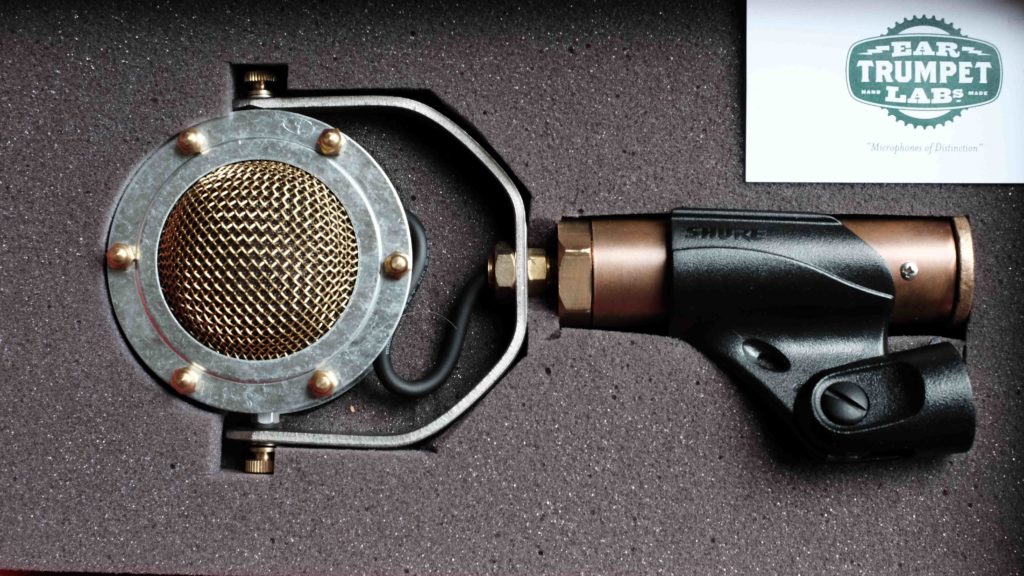
Today I laid down all the additional guitar tracks for “Your chosen one is coming” To my ears the guitar parts sound like something from Television’s classic “Marquee Moon” album from 1970s, much to my amazement. The Acme DI unit is earning its money in spades and we are recording studio to studio via Steinberg’s VST Connect performer pro version.

I am also for the first time using only electric guitar, no ukuleles or any other acoustic instruments in sight although the album title track with Ella Playford on vocals was recorded using my excellent waterloo acoustic. I’m used to having a band, so its a new experience to be playing everything and doing all the arranging. During the global pandemic lockdown i do have an unusual amount of extra time.
This process allows us to record high resolution 24 bit files and then mix and master in the Headingly studio. “Your chosen one is coming” is the first track to be recorded this way and its sounding great. We already have a terrific video for “All Kinds of Crazy” and are looking at releasing that sometime in April.
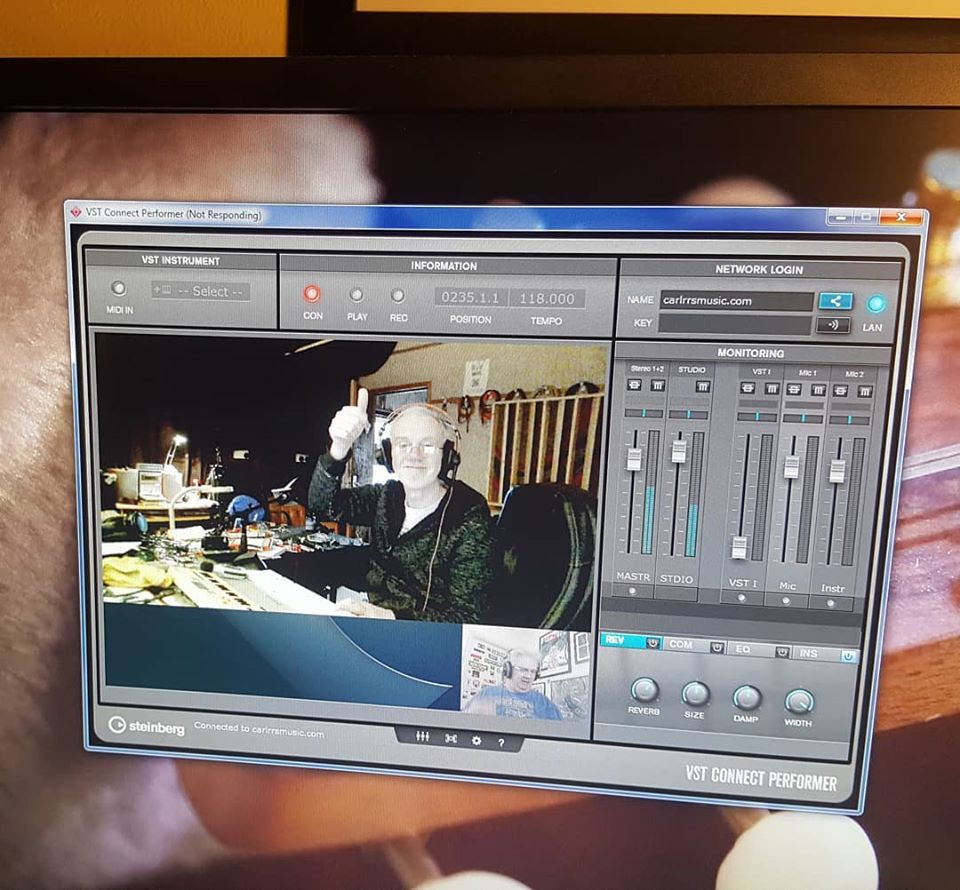
This has been a somewhat surreal experience doing the first few tracks, studio to studio. Fortunately Carl Rosamond has a brilliant grasp of how to use the technology as well as how to get the best sonic results.
I recorded the rhythm guitar track for “Your Chosen One is Coming” and then added vocals using the Ear Trumpet mic. The custom Warmoth hard tail strat with a Tom Holmes HB and single coils (info for guitar geeks) sounds absolutely terrific into the Acme DI. I am absolutely loving the simplicity of the Acme and can now appreciate why it was used to great effect on so many Motown tracks.
We then added some additional takes studio to studio using a Pro Version of VST Connect to record additional takes.
This is a really stripped back sound, but I am loving it. In a strange way it reminds me of a cross between The Velvet Underground and Bruce Springsteen’s Nebraska. There’s a stack of songs to record, but hey, I have the time now to do it!
My terrific bass player Fergus Quill told me about the Acme Motown D.I. WB-3 which I had never heard of. Not only had I never heard of it, but my fellow tech enthusiasts had never seen or tried one. I started to investigate and immediately found that there were none second hand which is one of the signs of great gear.

I was originally going to travel to New York where I could try one out, but the global pandemic made that impossible. My wife then managed to get one for my birthday from the excellent folks at KMR in London.
I’ve been playing with it for the last 24 hours and can I can see why studios and players are so impressed with this unit. The price will put a few folks off and my producer commented “What? A DI box at that price? Then he heard a clip, and admitted that it sounded great.
I had a similar reaction to the Fire Eye Red DI’s that I have blogged on previously, but the Acme Motown D.I. WB-3 is a different beast. I’ve used it as a straight DI into a desk and it 100% gives the natural sound of the instrument. Its one of those pieces of gear that gives that elusive extra 20% for those wanting great sound.
It also sounds fantastic when plugged into a simple fender small combo. The sound is smoother and more musical. I’ll be spending more time with this simple unit that is built like a tank and sounds terrific. I can see why many studios love this box and I’m super pleased to have one.
Since my first band The Small Change Diaries in 2015, I have increasingly become aware of the importance of using great photos in music promotion. The old saying “a picture is worth a thousand words” is so true and of course many great albums were also remembered for their classic photos. The Clash’s “London Calling” Springsteen’s “Born to Run” and Joni Mitchell’s “Hejira” are a few of many examples.
I was lucky to come across Karen Turner five years ago and we have done a number of photo shoots with her, both in the UK and overseas. I have come across many photographers who have great gear, but the key to taking great photographs is someone who has the eye to know how to really capture the subject. Karen Turner’s photos have been a key factor in all our band promotions along with video clips.
Here are some of the superb photos she has taken to date and I’m currently waiting to see the latest photo shoot with the new Caravan of Dreams quartet.
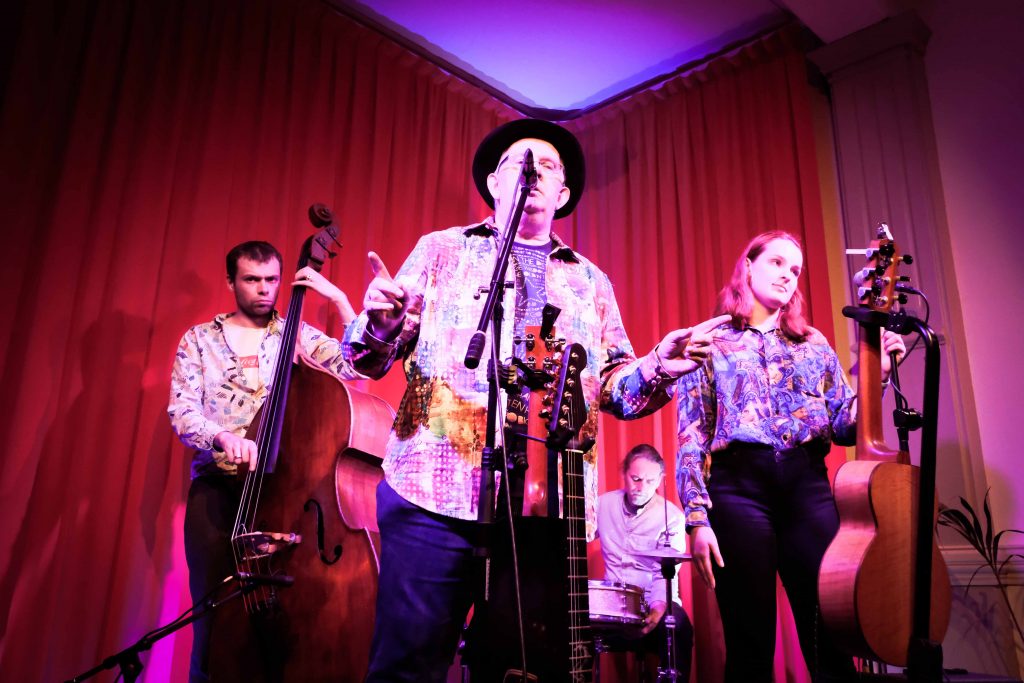
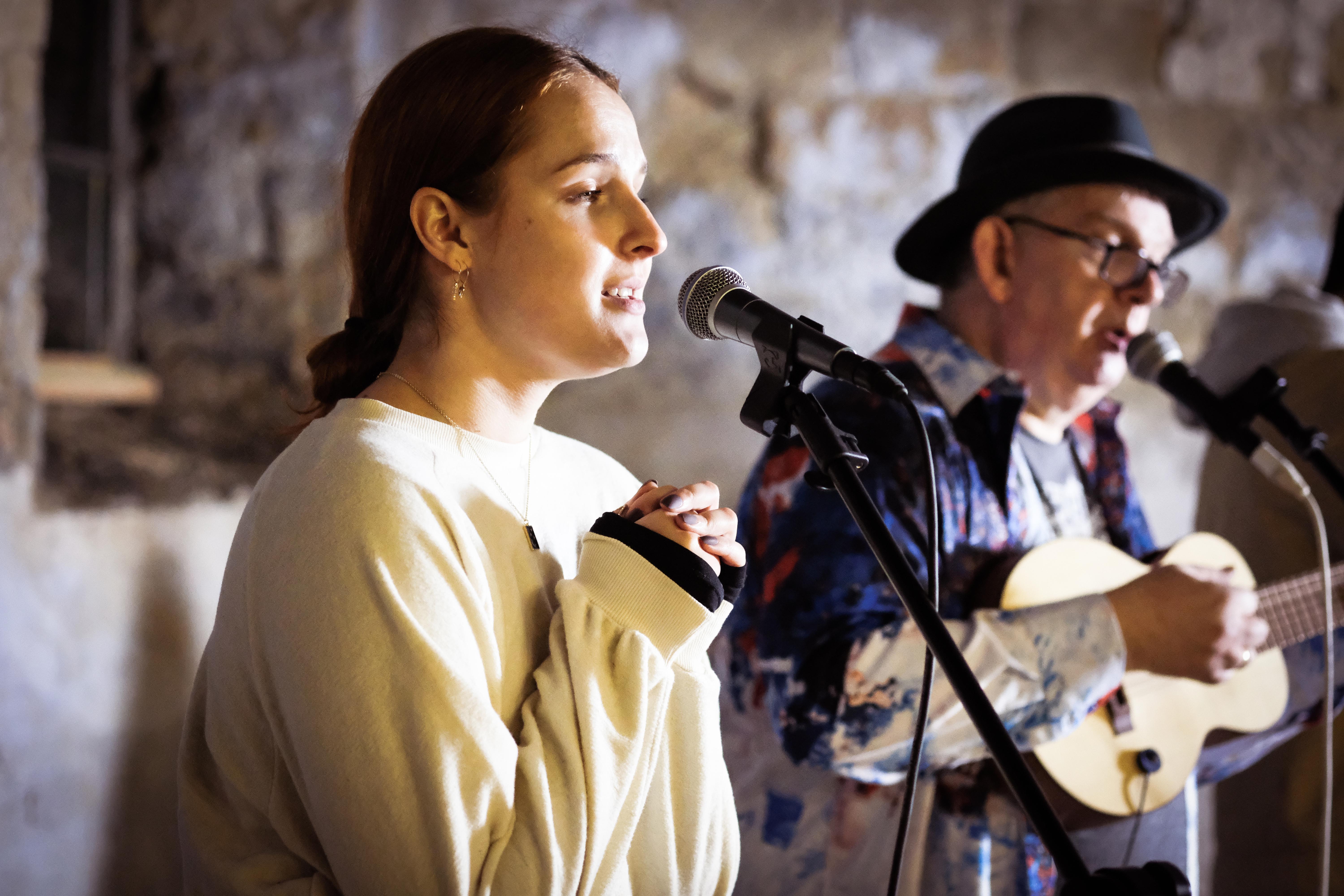
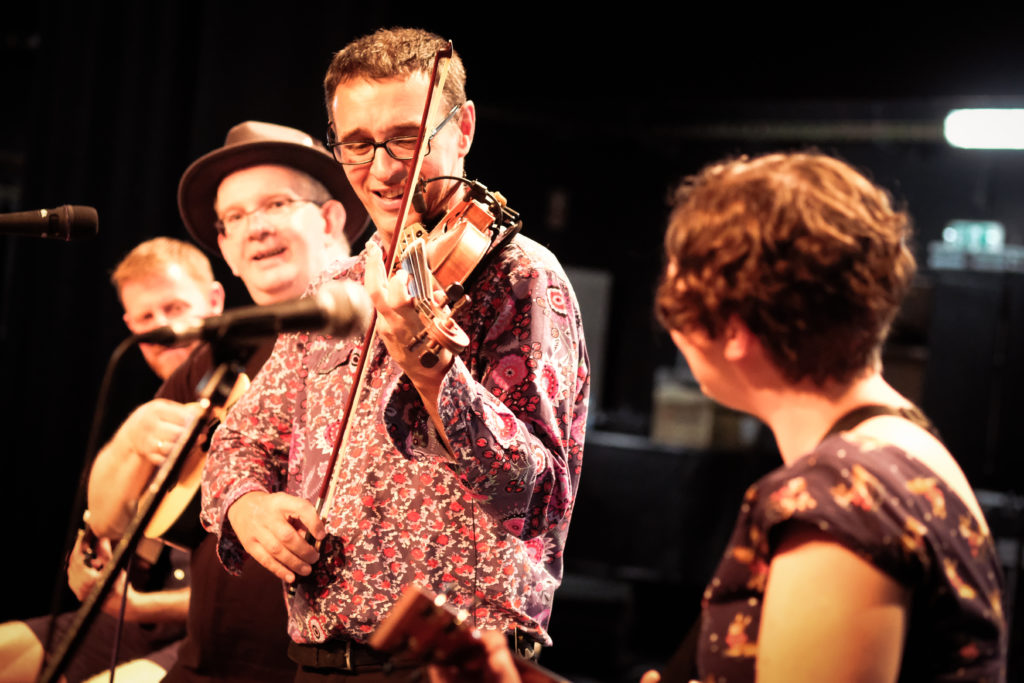
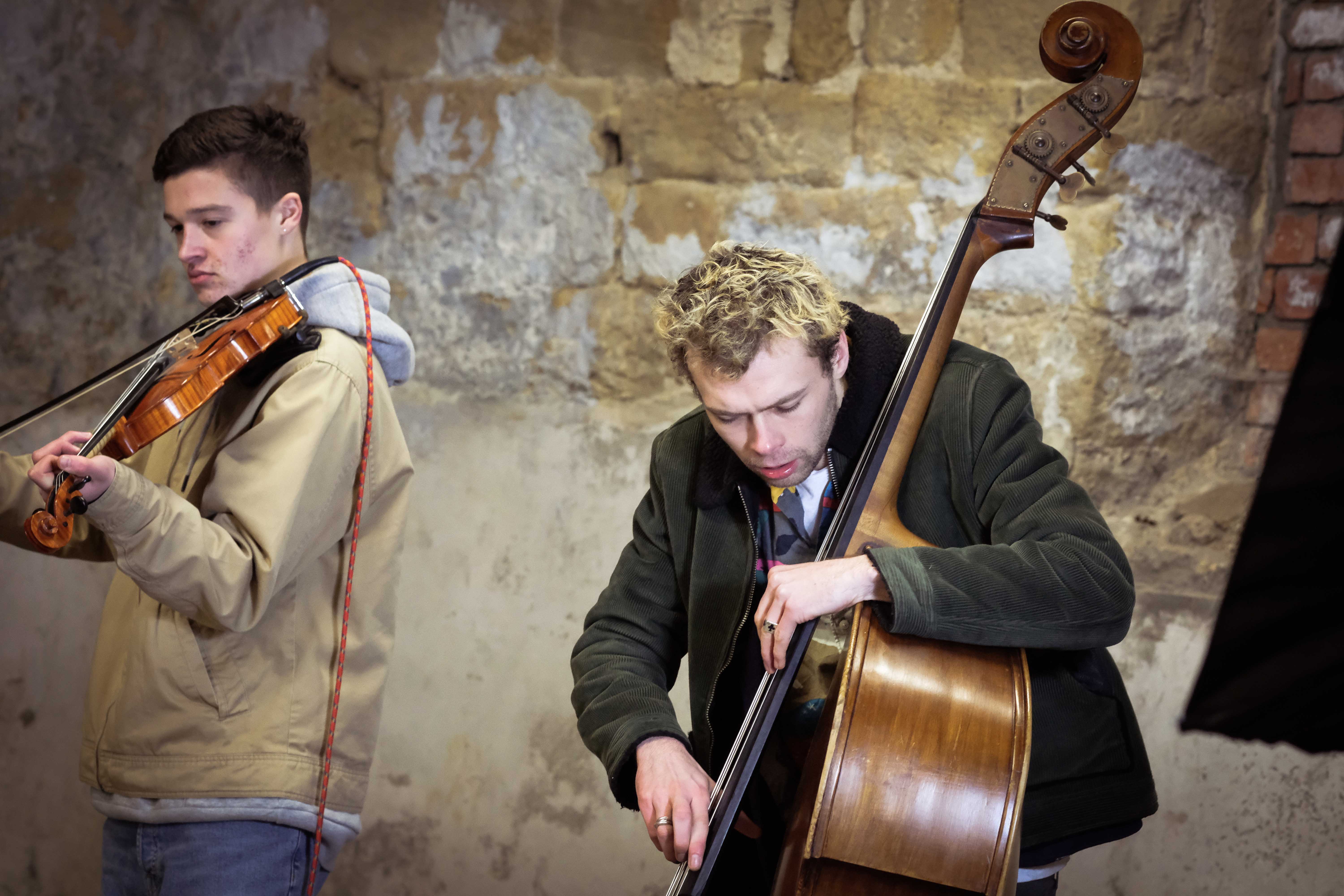
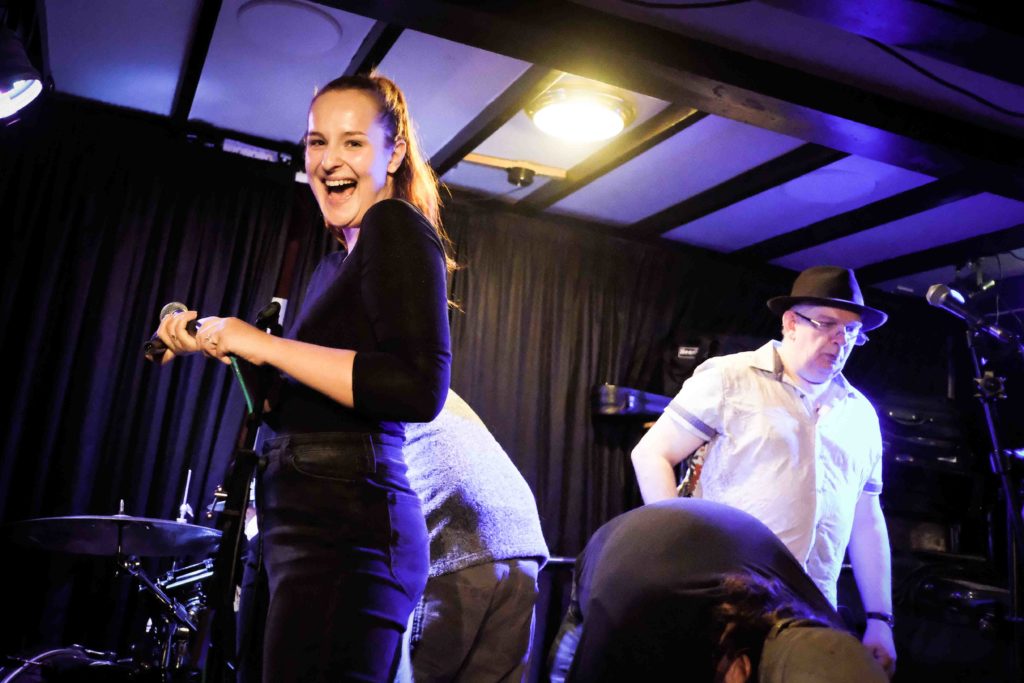
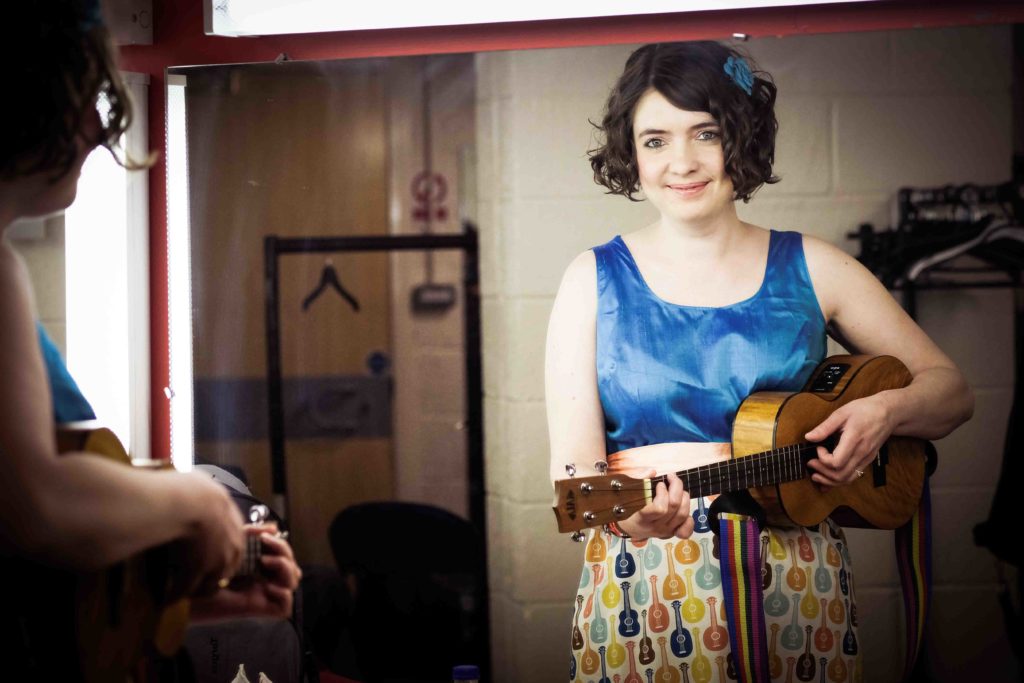

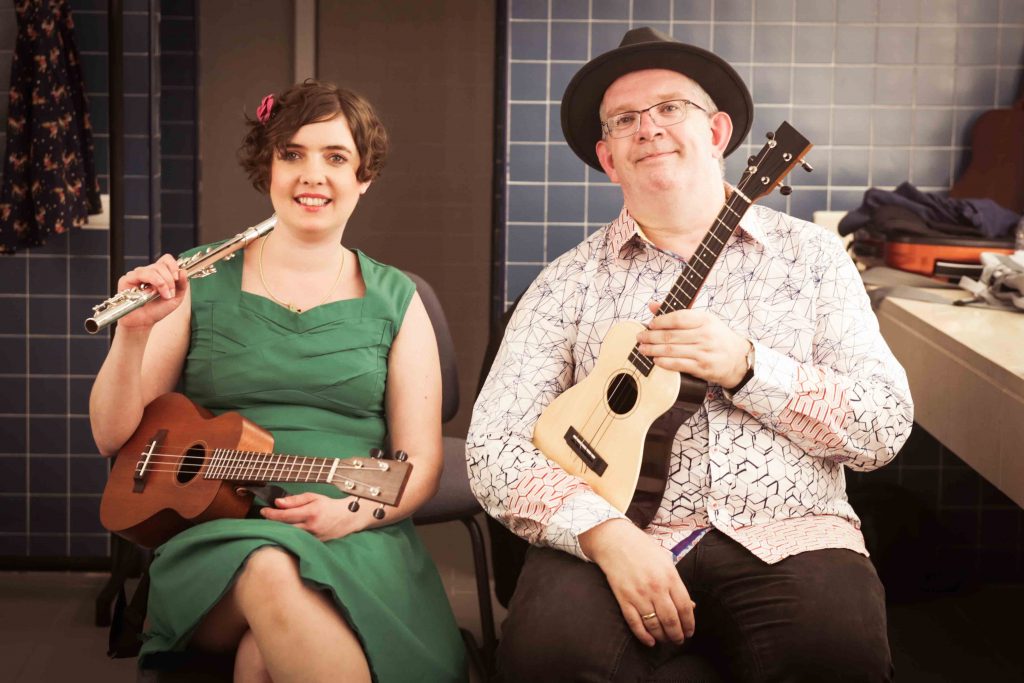
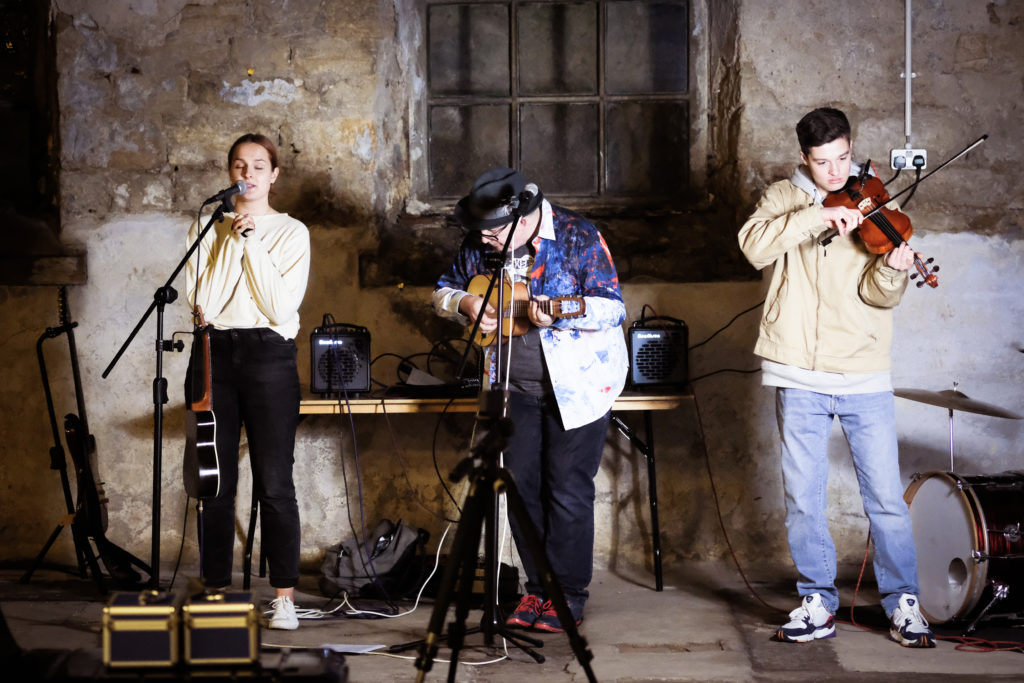
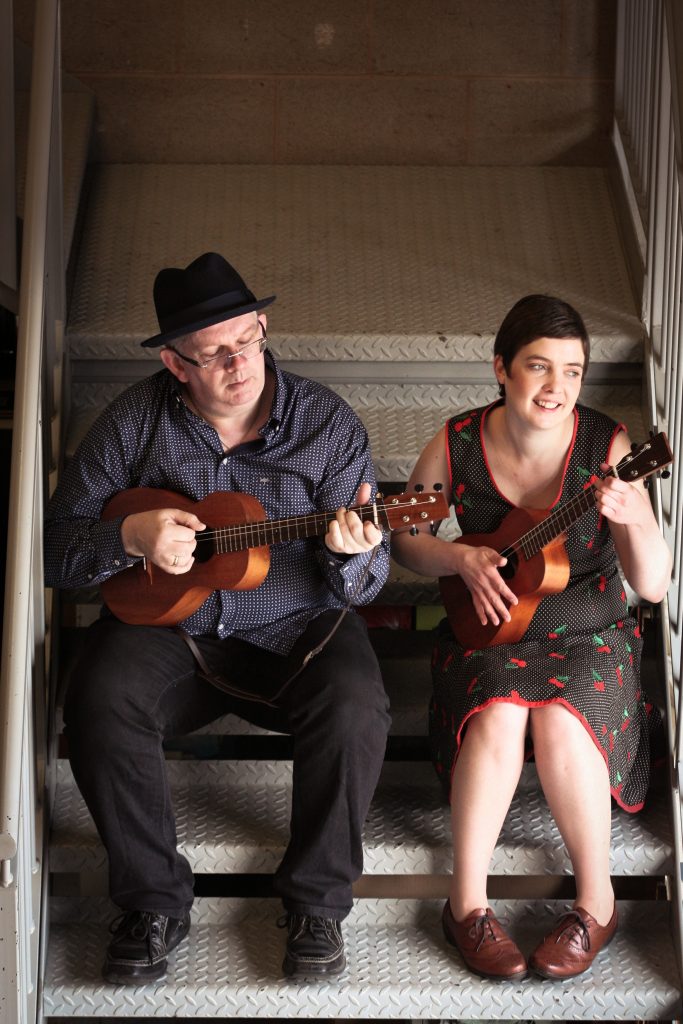
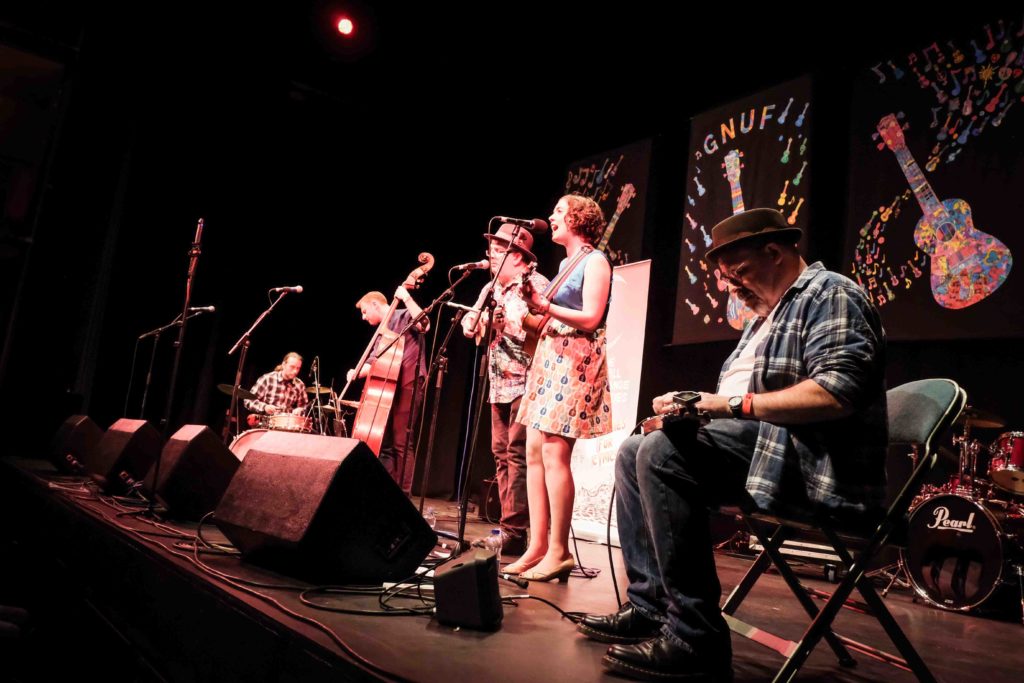
All photos by Karen Turner.
In doing interviews for Music for The Head and Heart I’m increasingly finding that artists have a real challenge in generating predictable income and many are asked to play charity events, fundraisers and similar live gigs for no remuneration. I have absolutely no problem with charitable events, but one good friend pointed out that perhaps a charity event to support the working artists might be a good plan? This raises the whole question of the price we pay for “free music”
Here are some thoughts
With the advent of Spotify and many other music trends the performing artists are increasingly disadvantaged financially. Hobbyists as opposed to professional performers are often favoured by local pub venues and open mic type situations meaning less financial outlay for business owners. Its all sounds great doesn’t it? Free music for the masses? Well any smart person knows, there is always a cost involved in any relationship and this is no different…
” I’m not a fan of artists paying for “exposure” as often its a means for promoters to get free entertainment and in many cases the artists don’t even receive expenses for their work. Every year I have one promoter asking my 5 piece band to play for a charity gig where the artists don’t even receive the most basic of expenses. I think such expenses should always be on offer and then its up to the artists to accept or refuse on a case by case basis. When entertainment is increasingly presented as being available for no financial cost, then people start to devalue what is on offer.
I set up the Music for The Head and Heart Platform to give especially independent artists a voice and a means to connect to a wider public. Artists are invited to appear on the platform and the “trade” is that they get to be interviewed and play some songs which are then professionally edited and promoted to the wider public. The “trade” is mostly in time and for around an hour’s meet up, and with no financial outlay, many performers can have some really excellent footage produced and in some cases be part of one of the live paid showcases. Trades are not always financial trades, BUT ultimately professional performers need to earn a living and that means figuring out how to balance time and money.
I’m a big fan of collaboration and reciprocation. I have built up a business reputation over many years that allows me to fund my love of music. I literally put my money where my mouth is and always ensure that artist’s work is valued. This means funding support acts and shows irrespective of whether I receive any income. The reason for this is that if we fail to value creative work then ultimately the quality of what is on offer will diminish as performers can’t maintain a time/money balance.
I’ve previously blogged about how many performers return to paid salaried work as they can’t earn a reasonable living from music alone. This inevitably means that the quality and diversity of what is available is increasingly reduced and I have often joked that all will remain will be open mics and giant stadium gigs with nothing in between.
In my view, the best way forward is for performers of like minds to support each other and to create exceptional entertainment for the wider public. Its down to the artists to entertain and to ensure that they don’t give away their skills without factoring in the bigger picture. This is a tricky balance but many music enthusiasts can unwittingly become complicit in devaluing musical entertainment by being to ready to give away their art. This creates an understandable expectation from the public that music “should be free” and that’s IMO a real problem. Promoters and festivals also have IMO a responsibility to ensure artists receive fair pay for their entertainment skills.
I even recall one festival asking what “contribution” an artist might “need” if they are accepted to play one of the stages. I can’t imagine a top chef being asked such a question and in my view its disrespectful to performing artists. As a lover of music, I want to see more great live music and that means artists need supporting in their creative work. Imagine people then decided that they wouldn’t pay to see films at cinemas, the cinema industry would soon start to deteriorate and ultimately disappear. Agree? Disagree? Don’t care? All feedback welcome as IMO its an important discussion
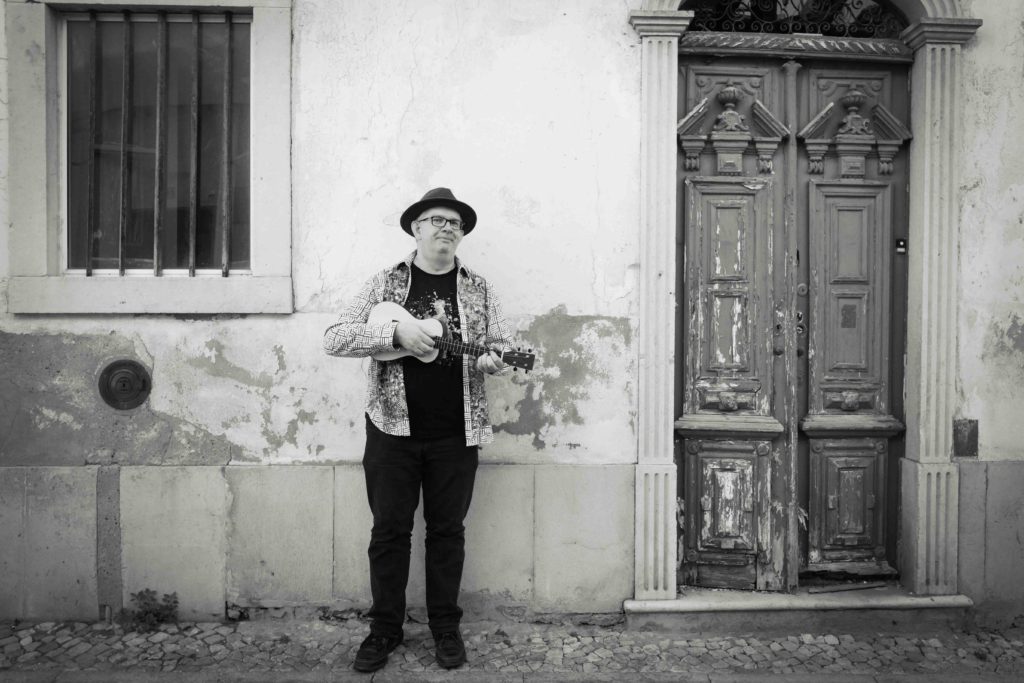
Nice to see a good article from Artist Sounds on the band here on the new promo clip
One of the biggest challenges in creating and promoting music is to be able to fund the time needed to make this happen Unless you have a wealthy patron or other financial support, it can become a real issue. Here are some thoughts and observations on this.
In recent months I know three musicians who have returned to full time employment as they can’t earn enough predictable income fr om music alone. I’ve blogged extensively about how paid work is tougher to find for artists and its no surprise that ecomonic consideraions ultimately prevail. I remember reading that Tom Verlaine from the iconic band Television was still working part time in a book store in New York even when his classic Marquee Moon album was released.
In 1980s my friends in the band James in the early days were volunteering for drug trials in Manchester to generate income and for years lived on a shoe string. Even when signed by Sire, it was hard work and only 30+ years on are those in the band capitalising on decades of work.
Many artists don’t in my view fully appreciate that if they want to connect to a wider audience, image is important. I’ve seen many posts on social media which to put it politely are in my opinion ill advised. Examples include begging for accomodation in a city at short notice from anyone online and other photos of being very drunk online. Yes, this is part of daily life for many folks, but as the old saying goes “You never get a 2nd chance to make a first impression”
Its not just individual artists who are unaware. I saw a festival once try and position themselves as the next Glastonbury for a niche music concern. The ad copy online was as impressive as the claims for what they said they were going to achieve. I then saw a photo of the headliner and thought it must have been during a soundcheck. The reason I thought this was that there was a small group of people huddled under umbrellas which suggested a very different image, but yes this was the final audience…
I just finished my third album and I have realised that in order to work up material for the studio and live tracks means a lot of rehearsal time. My policy is to pay the band for all their time and I fund this from my other work. This means working very hard to make this possible. I also pay all band members for gigs, irrespective of whether we get paid by the promoter. These costs can really accumulate, but its an effective way to get the work completed without resorting to Kickstarter style operations. Such operations work well for some people but I’ve steered clear to date.
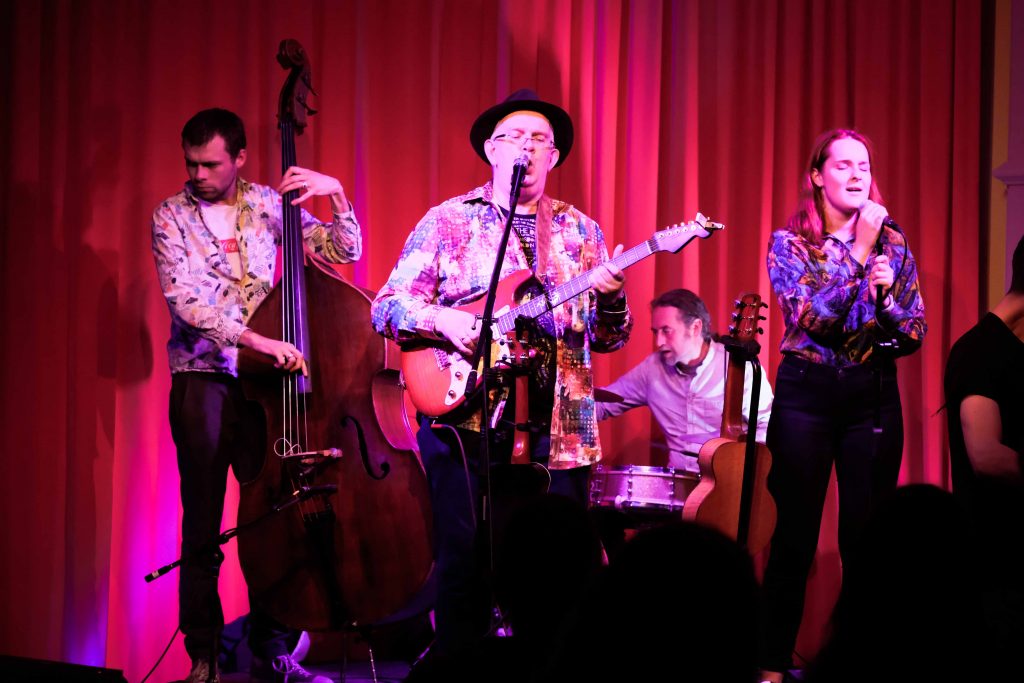
Regarless of finance, simply being able to get a band to all meet is a challenge. I joke that “thank god, we are not a 12 piece band!” I have learned that the best model for my ensemble is to have a core trio and then hire in other musicians. I have an inner FB group for all those involved in musical projects and that allows for good communication.
I’m a big fan of reciprocation and shared values. I’ve run music events where some artists have been brilliant in their cooperation and involvement. In contrast I’ve had artists want to bring a crazy number of people as guests, many of who disappear after their friends have performed! Neeedless to say, such folks will not get future opportunites from me. Fortunately these individuals are in a minority and are often seriously unaware of opportunities. With one artist I offered them all manner of possible commercial opportunities and they simply didn’t respond. Yes, its for each artist to determine what works for them, but to not even check out an opportunity seems seriously daft to me…
I’ve learned to pick and choose who I involve in projects and as band members. There are some really nice folks out there, but it can be a massive amount of working organizing them. This inevitably leads to a lot of frustration so now I’m super careful about who I involve in work. Another issue is that many artists can’t work in an organized manner and that is essential if you want to build and release a body of work. My advice to all band leaders is to work with people who are like minds and who have shared values.
I set up the Music for The Head and Heart platform to bring together artists and work in collaboration. To date we have run a terrific launch party and the second live event is Jan 25th and we still have a few tickets here. To date we have interviewed 35 artists from all over the globe and its been fascinating. This means allocating a great deal of time and some financial investment. I fund this to date from other work and by year two my plan is that at least the live events break even. The main investment is time in organising artists and planning video and audio. People who attend actual events often don’t appreciate the crazy amount of time and goodwill involved in many these showcases happen.
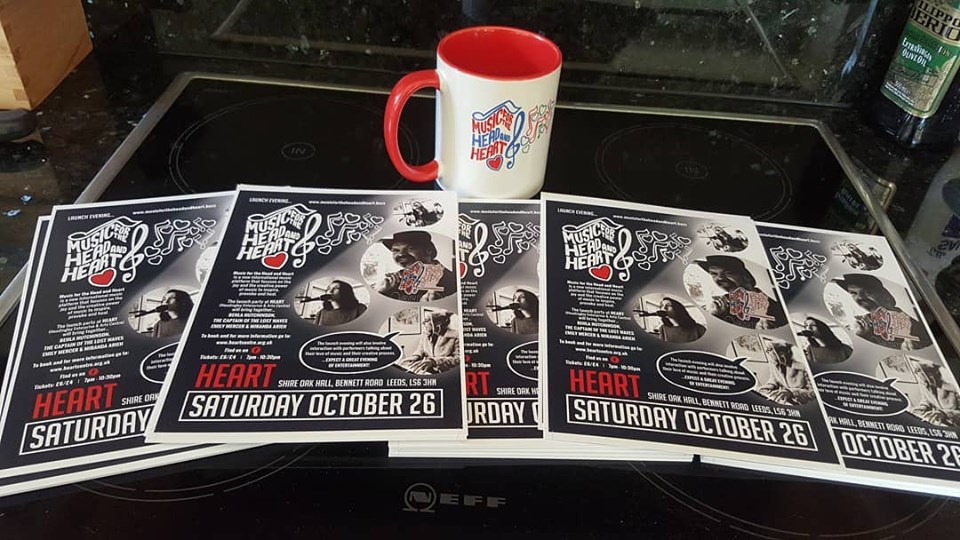
All this time has to be funded in some way and that means thinking smart and working with people who have shared values. In terms of the platform I have a policy of inviting people and then sending a reminder if I don’t hear anything. Many such artists simply don’t have the momentum and stamina to create a body of work and to reach a wider public. Often they are by nature too insular and inevitably never create and release a body of work.
Personally I need chunks of time to plan and to create new music. I don’t work with a regimented work schedule for writing, but I like to always have instruments to hand and free time to play around. Its also invaluable to be able to step back from projects and take a second view on how to proceed. I think its also invaluable to have a variety of interests in life which can inspire the creative process. That means using time in a particular way to not just get stuck in one medium of musical creation and to embrace working with all manner of other people. As Nick Cave would say
“A rock musician’s career is short-lived. To extend it, you need to do other things to keep yourself fresh.|
Nick Cave
Collaboration and sharing skills and resources are the best way to being about any vision. Many performers can be tunnel visioned in how they work. That’s fine for them, but IMO its not smart business. A better way is genuine cooperation and collaboration to bring great music to a much wider public.
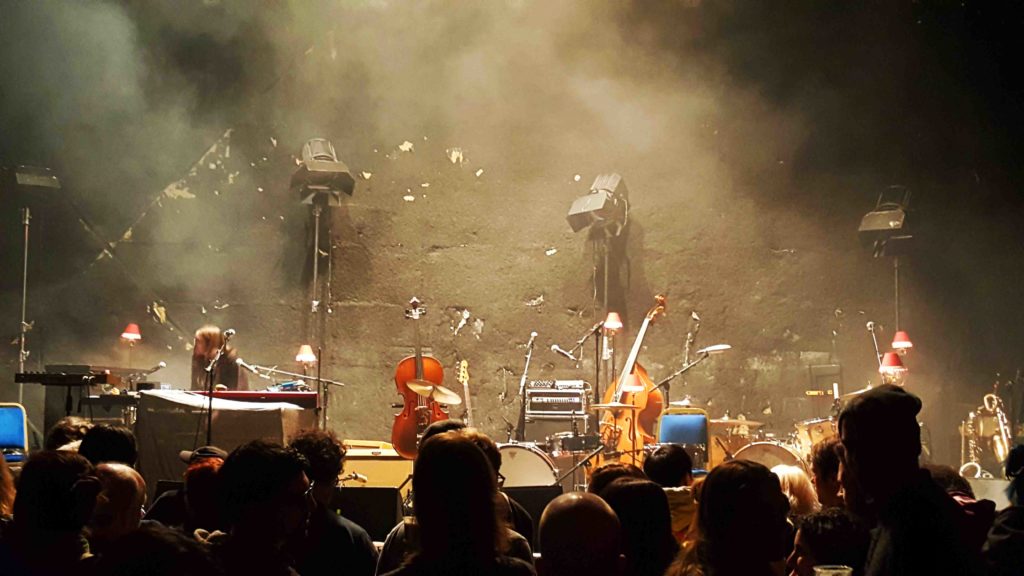
I recently fast forwarded through the new “The Masked Singer” TV programme and it reminded me how much I hate such formats. Shows like “X Factor”, “American Idol” and “Britain’s got Talent” had some appeal initially, but increasingly the hype and manufactured backstories eclipsed any real musical skills. I am mystified as to why anyone would watch “The Masked Singer” but 5.5 million people watched the show for the first time in the UK. I fast forwarded though the whole horrible experience and noted that it was the same formula for shows like “The Voice” where there’s “a reveal” which is the main hook for the show. In this instance one “performer” from The Masked Singer is revealed at the end of the show.
I’m all for promoting new talent, but the more I look into these shows, the more I discover how they are not really about promoting music, but more pushing a pre packaged product. Yes, I appreciate that in any commercial undertaking any record company or business wants a return on its investment, but in my view these dumb down music and create delusional expectations for many artists. I also reliably heard that at least one artist was approached to go on one of these shows and assured he would be in the final group BEFORE he had even had an audition. The Masked Singer is another variation on the X Factor formula that seem to have captured the public’s attention, but I for one loath such shows .
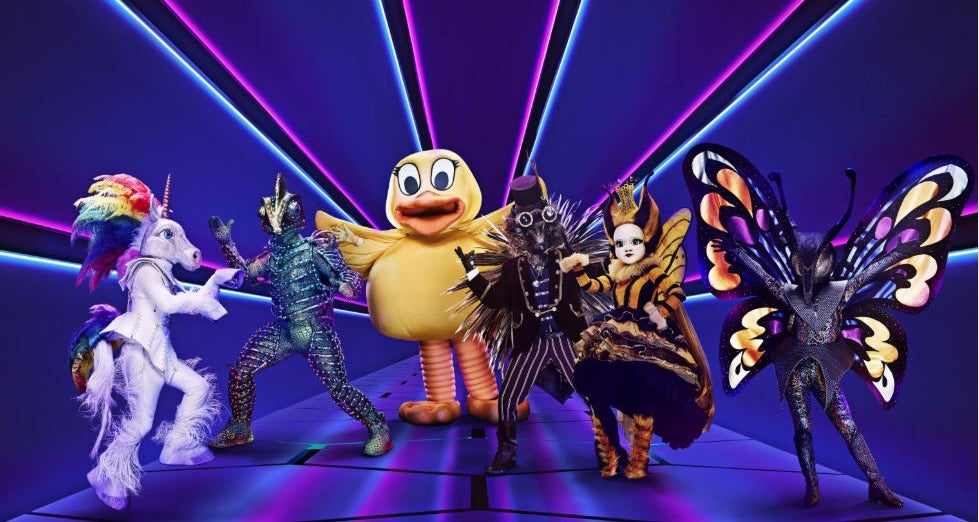
Clearly I am in a minority, but I agree with the following quote below from Bela Bartok. The problem for me is that many such competitions are focused on generating money rather than promoting artistic development and expression.
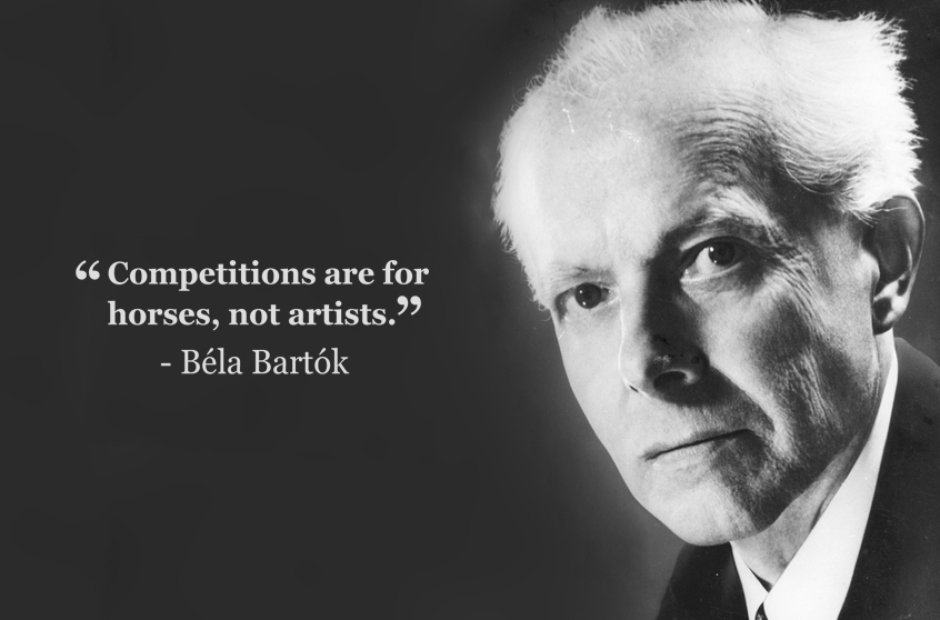
Another reason I hate such shows is that almost always the artists sing cover versions. I really don’t want to hear anyone else slaughter classic songs like “Hallelujah” unless they are on a par with Jeff Buckley, which of course never happens. This endless recycling of cover versions mostly not done well, continues the trend of dumbing down music, and reducing the opportunity to hear anything new. The talent shows have become so formulated that viewing numbers have significantly dropped in recent years as the publci has mostly seen and heard it all before. The shows are predictacle in the extreme and quite frankly pretty dull. The latest X Factor incarnation recorded its lowest ever ratings at just 2.95million during the first live show of the new Celebrity series. Ratings dropped from a 3.6 million peak to an all time low for the franchise, which began in 2004.
Of course this trend is not new and again I realise I am in a minority. I’ve been at niche music festivals where an audience is whooping over a performer doing “a quirky version” of a classic Bowie song, that I thought was terrible… However popularity does not in my opinion equate to good taste and lets remember even though there are 1,249 McDonald’s in UK, that doesn’t mean they serve what I would consider (in my biased opinion) the best food.
Some artists that win talent competitions have reasonable careers, but many disappear out of sight once the hype has died down. How many X Factor winners can you remember? There have been 15 winners of the show to date: Steve Brookstein, Shayne Ward, Leona Lewis, Leon Jackson, Alexandra Burke, Joe McElderry, Matt Cardle, Little Mix, James Arthur, Sam Bailey, Ben Haenow, Louisa Johnson, Matt Terry, Rak-Su and Dalton Harris. Winners receive a recording contract with record label Syco Music with a stated value of £1 million. This includes a cash payment to the winner, but the majority is allocated to marketing and recording costs…
Since 2011 it has been thought that the act only gets an initial advance of £150,000 for their first album. If they manage to impress the label the advance rises to £237,500 for a second, £315,000 for a third, and £400,000 for a fourth. Of course “an advance” is essentially a loan against future earnings or pre payment of royalties.
Of these Little Mix and Leona Lewis are probably best known of course.
A Guardian article on this makes for interesting reading (excerpt below)
“News leaked that The X Factor has dropped the “£1m recording contract” top prize. Apparently this happened in 2009, but contestants were sworn to secrecy, so the change has only now come to light. The contracts this year’s finalists have been asked to sign give them an advance of “just” £150,000 for their first album, according to the Sun. The advances for the follow-up albums increase by just under £100,000 with every release, which means the act would have to release four albums to earn a million pounds. No act has so far managed to reach that point before being dropped.
That people are surprised by these revelations illustrates how the myth of the pop star life is still pervasive. As record sales have plummeted by almost 50% in the past decade, the advance most new artists can hope for, even from a major label, ranges between £75,000 and £150,000. If X Factor wannabes are still under the illusion that winning will make you a millionaire, they’re in for a surprise when they realise how record deals really work.“
An interesting excerpt from The Daily Telegraph article on classic music competitions in 2014 –
The majority of music competitions are corrupt, Julian Lloyd Webber has said, as he warned that judges often collude to ensure victory for their preferred candidates. The internationally renowned cellist, who retired from playing in April, said it was an open secret among professional musicians that talent is not the deciding factor in most single-instrument contests. He claimed that many teachers used the competitions as a way to promote their own pupils.
“Everyone knows it, but no one says it, because when you’re in the profession, you don’t,” he told The Times. “There are obvious exceptions, such as BBC Young Musician of the Year, which is not corrupt at all, but you have these competitions for violins, cello, piano and it’s all about who you studied with.” Mr Lloyd-Webber said that favouritism was endemic to Britain, but the problem was with talent contests rather than industry awards such as the Gramophone Awards or the Classical Brits, which helped propel Vanessa Mae to stardom.
One UK business now promotes talent shows where performers pay to take part and then are tasked with marketing the live appearances. That sounds like a great business model for the host of the competitions, perhaps not for the artists. One such company asks artists to pay 10 pounds to apply and/or an additional 20 pounds for “priority application” They are then additional “marketing requirements” from the company towards artists…
This particular company advertises
“This singing competition attracts over 10,000 acts every year as it travels across the country in search for the UK’s best singers, singer/songwriters, rappers and vocalists”
its not hard to see that this is a lucrative business model. Yes, the argument can be made that the artists get good experience, but personally I would be wary of such methods.
Aa google search reconfirmed some interesting feedback from one artist. Make of this what you will. I have removed the name of the business, but for those interested its easy to find out who it is.
“Dear talent show
Thank you for your email.
By legal definition you may be a legitimate ‘talent show’ but you really ought to be more honest. This is a huge money making scheme. Having read your terms and conditions it seems you ask singers to pay £5 to enter your competition, charge successful singers a £30 deposit which is only refundable if they ‘turn up, make an effort and compete as asked’, and although not obligatory, you pressure successful singers to ‘try their hardest’to sell 25 tickets each.
I would not be surprised if pressure was also placed on singers to rent a crowd aka to bring lots of friends and family to each ’round’ at their personal expense and, if audiences were also encouraged to take part in expensive text message voting.
You say you are connected and have worked with the ‘likes of Sony, Warner and Universal Music’ but aside from Birdy, I haven’t heard of a famous singer whose success is attributed to you
That you emailed me asking me to ‘work’ for you as a talent scout is actually quite funny. Yes, I am extremely well connected both in London and Kent. As an established voice coach and choir leader I access 230 singers on a weekly basis. The contract you have asked me to sign asks me to openly publicise your competition by distributing the 1000 flyers you will send me, whilst recruiting singers to audition. The final reward for this is a commission of £100 for every 10 singers who successfully audition, £150 for every 15 singers and £200 for every 20 singers. Essentially, you are asking me to work for free on a commission basis with no guarantee of fair pay for my efforts. But primarily, you are masquerading this as an ‘opportunity’ to be a ‘talent scout’. It’s absolutely ludicrous!
But moving on and back to my comment about your approaching me being ‘funny’… As you will recall, I am quite connected, yes. And as I said before, I do have access to 230 singers each week of the year. I am also legitimately ‘connected’ and two of my students have signed record deals (they did not pay a fee to do this). I am, however, grateful that you contacted me as what I will now do is inform the 230 singers I teach on a weekly basis to not enter your competition.
In summation, you have taken the X Factor concept – an already exploitative competition – and turned it into a money-making scheme, whilst asking singing teachers to work on commission rates only, and poor ones at that.
I suggest that you take your competition and shove it up your arse.
Your sincerely,
Emily”
Of course this is just one view and there may well be others that have found such experiences to be of great value. Personally I’m not a fan, with heavy reliance on the performers to not only perform but also to market the event for free.
My biggest beef with talent shows and singing competitions is that they create delusional expectations for performers and does nothing to develop new creative talent. Instead “packages” artists to a specific template. Its a personal hate and of course many will disagree. That said, The Masked Singer seems in my view to be a new low in music TV shows. Such examples in my confirm that such shows really mostly benefit those running them and not the artists without whom they could not exist. I fully endorse Emily’s final comment on this matter that I couldn’t have put better myself.
I’m currently organising studio time for 2020 and took a few moments to look about at the songs I have professionally recorded to date. My first band was “The Small Change Diaries” where we recorded two albums and one EP. Since then I have recorded a debut album with “The Caravan of Dreams” which is my new ensemble.
Here are the songs I have recorded to date and a provisional listing for the second Caravan of Dreams album
ADAM BLAMES EVE – THE SMALL CHANGE DIARIES
PROTEST SONGS – THE SMALL CHANGE DIARIES
LULLABIES FOR CYNICS – THE SMALL CHANGE DIARIES
This sweet seduction (unreleased)
TALES OF DARK AND LIGHT – NICK CODY AND THE CARAVAN OF DREAMS
ALL IS FINE UNTIL THE WORLD GOES POP – THE CARAVAN OF DREAMS
(To be recorded) 10 tracks currently planned!
Special thanks to everyone who has played on these recordings to date and to those guests lined up for the next album
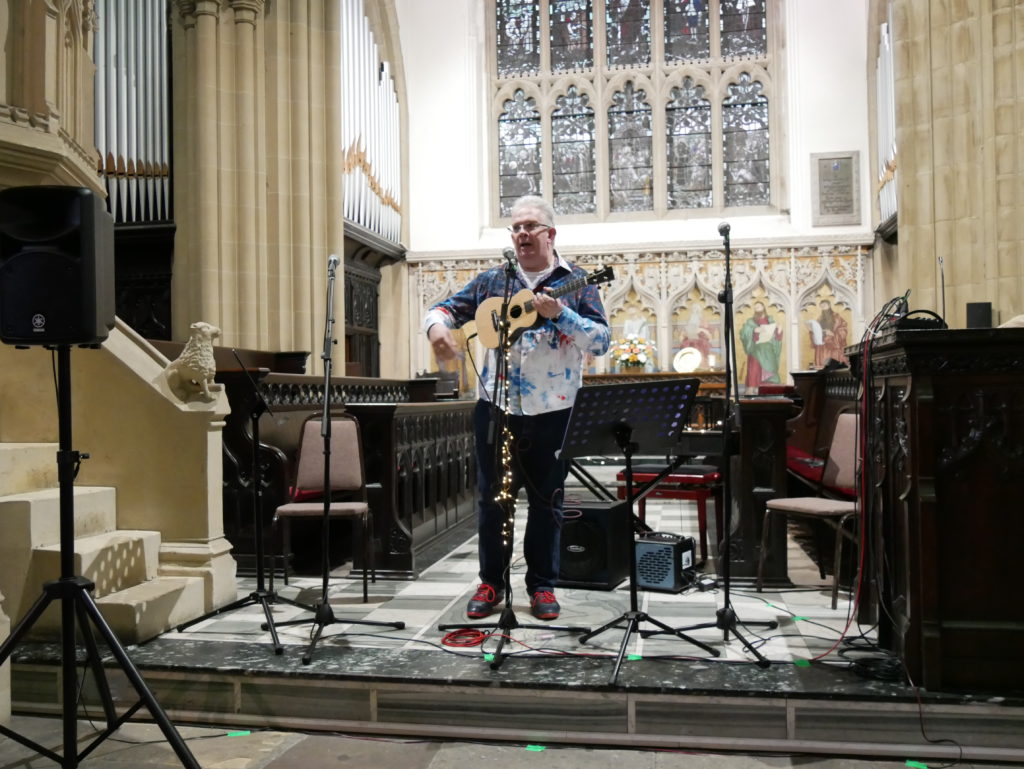
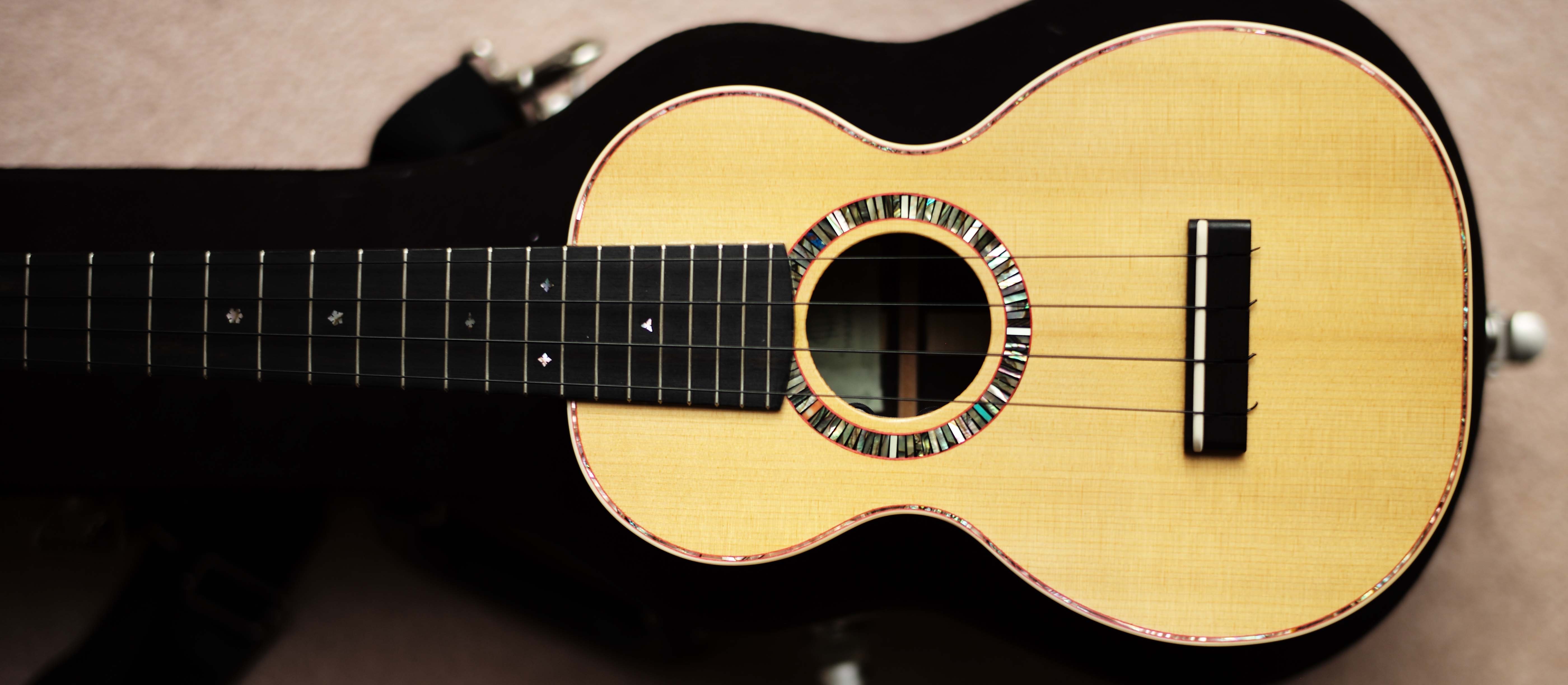
I’m currently doing an annual review of my instrument collection and was reflecting on what makes for a great instrument. Over the years I have bought all manner of instruments from all over the globe. The challenge in the UK is often the lack of selection. In terms of guitars there are still a few good stores, but none compare with what I know in the USA and Japan.
“The keepers” in my collection include my Shimo collection of ukuleles. Shimo is an exceptional builder and I’ve been using his instruments on almost all my recordings to date across three albums and one ep. Here are some of the collection
I also have my two Stefan Sobell acoustics and mandola. I first heard about Sobells from Martin Simpson, who has been playing them for many years. These are custom made exceptional instruments and there is often a two year wait for any build.
Both Stefan and Shimo make instruments to order. In terms of a company, Bill Collings is still in my view the best and I have two of his concert ukuleles as well as an electric I35, and a tenor and 6 string acoustic
Collings make great electric guitars as well as acoustics. Here is the I35 in action
I’m generally not a fan of “old is best” but I do love this Martin ukulele that is almost 100 years old. Again the build quality is superb and the sound is great
These are just some of my collection. Great instruments are those that inspire creativity and are a joy to play. Often they come at a price, but not always. The problem with many production instruments is that the quality can vary massively for what should essentially be the exact same instrument. This is true for guitars and ukuleles. I take online reviews with a pinch of salt for this very reason.
Of course all of these views are subjective and the only way to find out what is a great instrument for you, is to go play a buncg of them. This means a bit of effort in exploring, but in my opinion that’s a worthwhile time investment and it pays off massively in terms of what then inspires creativity.
Once a year I do a proper review of my instrument collection and decide whether to move on some of the collection. This can be for a variety of reasons. Sometimes some instruments have served their purpose and have been superceeded by new aquisitions.
I have a checklist of four fundamental questions when deciding whether to keep or move on an instrument
1 Do I use it live?
2 Do I record with it?
3 Do I write with it?
4 Am I keeping as an investment or for sentimental reasons?
I’m lucky enough to travel across the globe each year and to know where to find the very best instruments. The biggest challenge of living in the UK is that we simply don’t have the choice that would be available in many other countries. Stores like Rudy’s Music in New York and Carters Music in Nashville simply don’t exist in the UK for guitars. For ukuleles there are numerous great stores in Japan than offer instruments I’ll never see in the UK.
I never set out to be an instrument collector, but mostly seek out instruments for live work, writing or recording purposes. With live work any instrument needs to be amplified and 100% reliable. Some instruments are better played acoustically without pickups and of course every instrument requires different amplification considerations. This is one of the reasons why questions like “Whats the best pickup or amp?” are totally meaningless!
I have increasingly sought out had made custom instruments rather than production line instruments. Yes, there is a higher financial ticket price but the attention to detail and quality is usually much higher. There are few companies who reach such quality standards and Collings guitars definately falls into that catagory. I interviewed Bill Collings many years ago and told him that I have never played any acoustic or electric Collings instrument that was anything other than excellent. Bill had the perfect ability to figure out the very best elements in brands like Martin, Gibson and Fender and then improve on what they did.
I own a number of Collings instruments including an I35 electric, a tenor guitar, a 6 string acoustic and two concert ukuleles. All are superb. In terms of custom builds my preference for ukuleles is Takahiro Shimo and I have eight of his instruments so far. I also own two Stefan Sobell acoustics and a mandola. Stefan is another great builder and like Shimo there is a wait for any instruments as they are greatly in demand. Pete Howlett is also a superb builder from Wales and Gregor Nowak from Vienna continues to amaze me with his instrument builds. Almost without exception any of these purchases are keepers and the production models are the ones that usually get moved on at some point.
Ukuleles and mandolins are small bodied instruments, so don’t take up a lot of space. Guitars however can soon take up a lot of space, especially if you have good protective cases for each instrument. Suddenly space (or lack of it) can be an issue.
I’m a big fan of instruments being played and its of course once you get to a certain volume of instruments its impossible to play them all on a regular basis. I’d rather pass on some such instruments so they get the attention they deserve, than have them just sitting in cases.
Here are some of “the keepers”
Here are 6 of my favorite instruments from my collection. They are all very different, but exceptional in terms of playabilty and sounds.
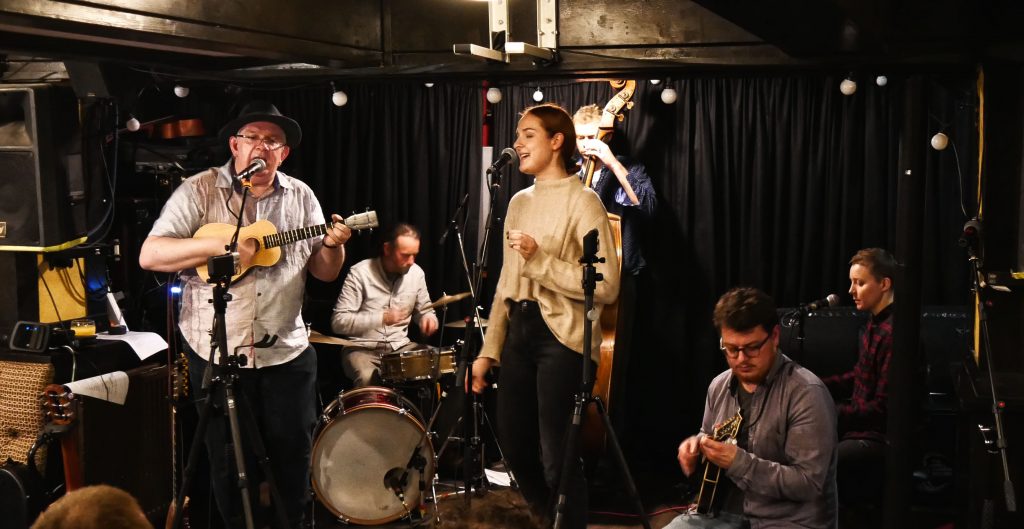
2019 was a busy year with the release of “Tales of Dark and Light” and a launch party in May. We recorded 14 tracks for the album and I have another 7 tracks ready to record already in 2020. As well as lining up new gigs, I’ll be spending some time of a side project “The Edge of Feedback” and working on an album of duets of original songs for release late 2020, early 2021.
The lineup of the Caravan will change in 2020, but the core members of myself, Fergus Quill and Rich Ferdi remain. Special thanks to everyone who has recorded with The Caravan of Dreams or played live with us in 2019, including Agi, Rich Ferdi, Fergus Quill, Dave Bowie Jnr, Laurent Zeller, Phil Doleman, John Burr, Chris Smith, Alice Higgins, Paul Conway, Adrian Knowles, Jed Bevington, Evan Davies and Ruth Nielsen. Additional thanks to everyone who came out to see us live, Nick Bloomfield for some amazing video and Carl Rosamond for superb sound engineering and keeping us on track.
As well as working on the projects mentioned I’ll be travelling to Japan, USA, Russia, Austria, India and Poland in 2020 with my other work. Finally the Music for the Head and Heart project goes from strength to strength with more showcase events planned in Jan and April.
Warm Regards
Nick
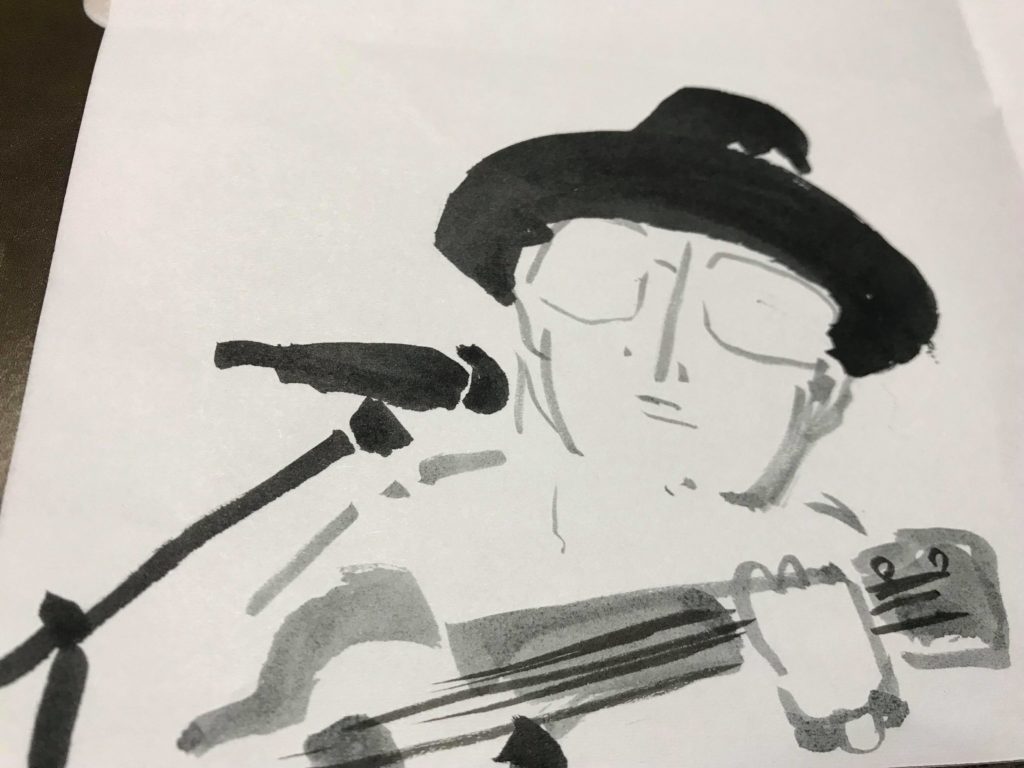
In part one, I pointed out how many artists are not looked after by promoters and how promoters fail to pay attention to detail.
As well as these issues, another great way to kill live music interest is to try and promote live music in a space that is totally unsuitable for this purpose. I have countless examples of this, but here are some favorites.
Once example is a venue where the layout means that even though they “promote live music” only a third of the café can actually see the artist! The others can hear the playing faintly in the distance above the conversation of assembled diners. Another example was an EP launch where the light on the stage was literally a single 60 watt light bulb which gace out such poor light that my video recorder couldn’t properly get a picture and this piece of gear worked well in low light, but not that low light!
Other issue can be where the sound kills the artist performance. This can be true for even major venues where I hope against hope for decent sound and its always terrible. I’ve stopped going to such venues as I know I’ll always be disppointed. Unfortunately artists can be complicit in maintaining all these problem scenarios and the end result is that they unintentionally are killing the public’s enthusiam for live music.
This is mostly all avoidable with a little bit of joined up thinking and attention to detail. Perhaps I’m expecting too much?
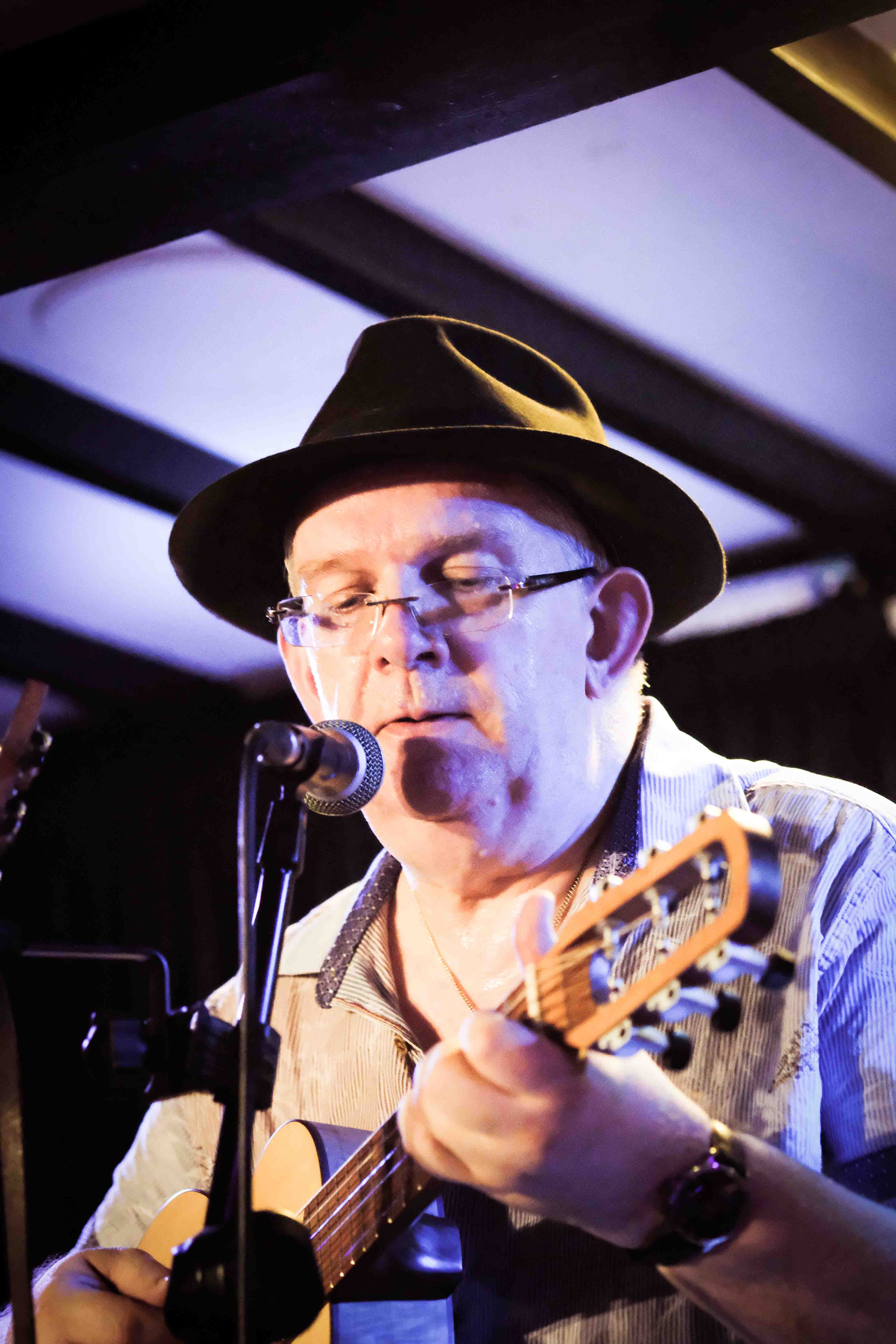
We are just a few days away from the launch of the Music for the Head and Heart evening and I’ve been once again reflecting on the whole issue of music promotion. I confess to having a problem solving brain and in my non musical life I teach problem solving internationally to groups.
It occurs to me that artist/music promotion follows many of the same rules as promoting any service or product.
The first rule of any marketing or promotion is to get customer attention. “The good news” is that there have never been so many free mediums to connect with a wider public. “The bad news” is that there have never been so many free mediums to connect with a wider public! The advent of social media and YouTube are both a blessing and a curse. On the one hand these new mediums mean great opportunities, but the downside is that the promotion noise level is at an all time high.
Great video and photos are essential in getting the public’s attention. Increasingly people have very short attention spans, so “good” is not enough, visual mediums need to be great! I appreciate that artists will have financial budgets but its IMO better to have a few great videos and or photos than dozens of average ones. As I have always said
“You never get a second chance to make a first impression”
In my other life I have worked with many successful longstanding musicians. One of them had severe anxiety about live performances and was about to go on a major tour. I floated the idea of taking a break and he commented
“The music industry is very unforgiving. Once you are off the radar, that’s it”
The noise level in music promotion means that its easy to be forgotten very quickly if you don’t maintain a regular stream of creative musical output. The challenge of course is to maintain both quality and quantity. Artists can get known for just one classic track which can then define your entire career. Below is a wonderful spoof from Ralph McTell illustrating this with his classic track “Streets of London” Who reading this blog could name another of his songs?
The most successful artists I see, have spent years developing their craft. In the era of talent shows there can be a belief that a person can achieve a level of fame really quickly, but that is often a myth. Many artists start off with great intentions with a musical college education, but only a few earn a living as a professional artist. Like any profession success depends on many factors including luck, but always a significant investment of time and money.
The money investment would often historically come from a record company, but the music industry has changed and those opportunities are less frequent. Many artists now self fund or will use some form of crowdfunding. This can work, but again this has become so common that it doesn’t have the same unique appeal as it once had. Pledge music was one of the biggest crowdfunding platforms, which ran into serious trouble, recently putting out this statement
“PledgeMusic entered liquidation with $9.57 million in debt and assets worth just $20,000,” it reported. “With an ‘estimated deficiency’ of $7,405.502.48 and secured creditor Sword Row, LLC first in line, there is ‘little prospect’ that artists and other creditors will be paid, according to the court-appointed receiver.”
If all this sounds somewhat depressing, then in my view there is also a wealth of good news to report. Its entirely possible to record and promote music to a wider audience in an effective manner, if you take into account many of the points raised here. I increasingly come across many superb artists and its my firm belief that the future is through artist cooperation. This is the thinking behind Music for The Head and Heart which follows the spirit of Robert Fripp’s DGM initiative, where the artist is front and centre.
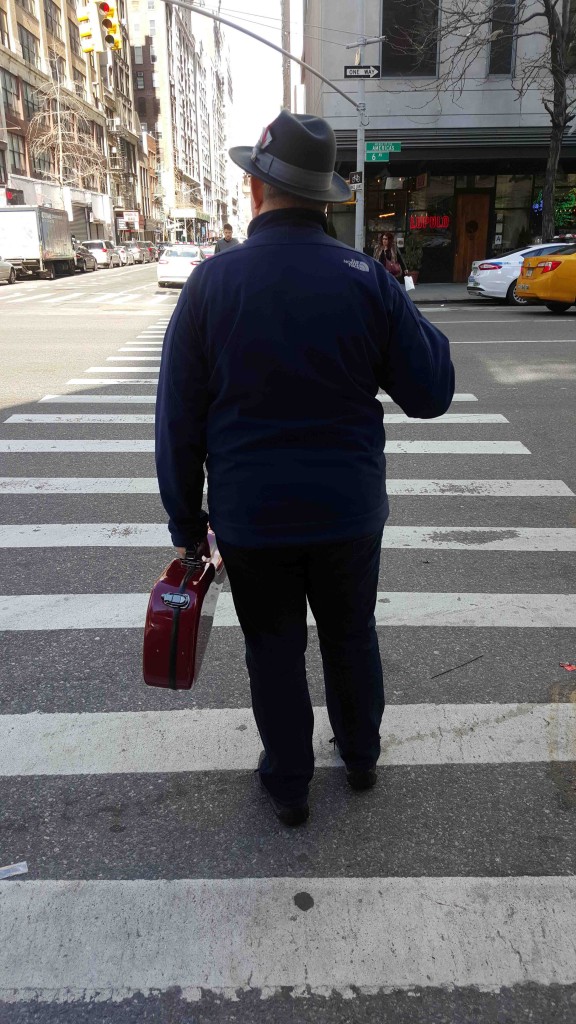
Back in November 2018 I blogged on a new social media platform called “Drooble” which is like FB for musicians. I’ve now had the chance to spend 8 months there and offer some feedback based on personal experiences, so here is a drooble review based on my observations and other’s comments.
Drooble have undoubtedly captured the imagination of many artists around the world from many genres of music and should be applauded for their efforts. There are numerous discussion pages which have some really good on topic interactions and this is useful for many starting out in music. The platform is based in Bulgaria and the company is currently seeking an additional eight full time employees, which is going to add to what I presume is a substantial set of overheads. When I say artists, from what I see most there are aspiring musicians rather than professional working musicians.

Individuals can upload songs and receive “karma points” for interactions which is an incentive to post a lot. Simply by commenting on other’s posts, a person receives the karma points that can then be used to trade for services. For the first few months I added a number of songs, many of which landed in the Drooble charts. It was useful to get some feedback on tracks from a more diverse audience and I applaud Drooble for that although as with many other social media platforms there is a danger of mutual congratulations. On the gear discussion page members can find useful information, which is a good part of the service
Like other social media platforms there’s a huge mix of people and this allows for a diverse set of opinions. There are the inevitable “WE LOVE DROOBLE” postings and the more thoughtful postings which to my eyes are far more interesting to read. Drooble should be applauded to generating so much interest, but as with all such social media platforms there are also a host of potential challenges and its fair to point out some of these to give a balanced view of what is going on here and hopefully spark some smart thinking to address what many of us see as genuine problems that could affect the viability of the platform. The owner of the platform Melina Krumova talks here here vision for Drooble here and how they are going to avoid having advertisers for the platform.
I am always mindful to encourage any business owners to follow their vision, but also as with my own business concerns, critical thinking and reflection as well as good financial planning is essential. Its useful to remember that as with any social media platform the “customers” are those who are financially supporting the platform, as opposed to “the users” who are using the platform. This is a common misunderstanding and often on FB people confuse the two elements.
One of the core elements in Drooble are the band pages where artists can post their songs. This aspect of the site went offline many months ago and despite regular problems of this being fixed many musicians including myself have a page that is simply no longer visible with this ongoing message
Sooo, stay tuned and don’t forget to tell me in the comments how much we suck ?”
When I questioned the tone of this post, the poster commented it was intended as a joke. Fair enough, and it may be a translation cross cultural problem, but there are many (probably unintentional) such miscommunications and perhaps drooble would benefit from appointment a relations manager who can be more neutral and focused in responses? The pages reappeared many months later but in a format that was universally hated by the users. Individuals now had two separate pages which are totally disconnected and the more cynical online suggested that this was simply to give an illusion of an expanded client base…
I appreciate that any platform will have its bugs, but I have pointed out on many occasions that the band page aspect is a core site feature. Drooble may be overstretched (hence trying to attract new staff) BUT rather than floating all manner of paid services, surely its better to get the platform to be stable and functional? There’s enough time to create “The Drooble wall of love” gushing about the site, but surely time would be better spent getting the band pages back online?
There’s also an issue with the charts insofar as the top 50 chart bears little relationship to many songs’ performance in the genre charts
Many have asked about the odd way the chart is figured, but Drooble refuses to clarify in any way suggesting people’s motives for asking questions are only for personal promotions! There are lots of technical issues with the site and I suspect they are massively understaffed and unable to deal with the core platform.
A quick look online reveals that a lot of people find the platform is not very stable and my own experiences reflect this. Its also not a great sign when members describe the CEO as “a dictator” which is also unfortunately my experience during this 8 month evaluation. Some feedback HERE
As someone who has been in business for four decades and who has run some sizable concerns I am acutely aware of the importance of listening to customers, even if I ultimately agree to disagree. What I would never do is call my customers egotists or narcissists, even if I thought that! I also have been on the receiving end of some pretty daft ill considered responses when asking what for me are common sense questions
Here’s one example
@nick.cody you are one annoying ****, aren’t you? Learn to appreciate what others are doing for you instead of hating! It’s so simple, if you don’t like it, don’t use it – I promise, not gonna wipe out my tears!
This hilarious response reminds me of a book that another friend and fellow international trainer wrote called “The Customer is bothering me” which wonderfully shows how business owners can fail to appreciate the importance of listening and responding to customers in a measured and mature manner. I pointed out that I have blogged on Drooble in a positive light a number of times, uploaded many songs and videos, and engaged in many discussions, so how he can describe me as “a hater” is somewhat odd to say the least…
I pm’d Plamen, but to date never received a response…
Many users also commented of the CEO’s insistence that only 5% of all the tracks uploaded to Drooble had decent production, which is an odd statement to say the least. A cynical person might think that this was a ploy to nudge people towards but some of the online courses costing hundreds of dollars or paying for the mixing paid services on offer. The problem is that again the manner of the communication is like a head teacher telling off schoolchildren and most users regularly lament lack of disposable income, so its not a very well thought through strategy.
I have pondered at length about publishing this blog as I genuinely wish Drooble well, BUT they have now decided to remove the previous band page option linked to the main profile. Many members are pointing out that this creates all manner of problems and all they wanted was the previous band pages back! Some have suggested that this is a way for Drooble to give the impression of more members… Either way IMO this is not smart customer relations strategy.
I appreciate Drooble is understaffed (they currently have been trying to fill 8 full time positions) but I really wish they would attend to the core features and actually listen to their customers. Another central issue is lack of attention to detail. The management suddenly dropped a major 50% hike in karma points for radio play, BUT forgot to change all the banner ads all over the site giving the old price! The CEO proclaims working 12 hours a day for free, not perhaps appreciating that that’s NOT good business sense and certainly not going to encourage much needed business partners to come on board!
The site is full of ad banners proclaiming the ability to earn money from reviews. The promotional copy for this service states
“We are launching a new service that will enable you to receive unbiased information on emotional responses, production analysis, songwriting opinions, improvement recommendations and other useful insights for your music. It is natural for us – musicians – to mostly value and consider the opinion of other music creators, so Drooble music feedback will be given only by musicians. “
The idea sounds great, but there’s no vetting process with the drooble review to determine the pedigree of the reviewer. I extensively asked about this online as it seems to be one of the most promoted paid services. The only stipulation for being “a reviewer” is to have accrued 2000 karma cash points which of course is not difficult if you spend all day on social media. Music professionals in my experience are working in the real world so don’t have the luxury of such disposable time. So yes, each drooble review may be by “music creators” but that is a very vague term.
The result is that the standard of reviews is reported by users as extremely patchy and often not the best value. One poster commented that “the reviewer” was focused on the artwork and many commented that the feedback was not even in their native language and often so generalized to not be very useful. One poster received a review in Spanish and then had to use google translate to decipher what the drooble reviewer was saying! Some music enthusiasts seemed happy but IMO this is not really the best way to run a paid service and is another example of poor business acumen from the management. My frustration as a business consultant is that some of the core concepts of drooble are good, but the execution is often very ill considered.
Both myself and an increasing number of others using the platform have started to question both the charts system and the play totals. I had songs in both the main charts and sub charts showing thousands of plays, BUT all external social media and web stats did not increase by even 1%! This is odd to say the least. The platform claims tens of thousands of users, but my own observations are no more than a hundred people are active at any time online. Of course there could be tens of thousands of lurkers, but personally I would consider that very unlikely based on social media behaviours. I guess we’ll probably never know! This drooble review is IMO useful as there’s very little discussion online from users about this platform and those on drooble that comment in any way other than the party line get deleted from the site
I discovered today that without notice my drooble account was pulled and I can no longer access the site! There was no notice, no explanation, just lack of access. This is not surprising as many in management seems extremely reactive and don’t really get the whole customer care aspect of business….
This happened immediately after having a conversation with a number of longstanding members there who all voiced concerns I have pointed out in this blog. I wish them well, but unless they start listening to those using the service’s concerns, the whole venture is not gonna have any kind of longevity. This is classic business nativity that I have seen over the decades and many experienced business professionals on the platform have gently (and later less gently) pointed out some of the car crash decisions they have made in recent months.
It may be that the CEO is too close to the project to be objective and one colleague was surprised that the main graphic chosen to promote the platform was of the CEO in full guitar rock pose, which might be fine for a blog, but many would consider an odd choice for a social media platform
The central problem with the platform is that its a microcosm of aspiring musicians (working musicians are mostly working and don’t have time to spend hours unpaid on social media ) so it can become the mutual congratulation concern. The idea that being on drooble will “advance your career” is a bit optimistic to say the least. This drooble review is of course a snapshot of what is happening here over an 8 month period.
I applaud the enthusiasm but the management don’t have the expertise to know how to grow a business and that’s a real problem. Like all social media unless you balance time and money and stay focused, any initiative is not going to stand the test of time. Offering services like mixing and mastering without even detailing the bios of whose is doing such work is also a bit optimistic. I have it on good authority that my questions to the CEO caused a bit of a knee jerk reaction and I suspect this is not the first instance where the response is to shut off any advice which was only meant to assist with helping stabilize the platform which has a stack of problems. I had some good discussions with a few posters online and posted a few songs which received good feedback, but increasingly my alarm bells were ringing about aspects of the platform and others commented offline that something doesn’t really add up and not just financially either…
Time will tell if Drooble survives, but I suspect someone will see the concept’s value and build a smarter more focused version in due course. Either way anyone building a platform should be applauded for efforts, but that’s of course not enough in the business world, you need good strategic thinking as great customer engagement to grow a brand.

It seems this article has sparked some discussion. The Drooble platform had many good possibilities but the owner continues to make pretty bizarre comments in order to try and flog paid services to the user base. The number of actual active users is suggested as many as less than 100, but the site claims membership of tens of thousands. Drooble is permanently seeking a staggering additional eight full time staff and that requires funding. The site now is full of ads for paid services including these ones. Of the 100 or so active users many are paid in “karma” (drooble currency) to post regularly (when you apply you are asked if you can spend 1,2 3 or more hours per day promoting drooble in your time for “drooble money”) so its hard to know who the genuine users are.
Here are some other initiatives where the platform is now seeking to entice customers and generate income. I have no problem with any business trying to generate income, but some of these ideas are plain bonkers from a business perspective and are only going to repel interest in the platform. Many users have already made such comments, but drooble refuses to listen to what users feedback and any suggestions result in such well intentioned folks categorized as “haters” Its fascinating to see increasingly more delusional behaviour.
Here are some examples of attempts to generate income –
Do you know that when somebody join Drooble through your invitation and they spend any money on the platform you get 10% of that in your wallet as a reward? For example if they spend 100 dollars you will get 10! Invite your friends now and start getting rewards
The thrust of this is that if you get your friends to join and but services, you get a 10% kick back on what they spend.
Another example that is not well thought through –
Melina Krumova
Yes, an electronic press kit can be useful for artists, BUT I’d be fascinated to know of any successful artist who has found that an EPK has “totally replaced the need for a website” Its of course nonsense and yet another attempt to generate much needed predictable income which is essential for any business viability. Worse still in the discussion pages, anyone questioning this statement finds that their comments are deleted and they are then threatened with being banned from the social media platform.
When I last checked a discussion meant an interaction between people and of course any social media platform that behaves in such a dictatorial fashion is not going to stand the test of time. The industry consensus continues to suggest that the best social medial platforms are still the tried and tested mediums as discussed her https://www.musicindustryhowto.com/6-best-social-media-platforms-for-musicians/
All of these are very well funded stable platforms and continue to attract customers. Hopefully Drooble will fill its staff vacancies and rectify many of these problems as the basic concept is a good one, but eclipsed by some very naive business decisions that make the whole platform a bit daft.
I received a bunch of messages suggesting that drooble is now flooded with adverts from both the company trying to market to the aspiring artist user base and many new users all posting “look at my new song” posts. The older users are increasingly posting how the site has changed and one user suggests that “Big Sister” is now deleting any posts that question the drooble official policy. They are also increasingly banning customers who question some of these odd assertions. This includes drooble’s assertion that an electronic press kit replaces any need for a website! This of course is a bit of a stretch as all professional artists use both EPKs and websites that fulfill different functions. The bizarre management style seems to not be attracting much needed staff and at the time of writing there are at least 8 permanent positions that remain vacant.
Special thanks to all drooble users who have given feedback on this subject
Despite unsubscribing on many occasions, I still get endless spam from drooble. Below is another example where they are clearly offering the customer base to third party concerns all trying to flog services. The term CAVEAT EMPTOR comes to mind. <sigh>
|
To support your artist exposure and career growth, Drooble is giving away a special 10% discount on all available services in the Drooble Store, provided by Drooble. No matter if you need Mixing and Mastering for your new record, Electronic Press Kit to book more gigs or Youtube and Radio Network promotion for your songs, you can get it cheaper than ever now! To get your discount, simply type this code PFXKF on the last step of your next order. You can use the code once in the next 30 days! Enjoy your Summer! Explore the Drooble Store! Want to direct more attention to your songs and videos within the Drooble community? We just released a brand new tool that will get you featured on the Drooble Newsfeed Left column and help you: Boost your exposure Receive more plays, applauds and comments Find out how audience perceives your music Receive valuable feedback You can feature your Tune, Video and Artist profile! Get Featured Now! We are happy to announce a partnership with Music Talks – one of the top indie music blogs in the world who also offer promotion, marketing and content creation for indie artists. They help artists create a professional online image through high quality branding for intros, outros and short Professional Animated Video, which can be used to gain more attention on websites and social media. Music Talks also has a 60 page DIY guide for the independent artist loaded with great advice and tips to help stand out from the crowd. From singing tips, how to create great content to keep your fans interested and gain more attention to a complete step by step plan and strategy of your next single/EP or Album release with links to useful tools in a beautiful well set out Ebook, known as The Essential Indie Guide. Drooble is excited to offer to all its site visitors a 20% discount off from Professional Animated Video and The Essential Indie Guide by simply typing this promo code PVIEMT6 on the checkout page when you make your order. Rock on! Learn More Made with for music! Need Help? Have any suggestions for us? Please don’t hesitate to contact us at anytime at team@drooble.com |
Drooble also seems to have extreme difficulty in filling staff positions. Despite the enticing video suggesting a dream like of sun, sea and music, there are always 8 positions that remain unfilled for the company. These include key staff roles. Time will tell whether drooble survives. The sentiment is fine, but any smart business owner will note that the business strategy is odd in the extreme to say the least!
I continue to be spammed by drooble no matter how many times I unsubscribe! As I suspected they use the subscriber base as ad fodder for third party business. I also note as a previous recruitment director that after almost a year on they still seem unable/incapable of filing 8 key positions, which tells a story of course…
No matter how many times I unsubscribe I continue to be spammed by drooble. Here is the latest and probably the daftest spam email to date. Make of it what you will…
| Inbox | x |

| Mihail | Drooble | 10:38 AM (1 hour ago) | ||
| to me |
Hi there,
Hope your day’s going great so far! My name is Mihail and I’m a full-time superhero at Drooble – The Truly Social Network for Musicians.
I noticed you recently started creating your personal profile on Drooble but didn’t finish it for some reason. Let me know what went wrong – did you encounter any difficulties or technical issues with the platform? It’s my personal mission to help you become part of our musicians’ community.
After signing up for free you’ll immediately be able to:
You can ask me anything, anytime. Just hit the reply button or email me directly at mihail@drooble.com
Here’s a link to the free sign up again: www.drooble.com
Rock on!
Mihail
The same 8 jobs remain unfilled a year on – https://drooble.com/careers
Here we are in Sept and guess what? I’m still getting spammed by Drooble trying now to flog me promotions on YouTube. Worse still the unsubscribe button doesn’t work either… <sigh>
Drooble continues to spam its data base with increasingly daft offers…
PS Those 8 jobs are still vacant
Drooble continues to promote more and more 3rd party concerns to “members” and yes, those eight positions at Drooble HQ remain unfilled!
Late November update
I’m still being spammed by Drooble and guess what? Those 8 positions at Drooble HQ remain unfilled and the drooble customers continue to be bombarded with requests for paid 3rd party services… <sigh>
This arrived today <sigh> It seems there is no escape from the endless spamming, even when you officially unsubscribe
| Hey Nick, |
| So much happened on Drooble since you last visited! New awesome people joined, posted amazing music, discussed countless topics and exchanged inspiring ideas. We’re sparking the passion in musicians to share their knowledge and inspire each other. |
| We really miss you! Join us again, so we can do this – together! |
Just like zombie dawn, the spam continues (see below)
| Hey Nick, So much happened on Drooble since you last visited! New awesome people joined, posted amazing music, discussed countless topics and exchanged inspiring ideas. We’re sparking the passion in musicians to share their knowledge and inspire each other. We really miss you! Join us again, so we can do this – together! See you soon on Drooble.com |
| Go to Drooble In the meantime I continue to get lots of e-mails from people complaining about drooble, all citing the problems I have outlined in this article. The same unfilled vacancies continue 4 years on, make of that what you will… |
Guess what? Here we are in May 2022 and despite unsubscribing, the drooble spam continues to flood my inbox! Here is the latest attempt to get me to subscribe
| Hey Nick, |
| So much happened on Drooble since you last visited! New awesome people joined, posted amazing music, discussed countless topics and exchanged inspiring ideas. We’re sparking the passion in musicians to share their knowledge and inspire each other. |
| We really miss you! Join us again, so we can do this – together! This tells me two things – Firstly they have zero awareness or care about spamming those who once subscribed Secondly, they don’t bother to check Google positioning for Drooble, or they would NEVER keep spamming by e-mails… |
The spam keeps appearing from drooble even though I unsubscribed. Its a dreadful self serving platform that has no real interest in music. No wonder they are permanently understaffed…
| Hey Nick, |
| So much happened on Drooble since you last visited! New awesome people joined, posted amazing music, discussed countless topics and exchanged inspiring ideas. We’re sparking the passion in musicians to share their knowledge and inspire each other. |
| We really miss you! Join us again, so we can do this – together! |
Guess what? Despite unsubscribing, Drooble continues to spam me, desperate to get old users back to the really dreadful platform
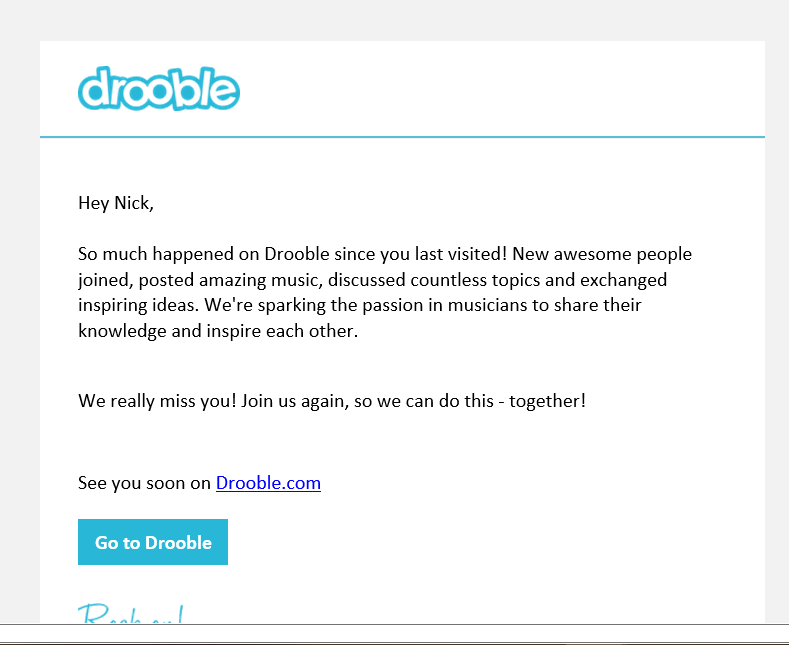
As for “sparking the passion in musicians” that’s a total joke. This is a space for mutual congratulation and endless spam, beyond dreadful
No surprise at all to get notification that this deadful platform is now gonna disappear. Great news
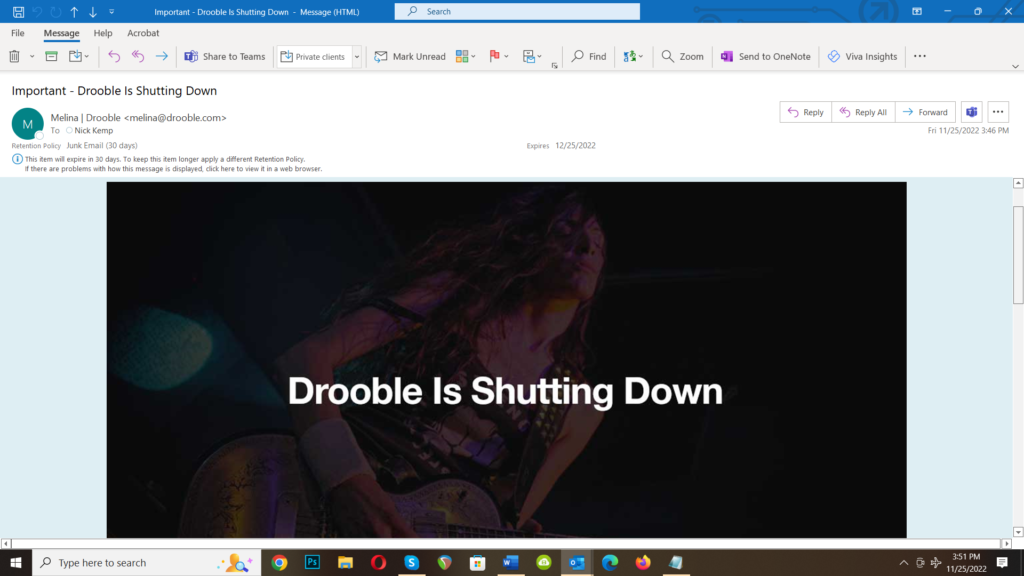
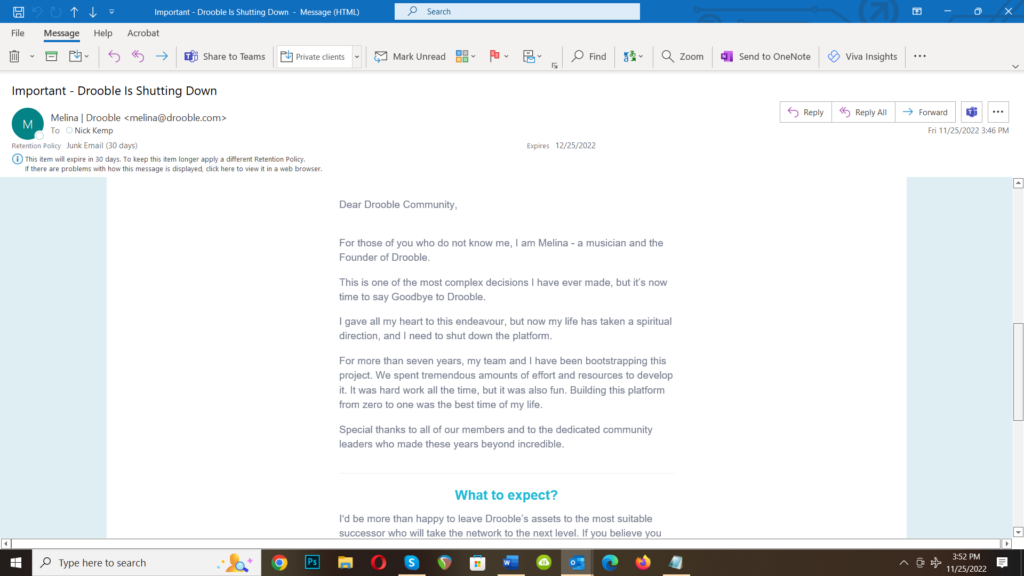
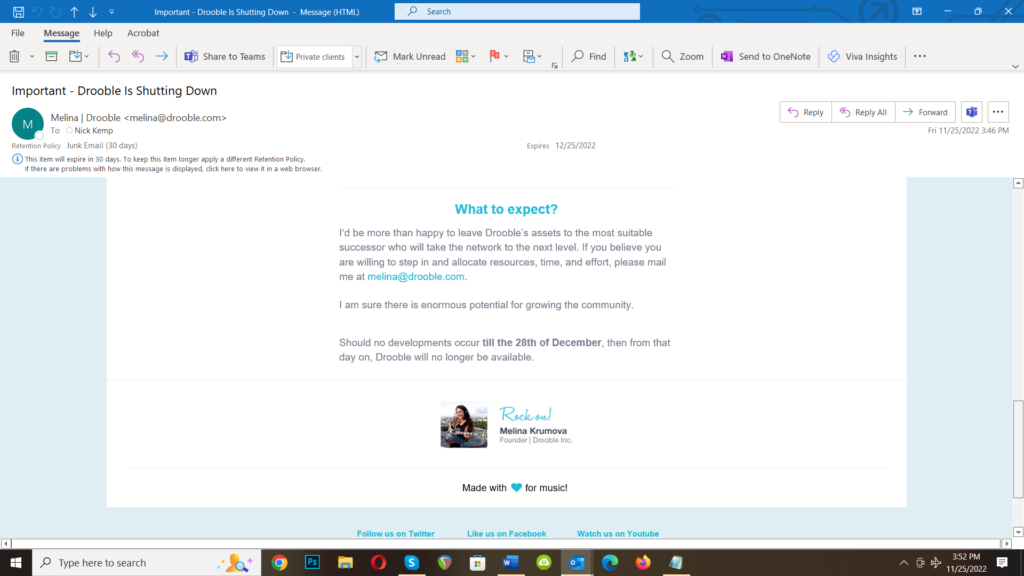
The mind boggles as to what this means! My own experience of this character is that they have very little interest in anything other than what they can get from others. Perhaps another MML platform will appear now framed as “New age” Either way its good news that Drooble is disappearing, even if it means I stop getting spammed
I gave all my heart to this endeavour, but now my life has taken a spiritual direction, and I need to shut down the platform.
Melania
Just when we thought this lamentable platform had headed off ito the sunset with Melania reinventing herself as some new age guru, Its back. Once again the spam continues…
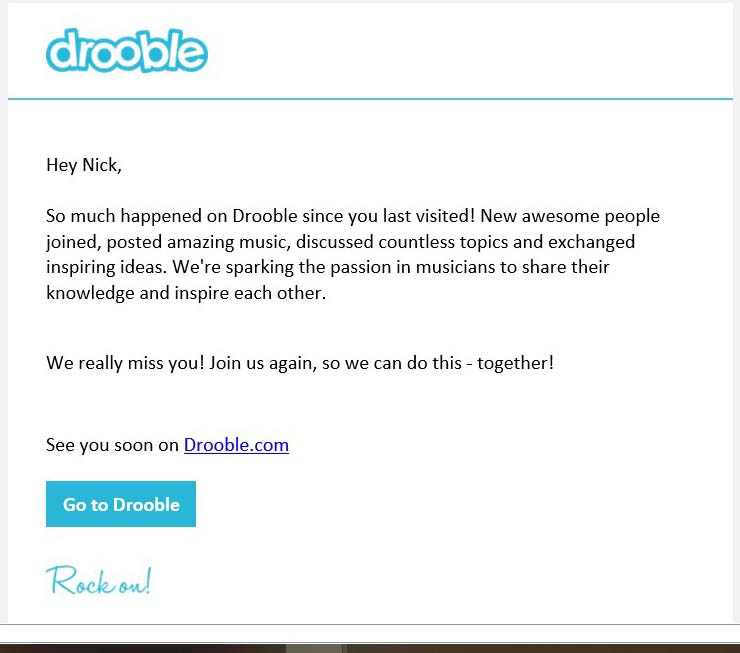
Whether we like it or not, video has become a key element in promoting music. As the old saying goes
“You never get a second chance to make a first impression.”
I’ve learned over the years about the importance of always maintaining the best quality control in releasing audio and video. Social media is full of artist videos that are well intended, but not always shot in the best possible manner. Common errors are the classic shakey video where you start to feel seasick just watching.
Another issue is releasing products with terrible sound, a big fail when the idea is to promote music! I saw today on social media a showreel from a solo singer songwriter with terrible sound as if he is playing at the bottom of a well. The video angle is also dreadful. There may be some excuse if this was an enthusiastic super fan shooting the video, but this is his attempt at a showreel/business card for his work and it looks terrible. Another acoustic solo artist is endlessley putting out phone video on Facebook. I applaud the enthusiasm, but its almost of her playing in a venue with either no public or people clearly talking over the music. Again its not creating in my view the best impression, in showcasing her art.
With the advent of Tik Tock, the public have an ever decreasing attention span, so any music videos need to be well edited and impactful. The public are mostly not going to watch a lengthy video, especially if its a new artist. Also many people watch gootage on their phones, so any footage needs to look good on this medium. Music videos have in many instances become like TV ads, short and to the point. There is still a place for longer videos, but 30 sec clips can be great to get attention from people that don’t know the artist’s music.
The temptation for many artists is to do all filming and editing themselves, but in my view its far better to employ somebody who has both the professional gear and skills to create the best end result. Yes, its an investment, but in my view a worthwhile one.
In recent times I’ve hired Mal Williamson for all my music videos and he’s doing a superb job. Crucially he is a film maker rather than an enthusiast with a video camera and it shows in his work. Below is a great example of a “video poster” for an upcoming live showcase in Leeds.
I am a fan of videos that are well thought out and are filmed with a variety of film angles. This does not mean endless cameras and of course the editing is crucial. A lack of smart editing means that its hard to keep a viewer’s attention. Too much cutting from one camera to another makes for an unpleasant viewing experience! Here’s another Mal Willaimson music video on social media which is in my view a great example of smart editing to keep viewer attention. This was a ton of work, using a variety of audio clips, green screen and multiple camera angles to maintain flow and viewer attention
I recently did a stock take of all my instruments and had to check valuations fro insurance purposes. I was amazed at how many of them have massively increased in value. The USA made instruments in particular have become great investments. Notable examples of these inlcude by Bronze and Spanish Parker Flys as well as my Collings instruments, especially the I35
All of these have increased in value by 300%. Some photos below.

